News
2025
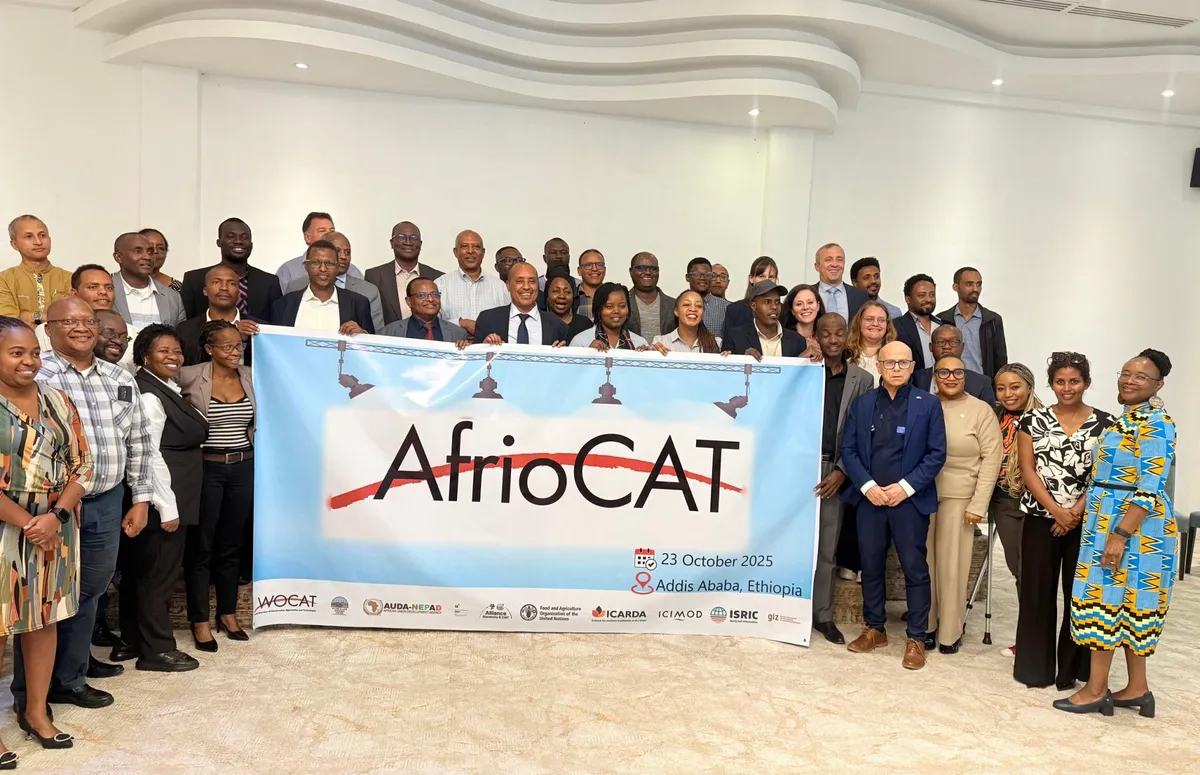
The Africa Overview of Conservation Approaches and Technologies (AfriOCAT) was officially launched on October 23, 2025, in Addis Ababa, Ethiopia! We celebrated this key moment with our valued partners, AUDA-NEPAD and the Water and Land Resource Center (WLRC) Ethiopia, alongside influential representatives from African institutions working on Sustainable Land Management (SLM) and land restoration across the continent. We are incredibly excited about this new chapter. AfriOCAT is set to decentralize WOCAT, significantly strengthening South-South knowledge exchange and driving joint action to restore our precious land!
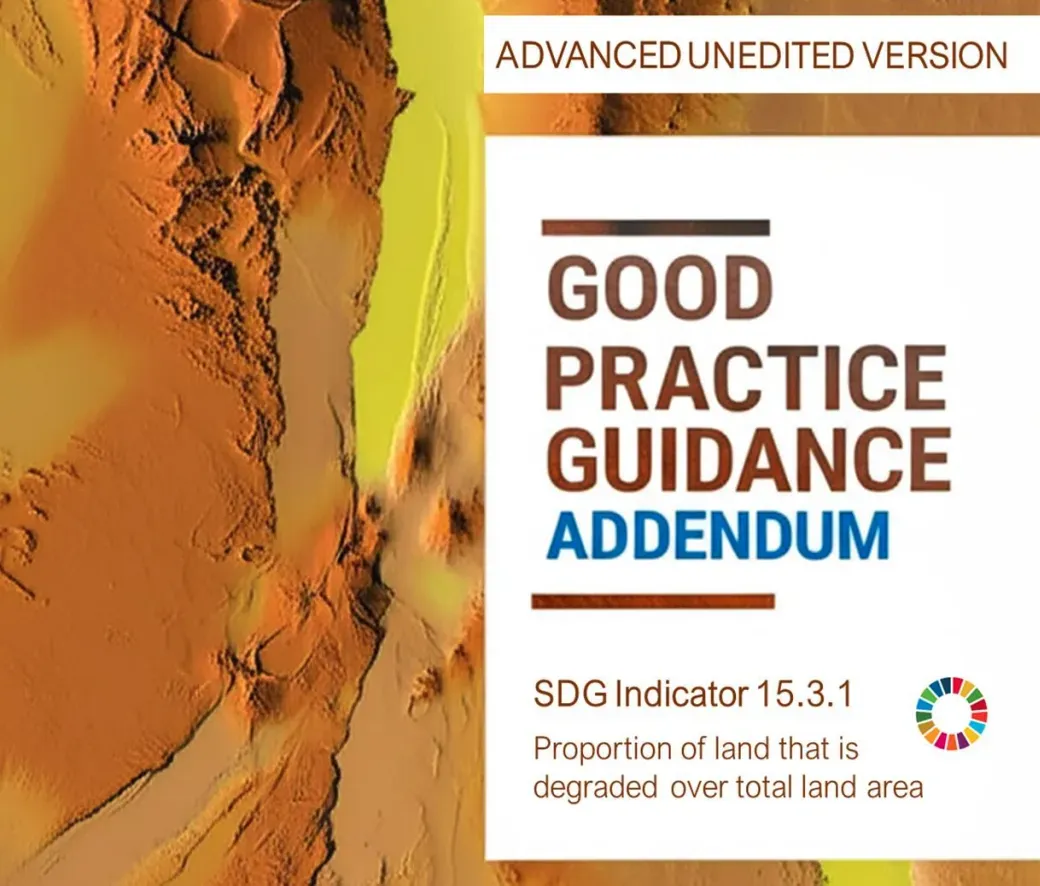
The SDG 15.3.1 GPG Addendum (unedited version) is out!
After 18 months and collaboration with many experts and institutions, we are pleased to share this document with updated guidance to compare land degradation maps over time, estimate SDG indicator 15.3.1 and monitor progress towards LDN.
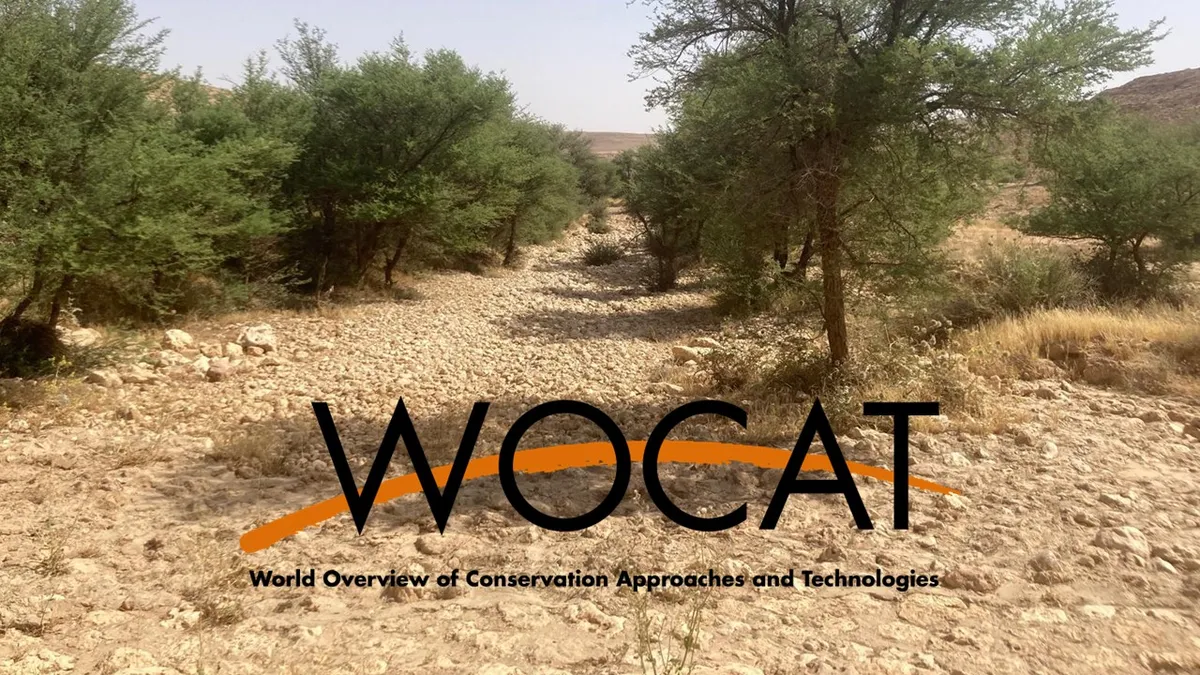
The Newsletter is out! Dive in and explore our three decade-long alliance with FAO, an outlook for new opportunities of capacity development and much more. Together we are continuing our work towards sustainable land management and land degradation neutrality!
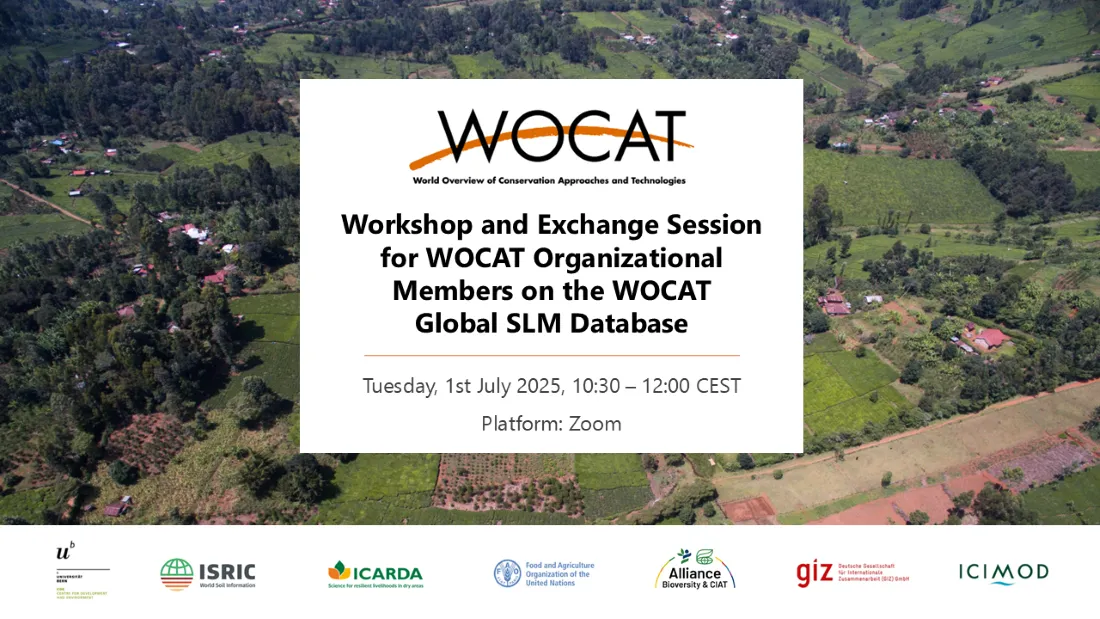
The WOCAT Secretariat organized an interactive session for WOCAT Organizational Members, focusing on the practical use of the WOCAT Global SLM Database. The session aimed to strengthen Organizational Members' capacity to utilize the Database and its contained knowledge on SLM practices.
Long-time partners, the Uganda Landcare Network and LLandDev, shared their insights on using the Database, drawing from their practical experiences. Their contributions sparked valuable discussions on the use of the Database, the documentation of SLM good practices, as well as related challenges and opportunities. The session underscored the Database’s value as a central tool for knowledge exchange and informed decision-making in SLM.
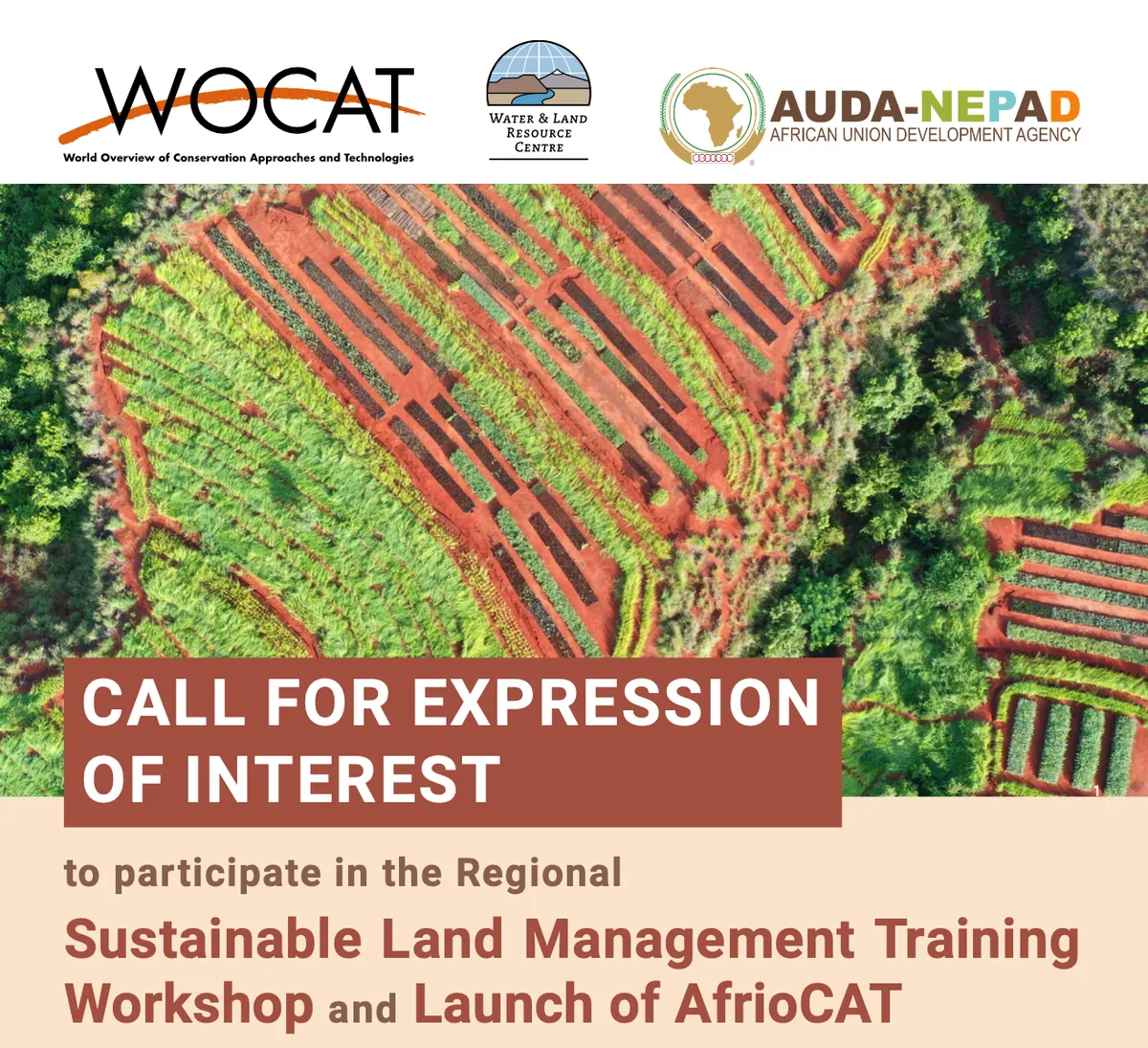
Launch of AfrioCAT & Regional SLM Training Workshop - Lancement d'AfrioCAT et atelier de formation régional sur la gestion durable des terres.
WOCAT, AUDA-NEPAD, and WLRC invite African institutions to a key event in Addis Ababa, Ethiopia (Week of Oct 20, 2025). This event marks the official launch of AfrioCAT, the WOCAT Regional Cluster for Africa, set to enhance regional impact and foster South-South knowledge sharing in Sustainable Land Management (SLM). Accompanying this is a Regional SLM Training Workshop to build capacity, train on WOCAT tools, and strategically plan for AfrioCAT.
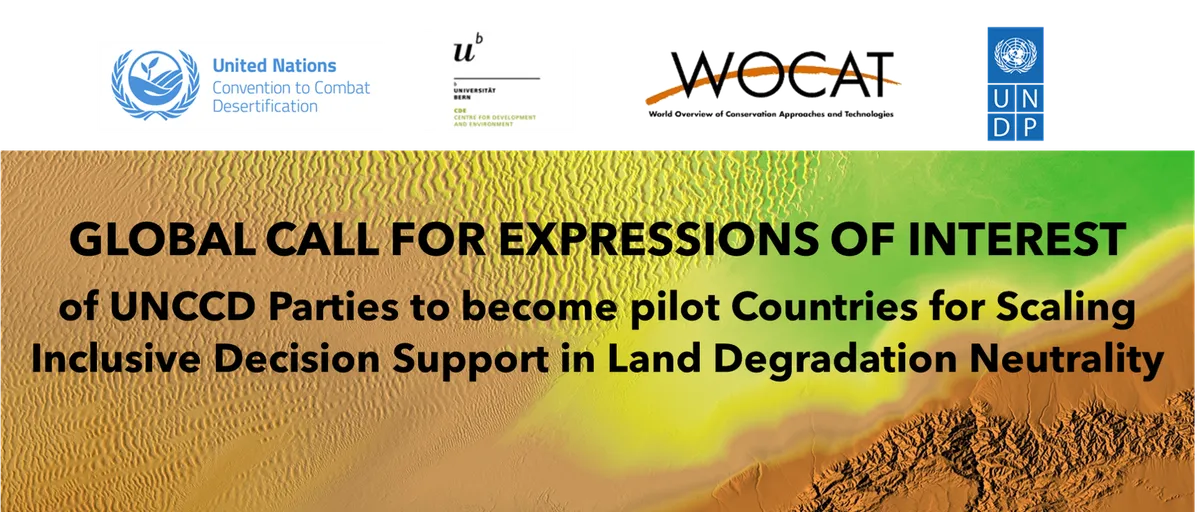
We invite to apply for becoming participating countries under the GEF-funded project: "Scaling the Capacity of UNCCD Parties for Inclusive Decision Support in Land Degradation Neutrality."
More Information Plus d'informations Más información
Scaling the Capacity of UNCCD Parties for Inclusive Decision Support in Land Degradation Neutrality
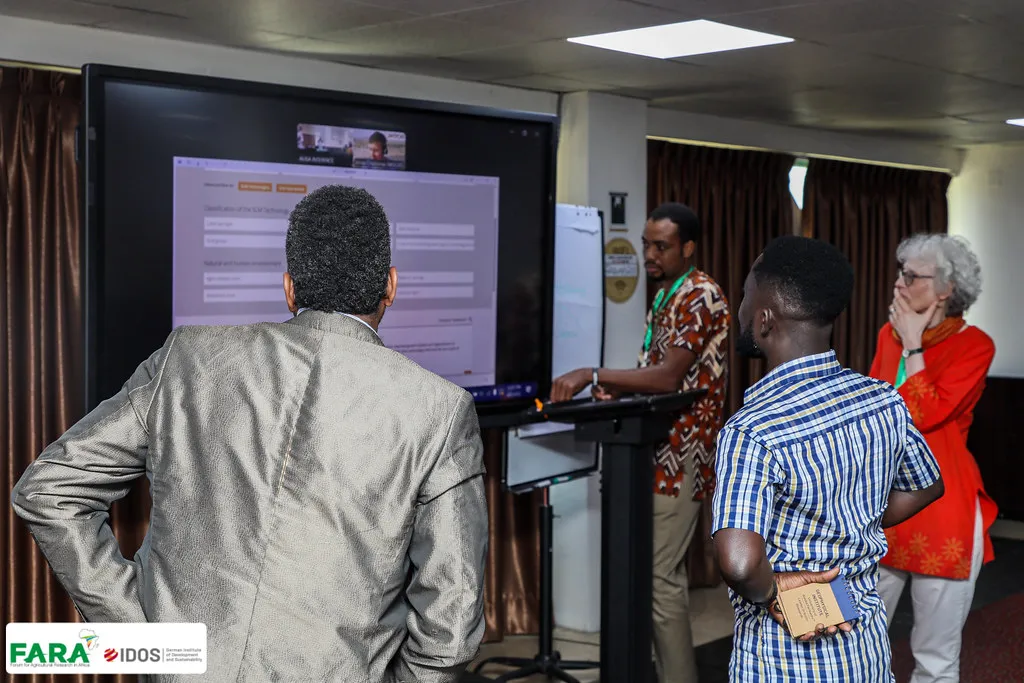
To support inclusive, evidence-based, and scalable solutions in SLM, WOCAT showcased its Global SLM Database at the Status Seminar 2025 in Accra.
This high-level event – co-hosted by the German Institute of Development and Sustainability (IDOS), the Forum for Agricultural Research in Africa - FARA, and the Center for Development Research (ZEF) at the The University of Bonn – brought together over 120 researchers, policymakers, and practitioners from across Sub-Saharan Africa and beyond. The seminar highlighted four major regional research projects – COINS, DecLaRe, Minodu, and InfoRange – as well as INTERFACES, a cross-cutting initiative that connects institutions in Germany and several African countries.
Picture: Forum for Agricultural Research in Africa (FARA), 2025
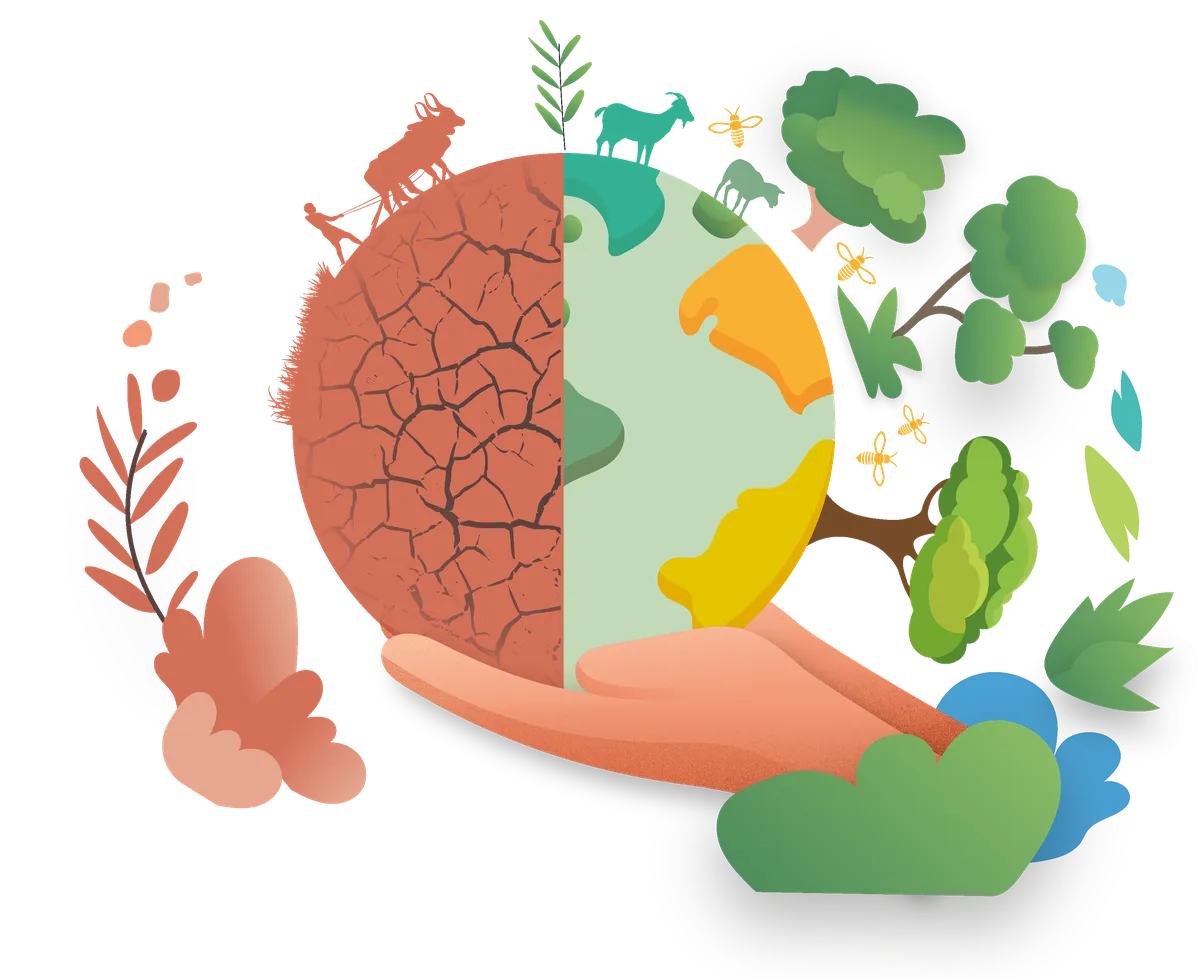
As part of the GEF global coordination project for the Sustainable Forest Management Impact Program on Dryland Sustainable Landscapes (DSL-IP), WOCAT – together with FAO and IUCN – is organizing the DSL-IP e-Learning Series. This series covers a range of topics related to sustainable land management, good sustainable land management practices, and land degradation neutrality under the DSL-IP Communities of Practice 1 and 2.
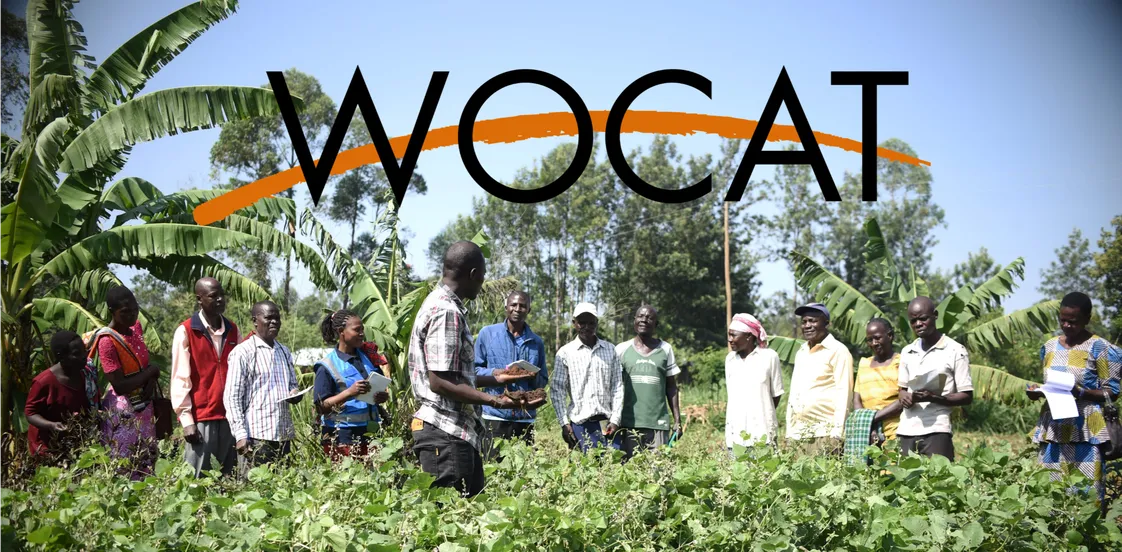
The WOCAT Newsletter July - December 2024 is out! As we step into 2025 with renewed energy and purpose, we are excited to share highlights from our recent activities and achievements, including WOCAT’s impactful presence at UNCCD COP16. Together, let’s continue advancing sustainable land management and building a brighter future for our land and communities.
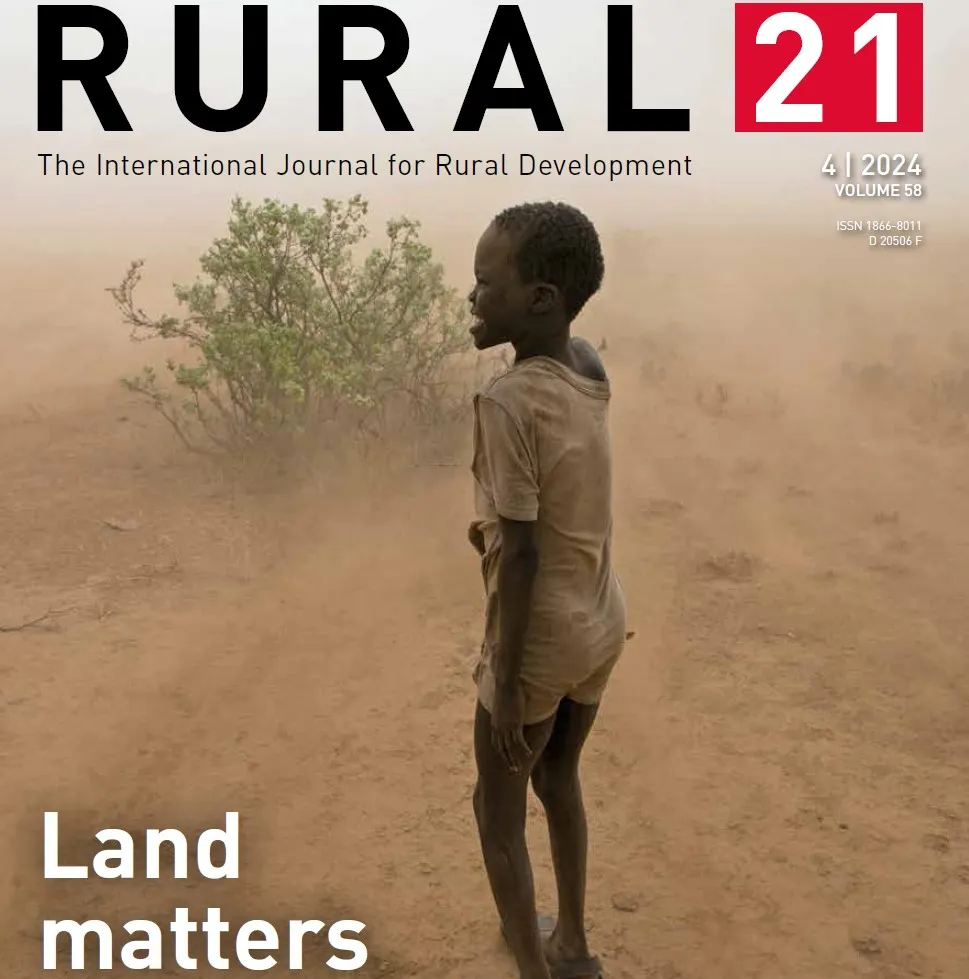
WOCAT has published an article in the latest issue of Rural 21 titled "Embracing Gender for Sustainable Land Management".
This article underscores the critical importance of integrating gender perspectives into SLM to achieve more inclusive and effective outcomes. It highlights innovative approaches, tools, and experiences developed by WOCAT to ensure gender-responsive SLM practices that empower both women and men. By addressing gender inequalities and promoting equal participation, WOCAT aims to enhance the sustainability of land management efforts while contributing to improved livelihoods and ecosystem resilience.
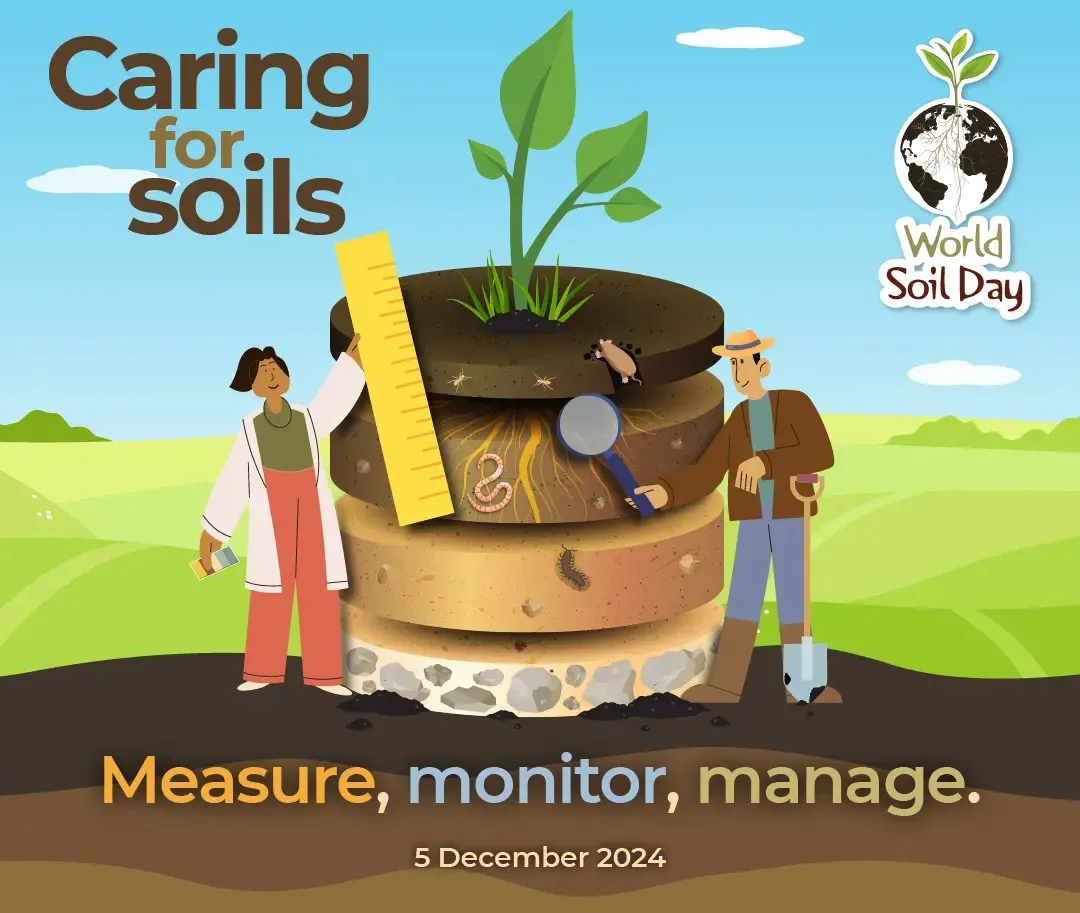
This year's World Soil Day theme, "Caring for Soils: Measure, Monitor, Manage", resonates with the mission of WOCAT's Consortium Partner ISRIC – World Soil Information. To mark the day and its alignment with UNCCD COP16, WOCAT and ISRIC hosted two key events at the WOCAT-UNCCD Pavilion: a morning session (WOCAT Morning Meetup) on ISRIC soil maps (i.e. SoilGrids) and an afternoon session: From SoilGrids to Soils4Africa.
These events underscored the vital role of soil data and collaboration in sustainable land management.
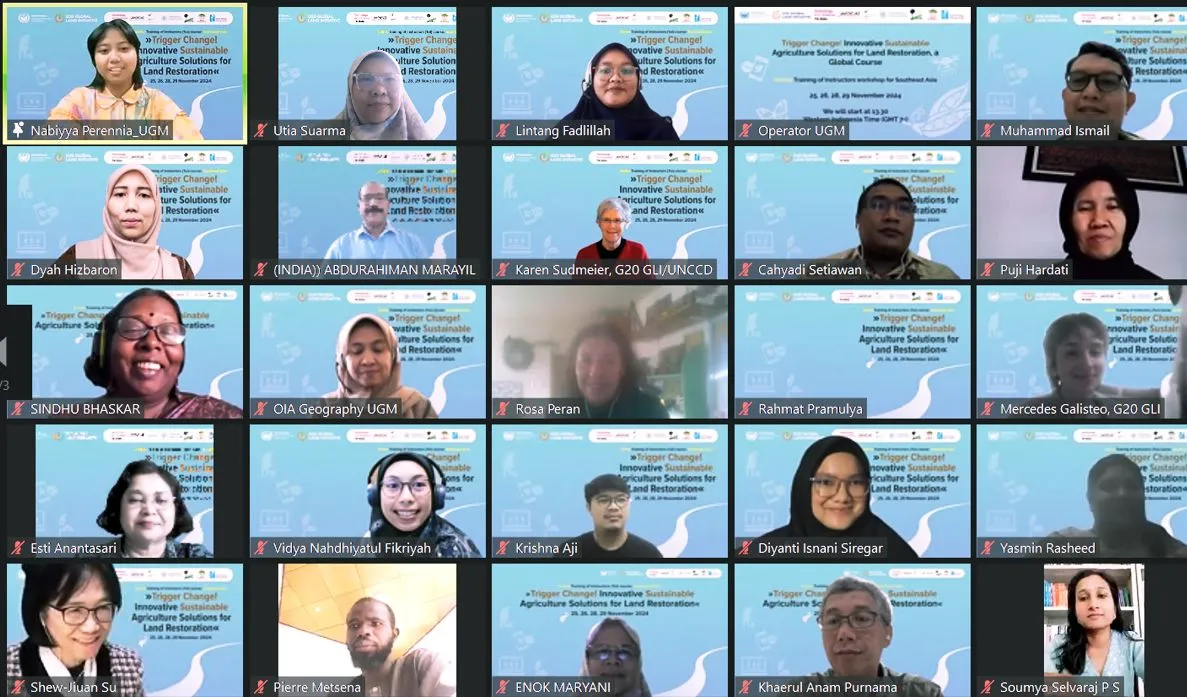
End November a workshop to instructors of “Trigger Change! Innovative Sustainable Agriculture Solutions for Land Restoration” (Training of Trainers) was held for Southeast Asia Educators. The objective was to equip educators with the knowledge and tools needed to integrate the “Trigger Change!” course into their curricula.
Save the date for the next Training of Trainers Workshops early 2025: Arab Region 3-6 February, Latin America 25-28 March, and Europe tbc.
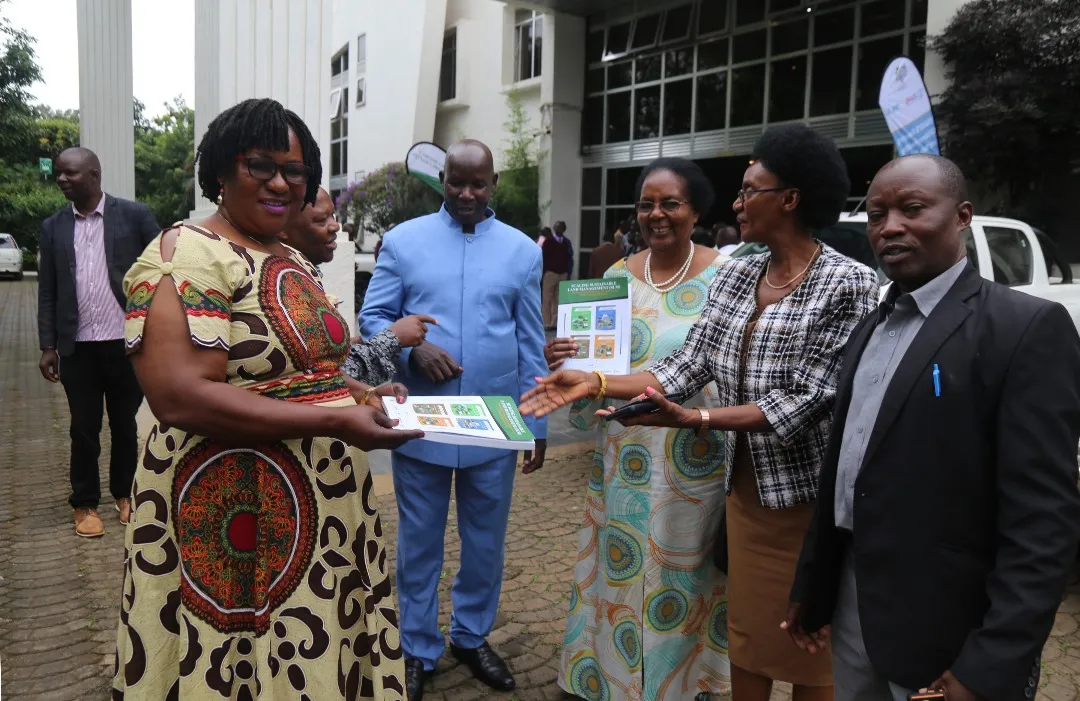
Uganda Landcare Network, an Organizational Member of WOCAT, is marking 10 incredible years of fostering SLM in Uganda! As part of the celebrations, the Mayor of Masaka City, Uganda, received the SLM Catalogue, a testament to ULN’s dedication to promoting land restoration and sustainable practices. This collection of SLM practices was compiled as part of the IFAD-funded project Scaling up SLM practices by smallholder farmers.
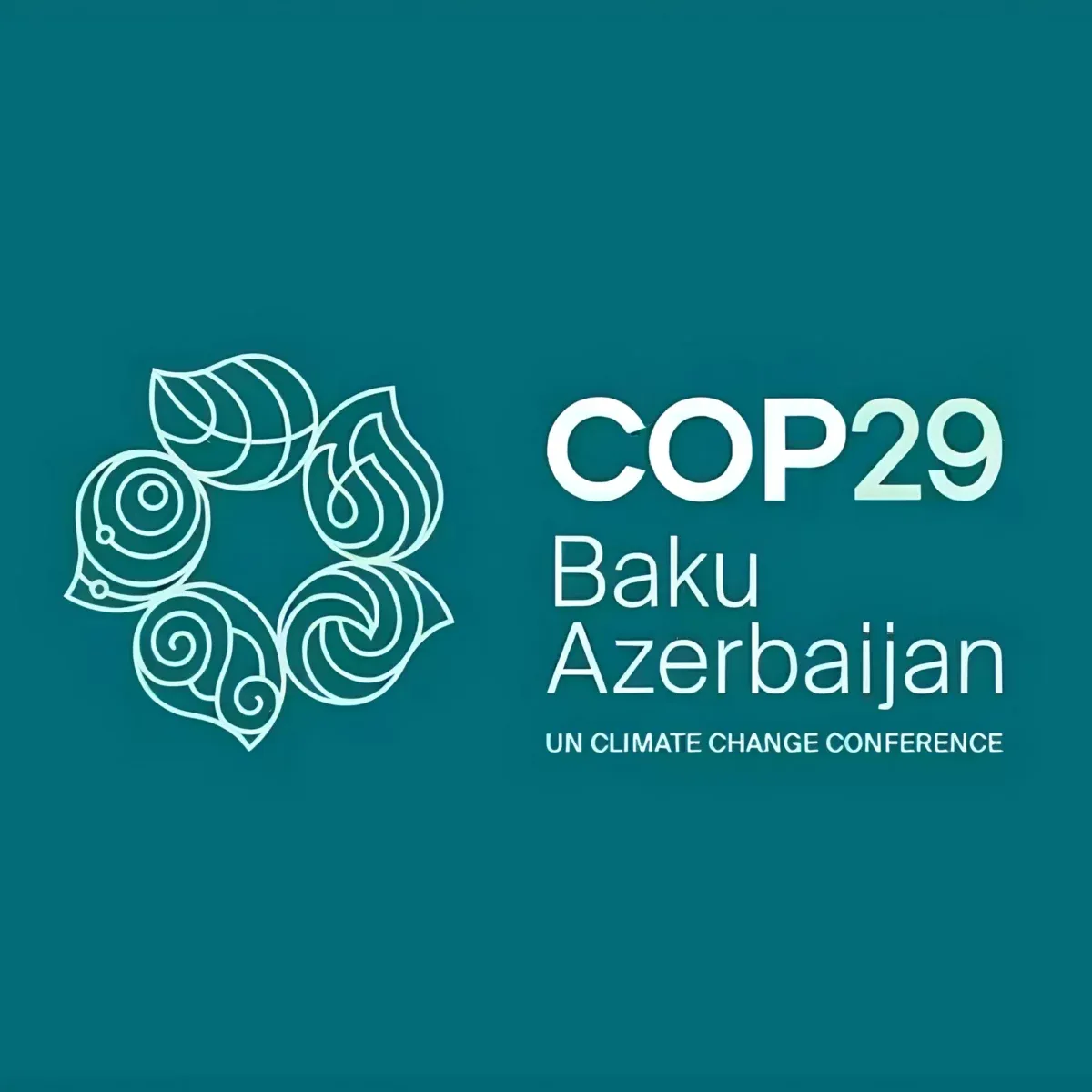
The UN Climate Change (UNFCCC) Conference Baku - COP29 is carrying on, from 11 to 22 November.
The COP29 will be the venue for the commitment towards the multilateral climate system underway since the Pars Agreement to be tested, with a focus on climate finance goal, meaning negotiating realistic goals for what the public sector can directly provide and mobilise. Sustainable Land Management (SLM) practices have the potential to mitigate climate change cost-effectively in numerous ways, fostering opportunities for environmentally sound circular economies to sprout.
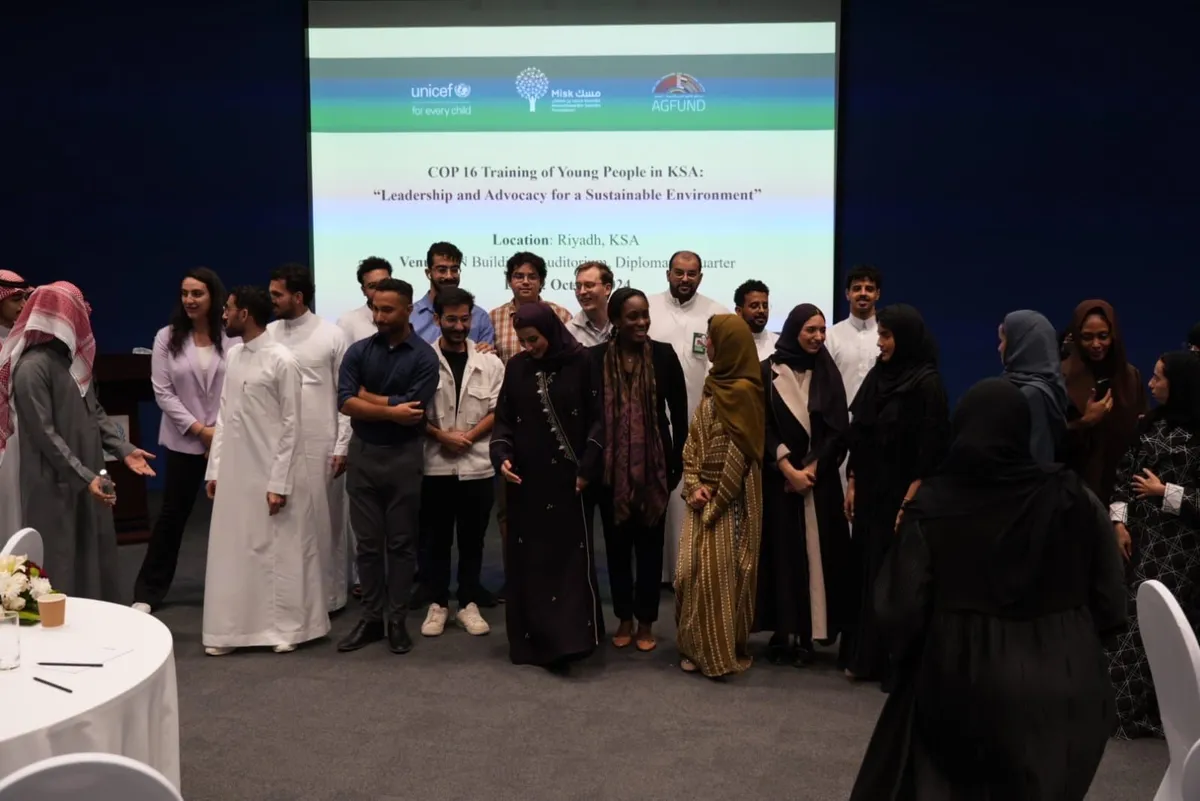
WOCAT and UNICEF jointly conducted a training program for young leaders in the Kingdom of Saudi Arabia on “Leadership and Advocacy for a Sustainable Environment,” in preparation for the upcoming UNCCD COP16 in Riyadh, Saudi Arabia. WOCAT provided participants with an in-depth understanding of land systems and their interconnectedness with climate change and poverty, the increasing and complex threat of land degradation, and the principles of SLM to combat land degradation, desertification and droughts.
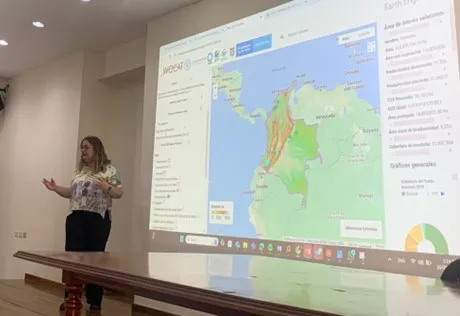
A “Training on the use of Colombia LDN DSS to Support Land use Planning Processes" was held in Popayan, Colombia, organized by the Ministerio de Ambiente de Colombia, GEO-LDN, ASOPATÍA, Universidad del Cauca and WOCAT. The workshop aimed to build capacity for effective land-use planning and conservation using the Colombia LDN Decision Support System (DSS) tool. Participants included government representatives from municipalities in the Alto Patía region, faculty and students from Universidad del Cauca, National Parks officials, and ASOPATÍA members.
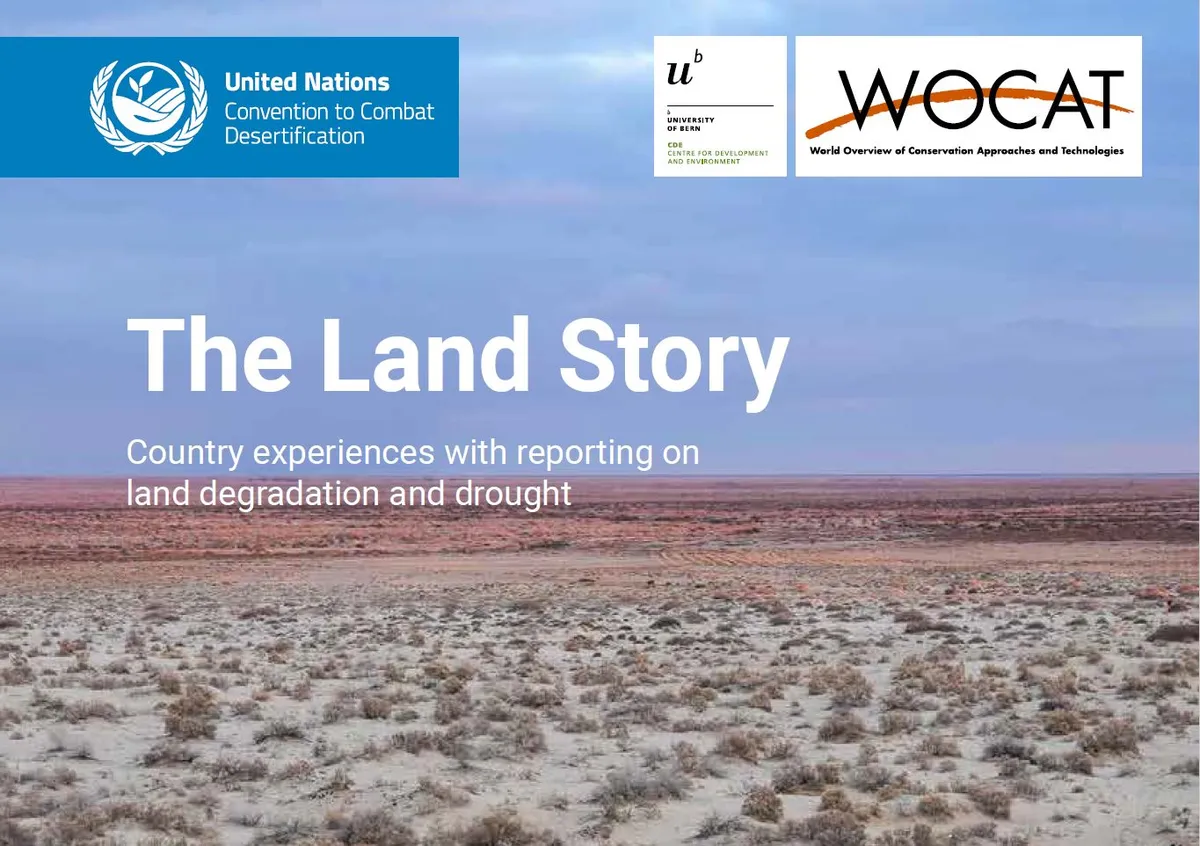
WOCAT, it's consortium partner Centre for Development and Environment and the UNCCD launched a new publication that shares insights and methodologies from 30 countries that contributed to improving land degradation and drought reporting. The publication will debut further at UNCCD COP 16 in Riyadh, during a side event co-hosted by WOCAT and the UNCCD on December 6, 2024. Representatives from featured countries will discuss best practices and lessons learned, showcasing replicable methods for future reporting.
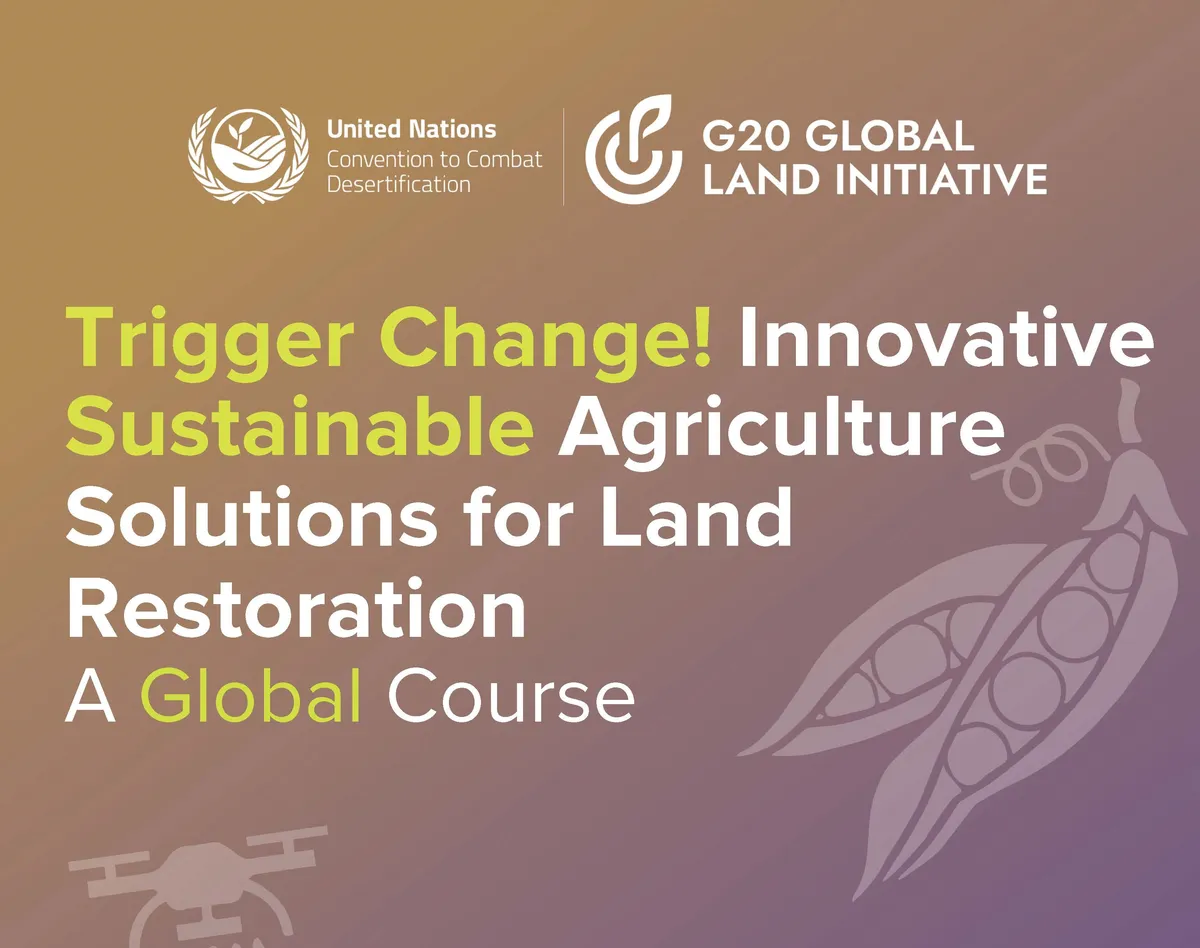
The G20 Global Land Initiative developed a new course: Trigger Change! Innovative Sustainable Agriculture Solutions for Land Restoration: A Resource for University Professors. Released in April 2024, this new course targets university students and training institution participants worldwide enrolled in agriculture and related programs. The course is structured into five modules, spanning 48 hours of in-class instruction. Each module delves into innovations in sustainable agriculture for land restoration, providing a comprehensive learning experience for students.
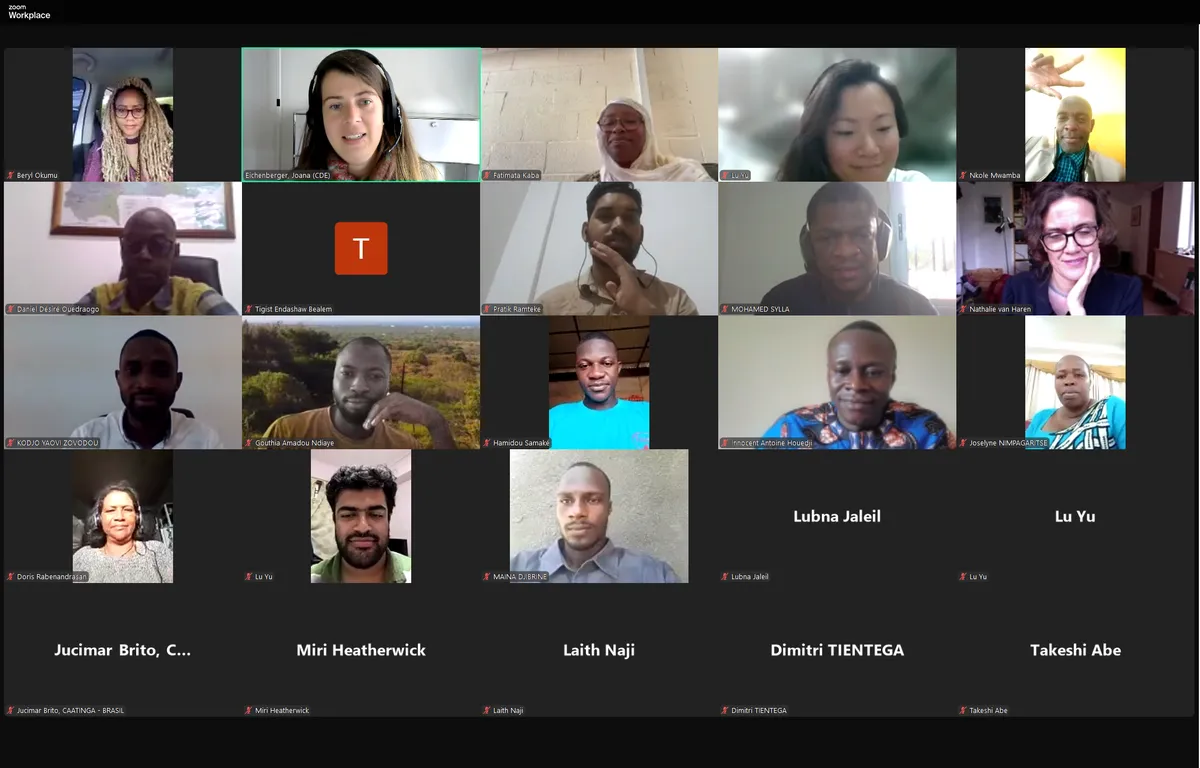
As an accredited UNCCD CSO, WOCAT is leading the Working Group Compile Good Practices from CSOs to Combat Desertification. After a training on how to document SLM practices with the WOCAT questionnaires, the CSO will document their best practices until end of November. The documented practices will then be disseminated via social media, presented in the WOCAT Pavilion at the UNCCD COP16 in Riyadh, Saudi Arabia, and also featured in the ECO daily bulletin at COP16.
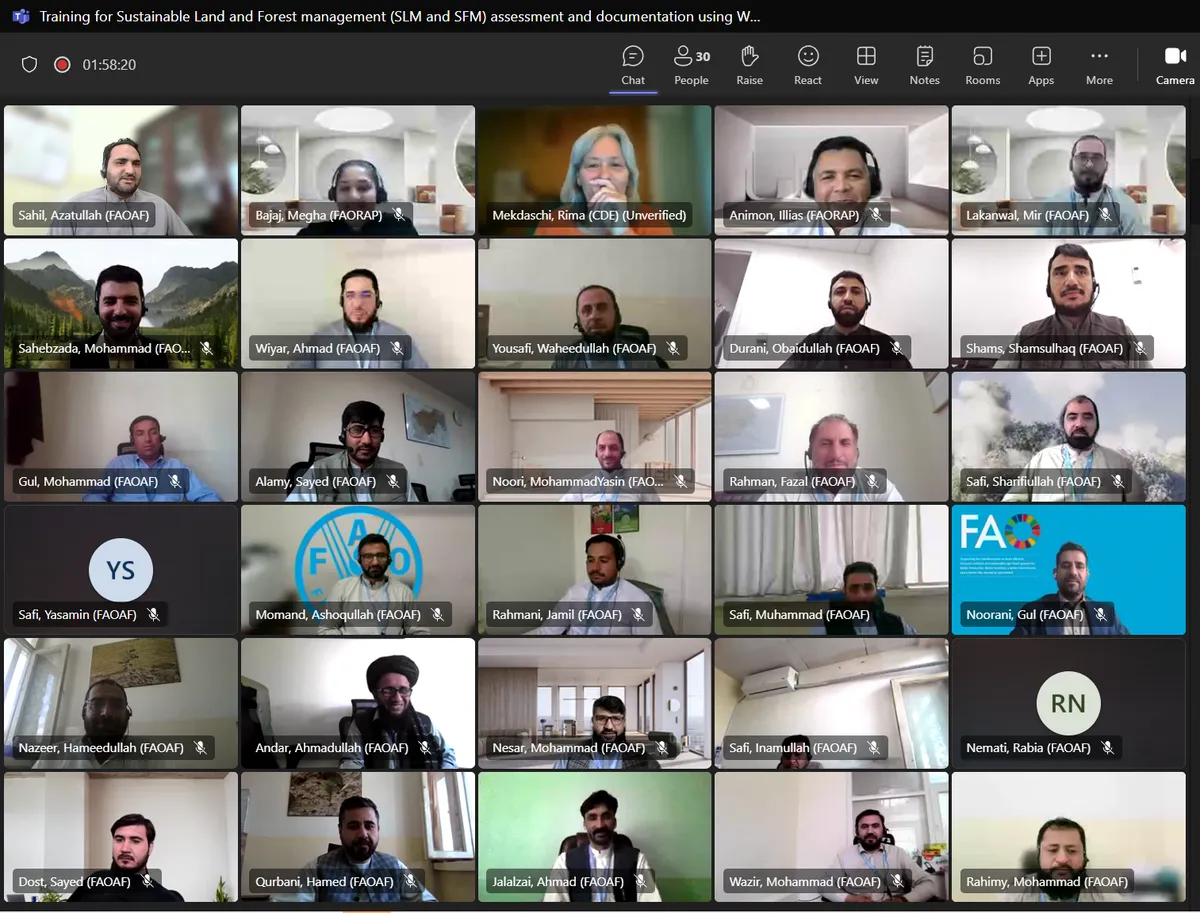
In the framework of the ‘Community-based Sustainable Land and Forest Management in Afghanistan’ implemented since 2018 around 30 participants joined the training on ‘ Sustainable Land and Forest management (SLM and SFM) assessment and documentation using World Overview of Conservation Approaches and Technologies (WOCAT) and Land Degradation Assessment in Drylands (LADA) tools in Afghanistan’. The project aims to promote SLM and SFM practices in Afghanistan for promoting rangeland productivity, biodiversity conservation and climate change mitigation in 5 provinces. The training was held online on 16 and 17 September 2024 and will be followed by field days for hands-on assessment and documentation of SLM good practices to combat land degradation.
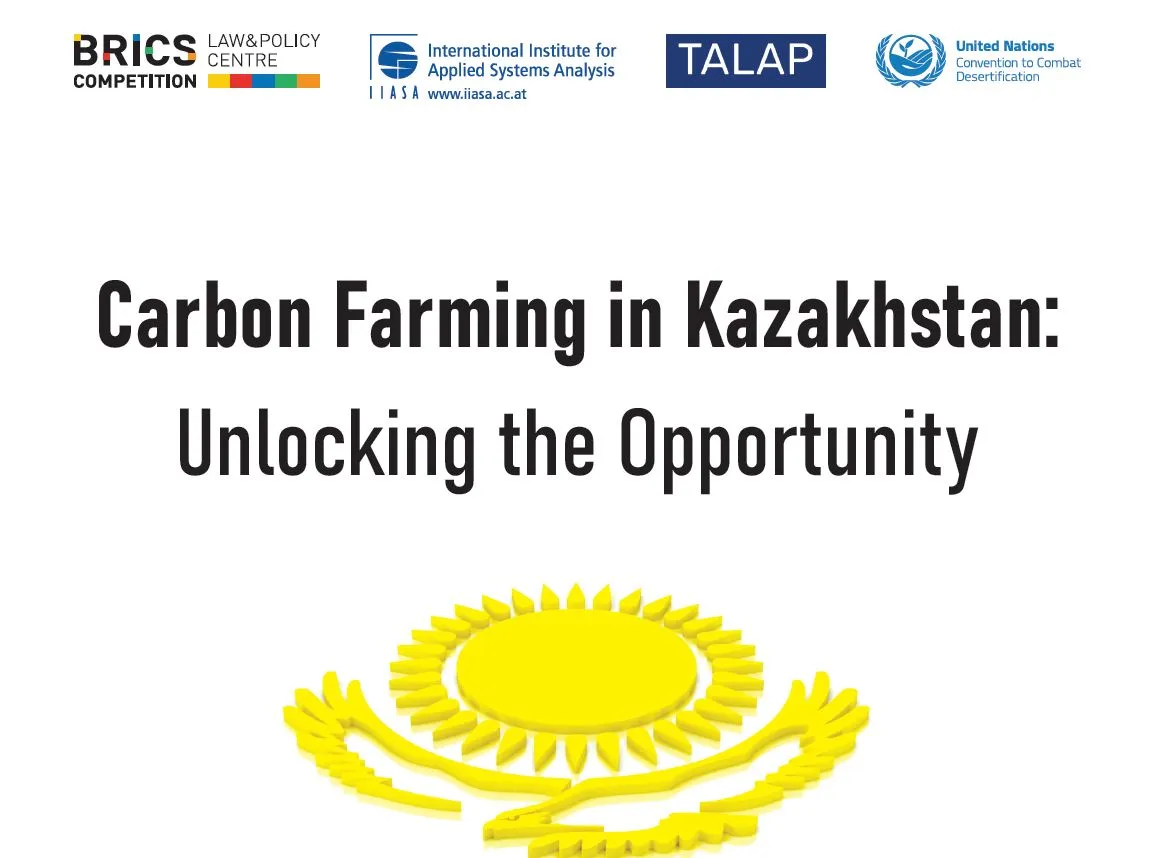
The report "Carbon Farming in Kazakhstan: Unlocking an Opportunity" to which WOCAT collaborated, has been published.
The report provides a comprehensive overview of the opportunities and challenges related to carbon farming and trading in Kazakhstan and, more broadly, on Central Asian drylands.
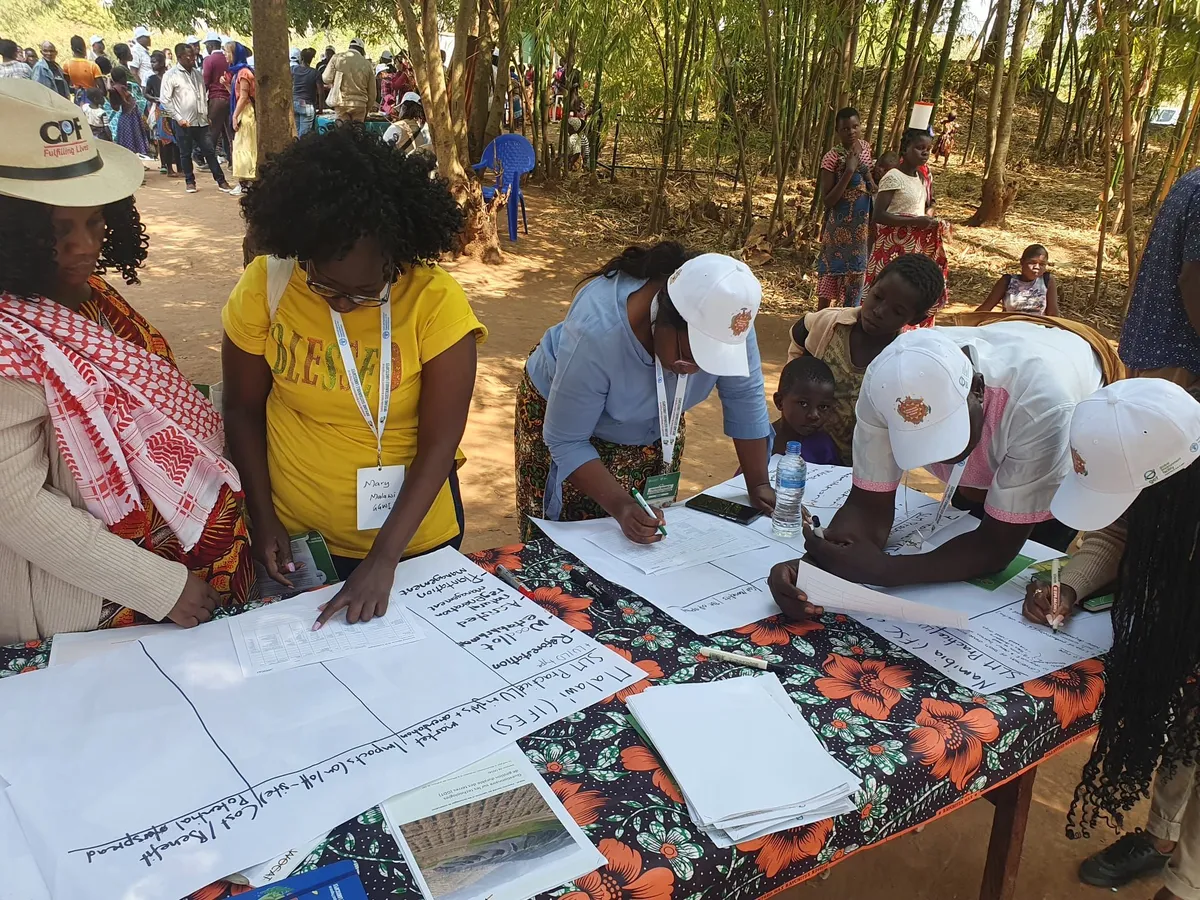
From 29 July to 2 August, researchers from CDE-WOCAT joined over 100 environmental experts from 10 African countries at the Second FAO GEF-7 Dryland Sustainable Landscapes Impact Program (DSL-IP) Southern Africa Stakeholders Workshop in Blantyre, Malawi. Their discussions, group work, and presentations focused, among other things, on SLM practices and Integrated Land Use Planning (ILUP) to achieve Land Degradation Neutrality (LDN). An inspiring field day highlighted the benefits of intercropping pigeon peas and maize, showcasing effective SLM measures for the region.
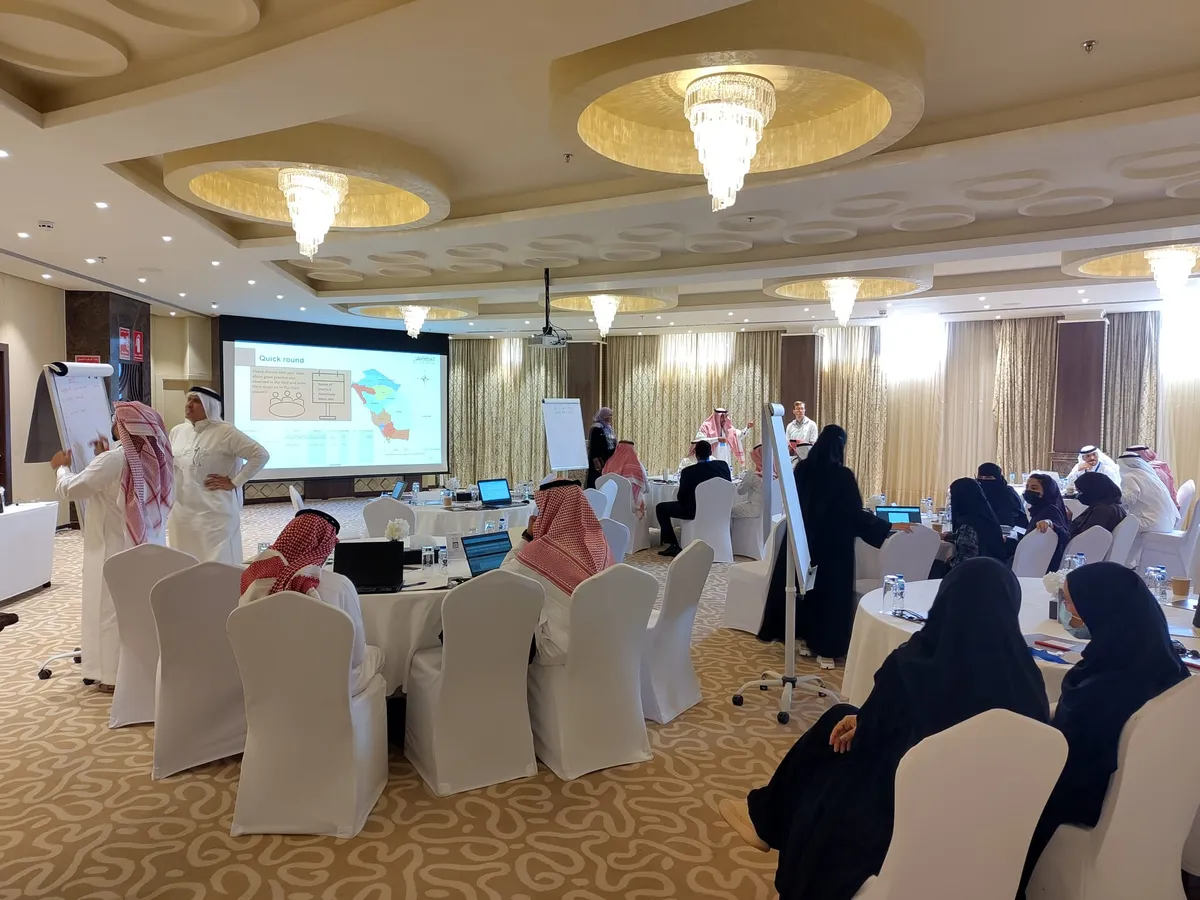
A WOCAT team from CDE and ICARDA, in collaboration with FAO Saudi Arabia, and the National Center for Vegetation Cover Development and Combating Desertification NCVC, organized a joint workshop to enhance and strengthen key stakeholders’ knowledge on SLM in Saudi Arabia. The workshop aimed to establish a common understanding of SLM, to develop participants’ capabilities and to identify challenges in the field of SLM. Further, it initiated the documentation of good SLM practices using the Global WOCAT SLM Database, supporting the development and implementation of a national SLM platform and framework for Saudi Arabia.
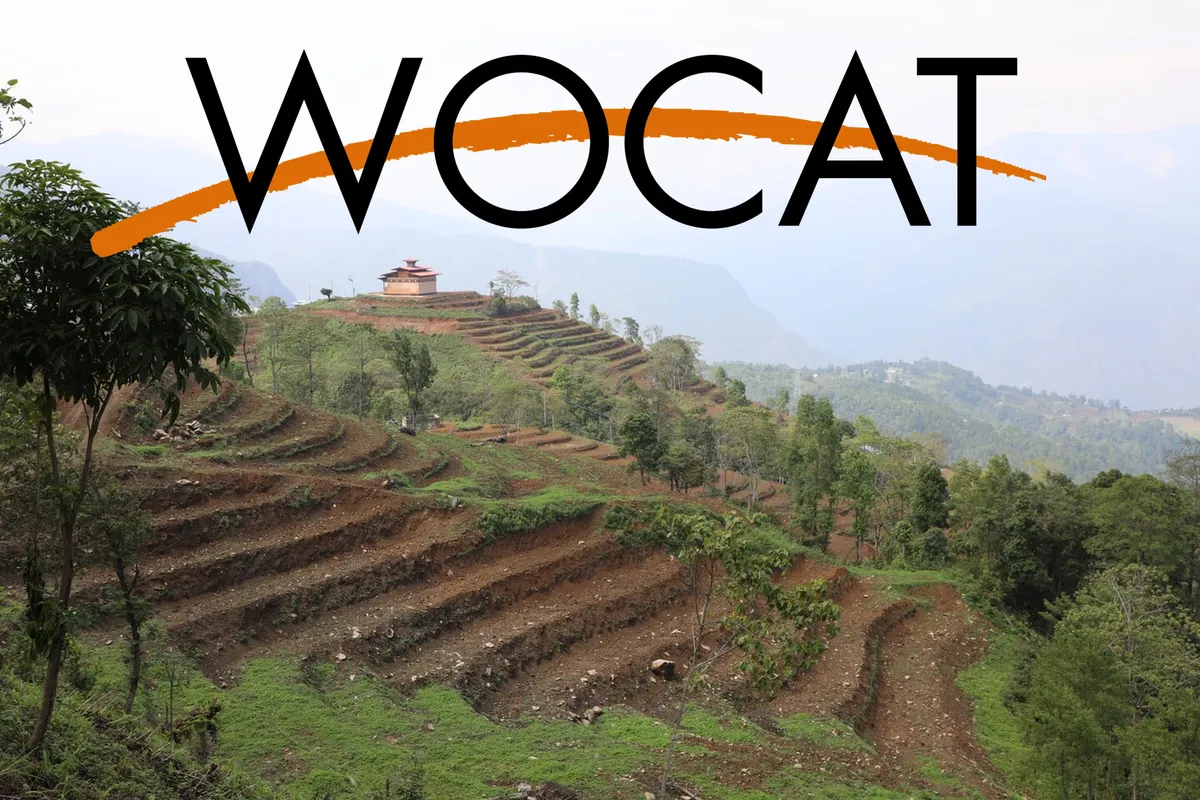
The WOCAT Newsletter January - June 2024 is out! As we reflect on the first half of this year, we are excited to share the latest news, updates, and publications from WOCAT and its partners. This issue highlights our digital expansion to LinkedIn and showcases a variety of upcoming events, workshops, and innovative projects designed to foster knowledge exchange and capacity building.
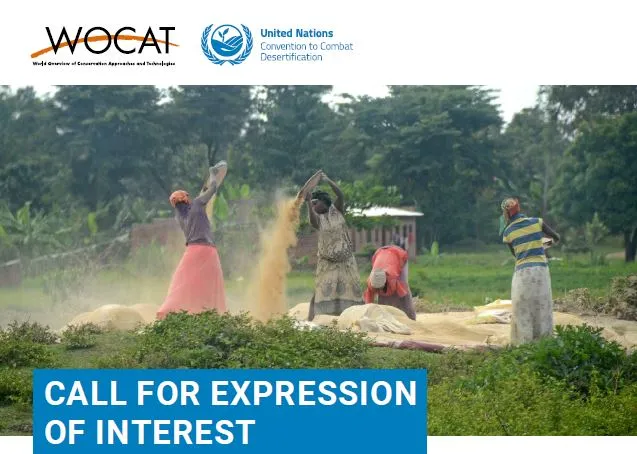
WOCAT, the UNCCD Secretariat and WeCaN are launching a call for expression of interest to collect country-specific gender-disaggregated data on Sustainable Land Management practices. We invite stakeholders worldwide to apply the gender-responsive SLM tool in their local contexts from September to November 2024. This is a unique opportunity to contribute to global gender equality efforts in Sustainable Land Management.
2024
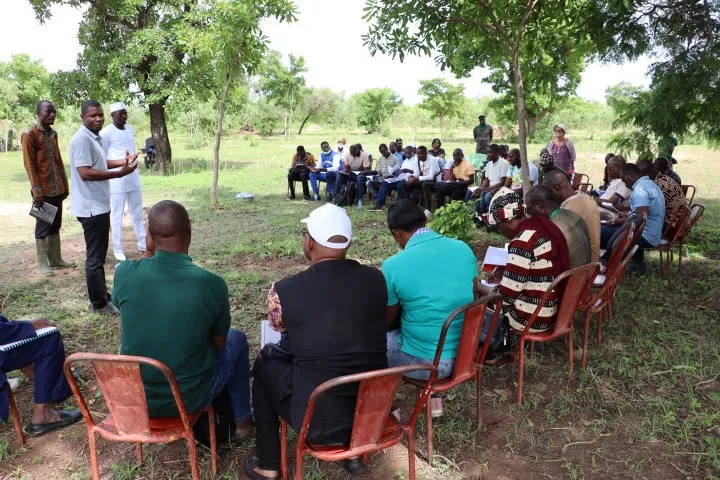
In the framework of the World Bank Progreen Sahel Landscape Restoration programme, the project “Gestion durable des Paysages Communaux pour la REDD+” in Burkina Faso, WOCAT organized and conducted a workshop on SLM practices and agrosilvopastoral systems for the region. Around 40 participants from Burkina Faso, Niger and Mali engaged in identifying problems and constraints to sustainable land resources management and finding solutions.
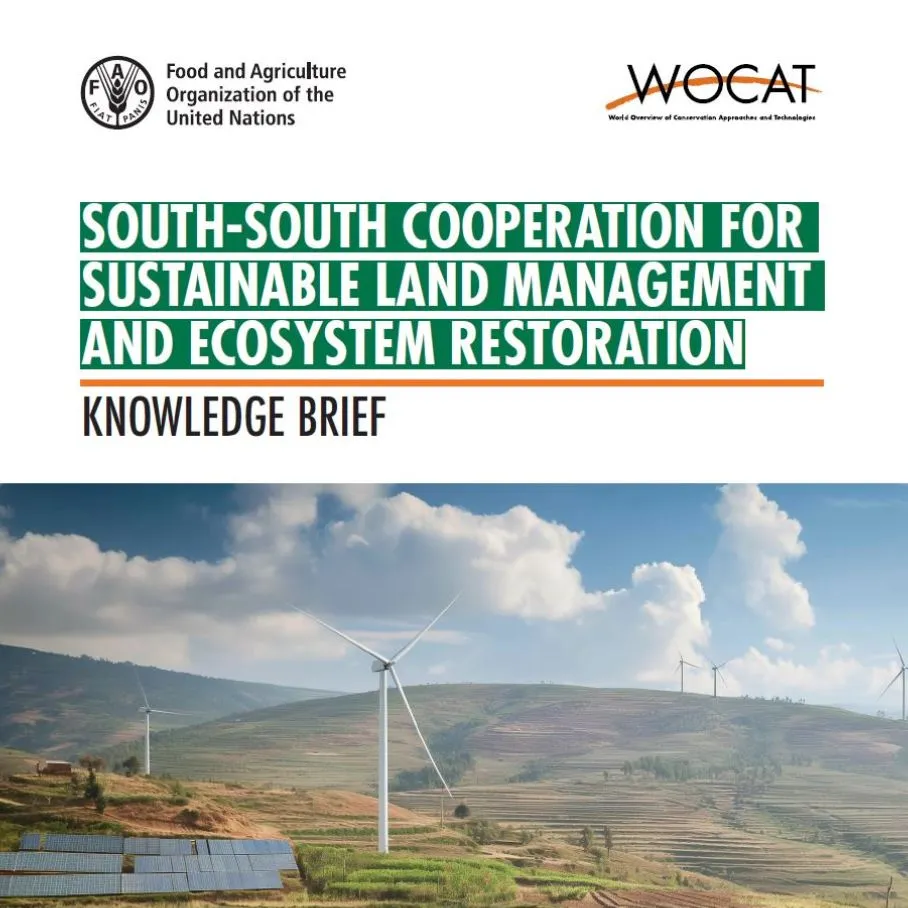
WOCAT and FAO have published a knowledge brief on South-South Cooperation (SSC) for SLM and ecosystem restoration. It is based on a survey of three regions in the global South: Latin America and the Caribbean, Central Asia and Near East and North Africa. The availability of a rich pool of knowledge is highlighted, and the enthusiasm to share and to learn is emphasized. The survey, which is available in several languages, is currently repeated globally to support the design and define the priorities of the WOCAT Regional Clusters.
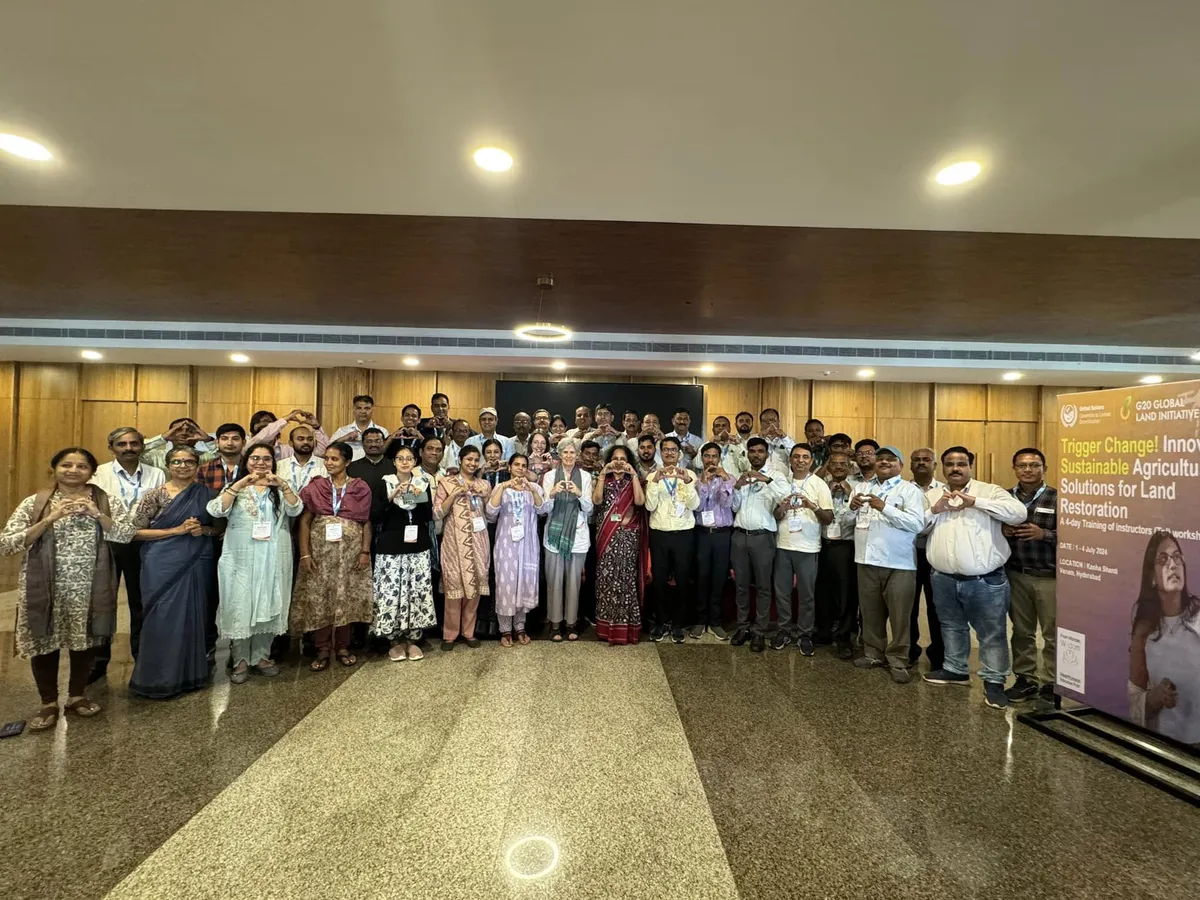
The training of instructors workshop for the UNCCD’s G20 Global Land Initiative (G20 GLI) "Trigger Change! Innovative Sustainable Agriculture Solutions for Land Restoration" counted 42 participants. The workshop was co-organized by the G20 GLI, the Indian Council of Agricultural Research (ICAR), and the Heartfulness Institute. The aim was to equip educators with the knowledge and tools needed to advance sustainable agriculture and land restoration.
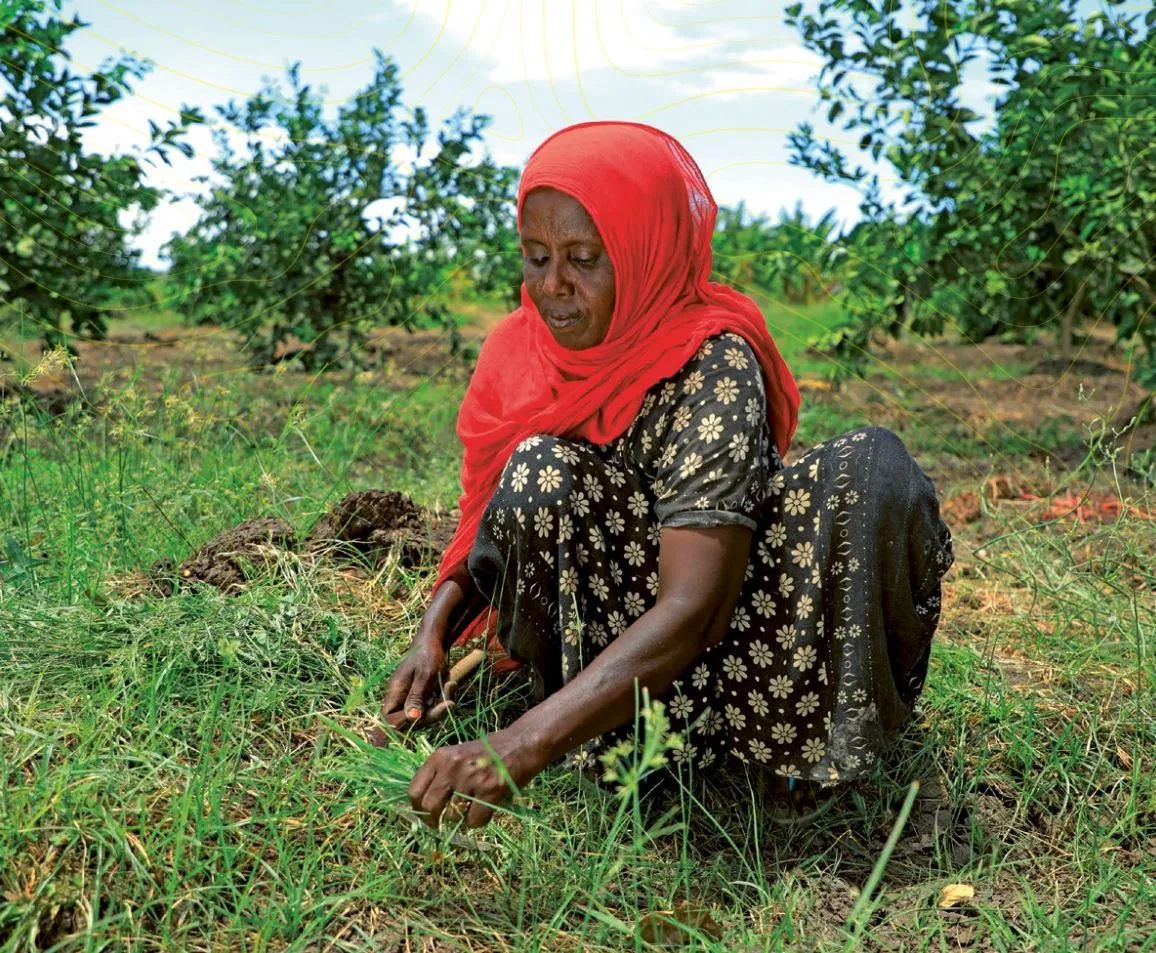
After "Fields of Harmony: Pulses and Sustainable Land Management", another two compilations of good practices have been released as part of GIZ ProSoil project: "Harvesting Tomorrow: Advancing Sustainable land management for Soil Fertility" and "Sowing sustainability: Agroecology and Sustainable Land Management in Synergy". The former highlights SLM practices that contribute to improved soil fertility and enhanced soil health, the latter addresses the emerging debate around the relationship between agroecology and regenerative agriculture.
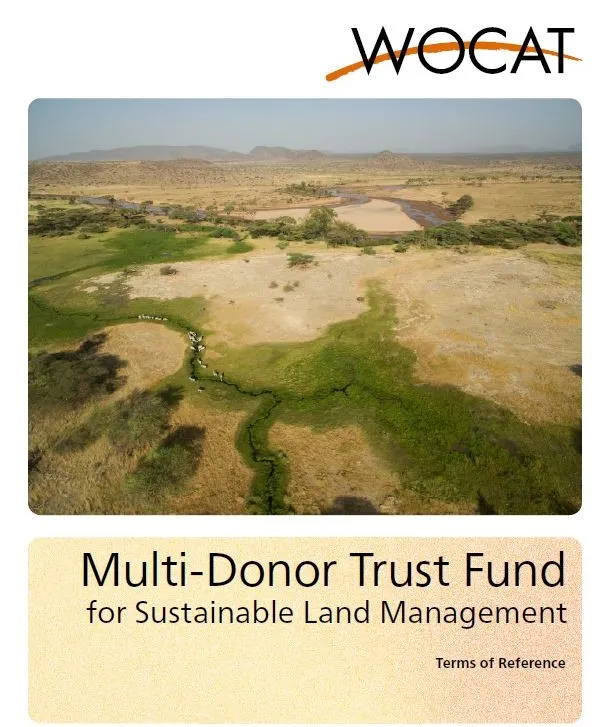
On the occasion of Desertification and Drought Day 2024, we are pleased to announce the new WOCAT Multi-Donor Trust Fund for Sustainable Land Management.
This fund will serve as a sustainable funding mechanism, consolidating various sources to streamline WOCAT's global and regional operations and enhance management efficiency. It will particularly strengthen the establishment of new WOCAT regional clusters and support small, innovative SLM projects on the ground. The fund is currently being established and will be officially launched at the UNCCD COP16 in Riyadh in December 2024.
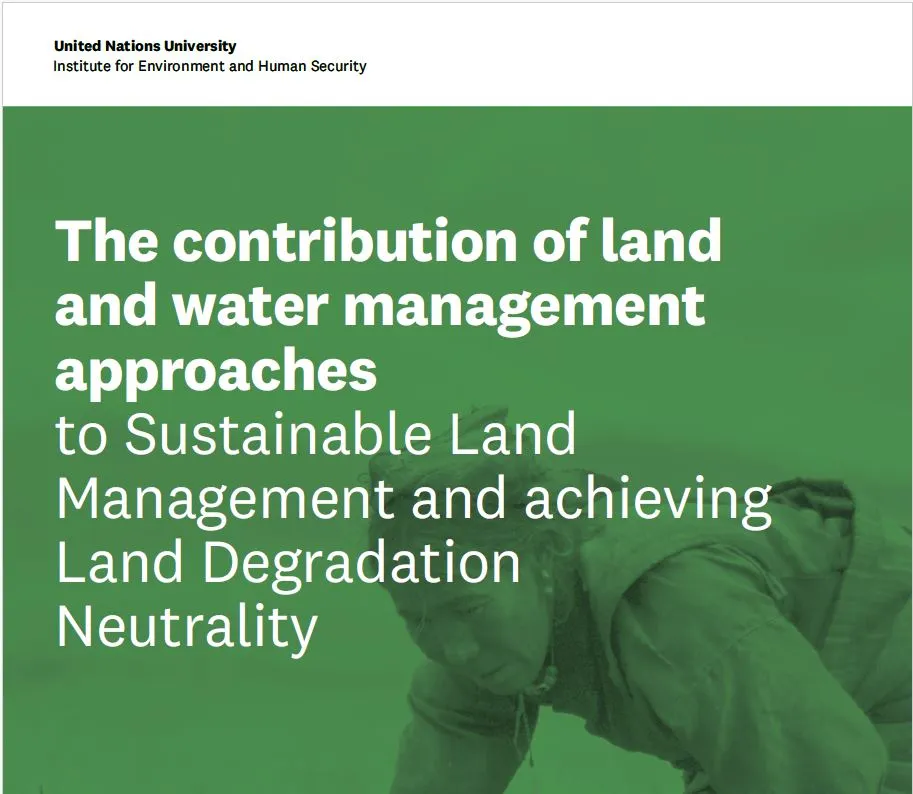
The United Nations University Institute for Environment and Human Security (UNU-EHS) report "The contribution of land and water management approaches to Sustainable Land Management and achieving Land Degradation Neutrality" is out now. This report is a direct response to the UNCCD Decision 19/COP.15/23/Add.1.
Additional to the policy brief, there is also a scientific article available on the same topic.
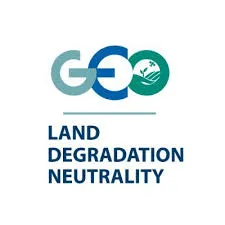
GEO-LDN has launched Working Group 4: Decision Support, placed at the interface between science and policy. WG4 is designed to support the integration of global, national and local contexts into the use of tools and geospatial datasets and is dedicated to support robust and sustainable Earth observation value chains that provide co-designed Earth insights, knowledge and intelligence for policy and decision making.
You can join WG4 through this form.
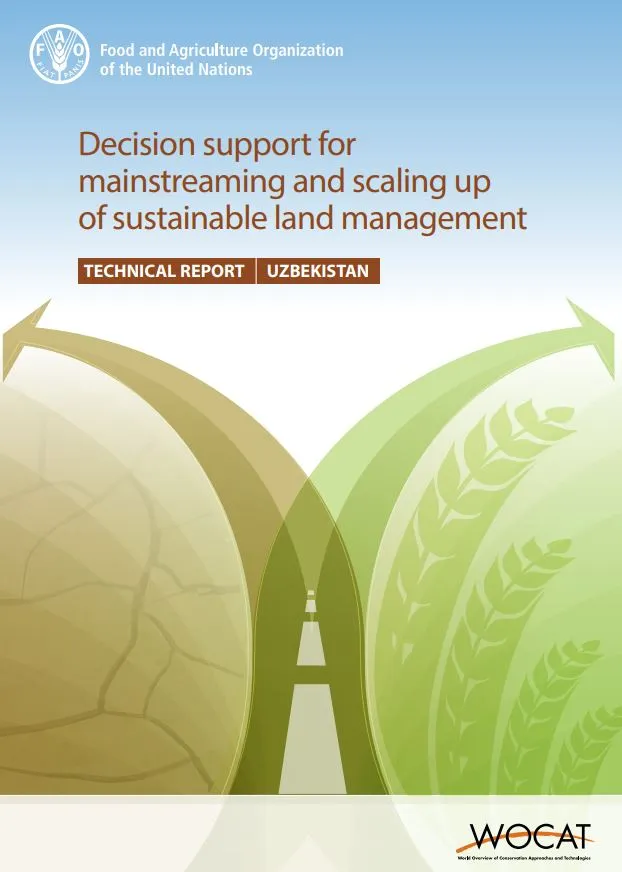
Mainstreaming SLM into national and/or subnational agricultural plans, policies and programmes can be a challenge, as can supporting evidence-based strategy formulation at national level through the use of a decision-support system and appropriate tools. This report summarizes the main findings from the implementation of the project “Decision Support for Mainstreaming and Scaling up of Sustainable Land Management (DS-SLM)” in Uzbekistan, by applying the framework for decision support (DSF), which integrates land degradation assessments, SLM implementation, SLM mainstreaming and scaling-out, and knowledge management for informed decision-making at local, subnational and national levels. The results of the project, as well as the mainstreaming strategy developed, can serve as a guide for decision-makers in developing landscape interventions, as well as programmes on natural resource management that will build the resilience of communities.
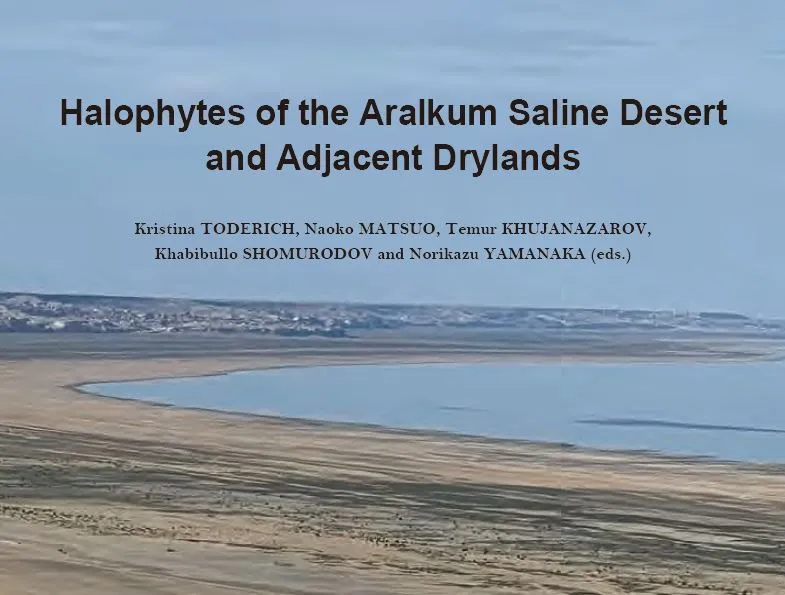
Former partner of WOCAT for Central Asia, Kristina Toderich, is co-autor of the new publication on the Aralkum Desert. The publication is the result of a collaboration between the Arid Land Research Center (ALRC), the International Platform for Dryland Research and Education (IPDRE), Tottori University, and researchers in Uzbekistan. After the Aral Sea having dried up due to human activities, a new ecosystem called Aralkum Desert has emerged. In this book, the authors describe the use of salt-tolerant plants and the possible introduction into a saline agricultural production system.
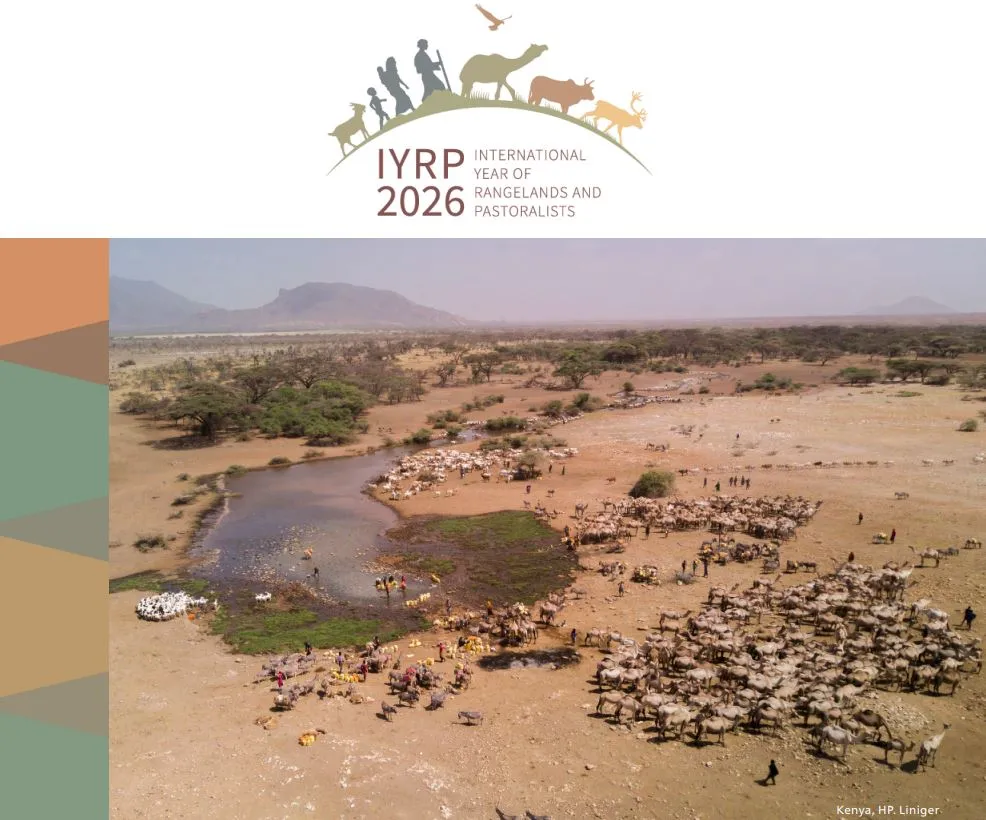
The IYRP Rangelands & Land Degradation Neutrality Working Group has prepared a policy brief on global actions for sustainable rangelands and pastoralism to achieve LDN. It calls for a shift in perspective from viewing rangelands as problems to recognizing them as a sustainable solution. The policy brief includes eight recommendations for the UNCCD COP such as stopping indiscriminate conversion of rangelands, recognizing the importance of pastoral mobility or promoting integrated, multifunctional land use.
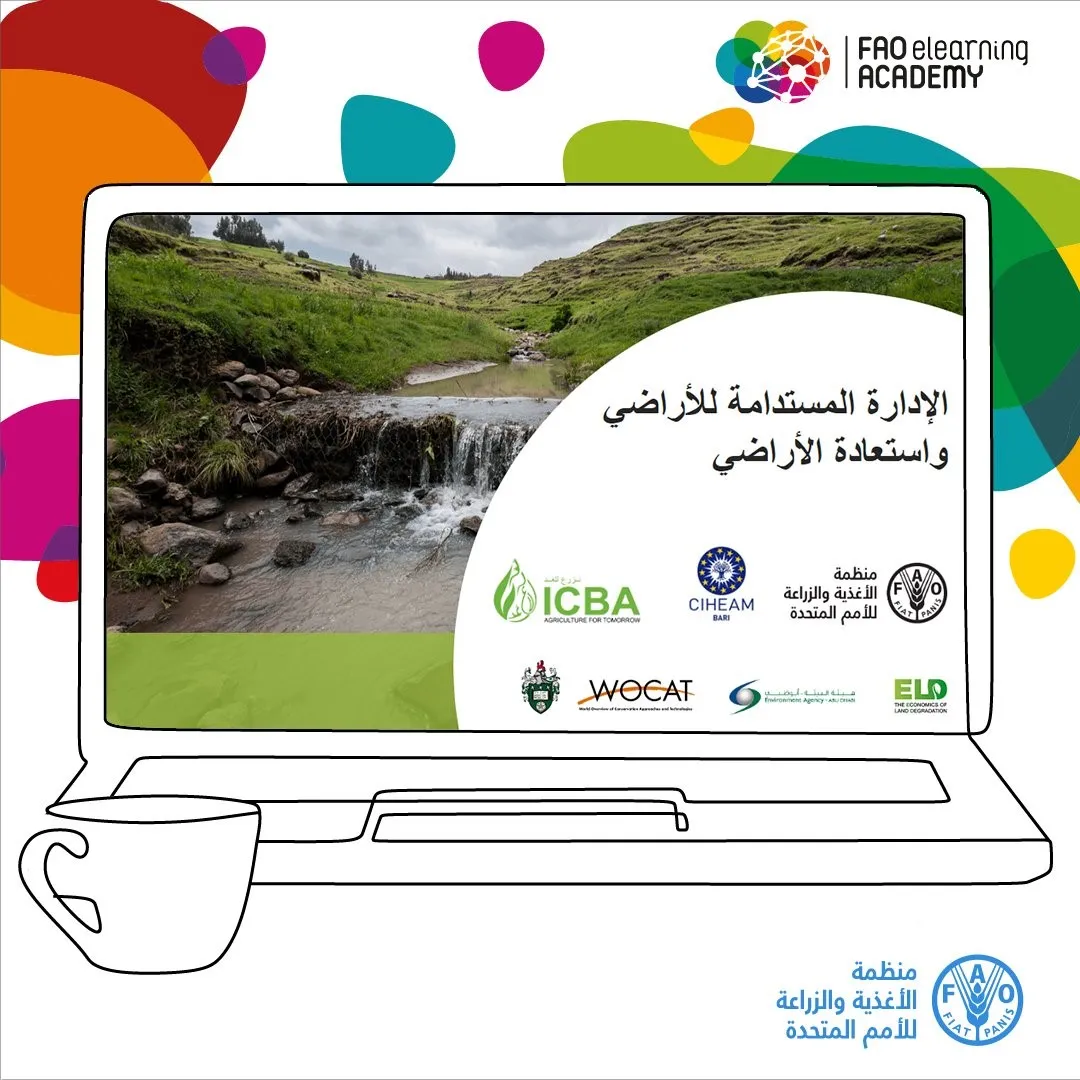
The FAO elearning Academy has launched a new free online course on SLM and restoration: "Using land-cover information to monitor progress on Sustainable Development Goal 15". It provides guidance to policy makers, practitioners and land users in the selection, planning, implementation and monitoring of SLM interventions.
The course has been developed in collaboration with UNCCD, GEO-LDN and GIZ, and has been supported by WOCAT. The ICBA made the course available in Arabic.
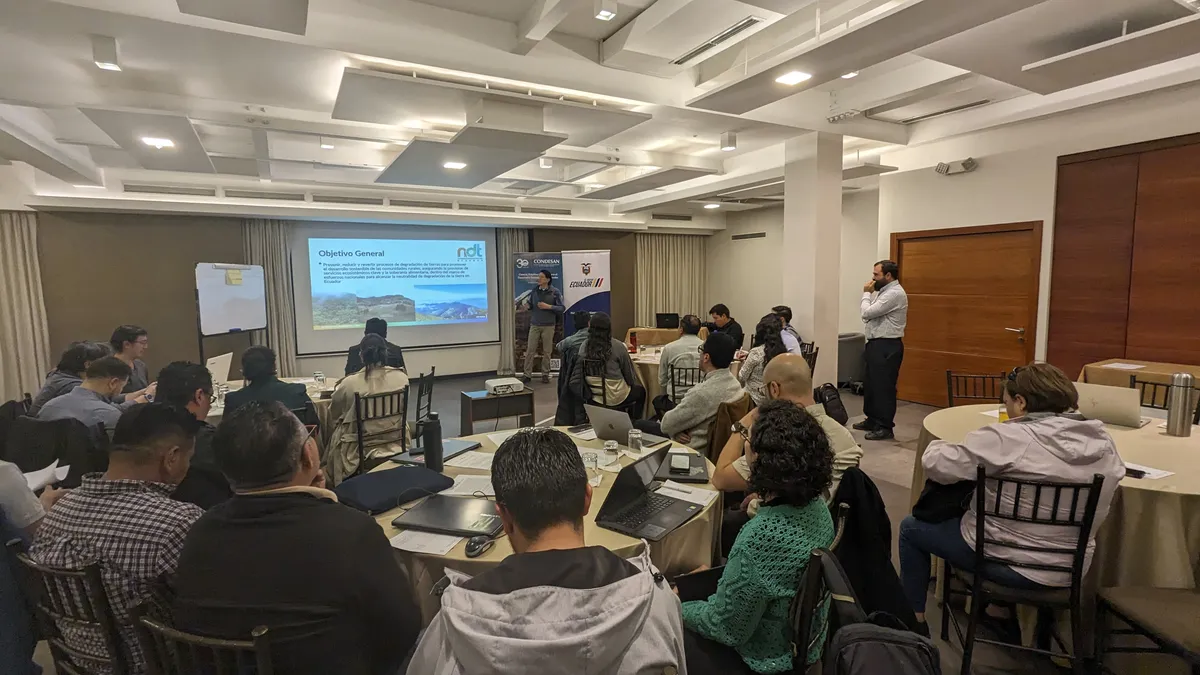
Together with Condesan, WOCAT is organizing a 3-day workshop in Quito, Ecuador. Diverse institutions are coming together for a participatory assessment of land degradation, aiming to set a national strategy for LDN. With opening remarks and representatives also the Ministry of Environment, Water, and Ecological Transition (MAATE) and the Ministry of Agriculture and Livestock (MAG) are part of the event.
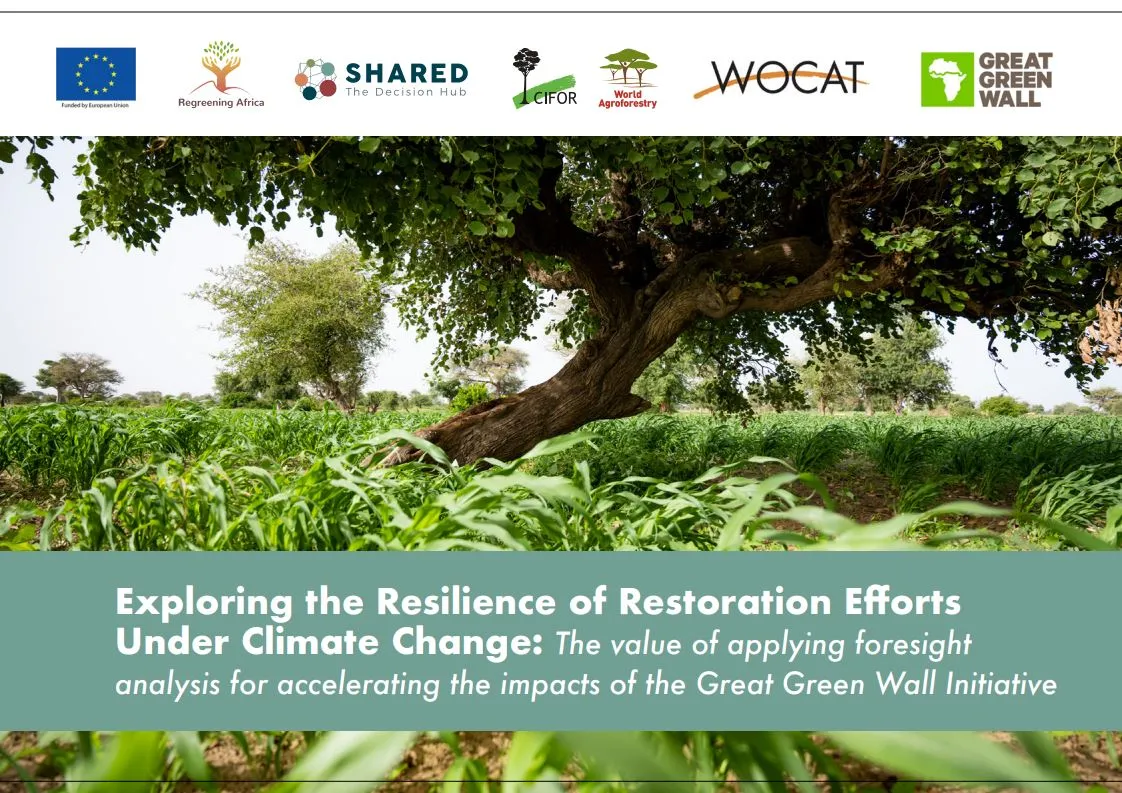
As part of the European Union funded Regreening Africa, a SHARED led indicative participatory foresight analysis for the Great Green Wall was published. The brief explores the resilience of restoration efforts under climate change and highlights the value of applying foresight analysis for accelerating the impacts of the Great Green Wall Initiative. Among others, the brief is building on data from WOCAT and the affiliated Carbon Benefits Project, which offers tools for assessing the carbon benefits and greenhouse gas emissions of an SLM Technology.
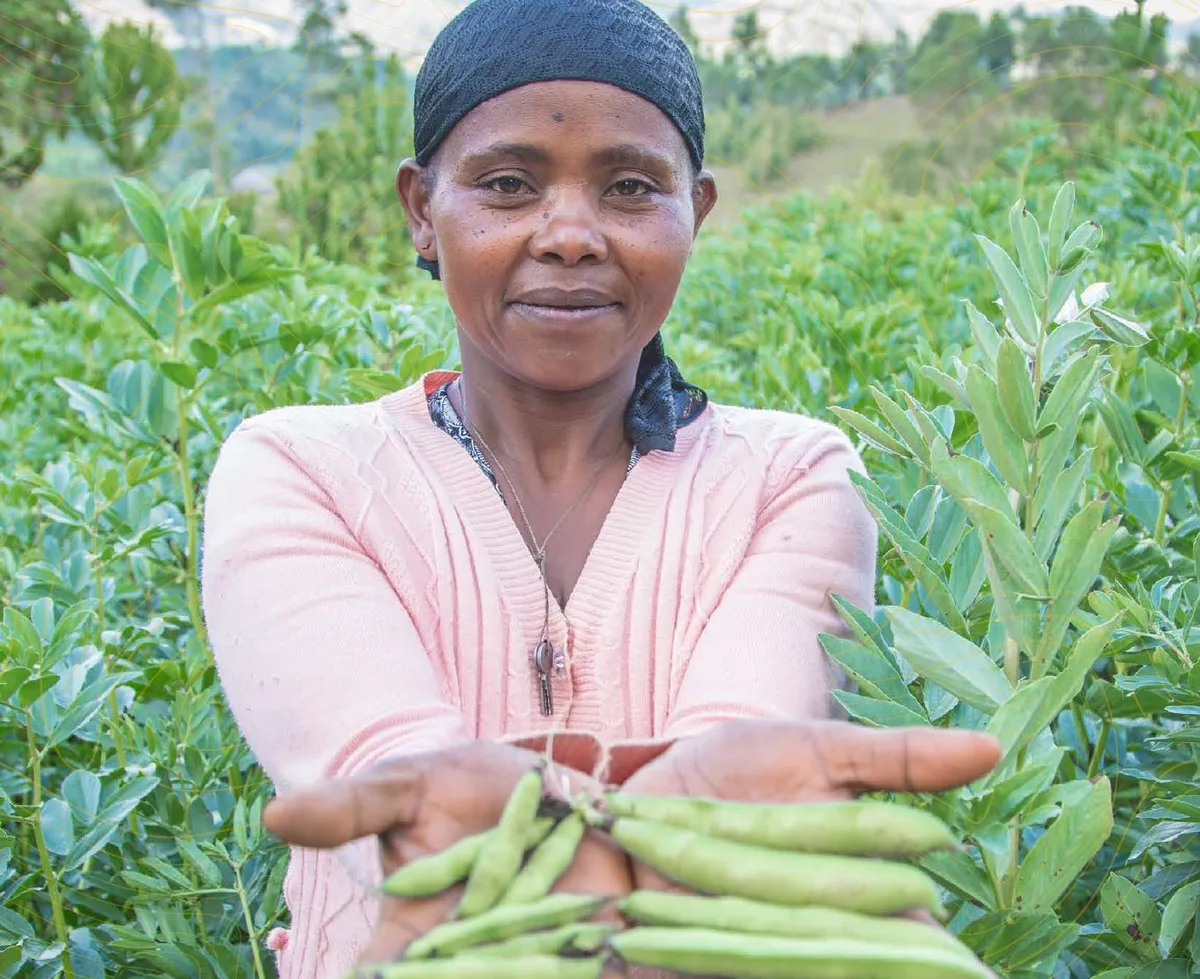
Discover our newest publication. It's a compilation of SLM practices documented within the ProSoil Project and focuses on pulses and their vital role in SLM by enhancing soil fertility and reducing greenhouse gas emissions. The publication was jointly elaborated with our Consortium Partners GIZ and Alliance Bioversity International & CIAT and launched on the World Pulses Day.
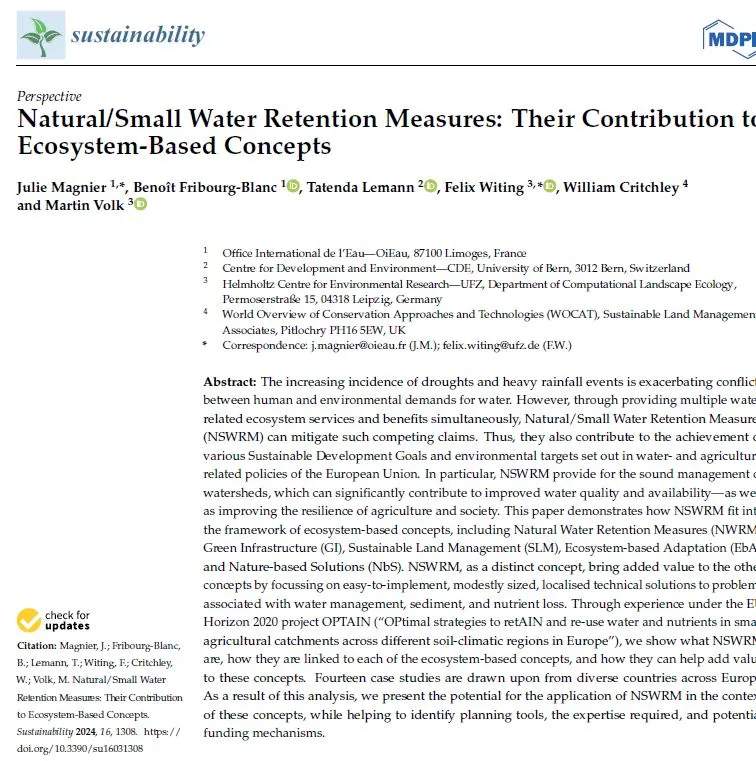
Through experience under the EU Horizon 2020 project OPTAIN, the authors show what NSWRM are, how they are linked to each of the ecosystem-based concepts, and how they can help add value to these concepts. They present the potential for the application of NSWRM in the context of these concepts, while helping to identify planning tools, the expertise required, and potential funding mechanisms. The fourteen case studies as many other NSWRM documented within OPTAIN are available in the WOCAT SLM Database.
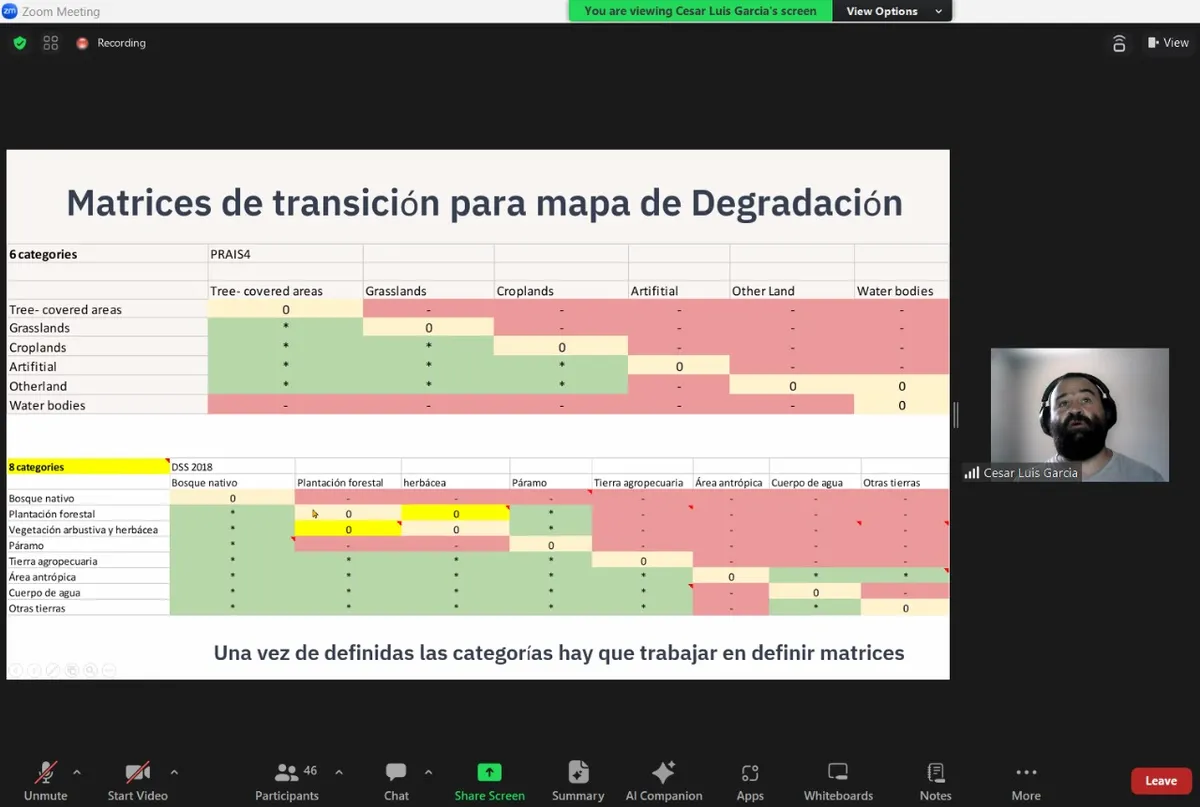
The recent workshop on LDN monitoring in Ecuador, led by WOCAT in collaboration with CONDESAN and the Ministry of Environment, focused on estimating Land Productivity Dynamics, a key LDN indicator. As part of the project funded by the GEF and implemented by CONDESAN and FAO, the workshop aimed to train participants in the methodology for land productivity estimation and identify suitable approaches for Ecuador. The session contributed to Ecuador's efforts in achieving LDN goals and SLM.
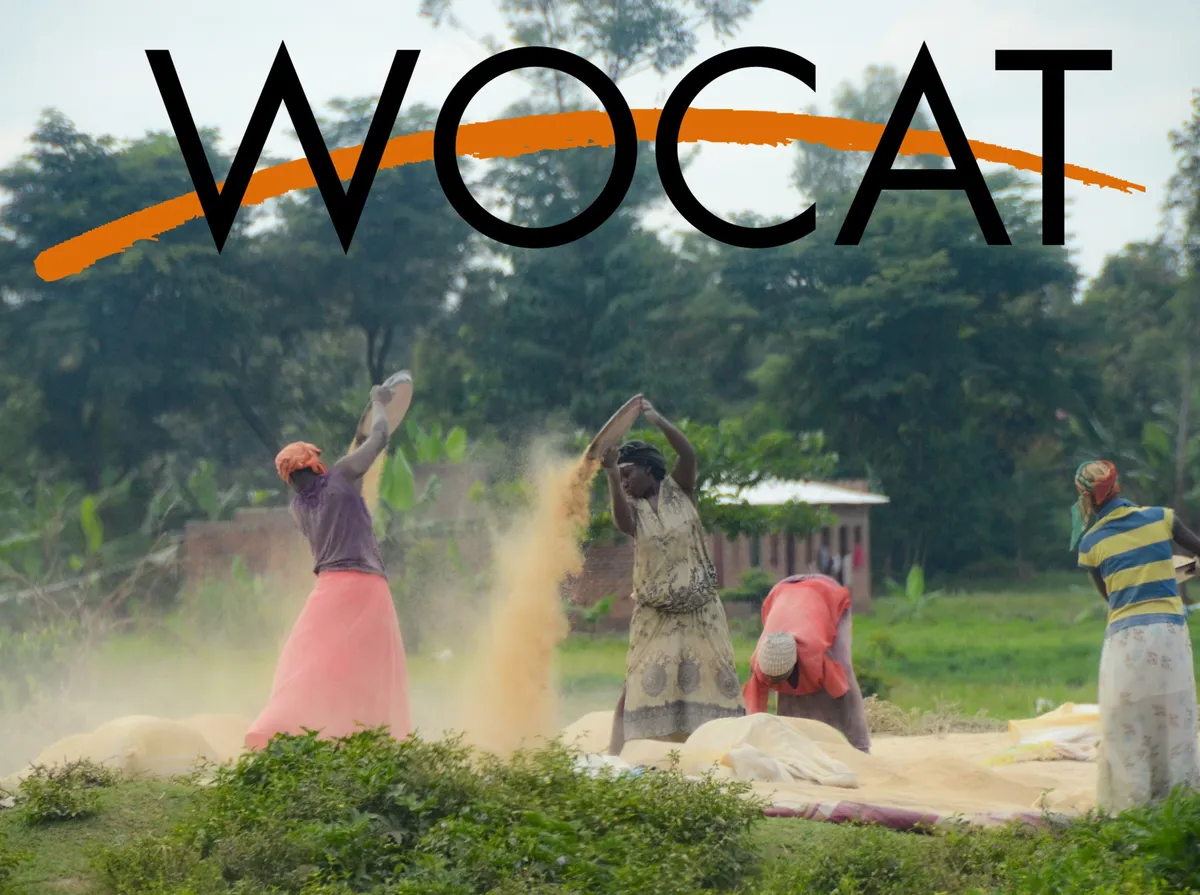
We are looking back at a productive latter half of 2023 culminating with the UNCCD Committee for the Review of the Implementation of the Convention (CRIC) in Samarkand, Uzbekistan. In collaboration with partners, we organized a series of impactful global, regional and national events, fostering Sustainable Land Management (SLM) and Land Degradation Neutrality (LDN) capacity building, knowledge sharing and dissemination.
2023
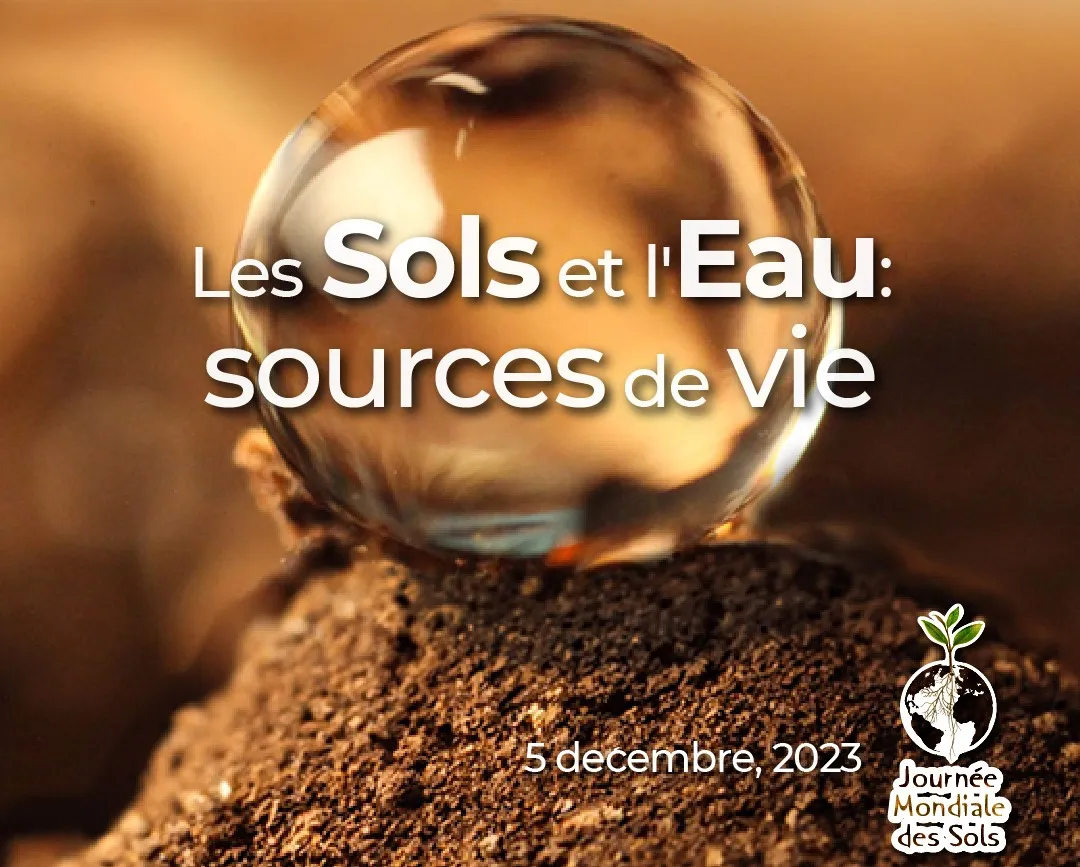
For the annual World Soil Day celebrated on December 5, this year WOCAT is sharing good practices form Madagascar, developed, tested and implemented with success in collaboration with WOCAT consortium partner GIZ. The SLM technologies were documented as part of the ProSoil Project, which aims conserving and rehabilitating soil to promote food security and climate protection.
Another highlight of this year's World Soil Day is the interview of WOCAT Executive Team member Tatenda Lemann.
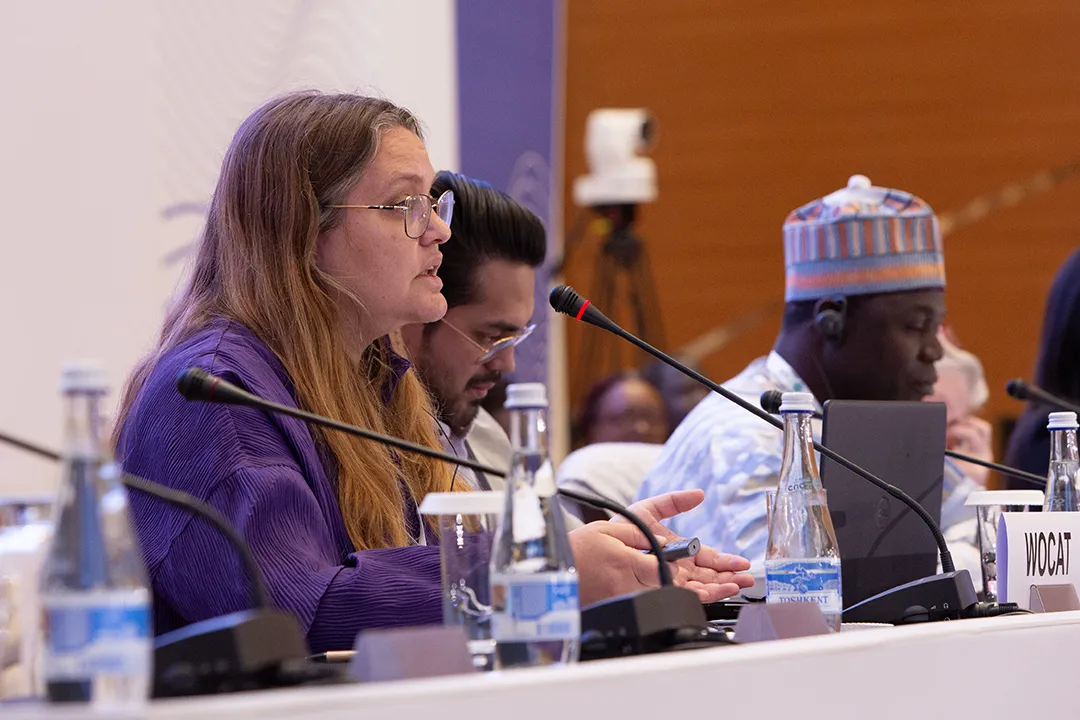
WOCAT's LDN expert Dr. Ingrid Teich shared valuable insights during the UNCCD CRIC21 interactive plenary discussion on 16 November 2023, reflecting on the experiences acquired through WOCAT’s provision of technical assistance for land degradation monitoring and reporting in various pilot countries. Despite time constraints, countries were able to integrate default data with more in-depth analysis, enabling the reclassification of data categories to better reflect local realities.
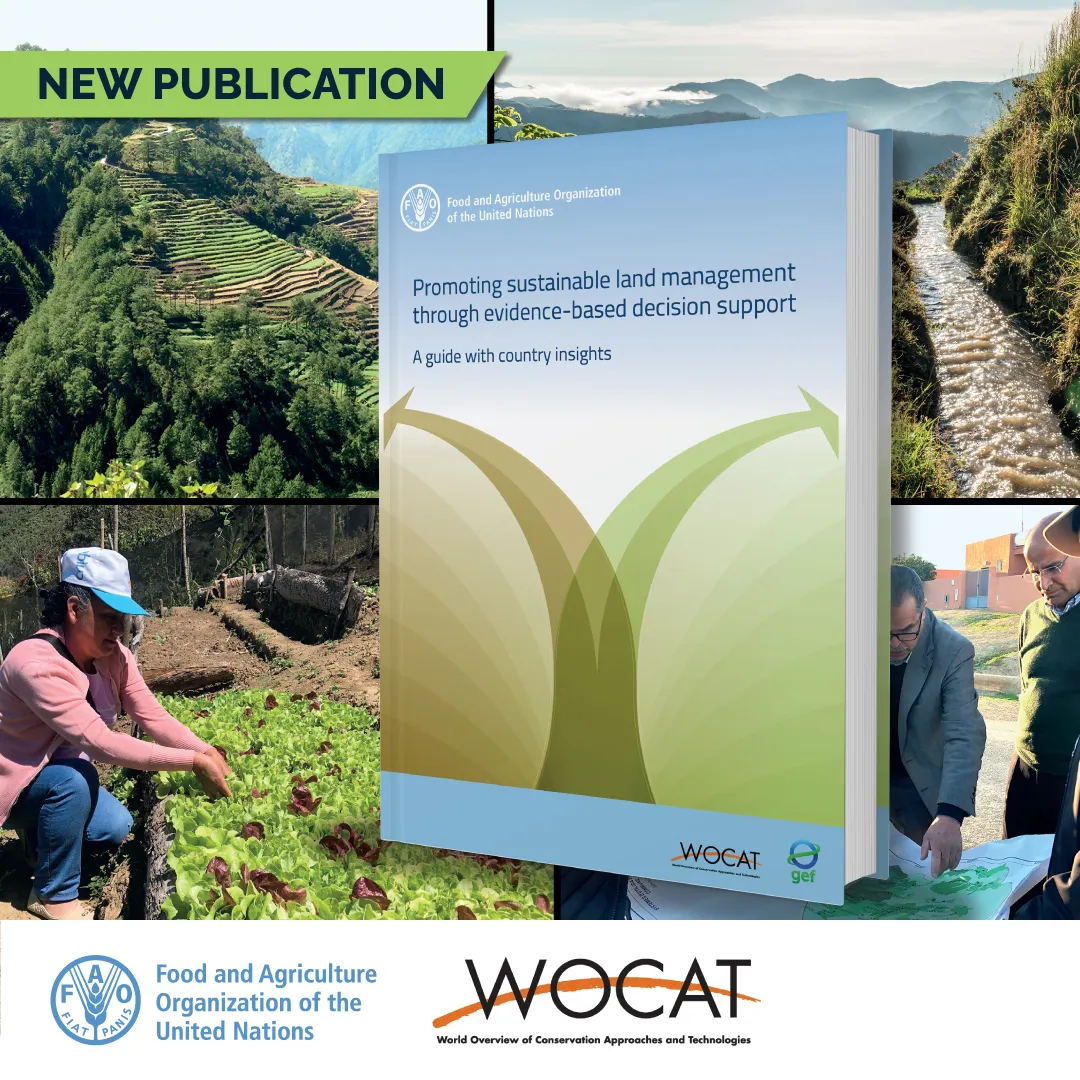
As part of the GEF-funded FAO project "Decision Support for Mainstreaming and Scaling Out Sustainable Land Management", a guide on promoting SLM through evidence-based decision support has been published. The publication serves as a step-by-step guide for the application and implementation of the DSF during planning, design and implementation of SLM interventions. It will be launched at UNCCD CRIC21 at WOCAT's side event "Learning from each other: successful experiences on knowledge exchange and South South Cooperation for achieving Land Degradation Neutrality" on Friday 17 November, 13:00 - 15:00, MET-10.
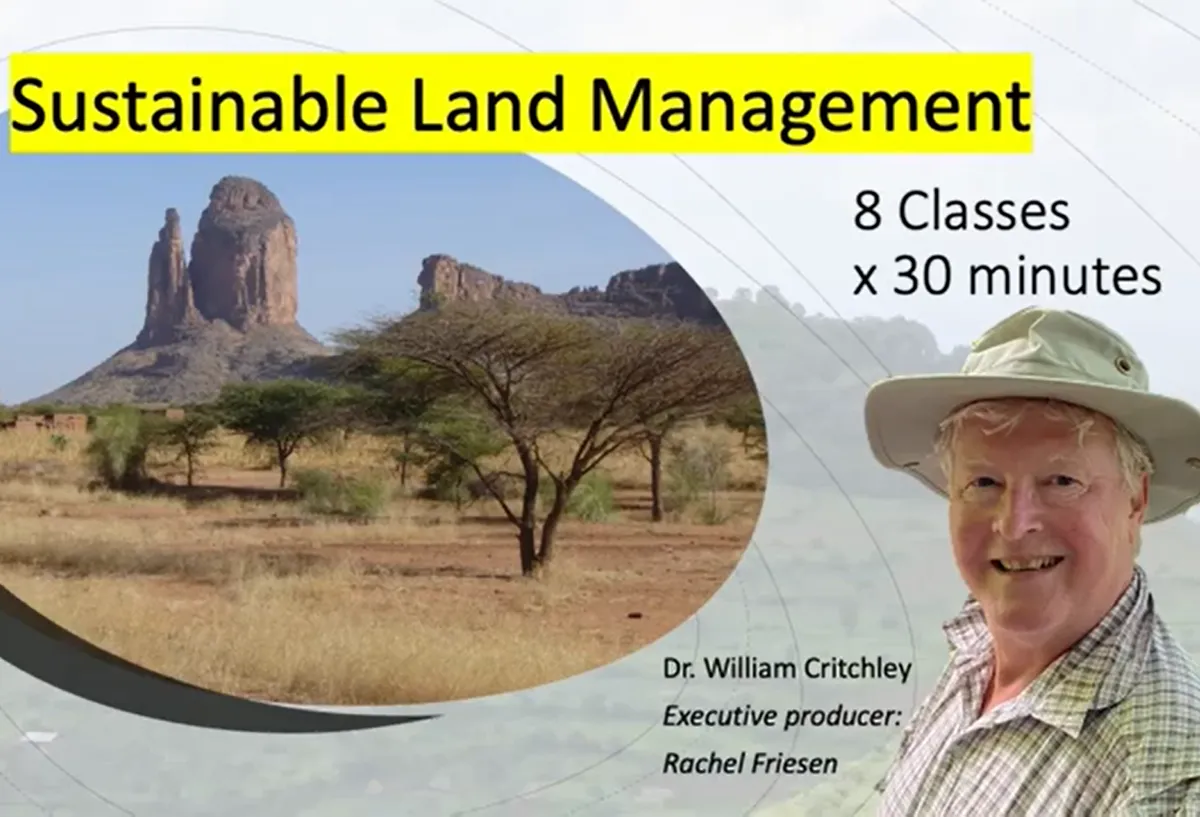
Dr. William Critchley, WOCAT associated researcher, has developed an online course on Sustainable Land Management (teaser). The course (8 classes, 30min each) is targeted at in-service professionals and university students. The aim is to improve the understanding of SLM and to sharpen the skills in designing solutions on the ground.
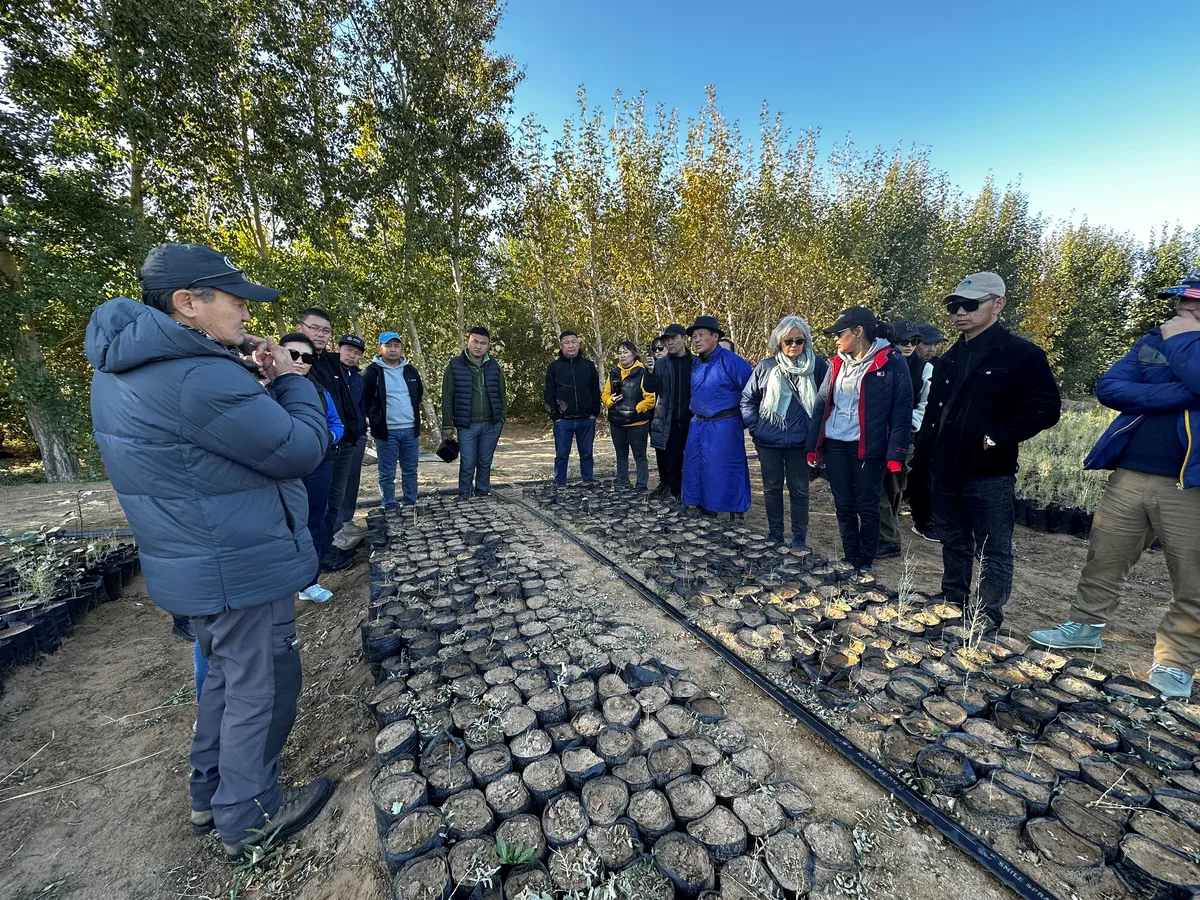
As part of the FAO GEF DSL-IP project "Promoting Dryland Sustainable Landscapes and Biodiversity Conservation in the Eastern Steppe of Mongolia", 40 local decision makers from 3 Aimags and 9 Soums from eastern Mongolia participated in a field study tour to the Southern Gobi. The objective of this study tour was to show and exchange experiences on SLM practices that are being implemented and their results and impact on the area and local communities.
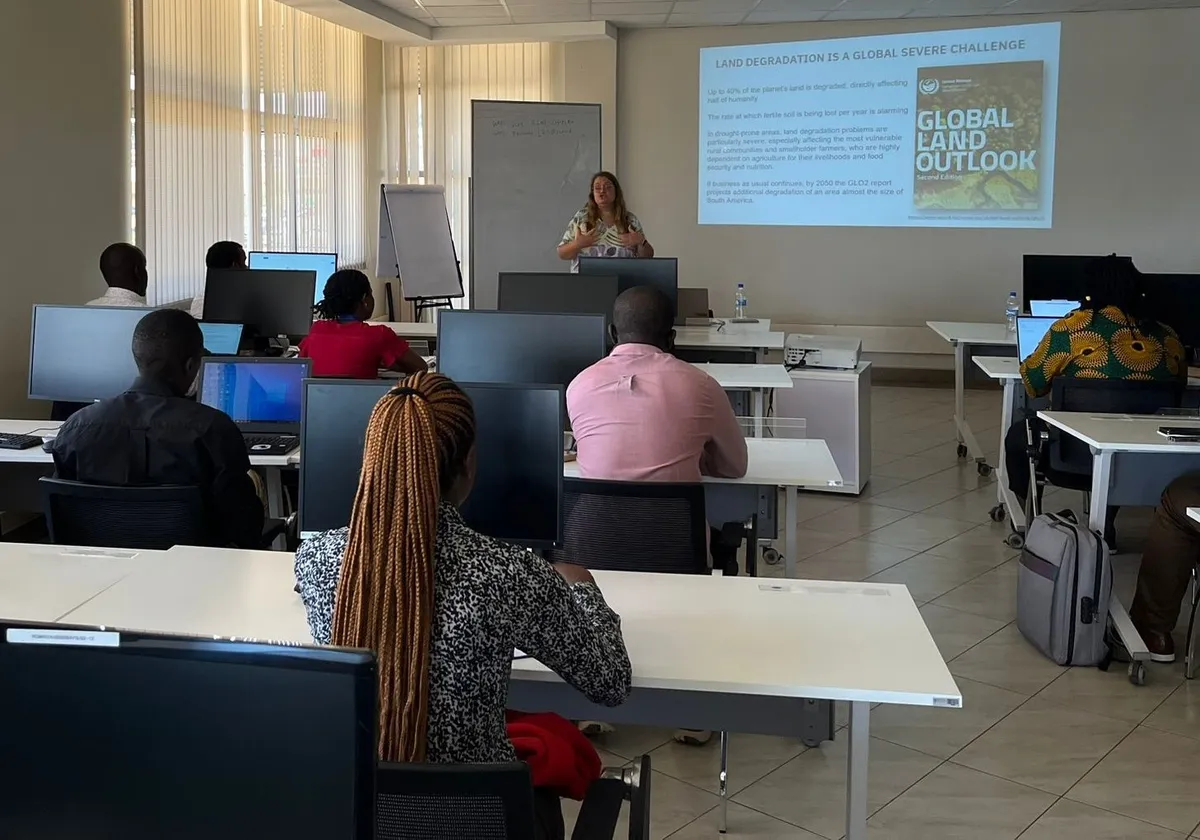
WOCAT is proud to be part of the training of trainers on the GEO LDN Toolbox at the Regional Centre for Mapping of Resources for Development (RCMRD) in Nairobi. Goal of the training is to empower participants to become LDN experts and change-makers in SLM. The course is in full swing consisted so far of a deep dive into LDN concepts and its ties to UN conventions (day 1) and insights into Earth Observation and the crucial link between LDN and Integrated Land Use Planning (day 2).
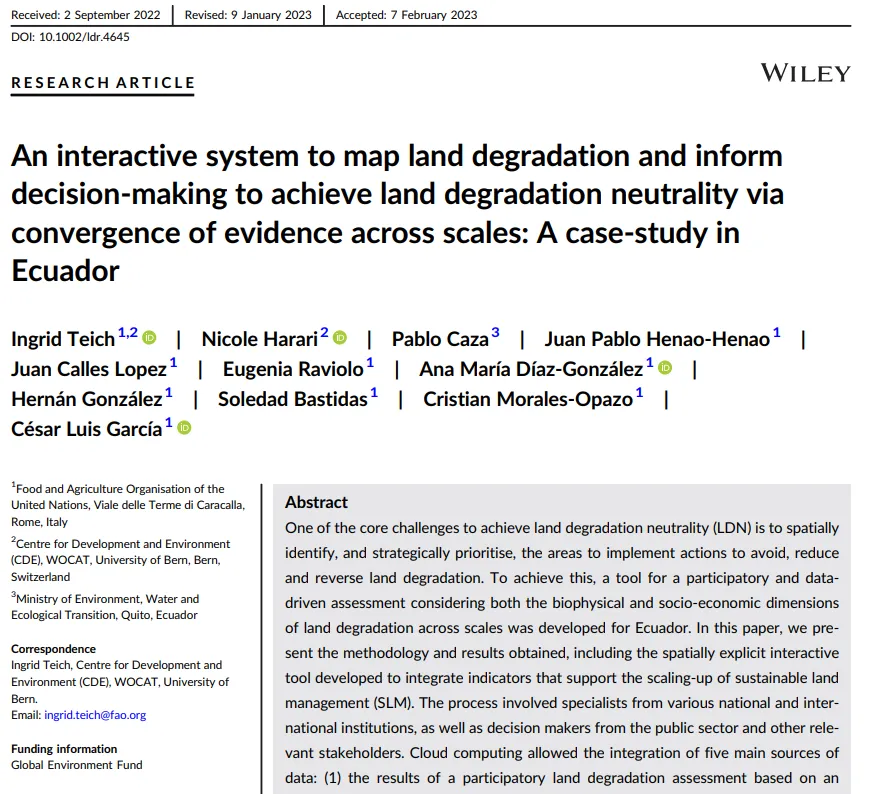
This paper presents a novel approach to address the challenge of achieving land degradation neutrality (LDN) in Ecuador. The methodology involves a participatory and data-driven assessment, integrating both biophysical and socio-economic dimensions of land degradation. This tool not only identifies degradation hotspots but also ensures ownership and support for Ecuador's LDN goals, offering a replicable model for other countries and regions.
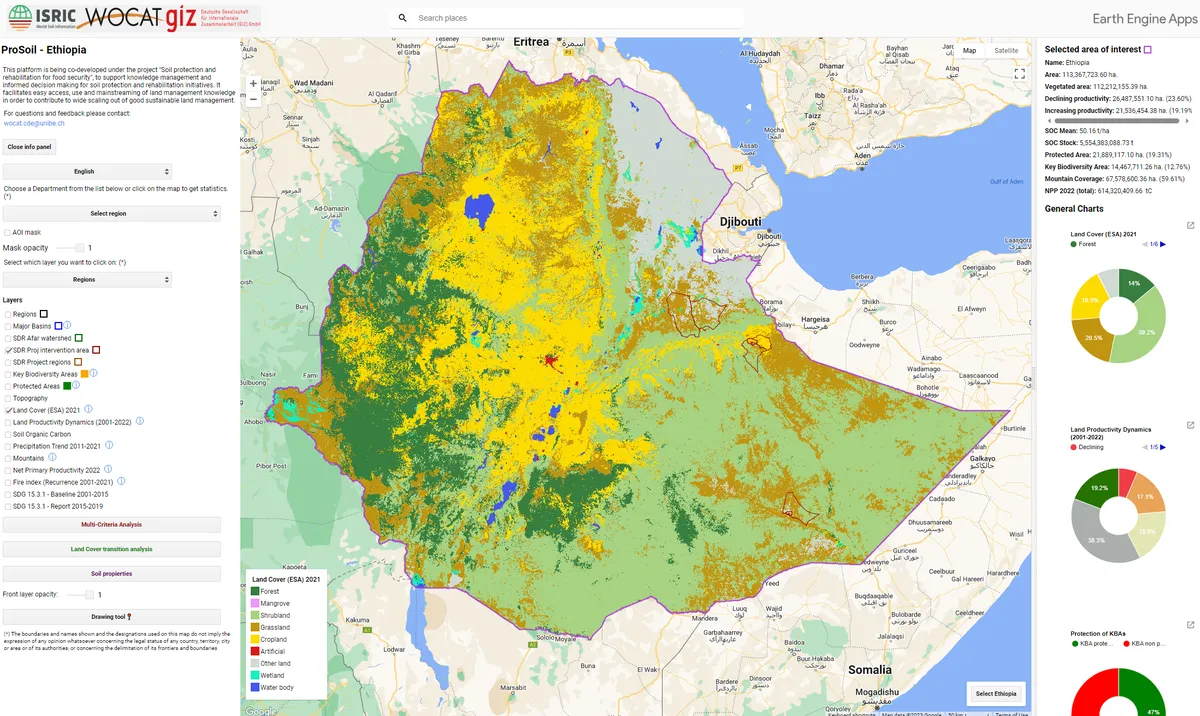
In late July, a WOCAT training took place in Addis Ababa, focusing on EarthEngine in collaboration with the GIZ ProSoil project. Participants representing the Ministry of Agriculture, agricultural bureaus, and the Alliance of Bioversity International and CIAT learned to access satellite image catalogs and analyze time series to implement the principle of Convergence of Evidence to map Land Degradation Neutrality in Ethiopia.
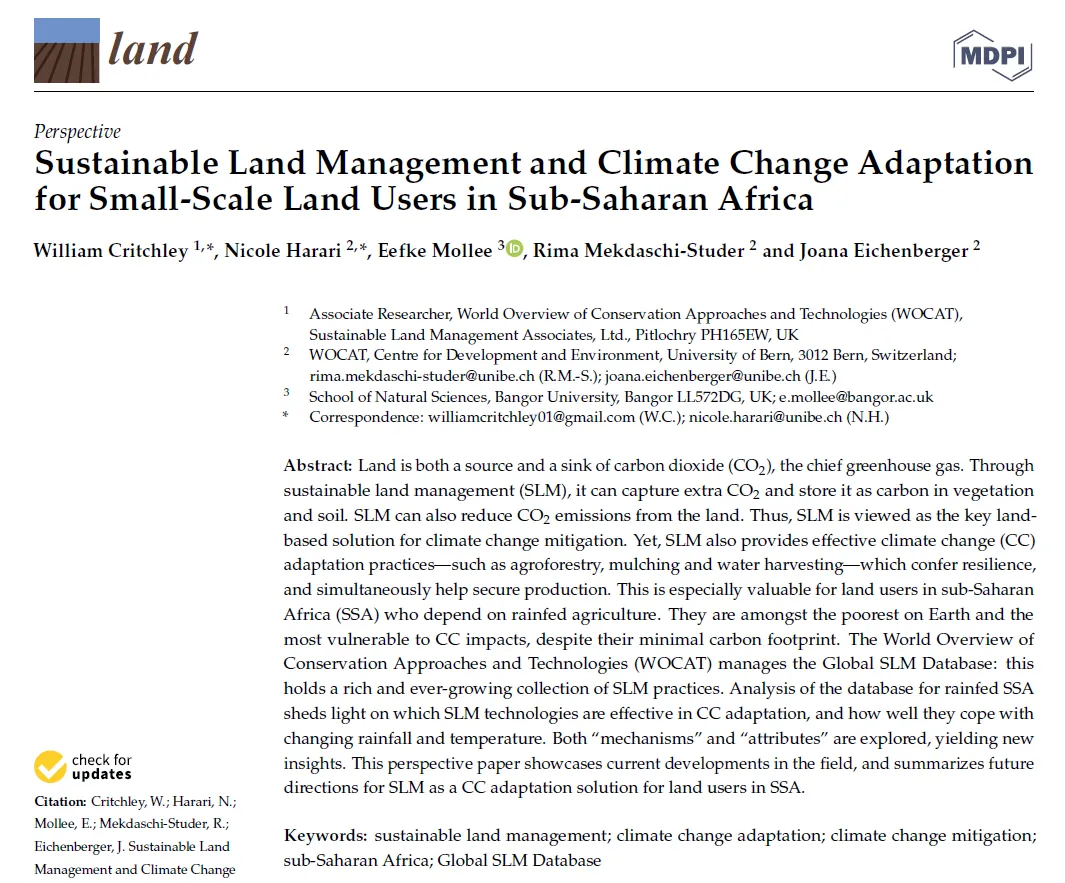
The new perspective paper highlights the importance of SLM in mitigating climate change and supporting adaptation practices, particularly in rainfed regions of sub-Saharan Africa (SSA). It analyses WOCAT Global SLM Database and presents current advancements in the field and outlines future directions for utilizing SLM as a climate change adaptation solution for land users in SSA.
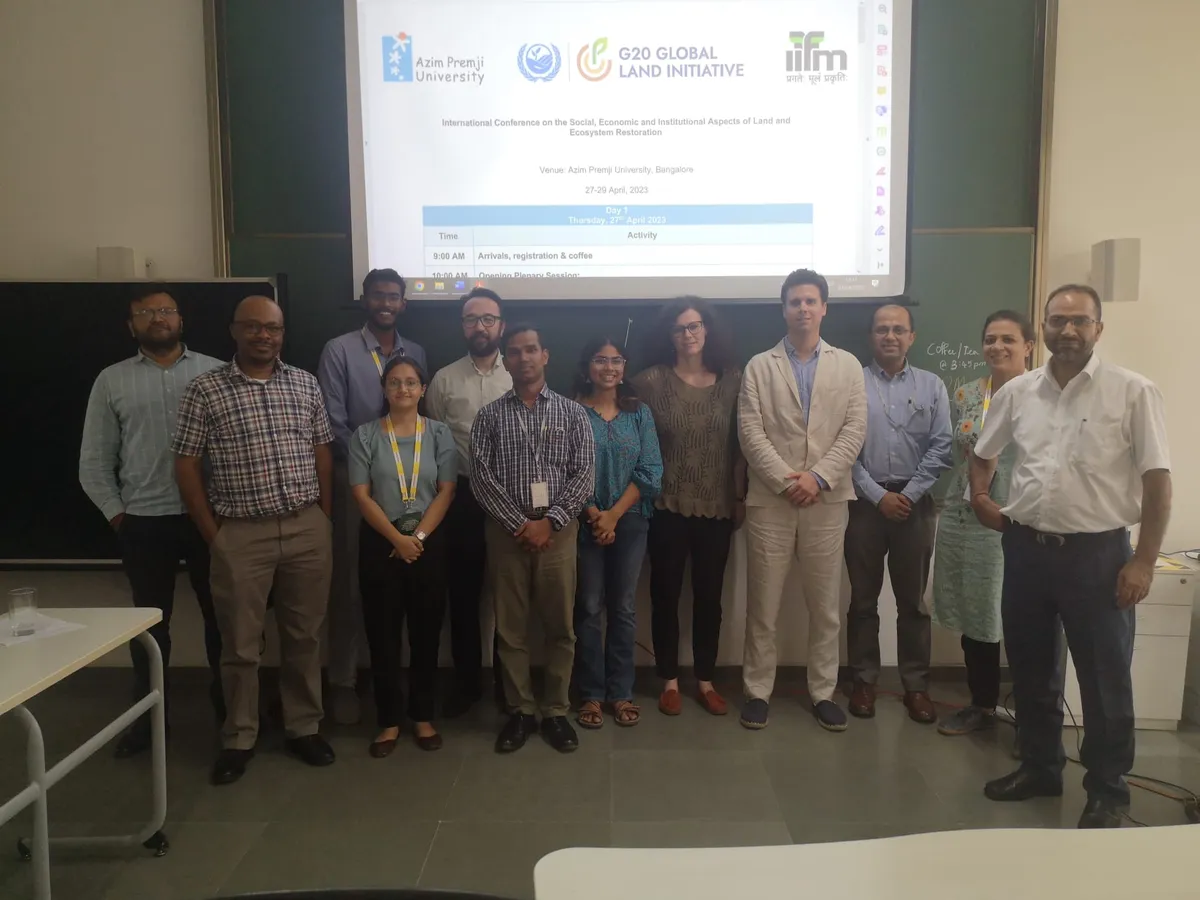
End of April, WOCAT joined the International Conference on the Social, Economic and Institutional Aspects of Land and Ecosystem Restoration at the Azim Premji University, Bengaluru, organized by the UNCCD G20 Land Initiative. Researchers, government, non-government and private sector actors gathered to draw recommendations on land restoration.
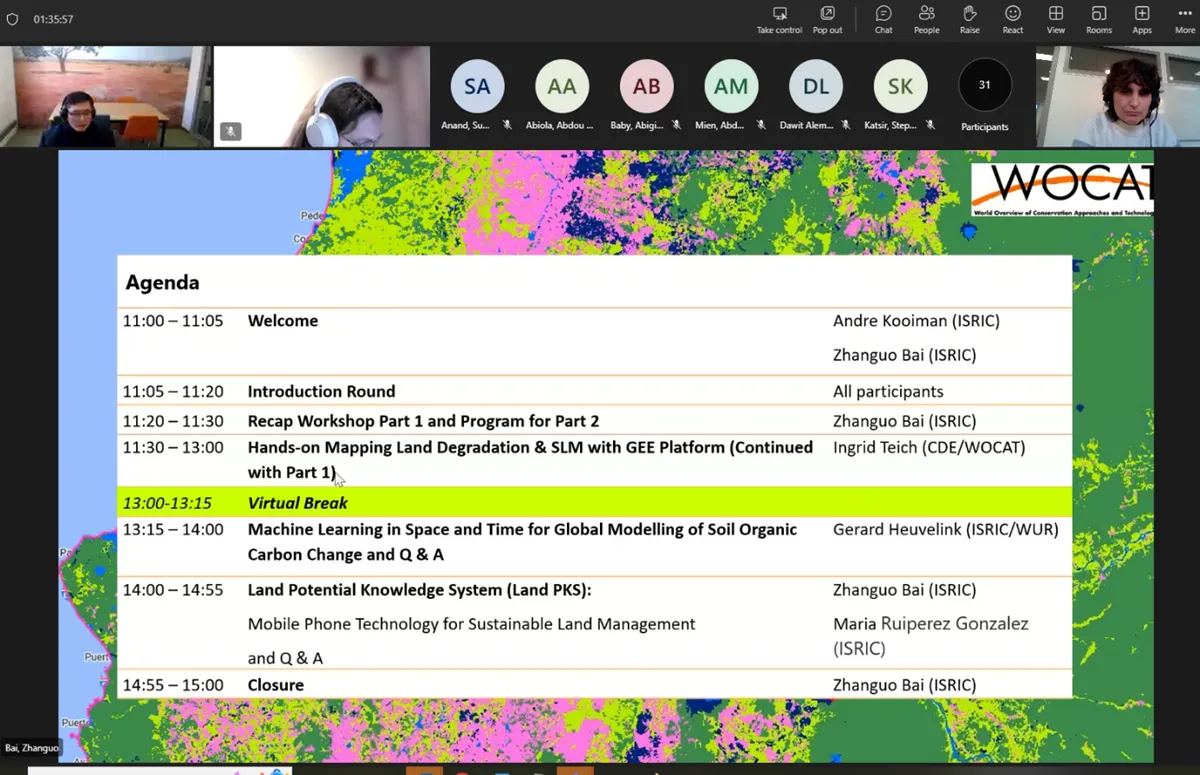
ISRIC, GIZ and CDE (consortium partners of WOCAT) co-organised a workshop on WOCAT Land Degradation and SLM Mapping Tools and Approaches. The participants practiced hands-on mapping land degradation and SLM using Google Earth Engine, got to know digital soil organic carbon mapping with machine learning and familiarised with mobile phone technology for SLM LandPKS.
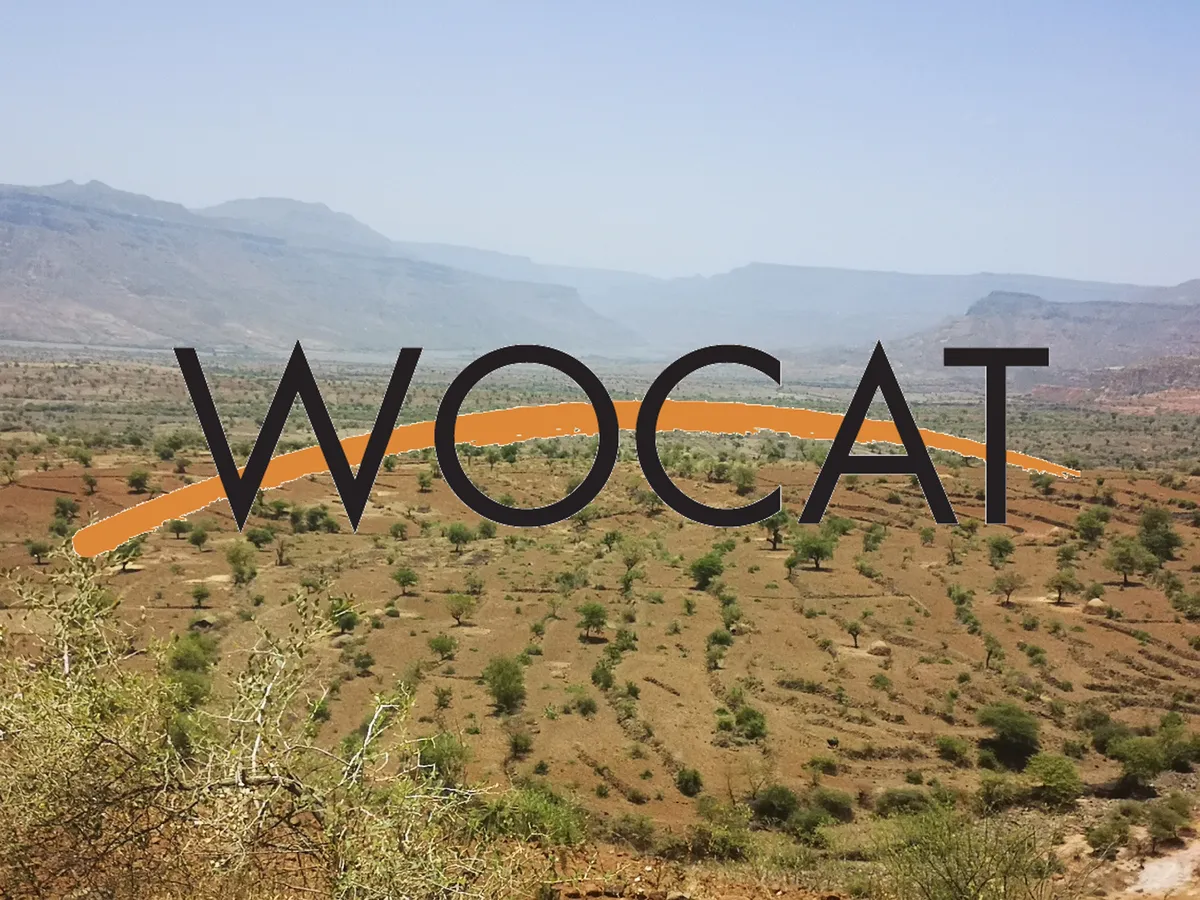
2023 has started incredibly, with more than 15 global events partaken by WOCAT and 50+ partners. Moreover, the invitation to become official Organizational Members of the WOCAT Global Network is now open!
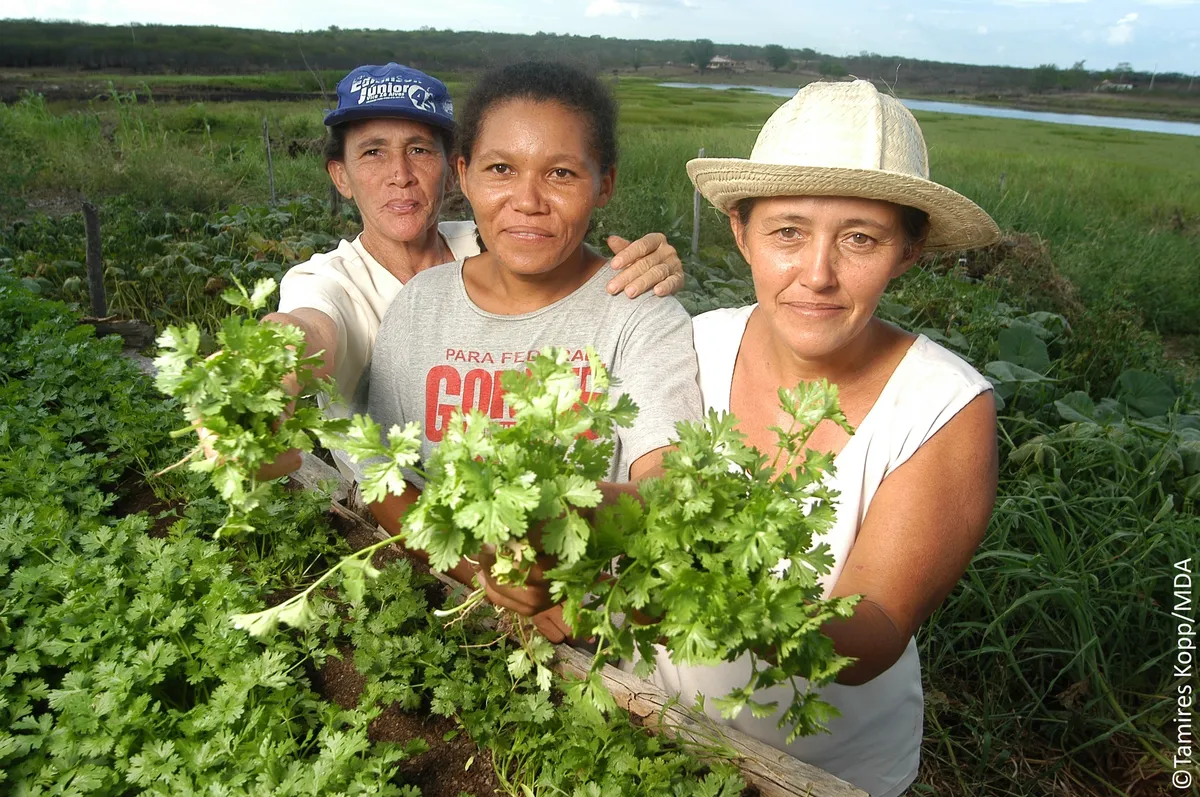
WOCAT and FAO set up a survey to gather information from different actors working in the field of SLM and land restoration about their expertise and interest in South-South knowledge exchange. A Portuguese version of the survey is open until 31 May 2023 and all partners form Lusophone countries are kindly invited to fill out the survey.
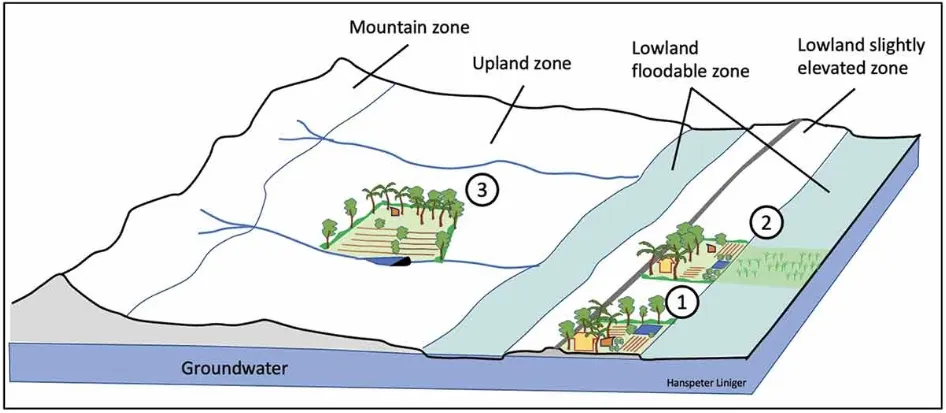
There is a new scientific publication presenting a novel approach to promote landscape-specific integrated farming systems to strengthen climate resilience of rural communities. For this paper, the authors consulted the Global SLM Database and applied the WOCAT Decision Support method.
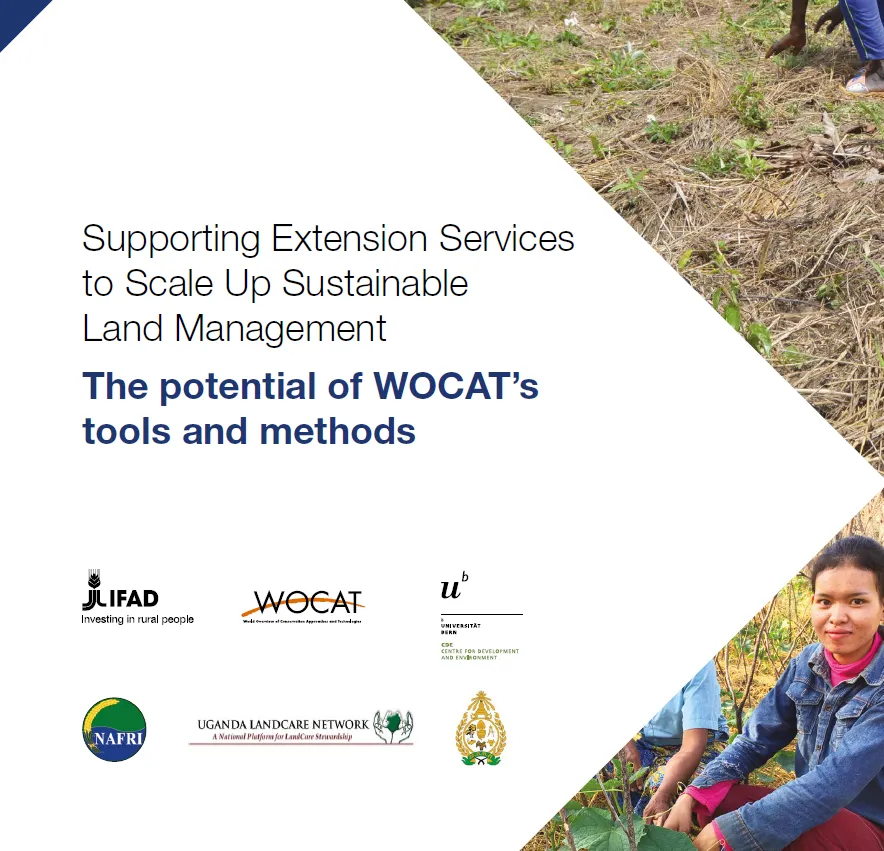
IFAD and WOCAT jointly prepared the publication "Supporting Extension Services to Scale Up Sustainable Land Management: The potential of WOCAT’s tools and methods". Based on 119 SLM practices in Cambodia, Laos and Uganda, this publication shows smallholders prioritized SLM solutions that directly benefited them: the participatory farmer-centred approach is a powerful means of uncovering those practices that improved well-being, whether in terms of food or income.
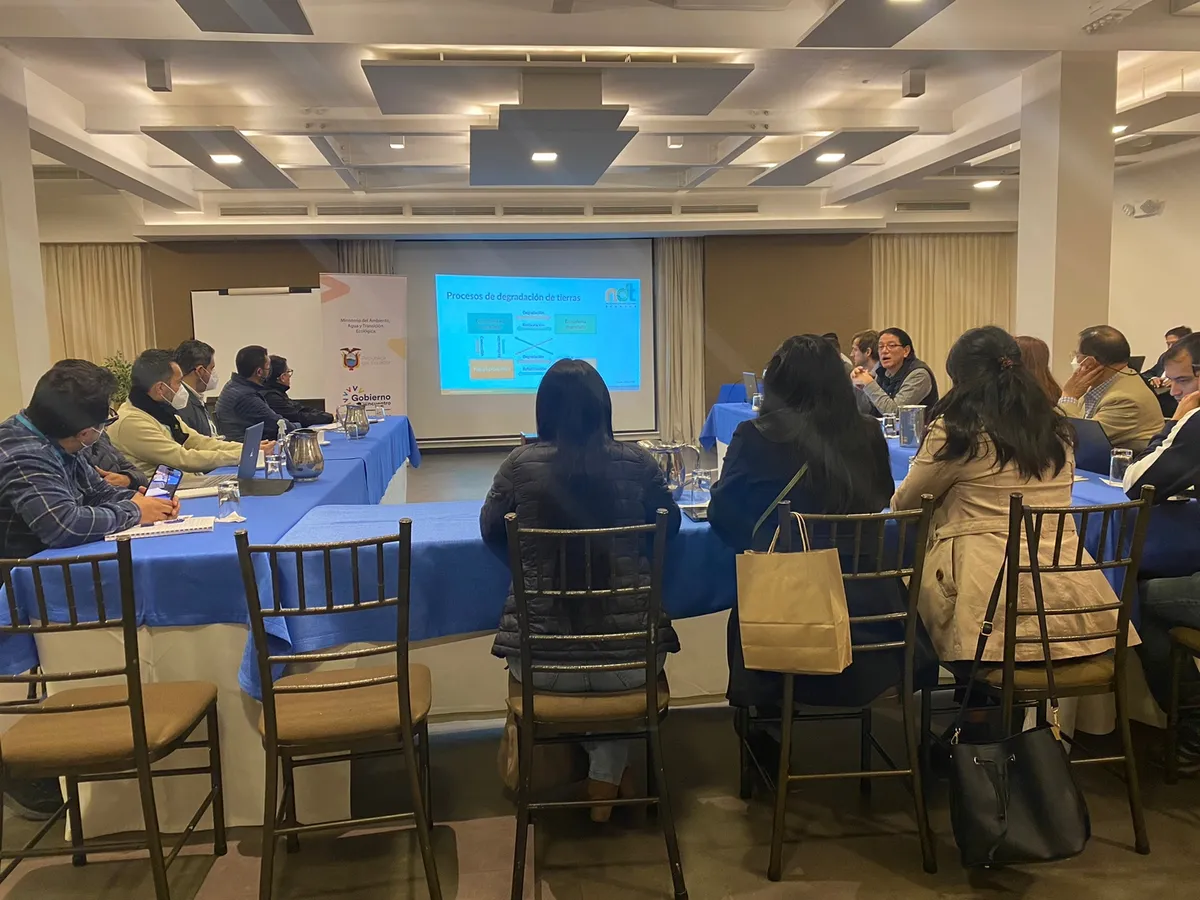
Ecuador is preparing its national report for UNCCD's PRAIS 4 reporting, including the SDG indicator 15.3.1 on degraded land. WOCAT has supported the Ministry of Environment to improve its estimations with national data & expert knowledge. A workshop was held in January with experts from WOCAT, FAO, CONDESAN and more to improve mapping of land degradation neutrality sub-indicators. A cloud-based tool was also developed to explore land productivity dynamics.
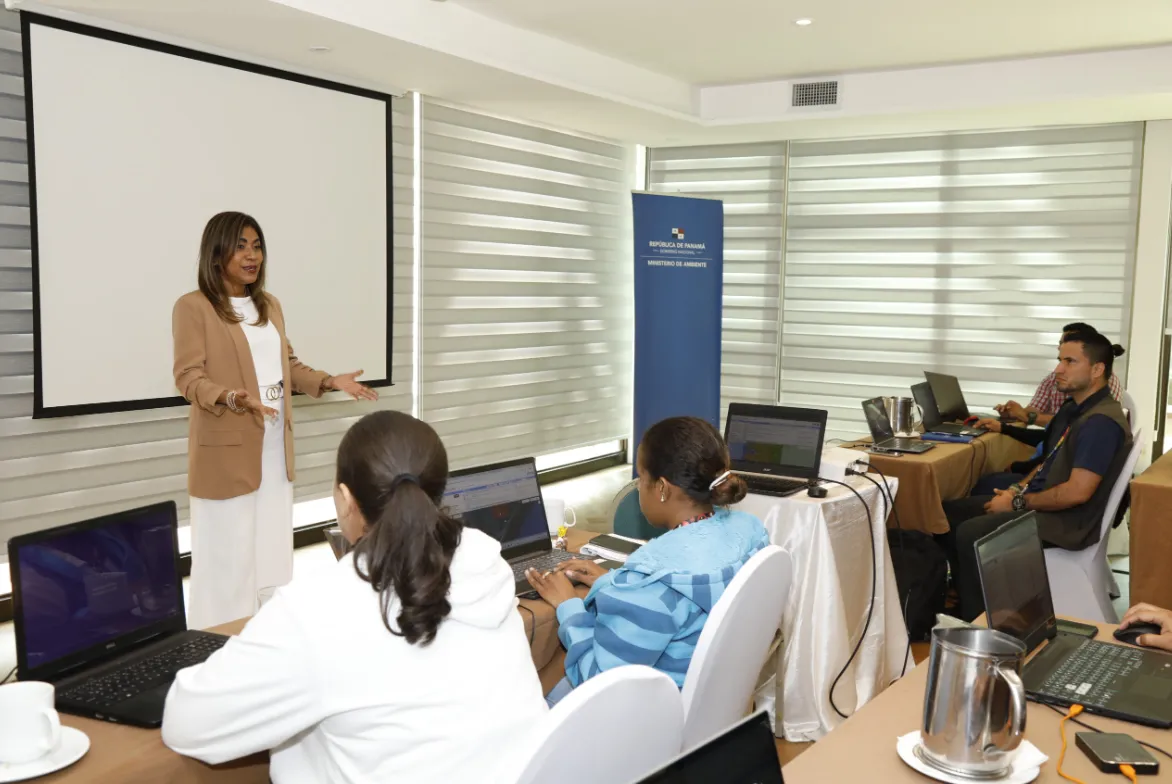
The Vice Minister of Environment of Panama verifies progress of data on Report of Dry and Degraded Lands of Panama. Previously, a series of workshops organized by the Ministry of Environment of Panama, FAO and WOCAT has trained national experts in the use of Google Earth Engine and Trends.Earth to calculate the Land Degradation Neutrality indicators and gather information on the current state of dry and degraded lands in Panama.
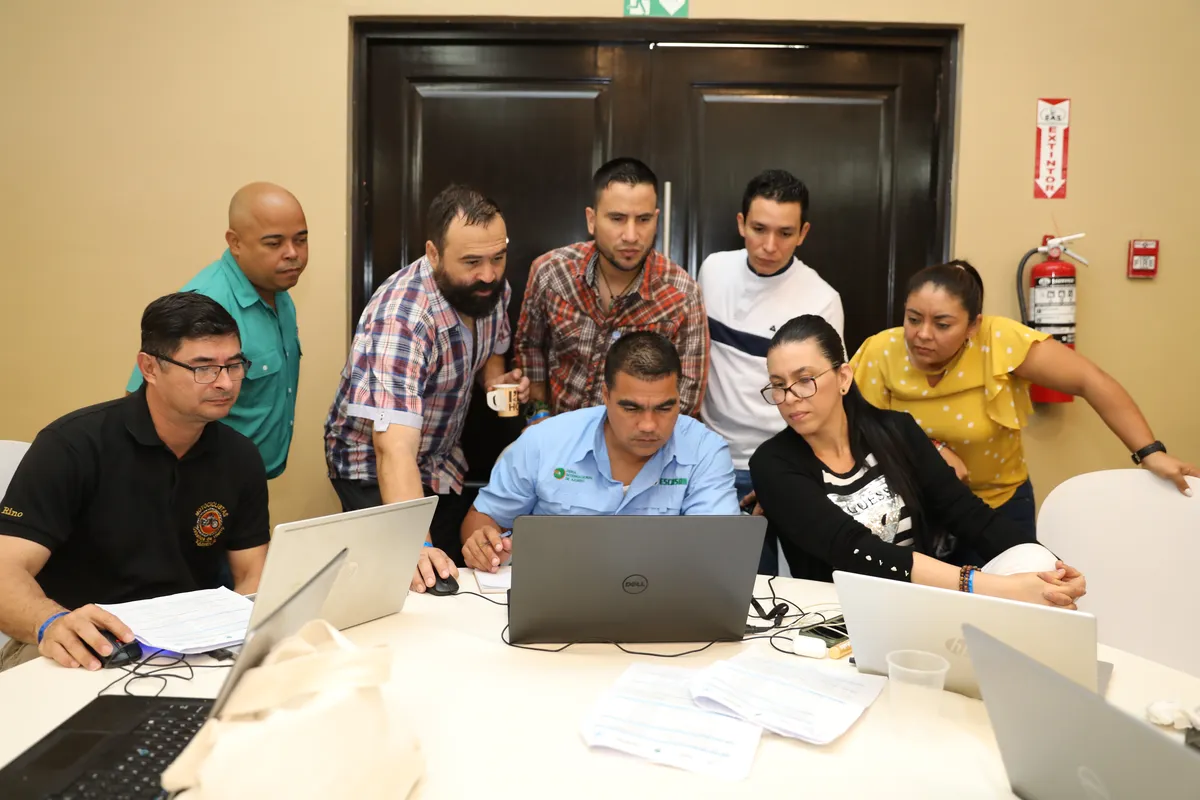
In January, the UNCCD, the Ministry of Environment of Panama, the FAO, and WOCAT organised a 4-day participative workshop in Panama. More than 30 experts participated and used their national LDN decision support system to integrate expert knowledge and map land degradation in the context of PRAIS4 reporting to UNCCD. Supporting tools developed by cloud computing will facilitate the work of the experts with the support of WOCAT and FAO and will capitalize the work done in previous project DS SLM by using the national degradation assessment previously done by experts.
2022
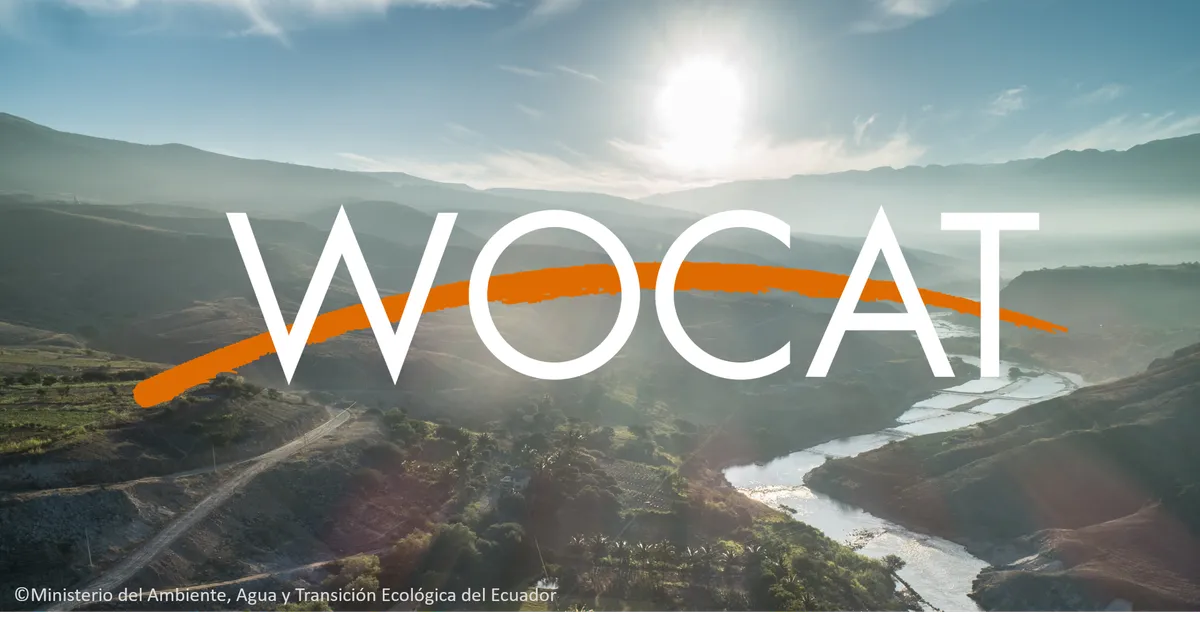
2022 was a busy but incredibly fruitful and exciting year! In the WOCAT Newsletter Dec 2022 we share with you the updates from the WOCAT network between July and December 2022.
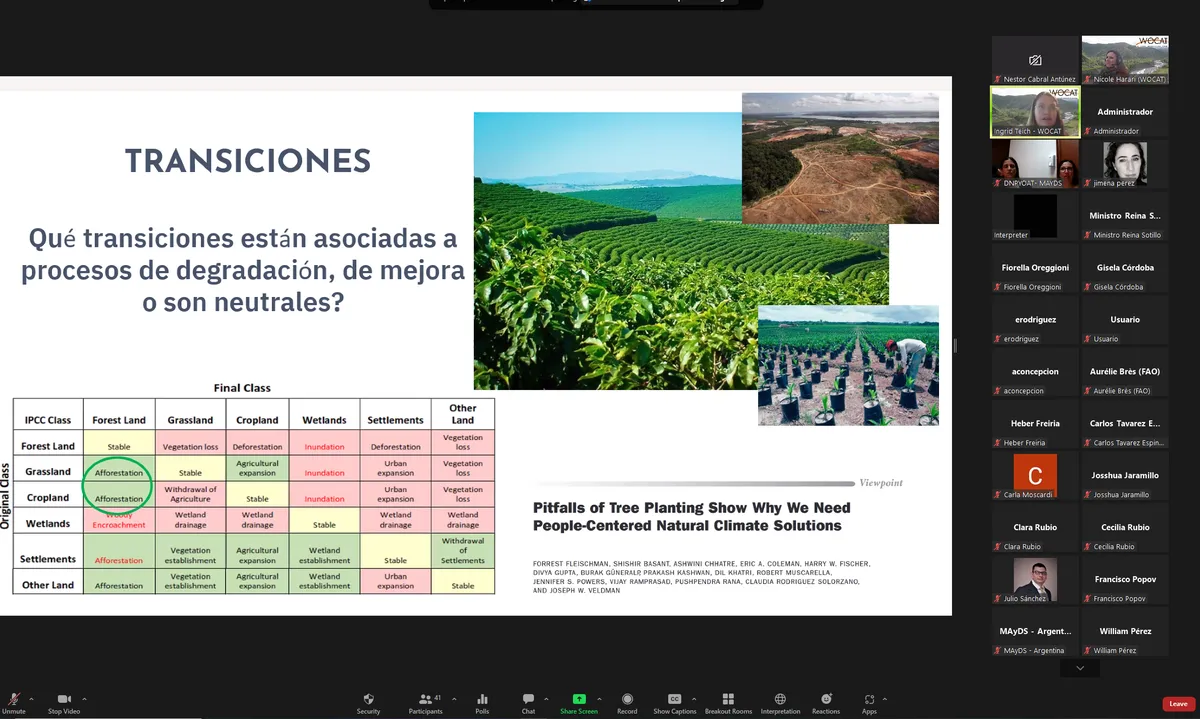
In collaboration with the Governments of Argentina, Ecuador and Panama, WOCAT and FAO organised a South-South knowledge exchange workshop on land degradation neutrality, to capitalise on lessons learned and good practices regarding the development of the PRAIS4 Report to the UNCCD. Over 50 stakeholders, including numerous UNCCD focal points, from different countries in Latin America and the Caribbean attended.
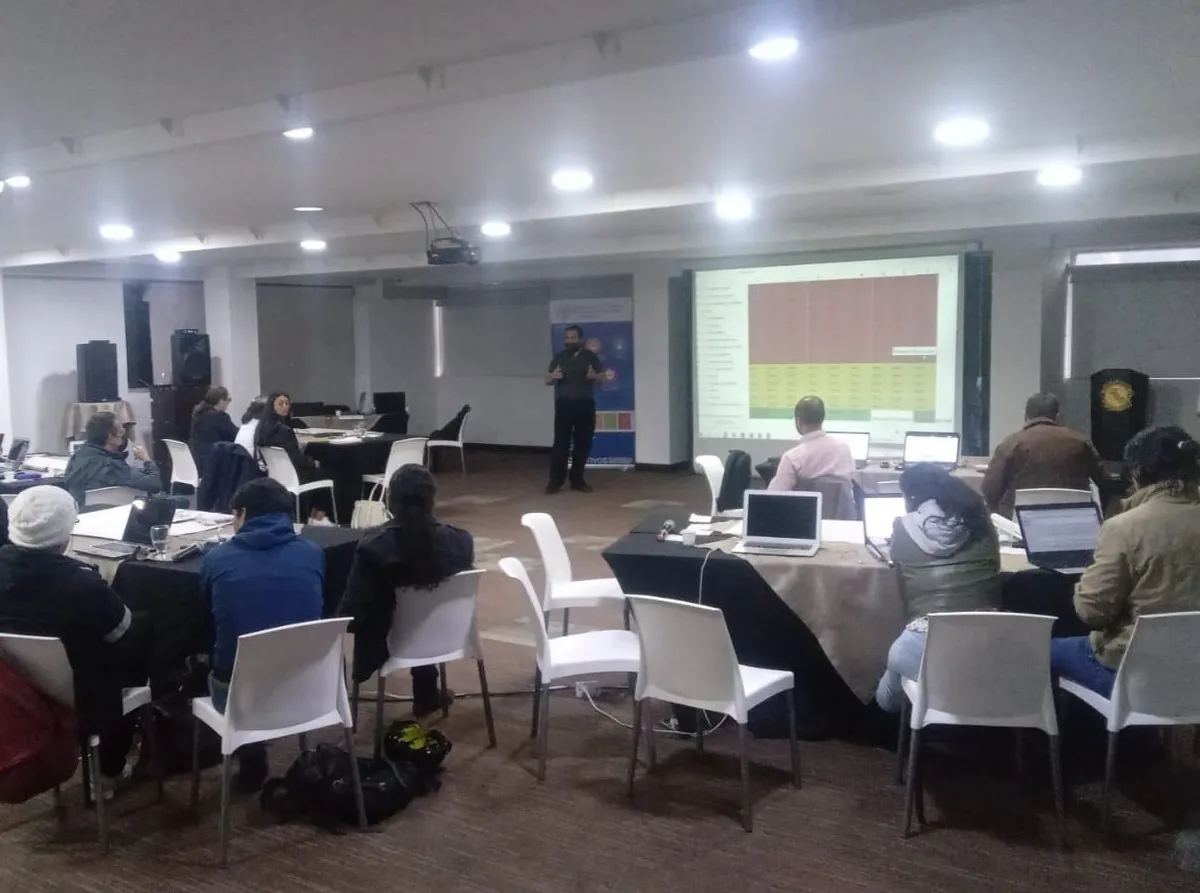
From Nov. 29th to Dec. 1st, a workshop on participatory definition of datasets and methodologies to estimate SDG 15.3.1 and map land degradation in the context PRAIS4 reporting to UNCCD took place in Colombia. Two Google Earth Engine apps were developed to support the process: one for comparing the Landproductivity maps and another one for comparing the Land cover transitions results with national information.
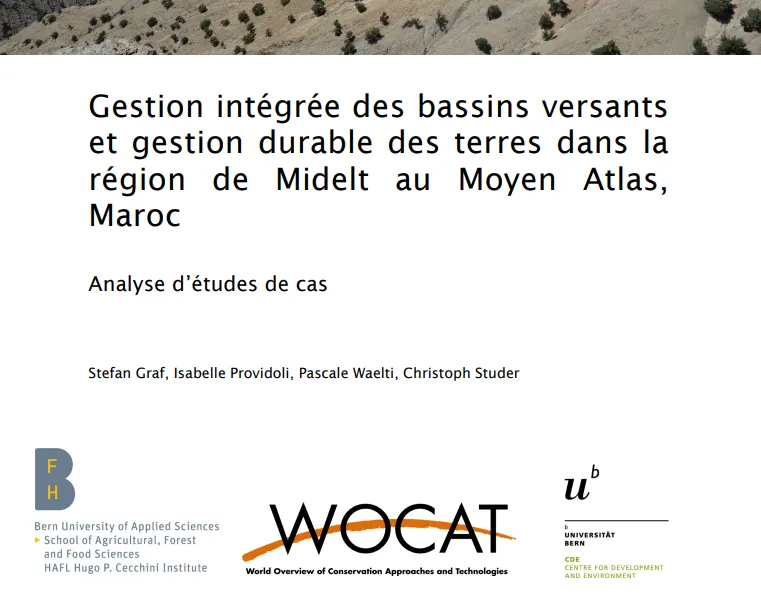
The new publication "Gestion intégrée des bassins versants et gestion durable des terres dans la région de Midelt au Moyen Atlas, Maroc" is a case study analysis on integrated watershed management and sustainable land management in the Midelt region in the Middle Atlas, Morocco. The book was prepared jointly by the Centre for Environment and Development (CDE) and the School of Agricultural, Forest and Food Sciences (HAFL).
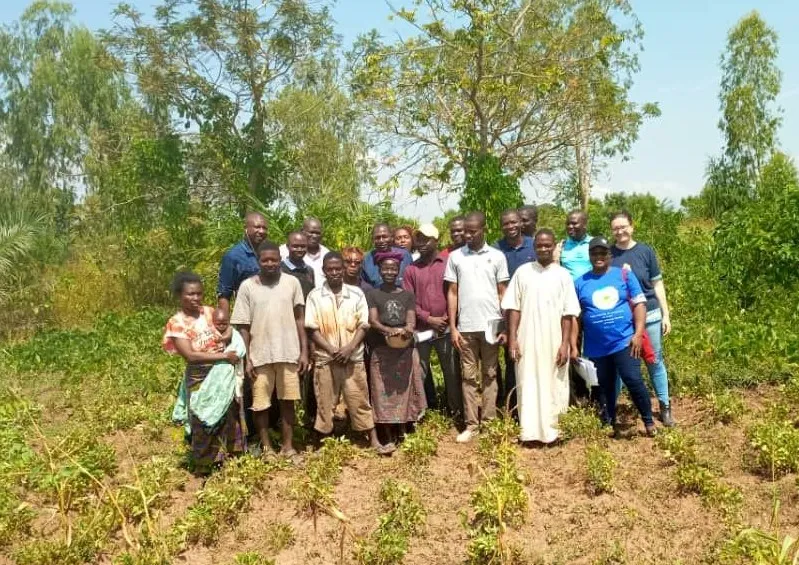
In Bohicon, Benin, professionals from the main national institutions, ProSOIL/GIZ and a freelance consultancy on SLM participated in a WOCAT training from 22nd to 24th November. This was the fifth of seven trainings organised in seven ProSoil countries under the lead of WOCAT Consortium Partner CIAT-Bioversity. After Burkina Faso, Madagascar, Tunisia, India, and Benin, the last two are planned for Ethiopia and Kenya.
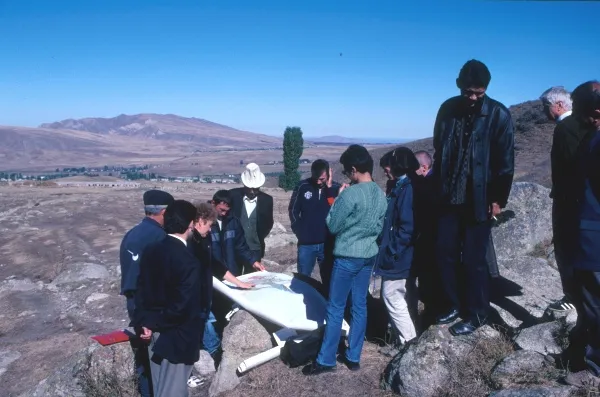
WOCAT and FAO set up a survey to gather information from different actors working in the field of SLM and land restoration about their expertise and interest in South-South knowledge exchange. In particular, partners form Central Asia, Near East, North Africa, Latin America and the Caribbean are kindly invited to fill out the survey.
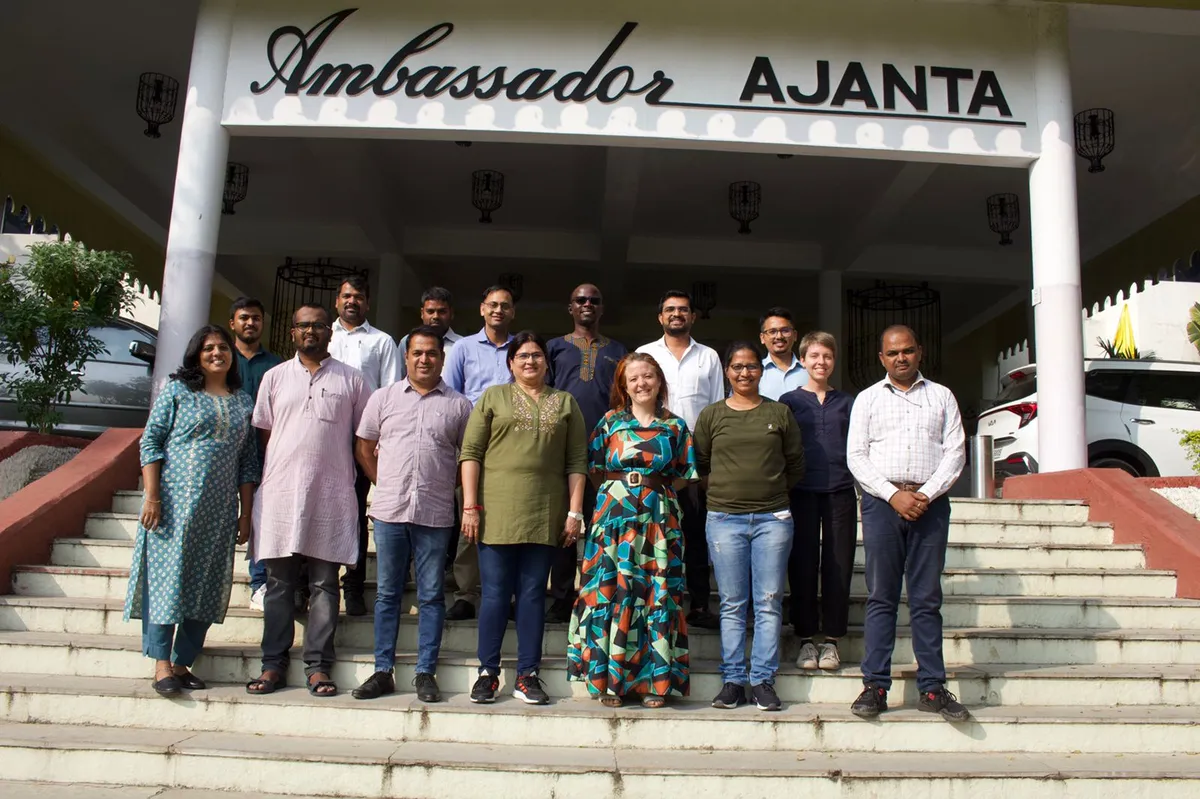
A WOCAT training on documenting SLM Technologies and Approaches was held in Aurangabad, India, from 14 to 16 November 2022. The training included a showcase of the related global WOCAT Database and its modules while prioritizing technologies or approaches to be documented for India. The trainees were drawn from different levels of stakeholder categories, including NGOs and research organizations working on SLM.
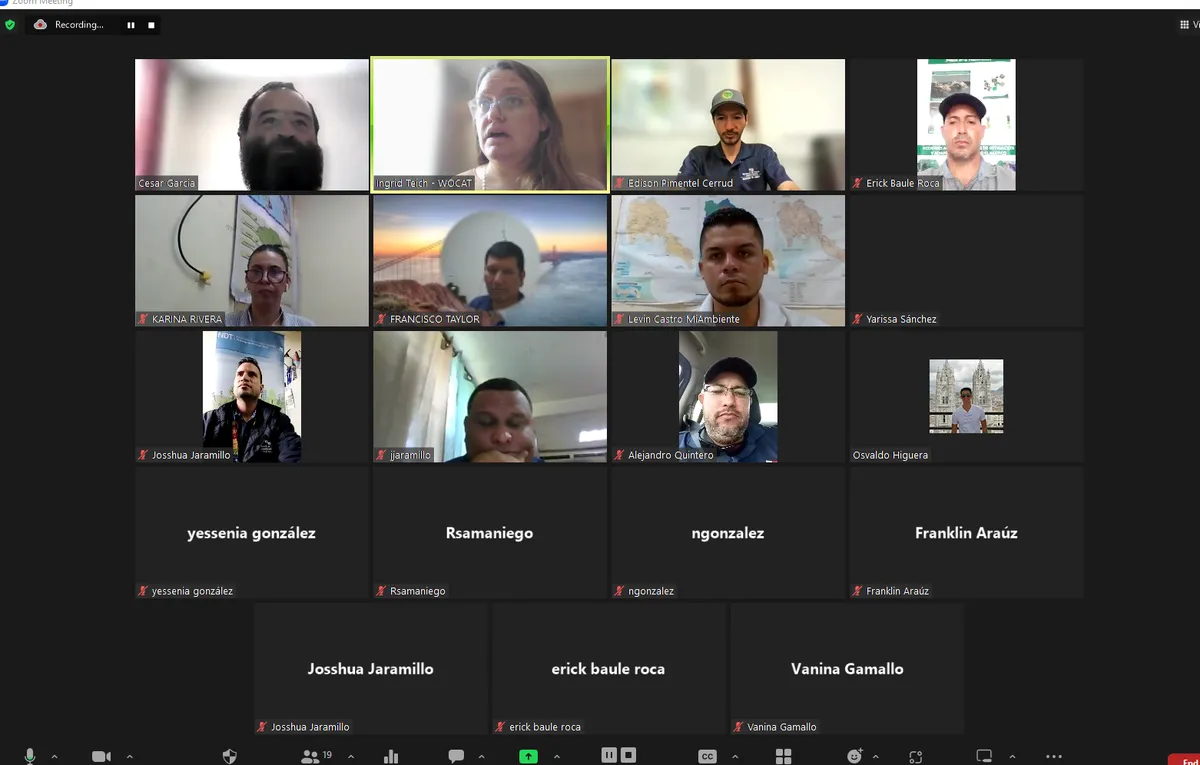
On the 22th of November, WOCAT SLM Expert Ingrid Teich gave a capacity building session on the use of Google Earth Engine to map land degradation in Panama. It was co-organized it with the Ministry of Environment Panama and was the first of a series of activities under the GEF-funded Enabling Activities to strengthen national capacities towards enhanced UNCCD monitoring and reporting.
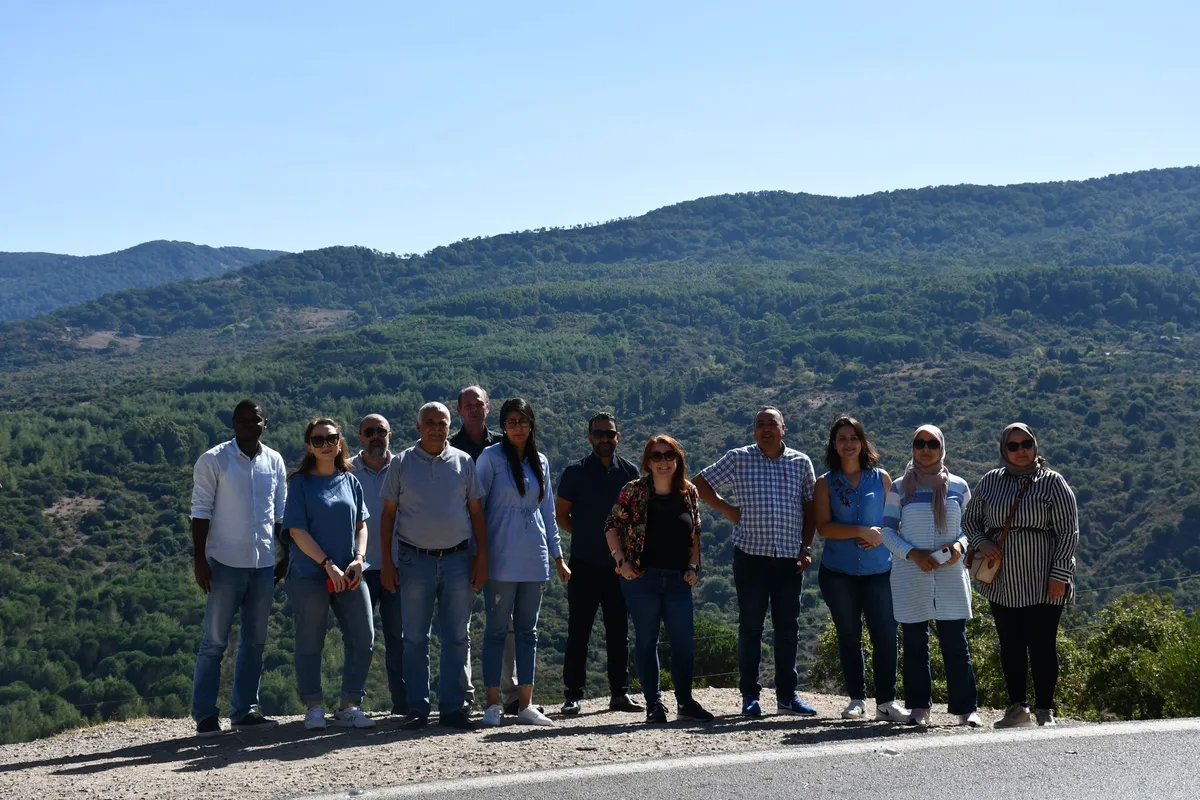
From 18 to 20 October, a WOCAT training for the documentation of SLM practices was held in Tabarka, Tunisia with participants from research, extension and government institutions. Previous to the training, the goals of the training were presented to the DG ACTA which is coordinating the ProSoil project in Tunisia. Training participants learned how to document SLM practices in a standardized format as well as about the importance of SLM knowledge products for different stakeholders, the inclusion of SLM best practices in the UNCCD PRAIS4 report and the SLM documentation and knowledge products planned for Tunisia.
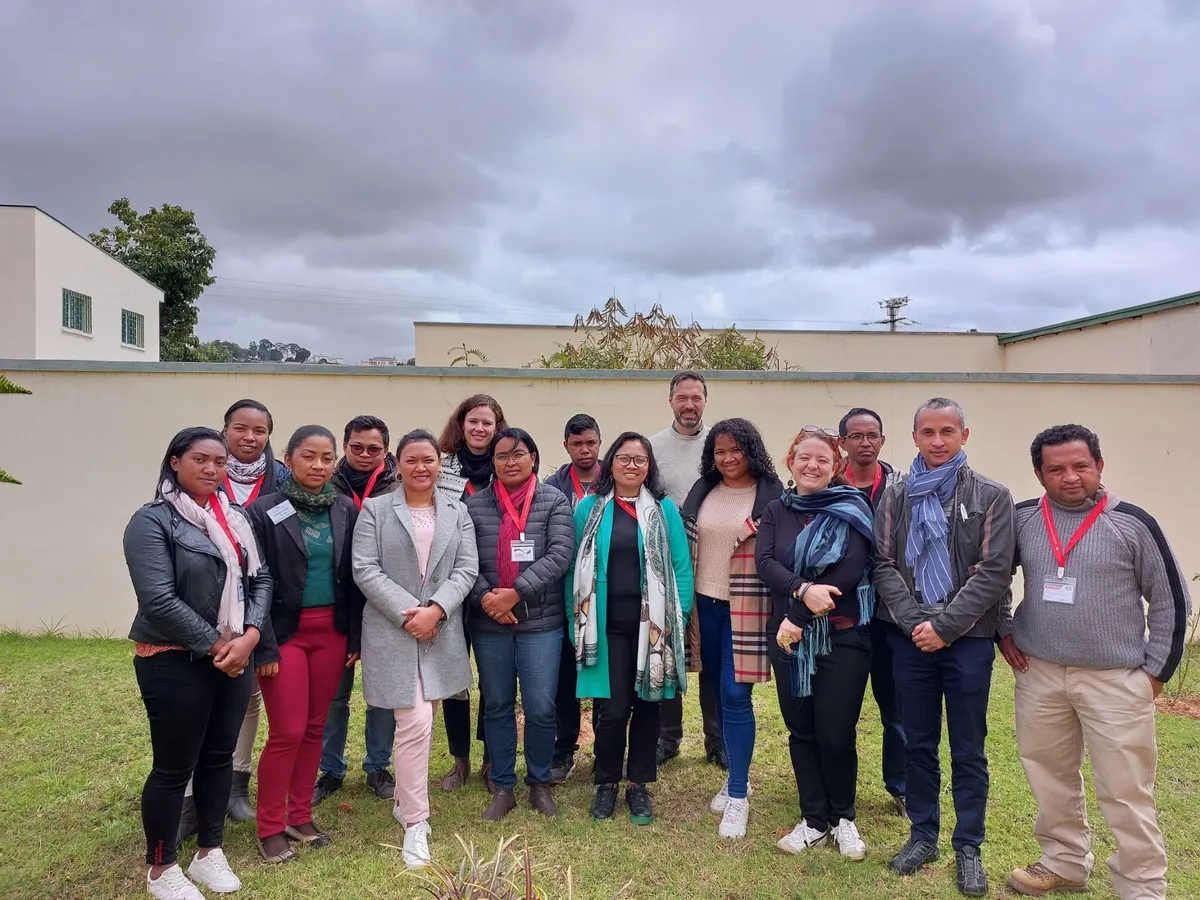
From 23 to 25 of August, a WOCAT training on SLM Technologies and Approaches documentation and related global WOCAT Database was held in Antananarivo, Madagascar, for stakeholders from government, NGOs and research organizations. The training is part of a series of trainings in the seven GIZ ProSoil countries, under the lead of WOCAT Consortium Partner CIAT-Biodiversity.
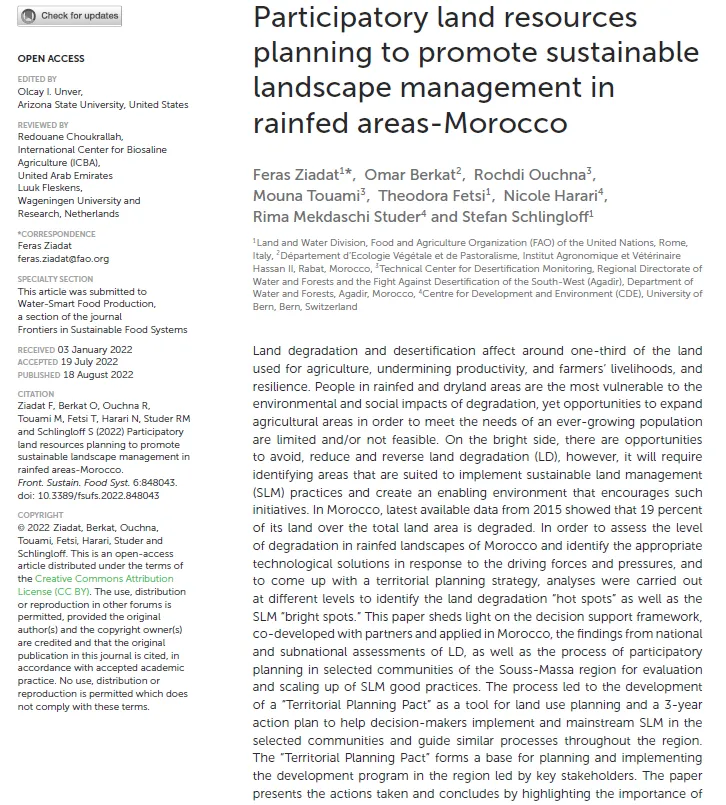
This paper sheds light on the decision support framework, co-developed with partners and applied in Morocco, the findings from national and subnational assessments of land degradation, as well as the process of participatory planning in selected communities of the Souss-Massa region for evaluation and scaling up of SLM good practices. The process led to the development of a “Territorial Planning Pact” as a tool for land use planning and a 3-year action plan to help decision-makers implement and mainstream SLM in the selected communities and guide similar processes throughout the region.
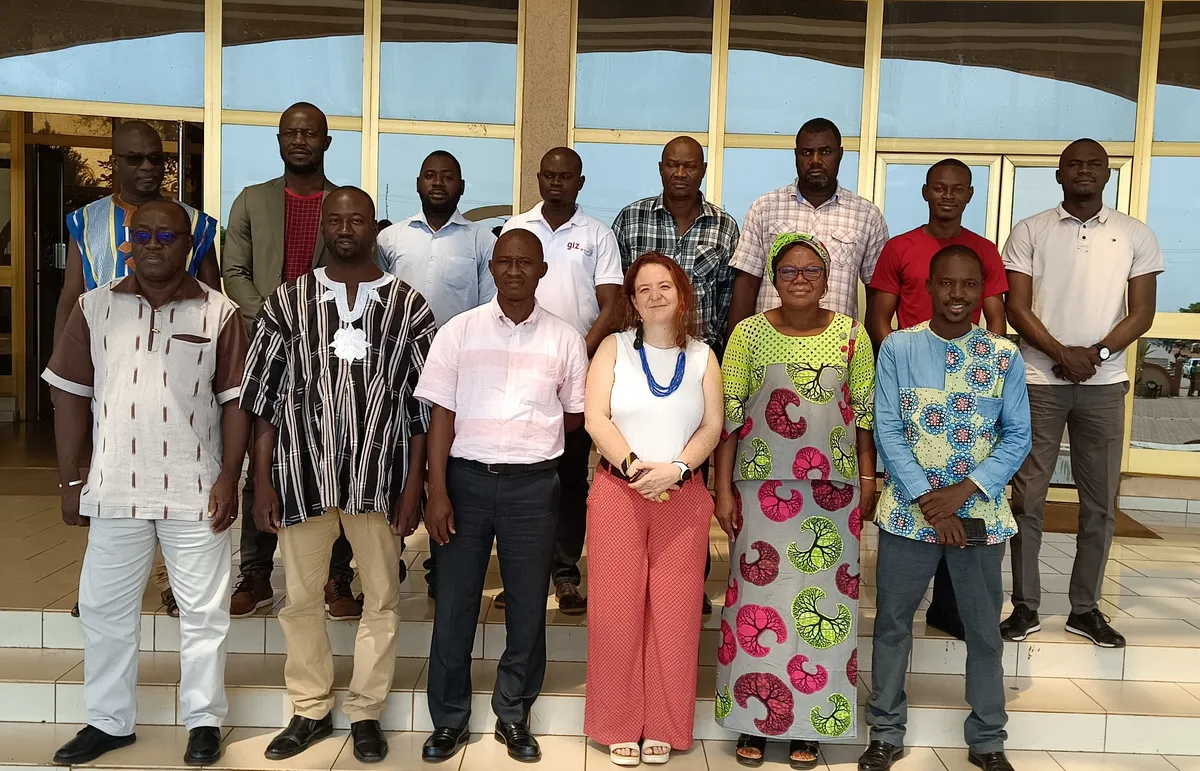
As part of the GIZ ProSoil project, a WOCAT training was held in Bobodioulasso, Burkina Faso, from 26 to 28 July to support the documentation of SLM practices used in their work. In addition to 13 participants from GIZ, a member of the UNCCD Focal Point Team was also present. This was the first training of a series of 7 training in the 7 ProSoil countries.
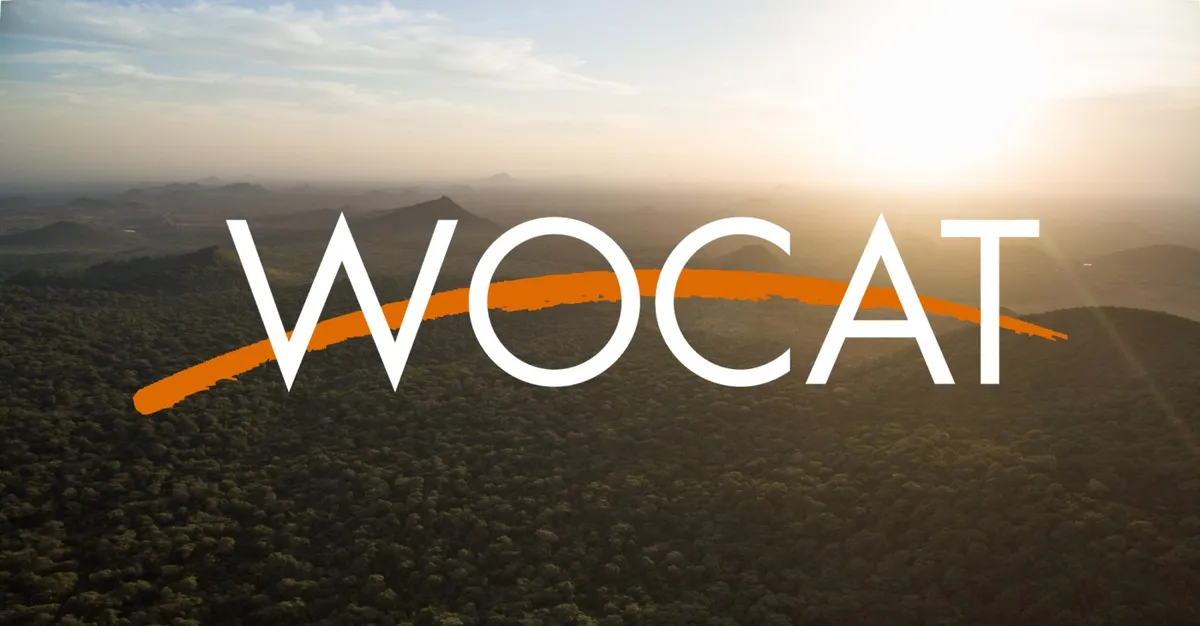
The July newsletter is out! From WOCAT's participation at the UNCCD COP15 to the latest updates on events & tools & knowledge products, we have news for you.
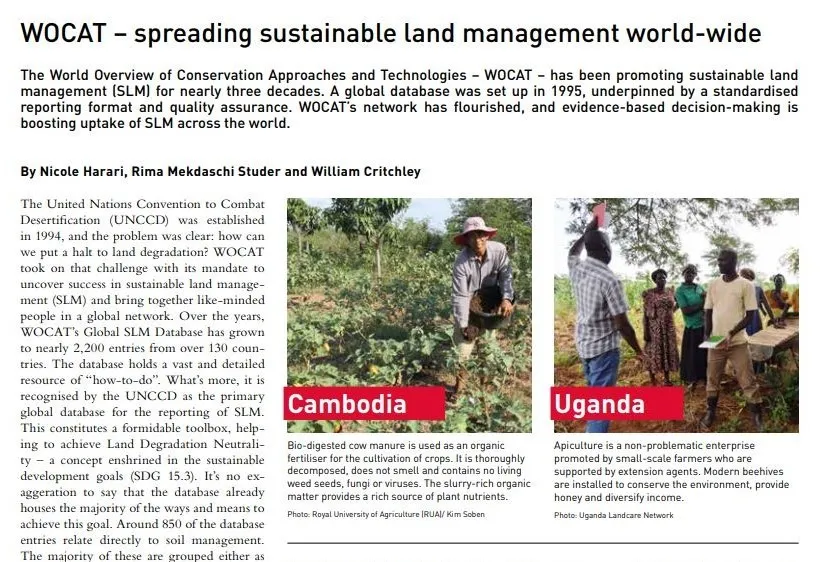
The International Journal for Rural Development RURAL21 has published an article by Nicole Harari, Rima Mekdaschi Studer and William Critchley: "WOCAT – spreading sustainable land management world-wide". The authors highlight the collaborative efforts of WOCAT with the UNCCD and partners to «uncover success in sustainable land management».
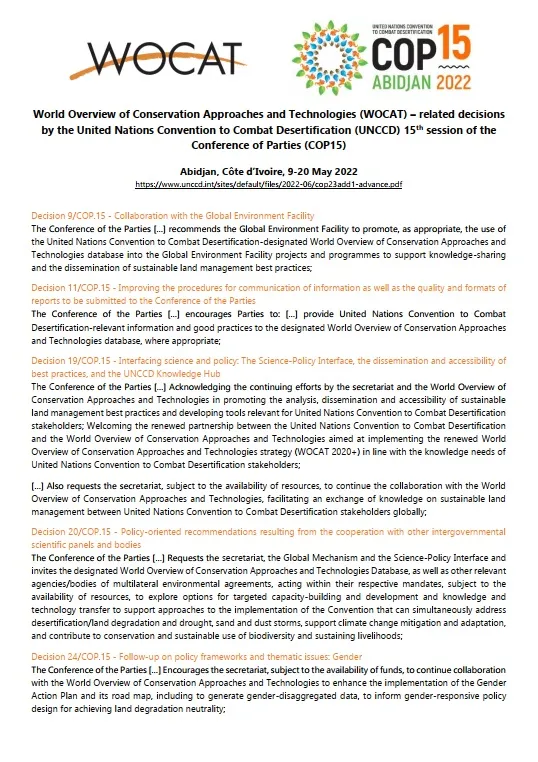
The COP15 sustains WOCAT collaborative efforts in Sustainable Land Management towards Land Degradation Neutrality
The 15th session of the United Nations Convention to Combat Desertification (UNCCD COP15) took place in Abidjan, Côte d’Ivoire, from 9 to 20 May 2022 and brought together policy makers and global leaders, civil society private sector representatives, development agencies and international stakeholders to operatively address major topics, such as drought, land restoration, land rights, gender equality and youth empowerment.
A total of 36 decisions were taken at COP15. Five decisions highlight the role of WOCAT in supporting knowledge sharing, generating SLM good practices data and building capacity in collaboration with UNCCD and other partners.
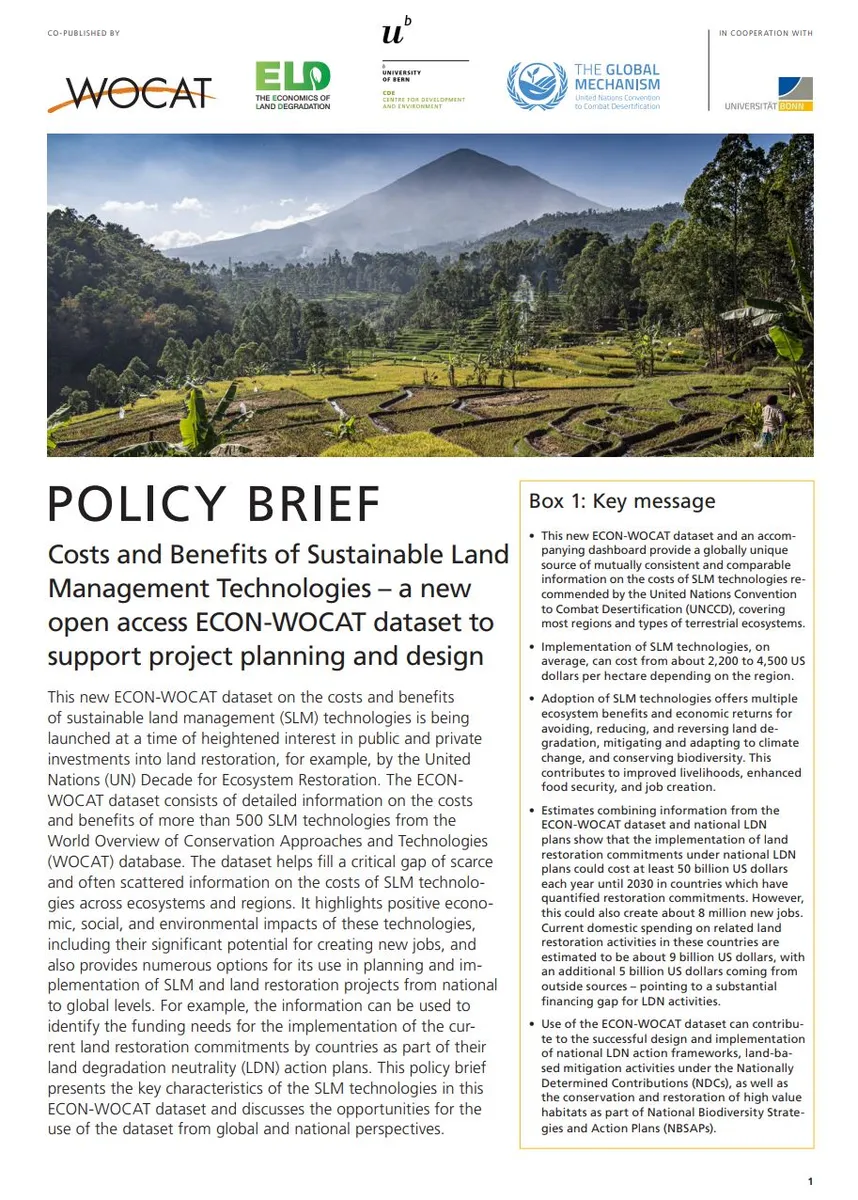
WOCAT, ELD Initiative and UNCCD jointly co-published a policy brief on the ECON-WOCAT dataset. This new dataset on costs and benefits of sustainable land management (SLM) technologies is being launched at a time of heightened interest in public and private investments into land restoration, for example, by the United Nations (UN) Decade for Ecosystem Restoration. The ECON-WOCAT dataset consists of detailed information on the costs and benefits of more than 500 SLM technologies from the WOCAT Global SLM database. This policy brief presents the key characteristics of the SLM technologies in this ECON-WOCAT dataset and discusses the opportunities for the use of the dataset from global and national perspectives.
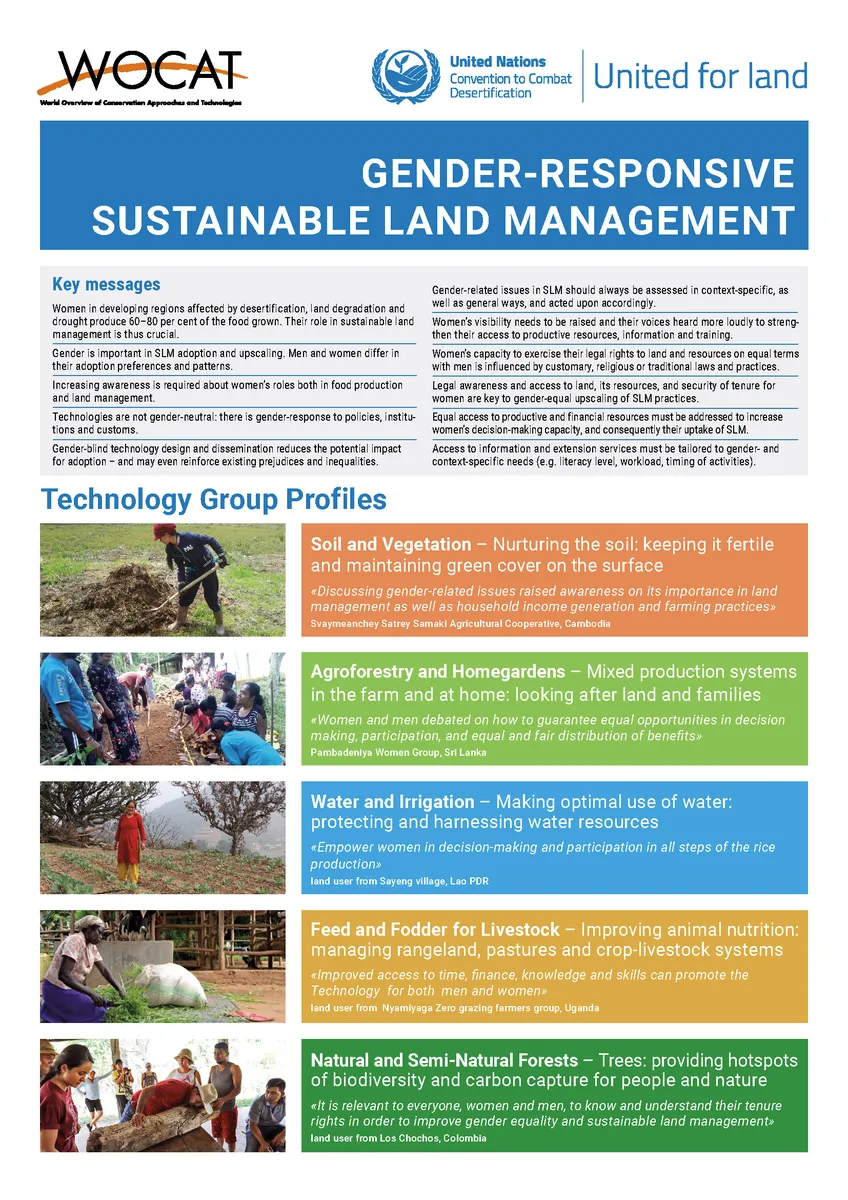
In line with the UNCCD Gender Action Plan (GAP) and guided by the idea to build back better, UNCCD, WOCAT and partners have developed a new gender tool to help assess how gender-responsive SLM technologies are and what needs to be done to enhance their adoption by female and male farmers and identify technology group specific profiles to show the need for action.
This work on gender-responsive SLM is very well received at UNCCD COP15 currently taking place in Abidjan and interest is high.
If you missed the live launch of the tool at the WOCAT side event on Monday 16 May 2022, you can still watch it by following this link.
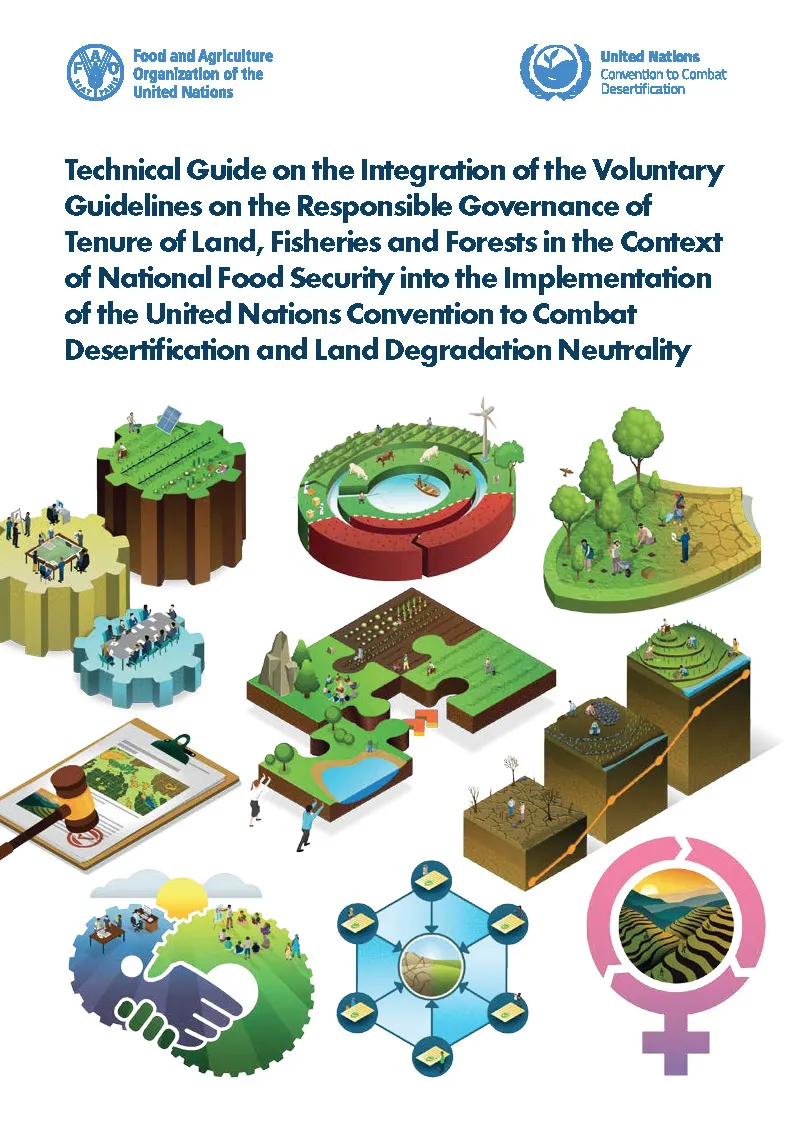
Tenure security and responsible governance are crucial to help achieve Land Degradation Neutrality.
The technical guide as launched by FAO and UNCCD Secretariat at UNCCD COP15 and is now available!
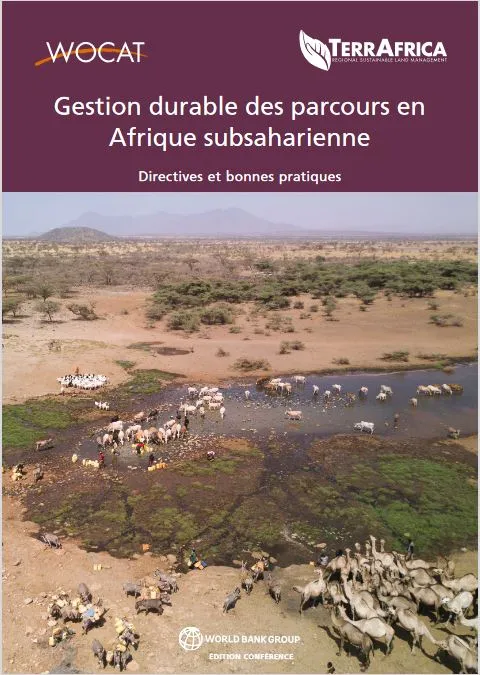
La publication Gestion durable des parcours en Afrique subsaharienne est désormais disponible en français.
In Sub-Saharan Africa, the popular perception of rangelands and their management is that these vast areas have major problems without solutions: the common narrative focuses on overgrazing, herds of undernourished livestock, erosion and desertification, drought, famine, and conflict. However, evidence compiled and analysed in this book show that such a view of rangelands – as being unproductive and mismanaged systems – does not reflect reality. It needs reconsideration and revision. The overall goal of the guidelines is to demonstrate – through a unique set of convincing case studies and their analysis as well as the development of guiding principles – the value and potential of investment in rangelands.
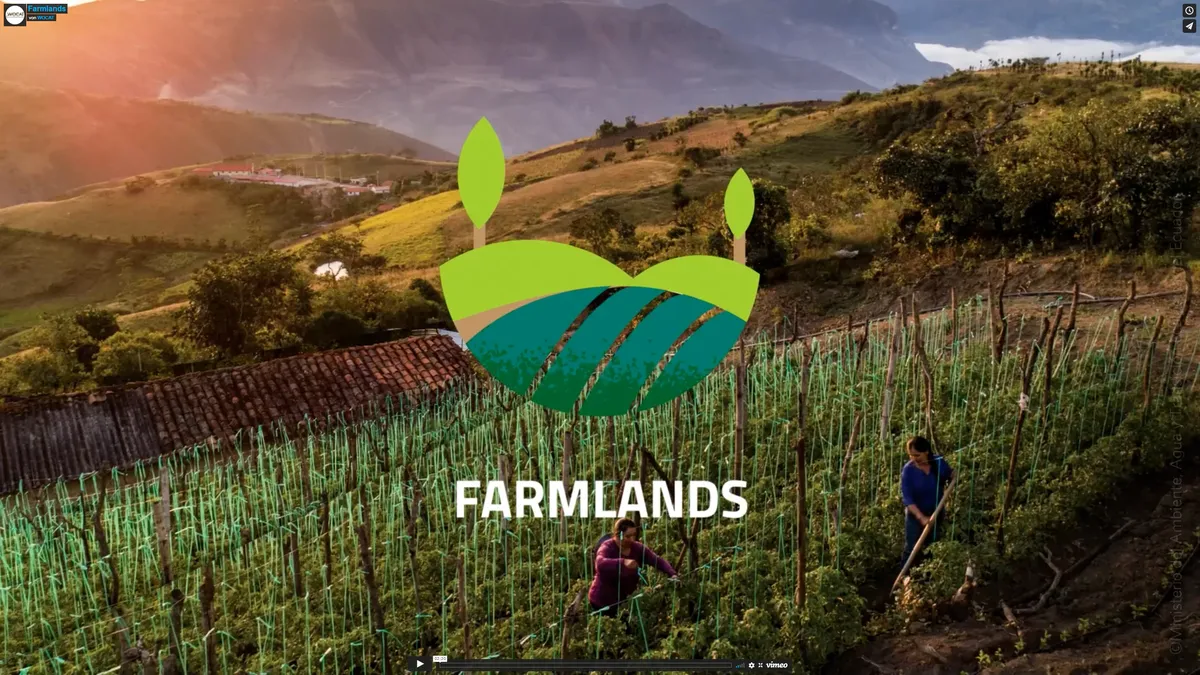
Our action to restore life to land is back by showing how SLM can help specific land types from freshwaters to urban areas and improve ecosystem restoration. Life land legacy is drawing us to work harder towards COP15 and enhance our efforts and commitments to the UN Decade for Ecosystem restoration. For this purpose, with UNCCD we have created a series of videos that highlight the central role of SLM in restoring and maintaining healthy ecosystems.
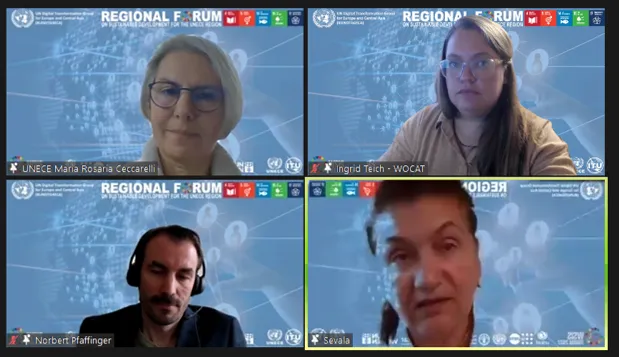
WOCAT was represented at the side event ‘Cross-cutting session: Digital transformation beyond the COVID-19 Pandemic’ by Dr. Ingrid Teich. The discussion highlighted the importance of multistakeholder partnerships to support digital development and build synergies to achieve the SDGs. Today, more than ever we need stakeholders to share their knowledge and capitalize on the results of others. Data transparency and knowledge sharing are crucial for integrating and using available resources. Following the principles of open science will accelerate and maximize the contribution of new technologies to achieve SDG 15.
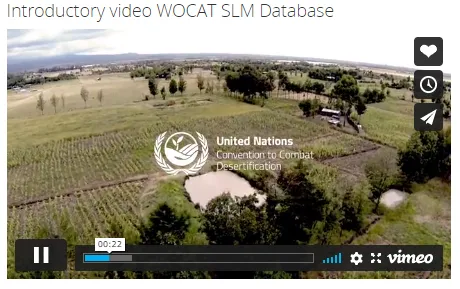
A new one-pager and short video provide guidance to UNCCD stakeholders on how to share SLM best practices in the WOCAT Global SLM Database. UNCCD parties are encouraged to report in the UNCCD PRAIS system their SLM best practices.
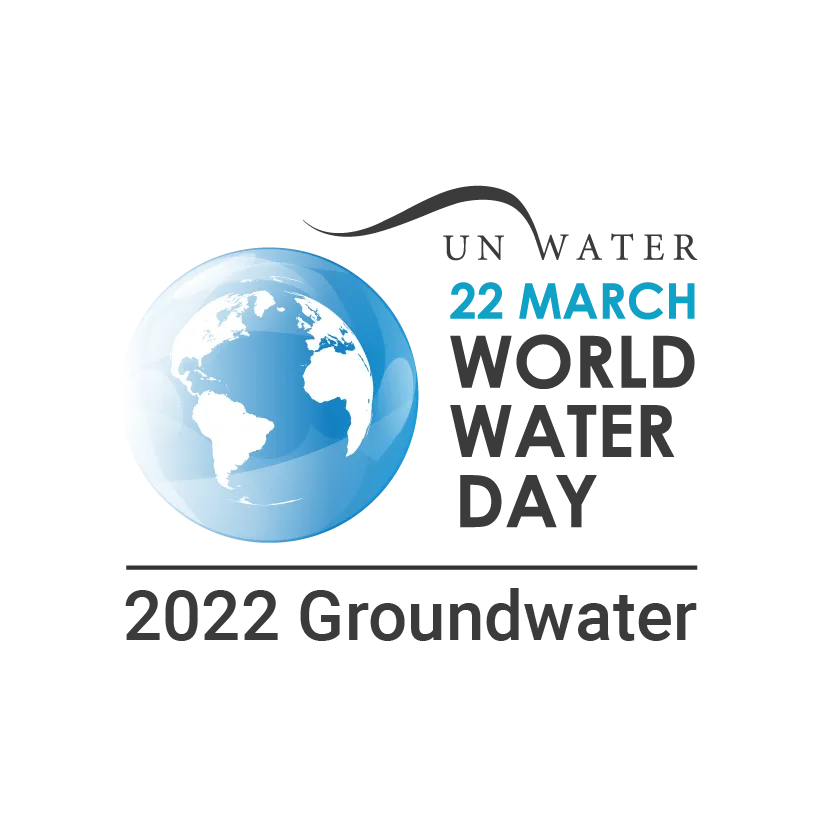
For World Water Day discover our media section to learn more about the link between water and land. On our channels, you may find solutions related to groundwater. To go more in-depth you can also read our "Water Harvesting - Guidelines to Good Practices" developed with IFAD, CDE, MetaMeta and funded by SDC. As a reader, you will discover more about how groundwater is the principle of harvesting floodwater and surface runoff to recharge with water. The water is then conserved and re-used for extending growing or dry periods.
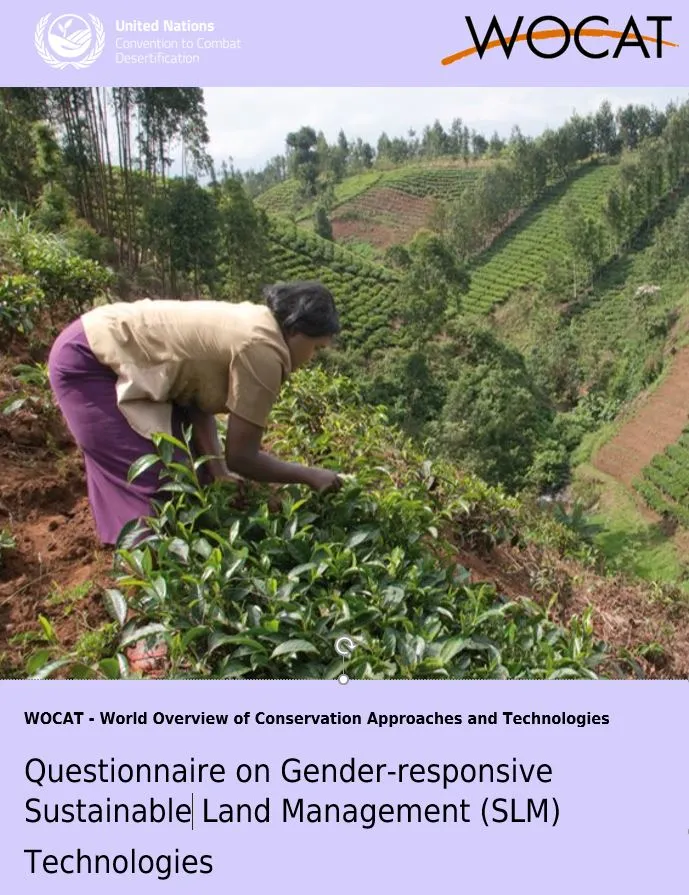
For international Women's Day, find out the latest updates about the UNCCD-WOCAT collaboration on gender-responsive SLM. A new gender tool is currently being tested with WOCAT network partners in more than 10 countries to help assess how gender-responsiveness SLM technologies are and what needs to be done to enhance their adoption by female and male farmers. UNCCD and WOCAT will share information about the tool on our channels. Stay tuned for more information at the UNCCD COP event where the tool will be presented at an official session.
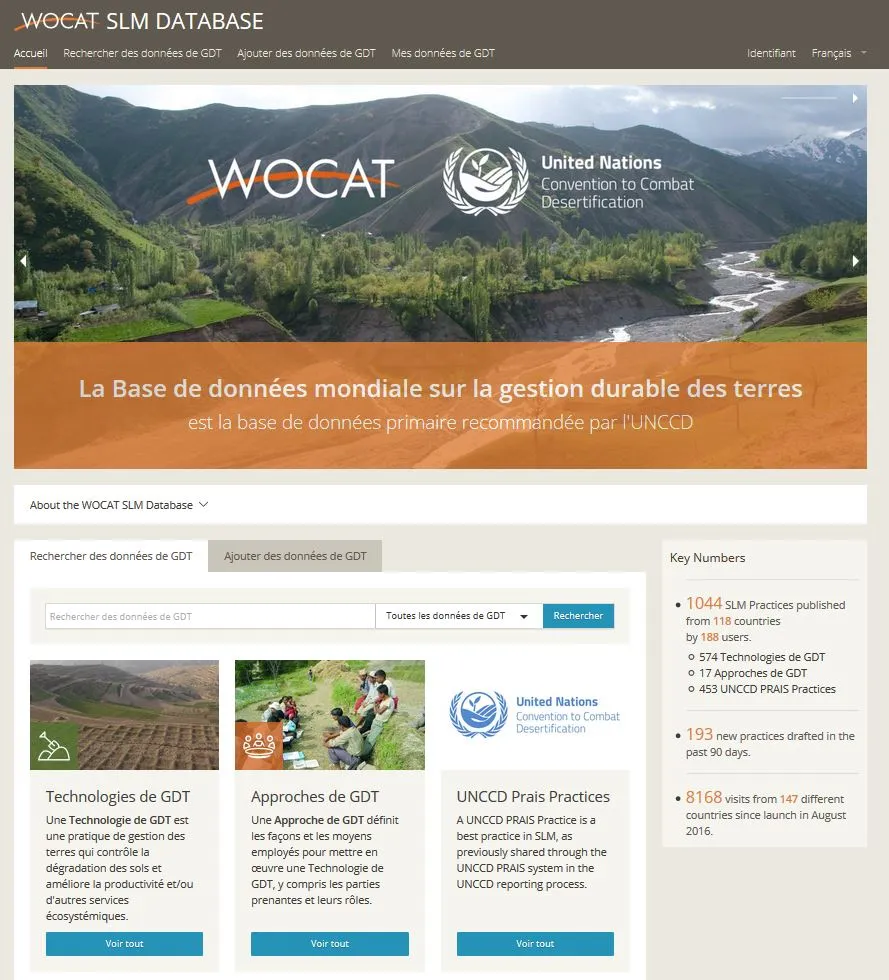
Today on World Data Day look out for the latest achievements on the global SLM database. We highlight 2192 SLM Practices published from 133 countries and by 435 users, including 1243 SLM Technologies, 498 SLM Approaches and 443 UNCCD PRAIS Practices. Do you have more solutions to contribute to the SLM ecosystem? Check out the database, gather data and upload your solution. On our social media channels, look out for lessons learned from a co-organized session at the UN World Data Forum last year talking about how WOCAT supports countries to develop and choose appropriate methodologies and datasets through bottom-up and participatory approaches that involve local expertise and integrate earth observation, datasets, field data and expert knowledge.
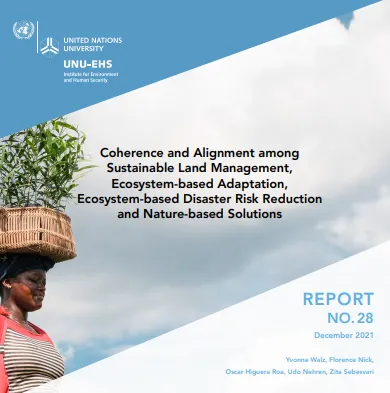
The United Nations University – EHS report, reviewed by WOCAT, aims to clarify what the approaches SLM, EbA, Eco-DRR and NbS entail and enable a coherent and aligned categorization within the UNCCD.
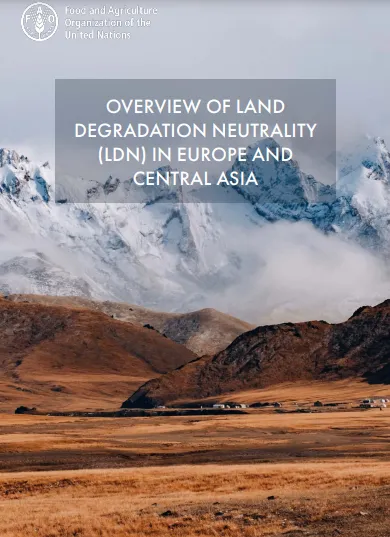
FAO spotlighted on WOCAT channels. Don't miss the reason why they joined WOCAT as Consortium Partner, their goal and participation in sharing knowledge about sustainable land management for food security, nutrition, and livelihoods of land users. We will be sharing insights, technologies, approaches, and tools illustrated within the publication entitled "Overview of land degradation neutrality (LDN) in Europe and Central Asia". Visit our Twitter and Facebook page for more.
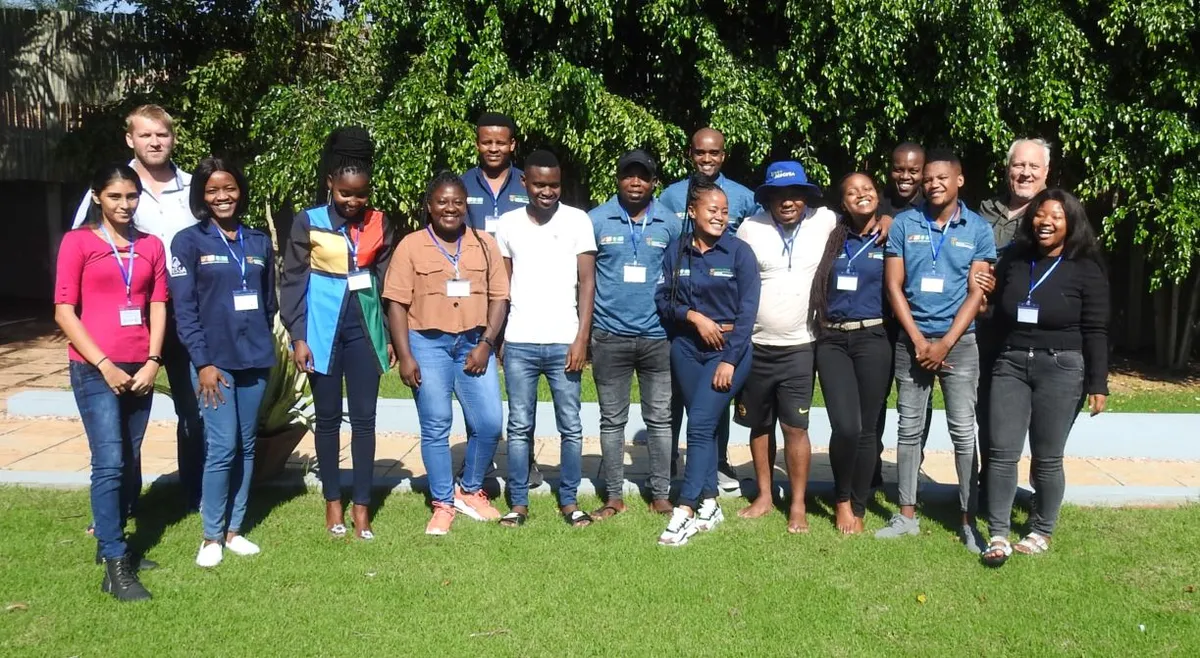
SMC Synergy, a long-standing partner of WOCAT in South Africa, presented a training seminar on the WOCAT Programme and GIS for the Groen Sebenza interns of the Department of Forestry, Fisheries, and the Environment on 8 and 9 February in Pretoria. The main objectives of the training were to introduce trainees to the WOCAT Programme, tools, and methods and to show the use of geo-informatics in environmental projects.
2021

WOCATeers it has been a while - the December newsletter is out! Find out about the latest achievements of WOCAT from a new framework agreement and strategy to the latest news on events, tools and knowledge products in our newsletter. You may also find updates on changes made to the website. Check it out to know more about turning theory in SLM into practice through tools, exchanges, platforms and programs covering themes from water, gender, dryland, drought, climate change and sand dust storms to land degradation.
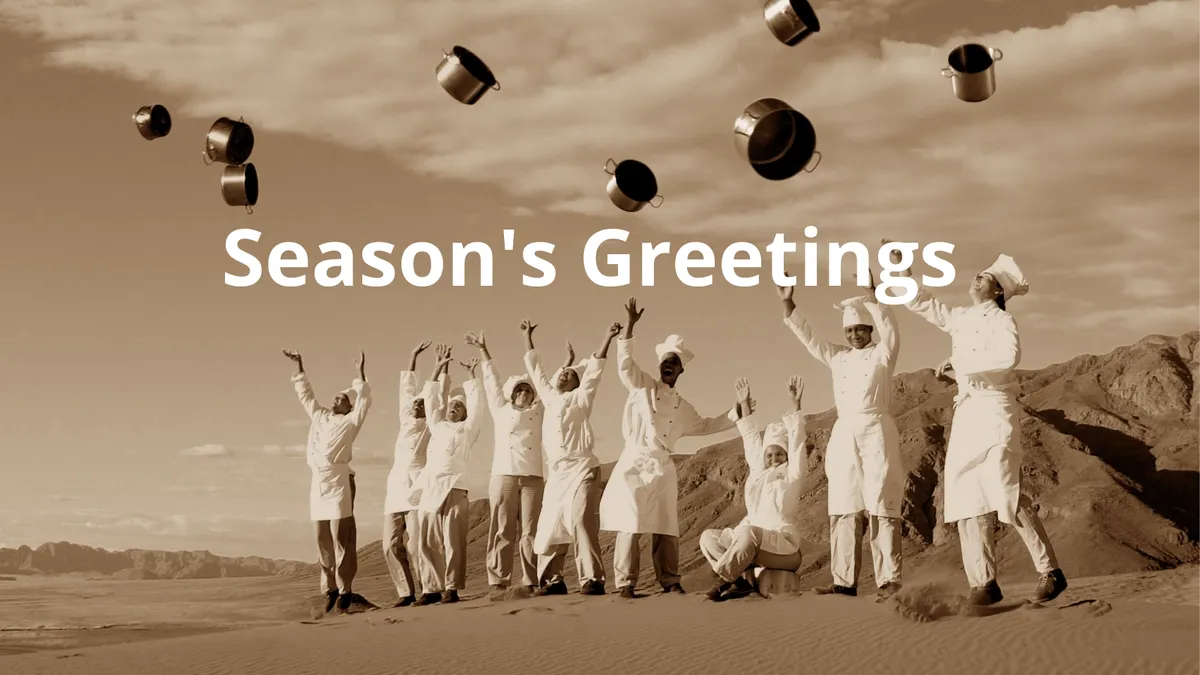
Season's Greetings from WOCAT! We thank individuals, organizations and our donors that have contributed to SLM and that have committed to our generation restoration. In 2022, we have a concrete wishlist in order to turn theory in SLM into practice. Climate change, biodiversity, sustainability and decentralization in development will be at the heart of our agenda to make sure to reduce land degradation. We are happy to start next year with a new Framework Agreement signed by all consortium partners including, FAO, ISRIC, CIAT, ICARDA, ICIMOD, GIZ and CDE and a new strategy to kick start 2022 with clear pathways to achieve our goal of becoming a leader in spreading SLM practices worldwide.
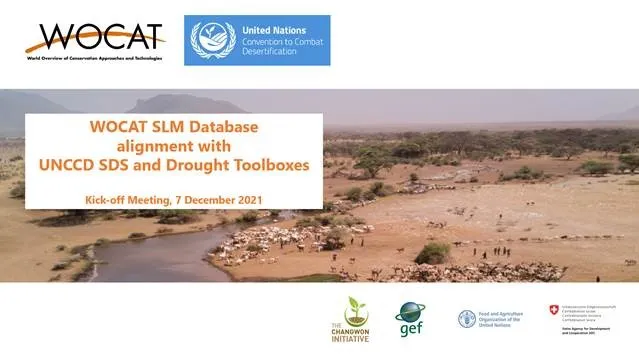
WOCAT and UNCCD Secretariat have started the project ‘Alignment and improved access of the WOCAT knowledge through the UNCCD Drought and SDS Toolboxes’, focusing on enhancing the WOCAT SLM practices dataset for exchanging good practices related to drought and SDS, and embedding those in the existing UNCCD Drought Toolbox as well as the SDS Toolbox under development.
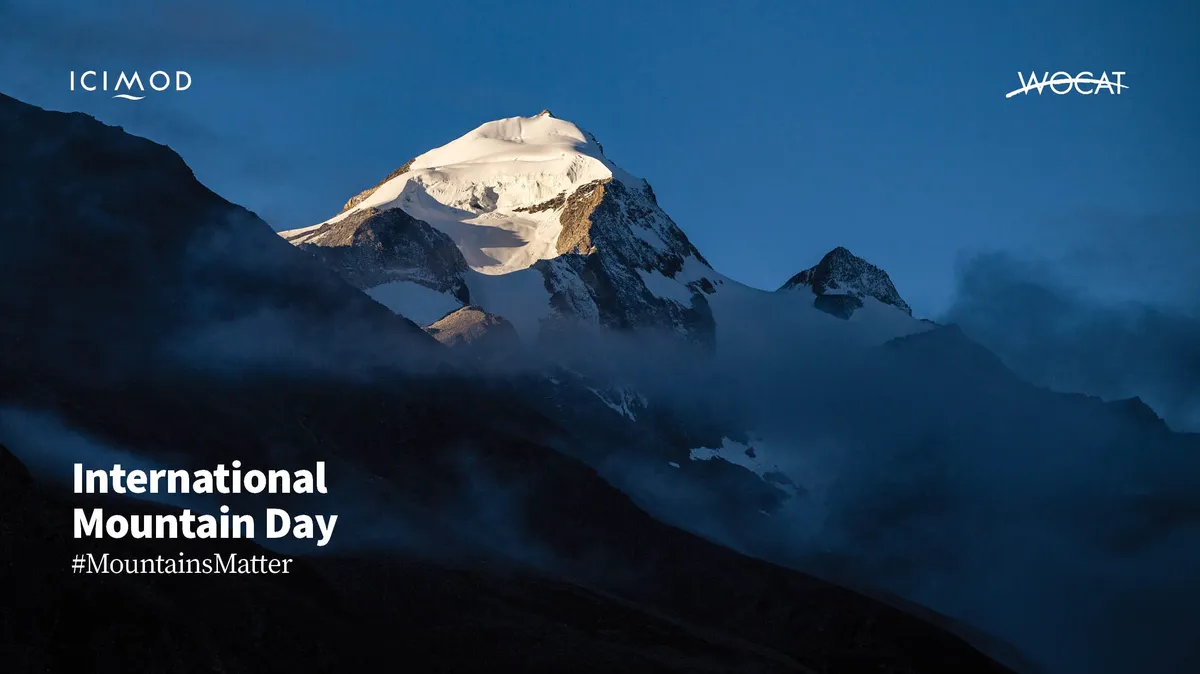
On 11 December it is World Mountain Day and we will launch a week dedicated to our consortium partner ICIMOD and share how they contribute in theory and in practice to WOCAT and sustainable land management (SLM). Sharing knowledge about the SLM of mountains drove ICIMOD to strongly commit to WOCAT. Look out on our channels for ICIMOD products and practices translating how mountains matter.
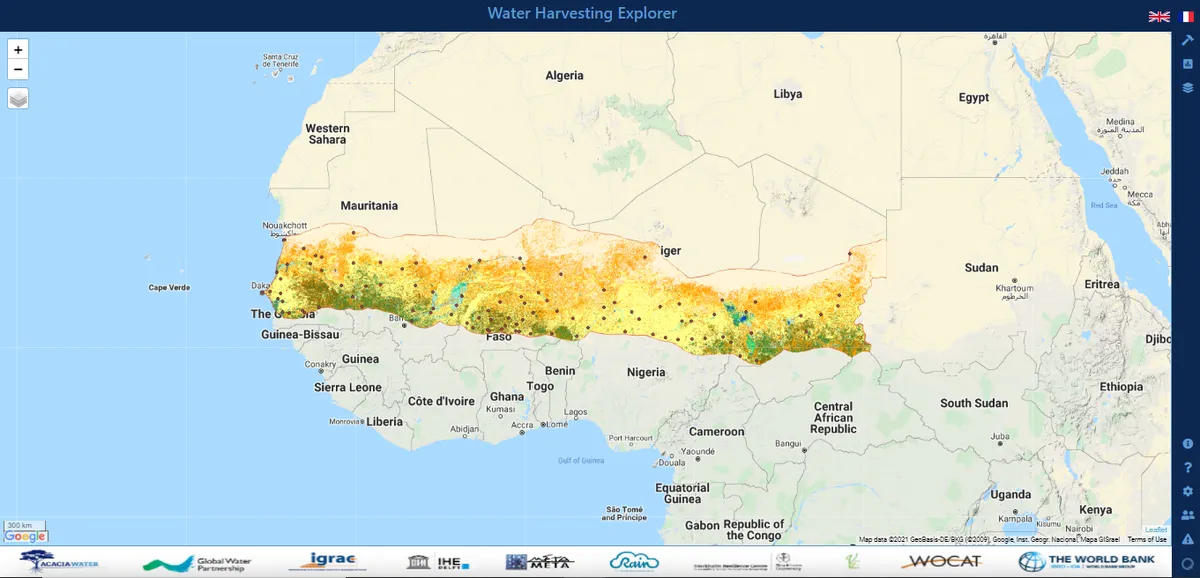
We are proud to share with you the Water Harvesting Explorer a decision support tool for small scale water storage intervention planning in the Western Sahel commissioned and funded by the Water Global Practice group of the World Bank and developed by a consortium of partners such as Acacia Water, RAIN (a brand of AidEnvironment), MetaMeta, IHE Delft and WOCAT. The tool includes WOCAT interventions and is available in French and English. Its technical backstopping was provided by Global Water Partnership, Verdant Earth, Stockholm Resilience Center and UNESCO-IGRAC. It allows practitioners to compare technologies based on bio-physical typologies like precipitation, typography, land cover, etc. The webtool further enables the user to plan the type of intervention by conducting a rapid survey of implementation modalities.
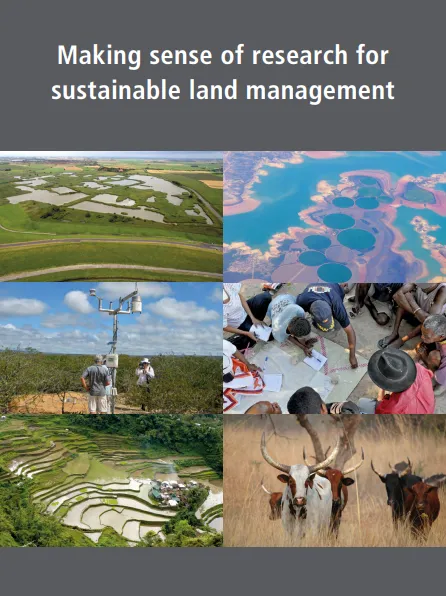
This week we will be presenting the book 'Making Sense of Research for Sustainable Land Management' co-published in 2017 by the Centre for Development and Environment, University of Bern, Switzerland and the Helmholtz-Centre for Environmental Research, UFZ, Leipzig, Germany. We will share with you on social media our take-home messages. In short, the book is about scientific research which makes sense in the field. It proves that sustainable intensification and management of our land use is possible if done right. It can serve purposes from raising yields to ensuring the transformation of degrading land into a productive natural resource sustaining livelihoods.
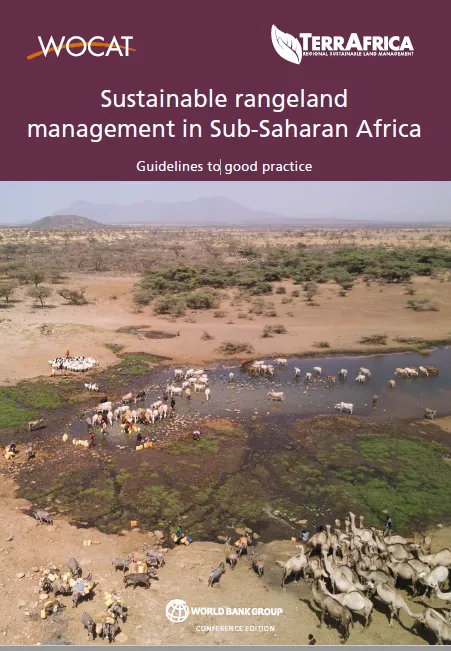
This week it's rangeland week on our channels! Because of the high level of diversity and heterogeneity of rangelands, six rangeland use systems (RUS) were identified based on mobility, scale, boundaries and combination with crop and wildlife management. There can be an overlap between the different RUS but each requires specific interventions. Also, rangeland managers shift between different RUS according to seasons and emergency situations as an adaptation strategy to challenging conditions like droughts or conflicts. Shrublands, grasslands, and savannahs are components of rangelands used by pastoralists for extensive livestock production and are key to the UN Decade on Ecosystem Restoration.
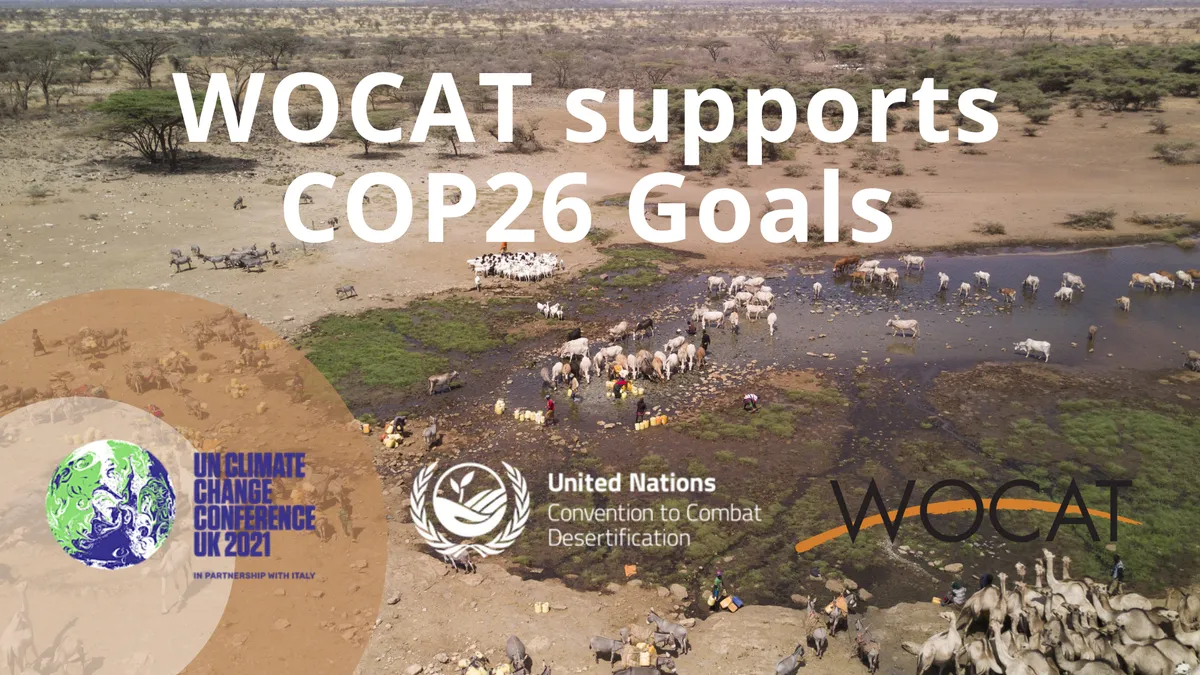
We stand with countries to help implement land-based solutions that are context and climate specific to achieve the four #COP26 goals : mitigate, adapt, finance and collaborate. We can help through data, tools, methods, knowledge sharing and synergies between partners and stakeholders to accelerate the protection and restoration of nature for the benefit of people and climate. We have hope in science and good practices to alleviate challenges and reach targets and build a climate resilient future for all. During COP26, watch out for our climate actions from all regions on our social media channels!
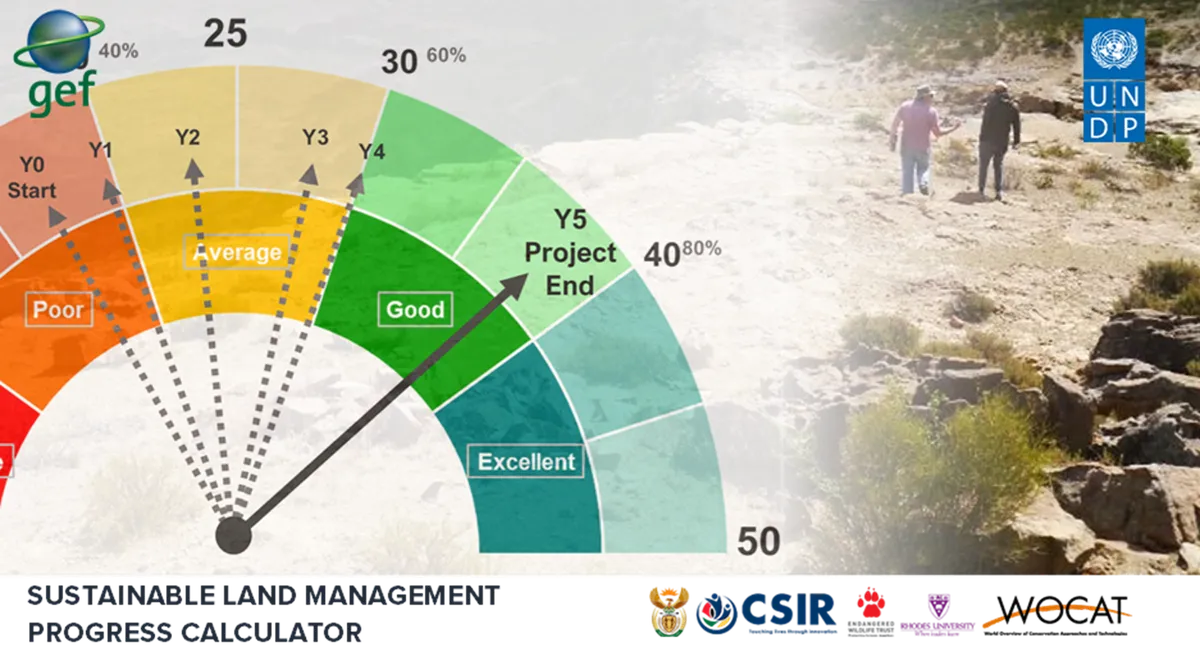
In September, UNDP South Africa and WOCAT signed a Memorandum of Understanding to collaborate in the further development and promotion of the SLM Progress Calculator – a new tool developed under the UNDP-GEF5 Sustainable Land Management Project, titled Securing multiple ecosystems benefit through SLM in the productive, but degraded landscapes in South Africa. The SLM Progress Calculator aims to monitor the reduction or prevention of land degradation, improvement and out-scaling SLM measures and the creation of an enabling environment for SLM. It uses a participatory approach to evaluate progress supported by contextual evidence collected during the project. This collaboration will permit an open access SLM Progress Calculator to be upgraded and made globally more adaptable for different Land Degradation, SLM and biodiversity conservation interventions at different spatial scales. Furthermore, the collaboration will provide training on the use of the tool through the WOCAT network.
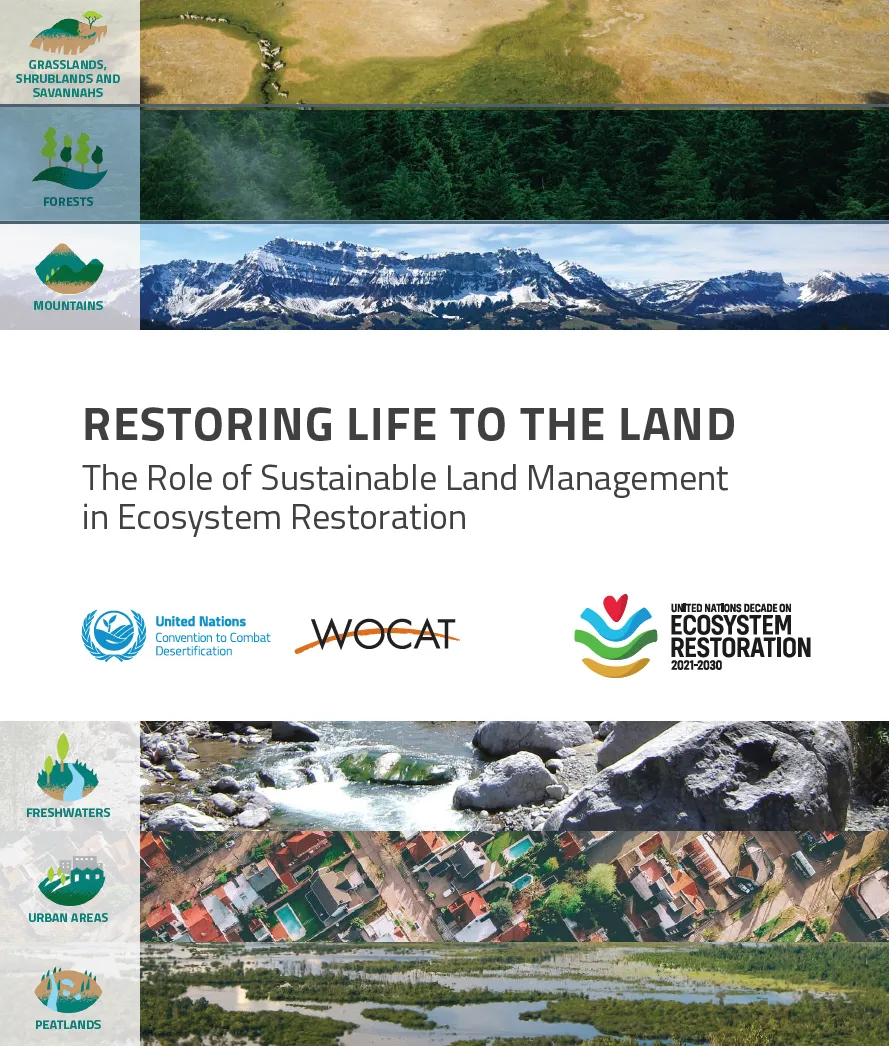
The new publication "Restoring Life to the Land – The Role of Sustainable Land Management in Ecosystem Restoration" prepared jointly by UNCCD Secretariat and WOCAT in the context of the UN Decade on Ecosystem Restoration illustrates how SLM experience feeds directly into ecosystem restoration efforts, as well as ecosystem maintenance. It showcases field-tested good practices under each of the eight ecosystems from all over the world.
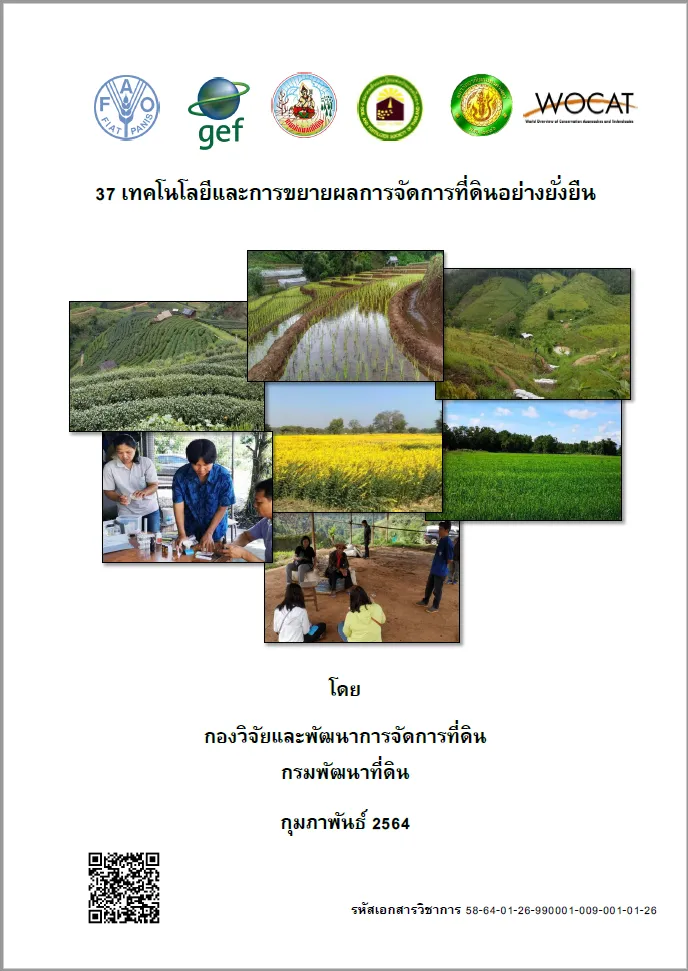
Watch out for our Thailand series on Twitter and Facebook. We will be sharing good practices addressing soil erosion as well as saline and sodic soils - main issues highlighted for Thailand in the DS-SLM project. We invite partners, WOCATeers and stakeholders to visit our channels for more information around how to make use of evidence to support mainstreaming and scaling-out SLM practices.
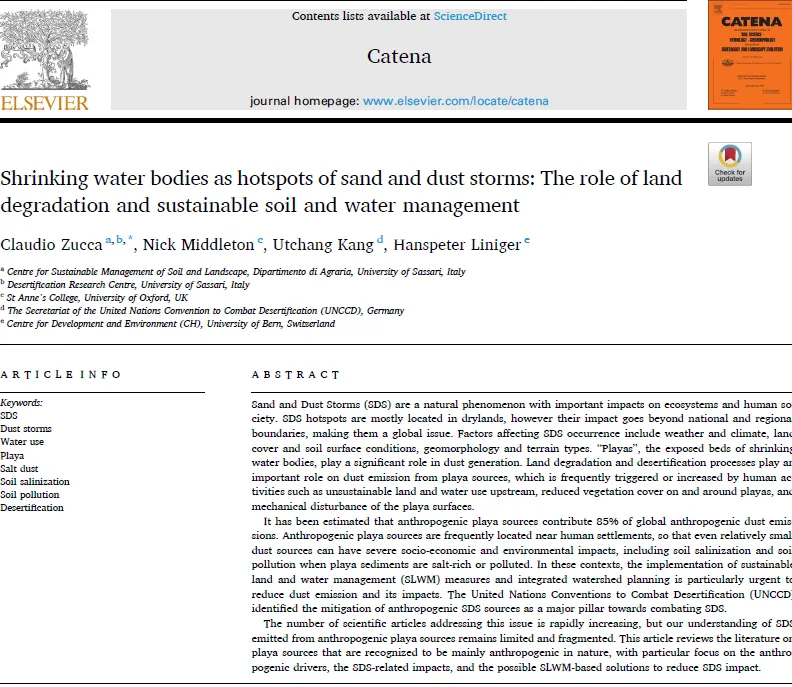
Sustainable Land and Water Management (SLWM) practices are often advocated by authors to mitigate Sand and Dust Storms (SDS) impacts, however, in many cases these are just mentioned, without indicating specific practices and without presenting examples. The authors of this paper thus reviewed the WOCAT database to identify concrete examples of SDS-relevant SLWM practices.
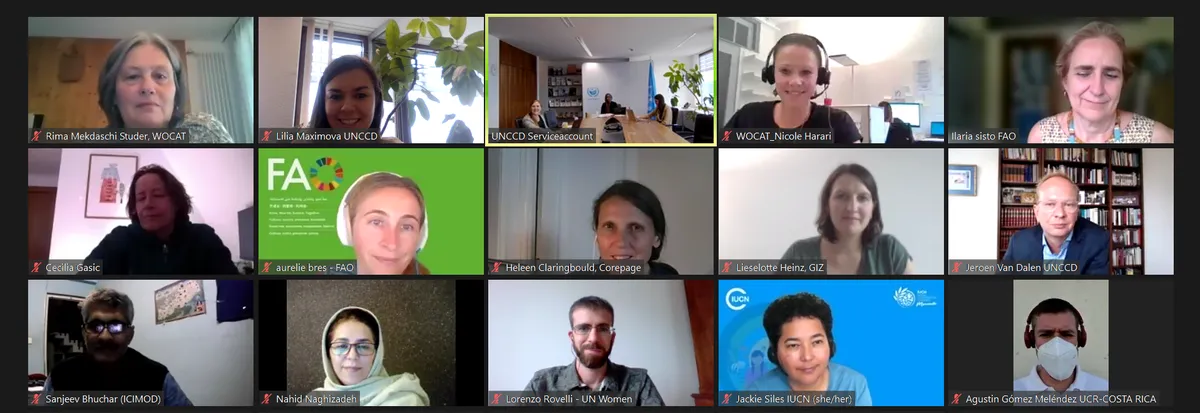
Sustainable land management (SLM) needs to be inclusive and improve opportunities for vulnerable groups including women and youth. On 14-15 September 2021, WOCAT and UNCCD conducted a review workshop to fine-tune the jointly-developed questionnaire on gender-responsiveness of SLM Technologies and Approaches.
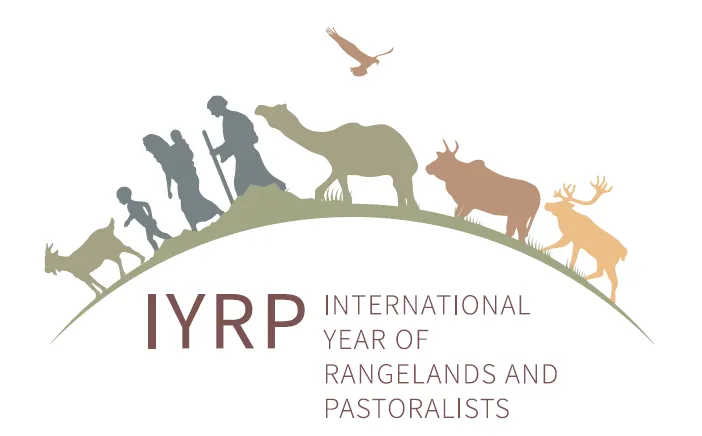
The International Year of Rangelands and Pastoralists (IYRP) 2026 is endorsed by the FAO Conference. WOCAT recognises how rangelands and pastoralists contribute to SLM and expressed its interest in sending a Letter of Support for IYRP proposal to the Government of Mongolia.
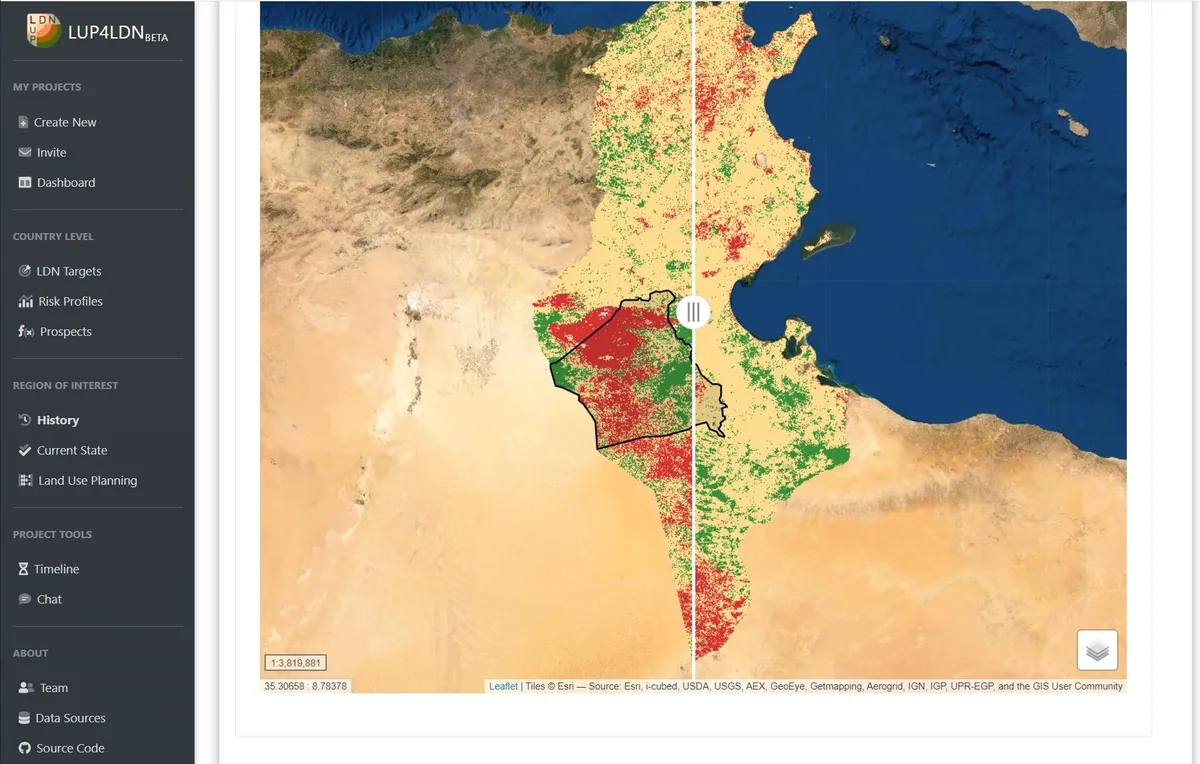
After a long journey LUP4LDN tool from SCiO, ICARDA, WOCAT, Università degli Studi di Sassari and ELD wins the GEO-LDN Competition and will receive financial and technical support to transform their prototype into an operational and scalable tool.
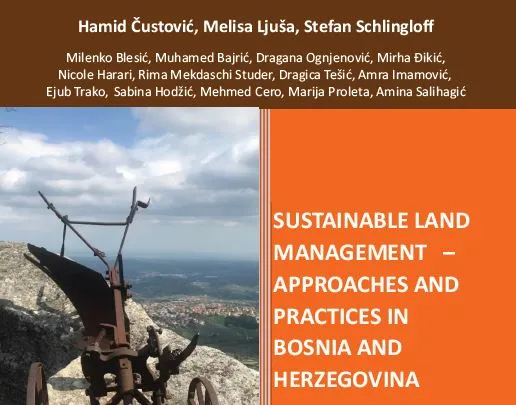
Learn how Bosnia and Herzegovina is mainstreaming and scaling out SLM practices in this new publication by WOCAT partners from the University of Sarajevo, Faculty of Agriculture and Food Sciences.
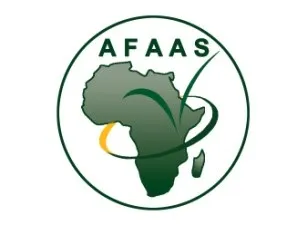
The African Forum for Agricultural Advisory Services (AFAAS) and WOCAT will work together to enhance capacities of extension services and farmers in SLM and support the scaling of SLM innovations in Africa.
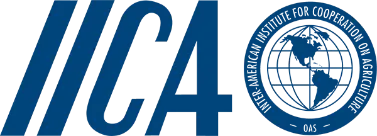
Partnering for impact: IICA, the Inter-American Institute for Cooperation on Agriculture, and WOCAT signed a Memorandum of Understanding to work together to strengthen SLM activities and promote healthy soils in agricultural and livestock production systems in the Americas.
2020
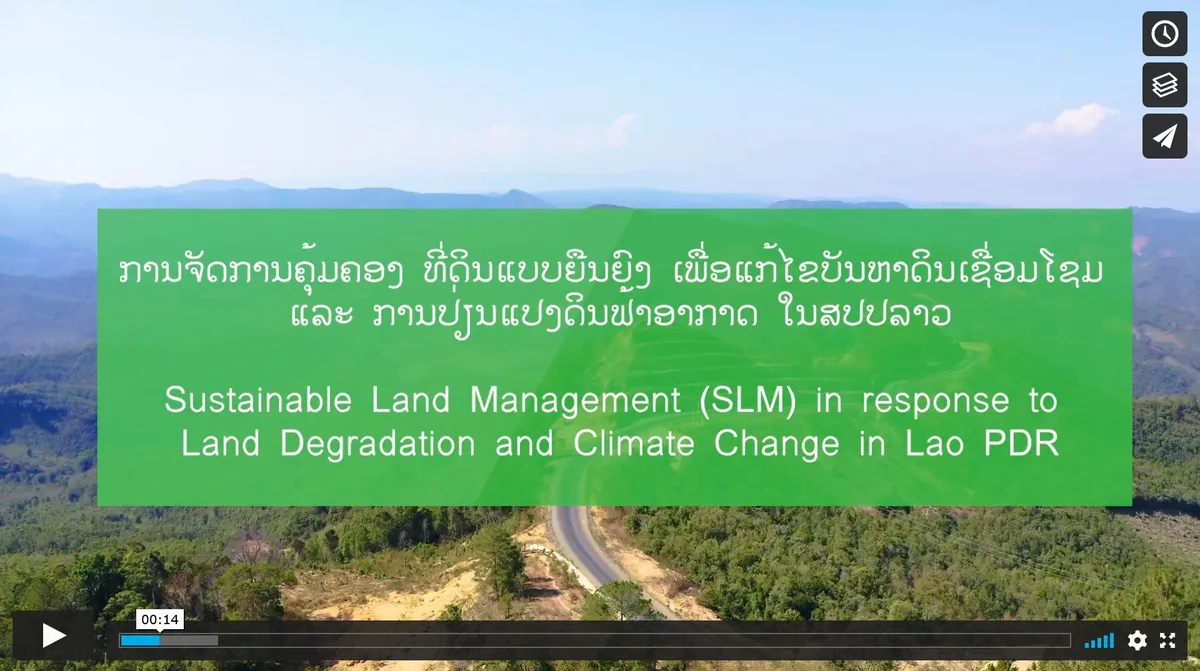
Watch the video produced by WOCAT partner National Agriculture and Forestry Research Institute (NAFRI) Lao PDR as part of the project Scaling up SLM by smallholder farmers and learn about land degradation and SLM in Lao PDR.
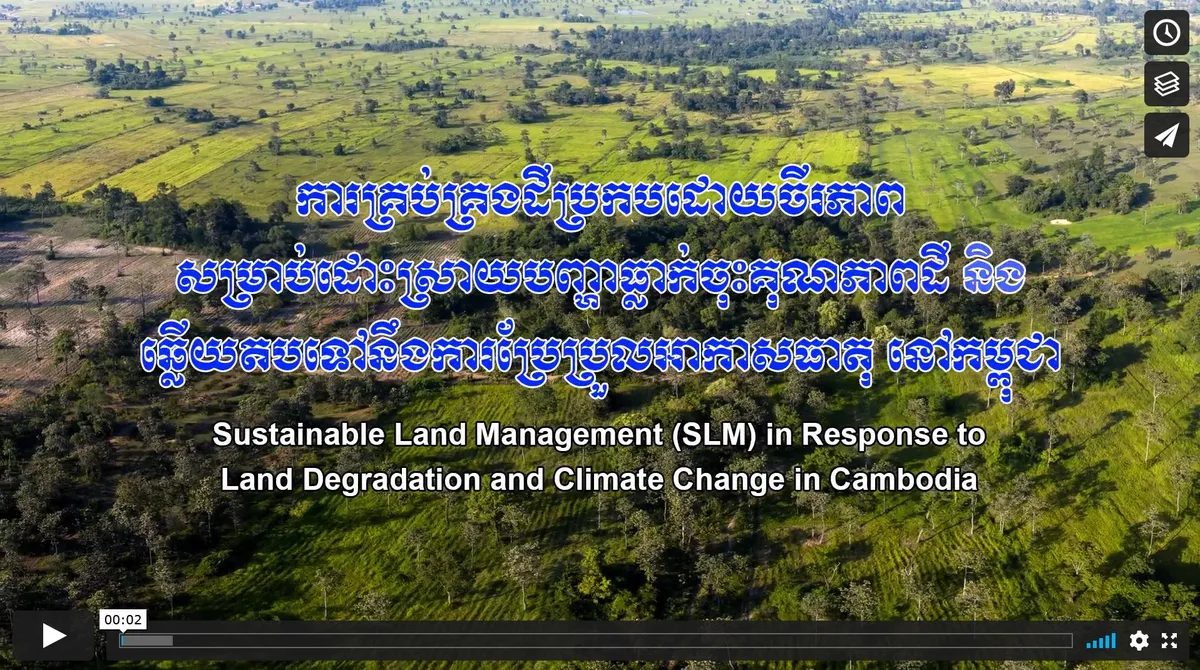
Watch the video produced by WOCAT partner Royal University of Agriculture (RUA) Cambodia as part of the project Scaling up SLM by smallholder farmers and learn about land degradation and SLM in Cambodia.
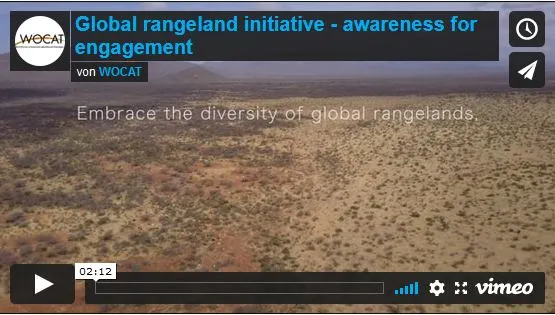
Watch the trailer presented at the Global Landscapes Forum Biodiversity 2020, 28-29 Oct. 2020, to raise awareness for rangelands and call for global attention and action.
Rangelands provide irreplacable services to humanity living in and outside the rangelands. Yet, they are threatened and neglected.
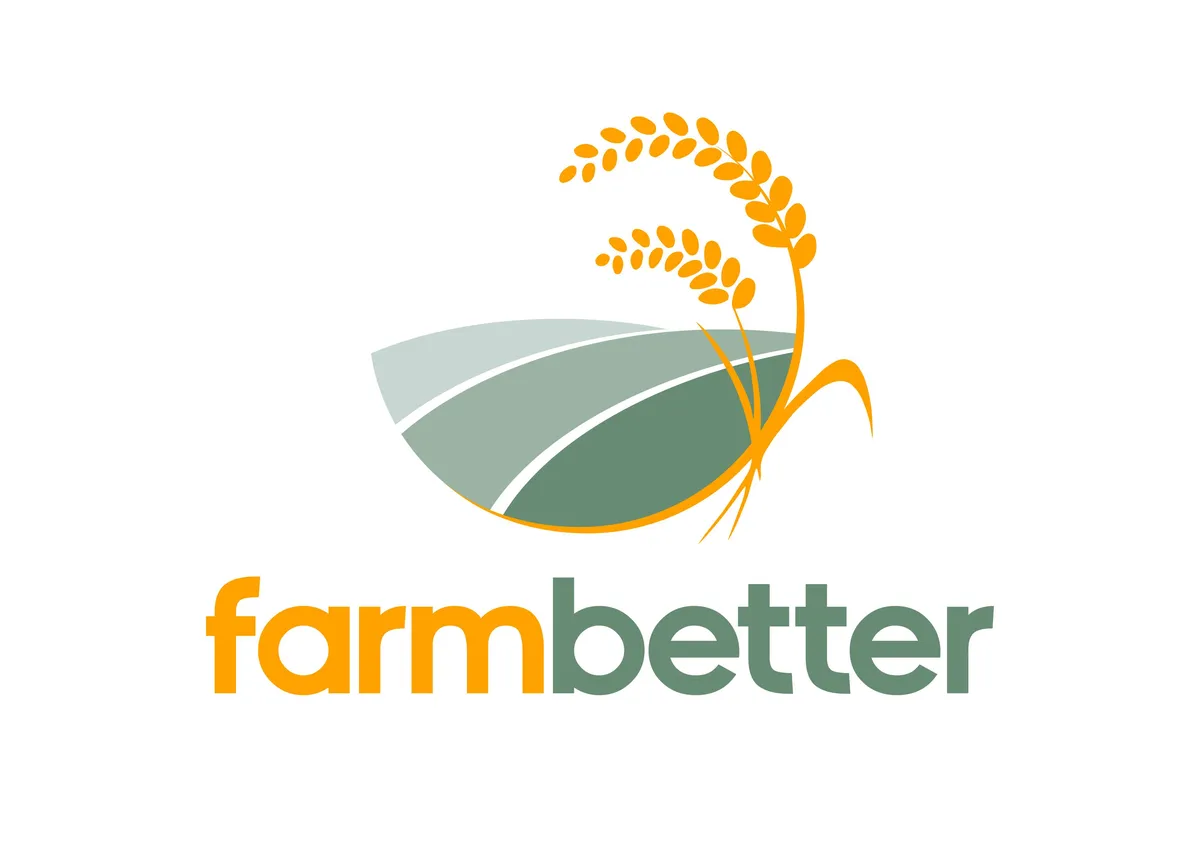
We are happy to announce WOCAT’s partnership with farmbetter Ltd., a social enterprise developing digital solutions for smallholder farmers and extension. The farmbetter app (in development) draws on WOCAT SLM data to provide farmers with SLM solutions matching their needs and context to improve their climate resilience and livelihoods.
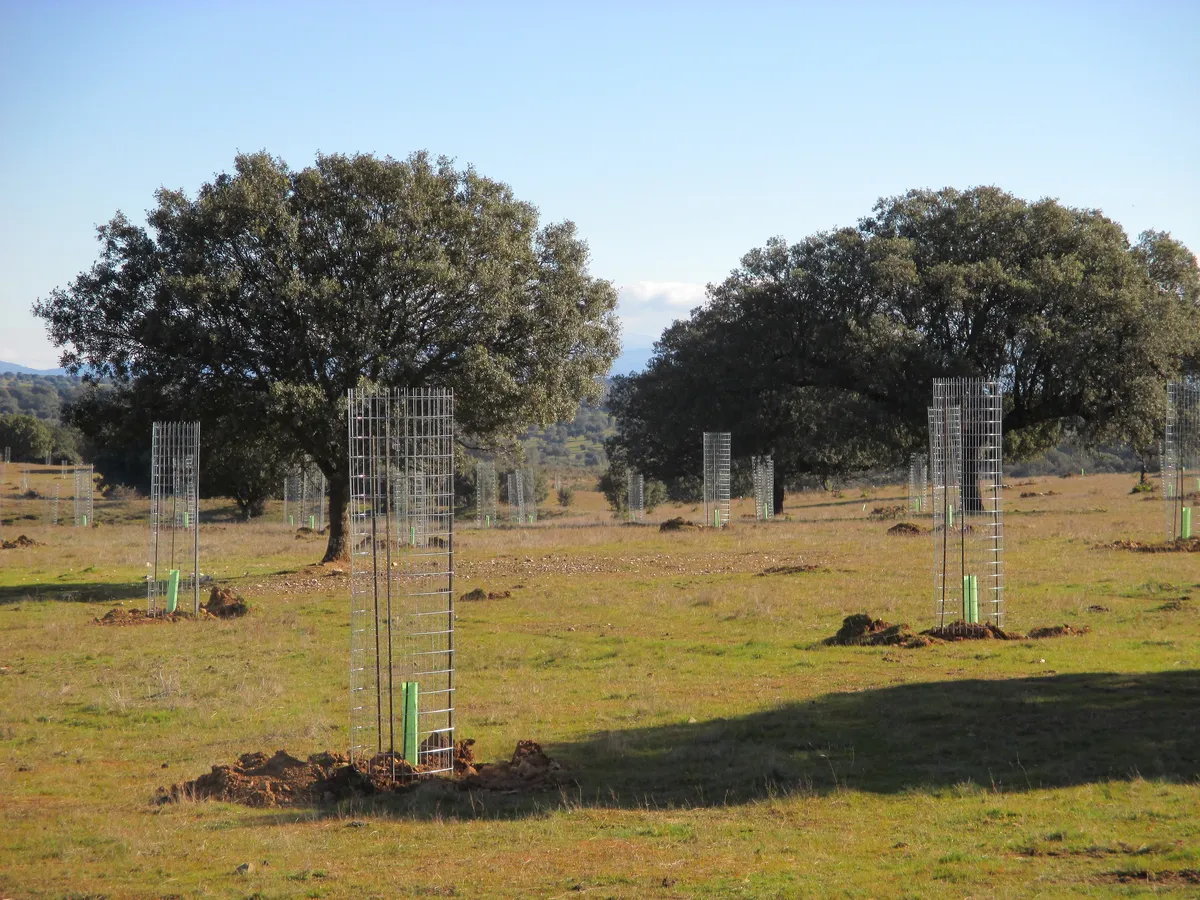
WOCAT is collaborating with the EU-funded project on Land-use based Mitigation for Resilient Climate pathways (LANDMARC). The Project will answer the question about the realistic potential for agriculture, forestry, and other land use sectors to enhance the uptake of CO2 from the atmosphere.
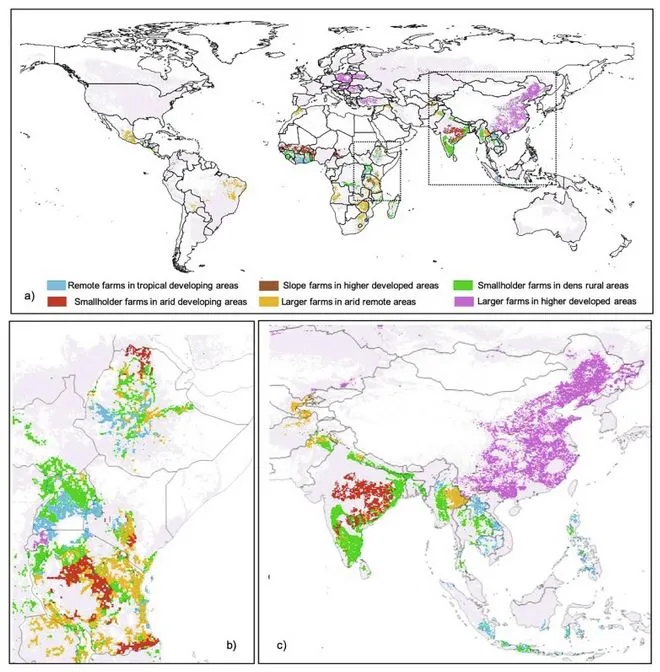
A recent paper in Global Environmental Change from a collaboration between the Stockholm Resilience Centre, WOCAT and the University of Florence, explores the global potential of SLM to increase crop production. It provides a new methodology based on global spatial data and the WOCAT database to support the out-scaling of existing, successful, documented SLM Technologies. The methodology is scalable and aims at supporting decision making on replication and transferability of SLM at a national to regional scale. Currently, the methodology is being applied to Uganda as a first national case study.
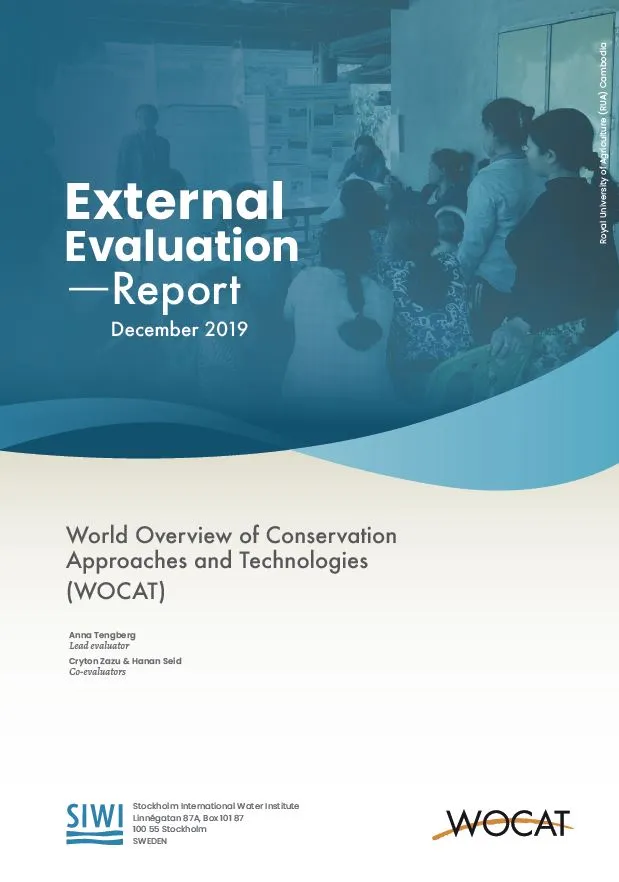
The Evaluation Report, written by Anna Tengberg (SIWI) with Cryton Zazu & Hanan Seid presents the impacts of WOCAT in its 25 years of operation. A combination of methods was used, including documentation review, a questionnaire survey to the entire network, semi-structured interviews with key informants, participation in the 19th global WOCAT Network Meeting in mid-May 2019, and field visits to four countries.
The lessons learnt and recommendations of have been addressed and integrated in the development of the new WOCAT 2020+ strategy that will be launched by the end of 2020.
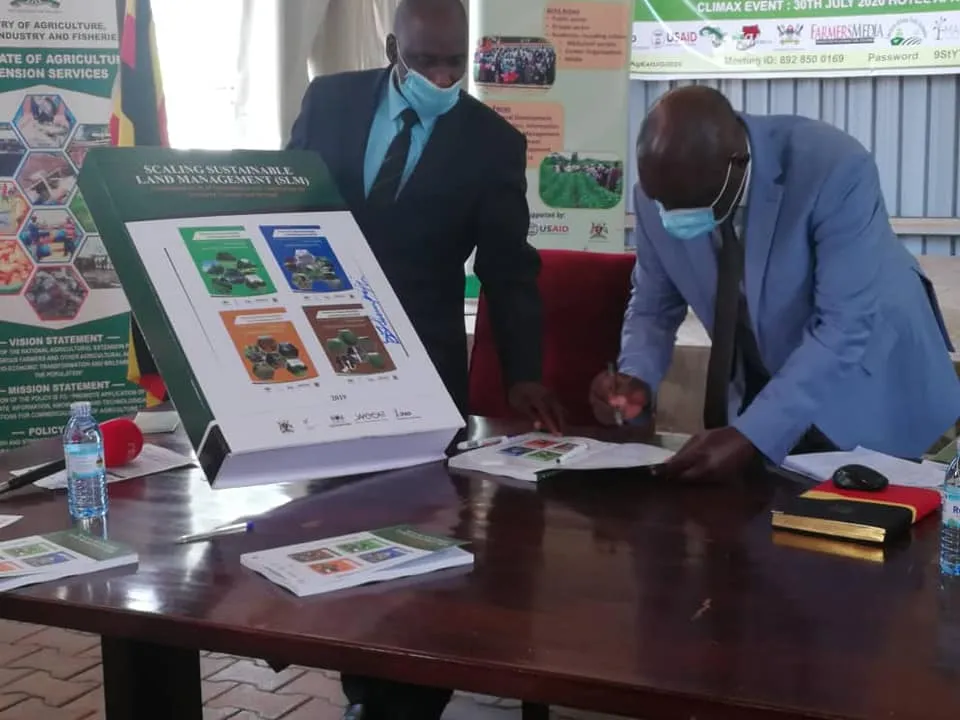
Today, HE Vincent Bamulangaki Ssempijja, Minister for Agriculture, Animal Industry, Fisheries, Uganda, launched the 'SLM Collection from Northern Uganda and beyond' prepared by WOCAT partner Uganda Landcare Network (ULN) in collaboration with extension services and the National Agriculture Research Organization (NARO) with support from IFAD. The event took place during the Uganda Froum for Agriculture Advisory Services (UFAAS) national extension e-symposium 2020.
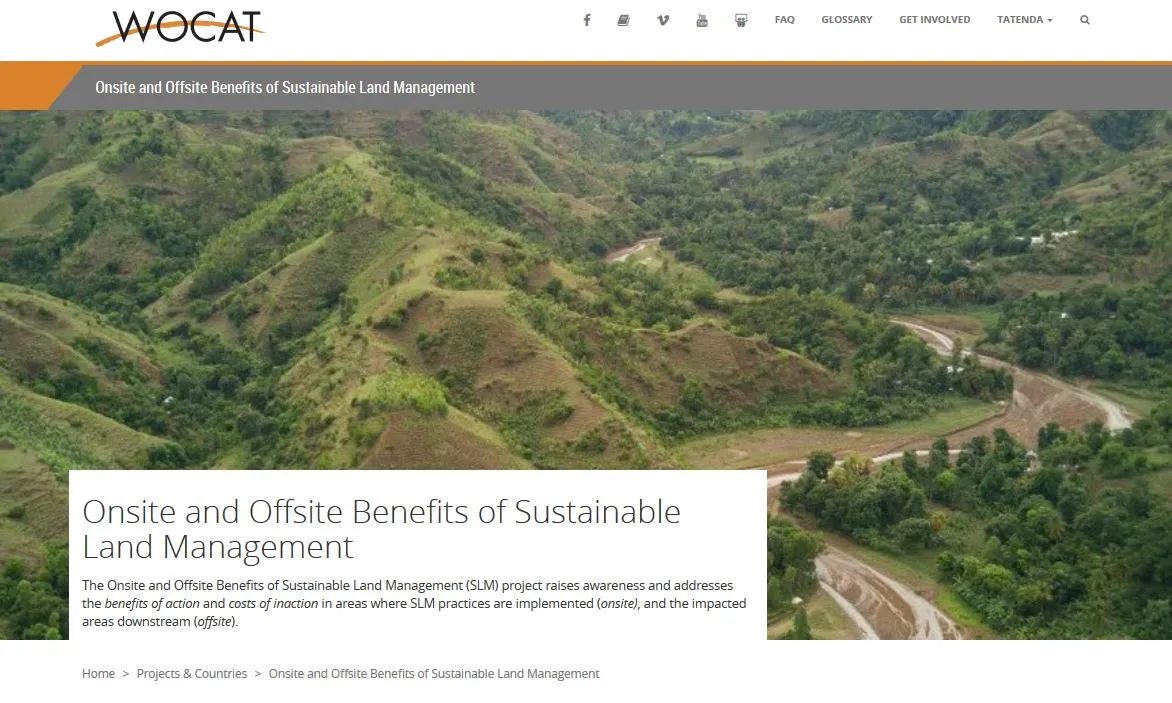
Learn about the benefits of good land management onsite and offsite with a series of videos, policy briefs and other materials from Haiti, Colombia, India and Iceland. SLM goes far beyond improving productivity of the land and benefitting land users – it is for the benefit of all.
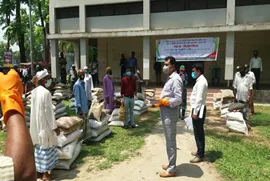
In this new series, WOCAT partners share insights on how the COVID-19 pandemic is affecting land use, agriculture, and small farmers in their region. The short reports reveal the distinct ways that authorities and people on the ground in different settings are responding to a common threat.
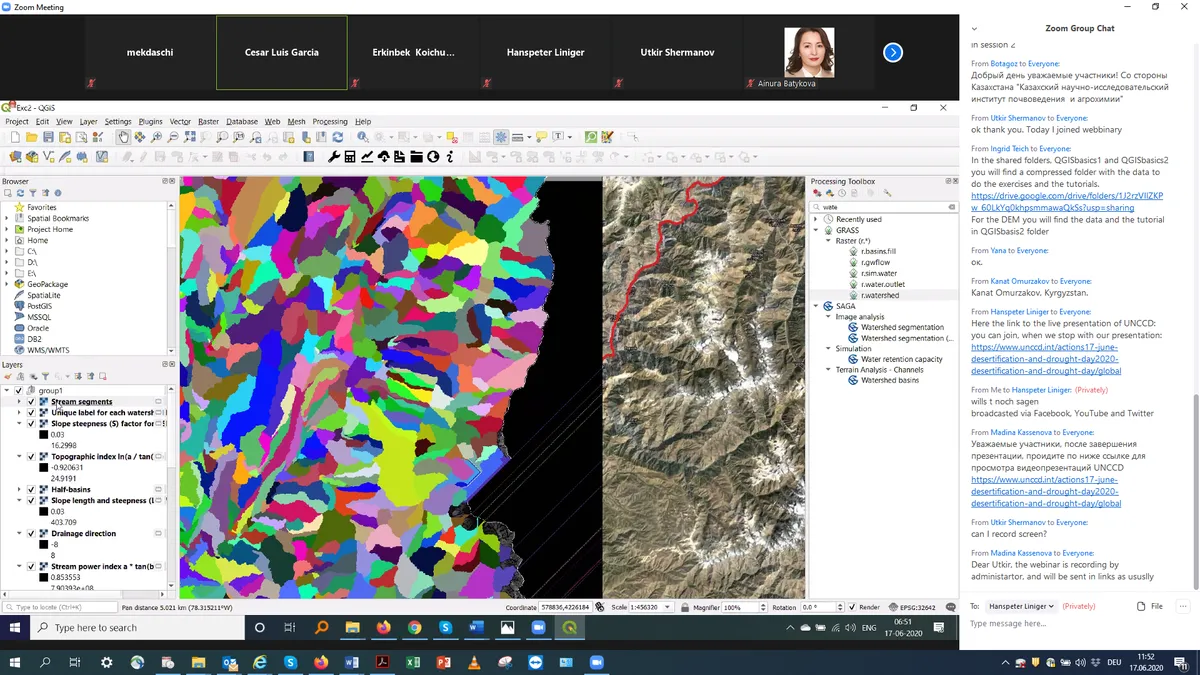
From June 15-19, 2020 an online training on QGIS and the WOCAT watershed tool for 70 participants from Central Asian countries took place. This is part of a series of trainings in the framework of the GEF/FAO CACILM II project organized by WOCAT and partners to support countries in mapping land degradation and SLM.
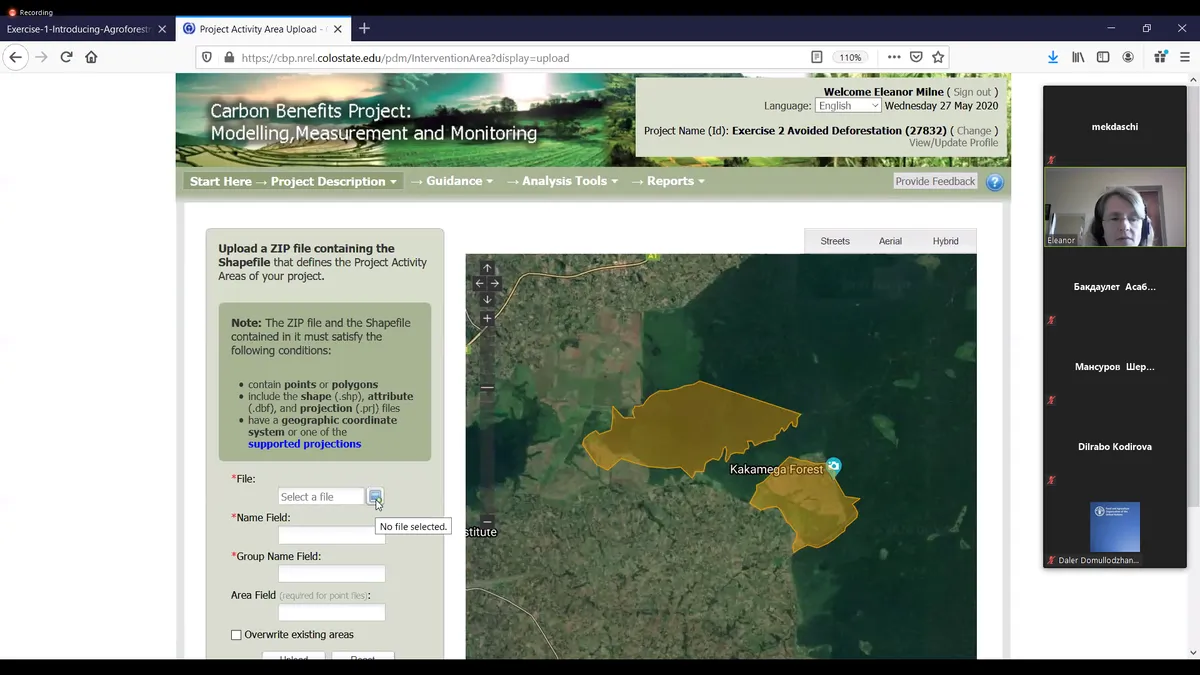
In the week of 25 May 2020 almost 100 participants from Central Asia countries are participating in an online training course on the Carbon Benefits Project (CBP) Tools within the framework of the Central Asian Countries Initiative for Land Management (CACILM II) project. The training will allow participants to calculate carbon stocks and greenhouse gas emissions associated with land management projects and report on the impacts of activities on climate change mitigation.
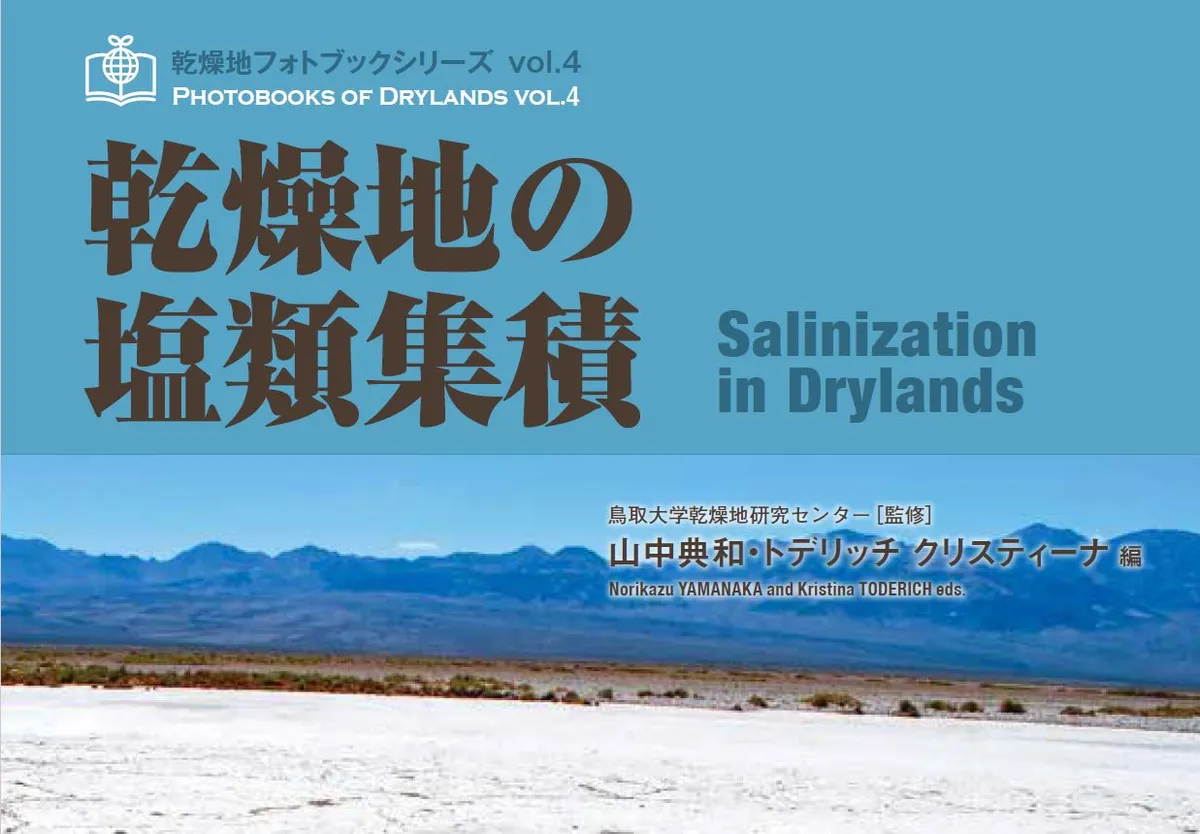
A new Photobook by the Arid Land Research Center, Tottori University, seeks to inform about the nature of salt accumulation in soils of drylands and the challenges faced in achieving sustainable land management with agricultural potential from salt affected soils.
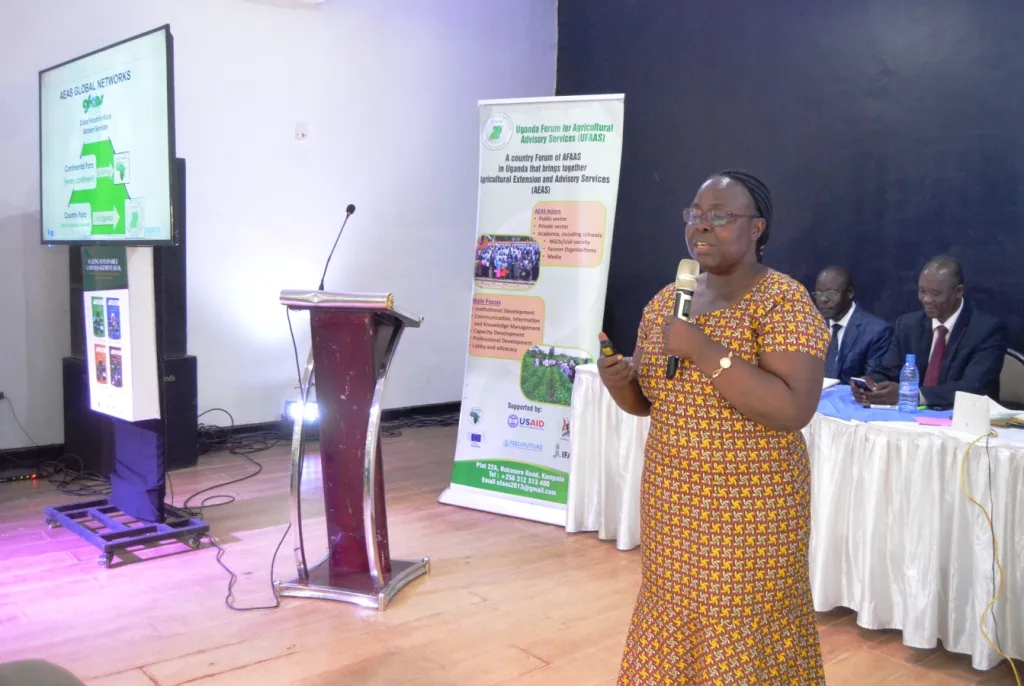
Within the farmework of the IFAD grant Scaling up SLM with smallholder farmers the WOCAT partner Uganda Landcare Network (ULN) carried out a workshop with the Uganda Forum for Agricultural Advisory Services (UFAAS) and stakeholders from the public and private sector, academia, landcare groups, farmer organizations and others to mainstream and align SLM in the UFAAS and the African Forum for Agricultural Advisory Services (AFAAS) modalities of operations.
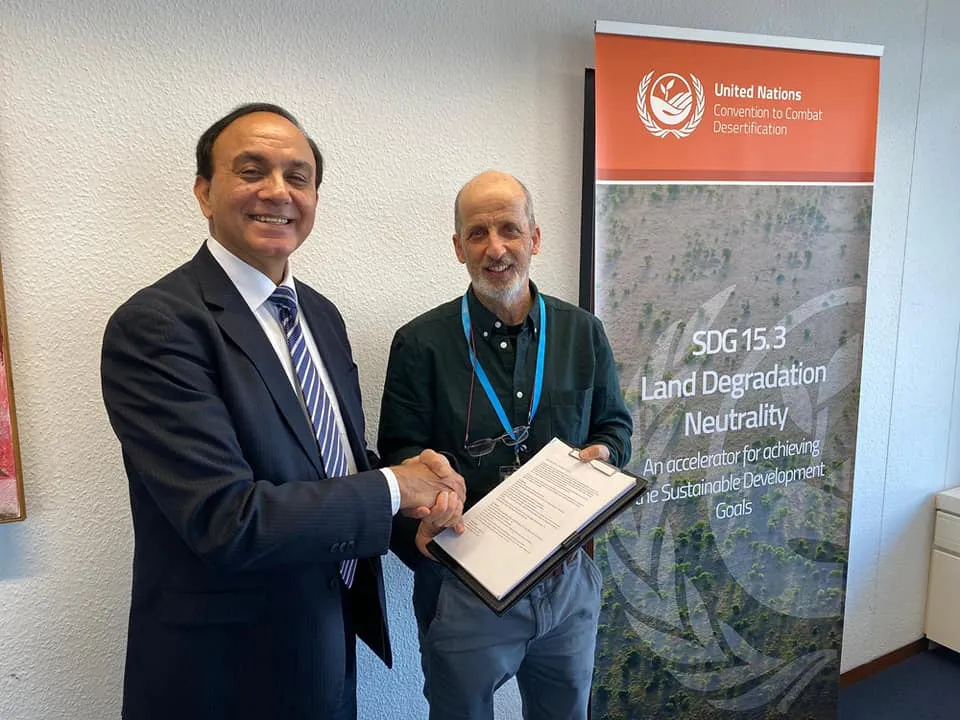
WOCAT renewed its partnership with the United Nations Convention to Combat Desertification (UNCCD) to jointly boost the uptake of SLM around the world through strengthened global partnership. The agreement was signed by the Deputy Executive Secretary of UNCCD, Mr. Pradeep Monga, and WOCAT Director, Mr. Hanspeter Liniger, on behalf of the WOCAT Consortium.
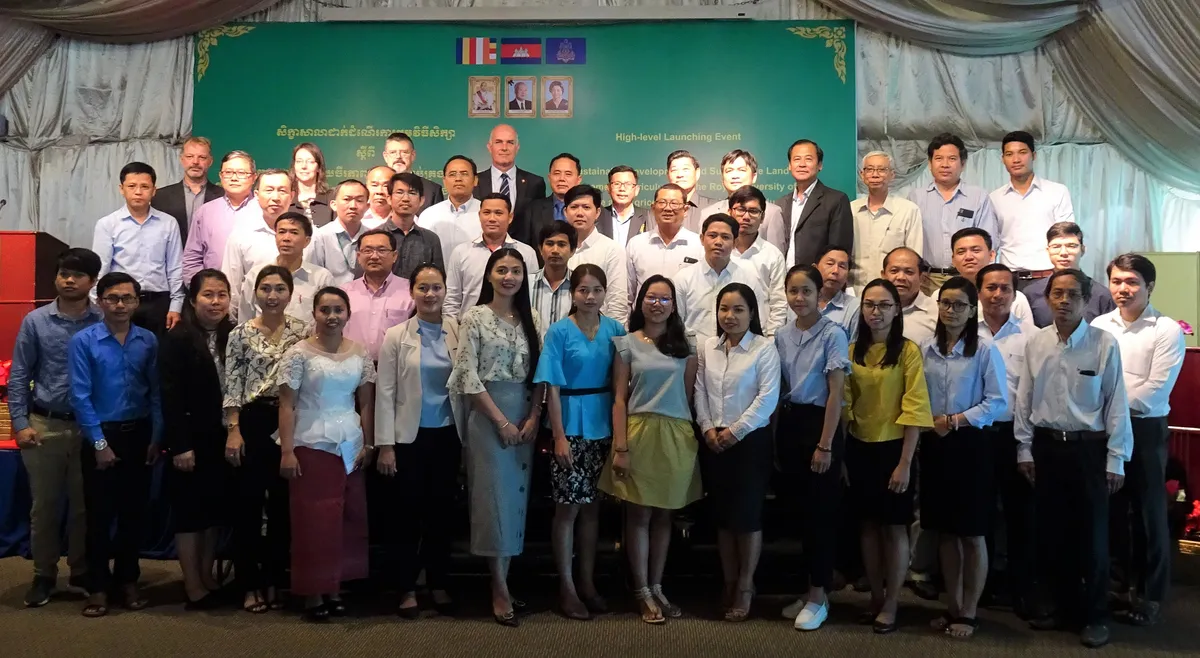
High-level Launch of the Sustainable Development and Sustainable Land Management Curriculum with the Under Secretary of State Cambodia, Vice-Rector of the Royal University of Agriculture (RUA) Cambodia, and the Swiss Development Cooperation in Phnom Penh. The launch is followed by a one-week training of RUA lecturers on the content of the curriculum, focusing on Education for Sustainable Development (ESD) approaches.
2019
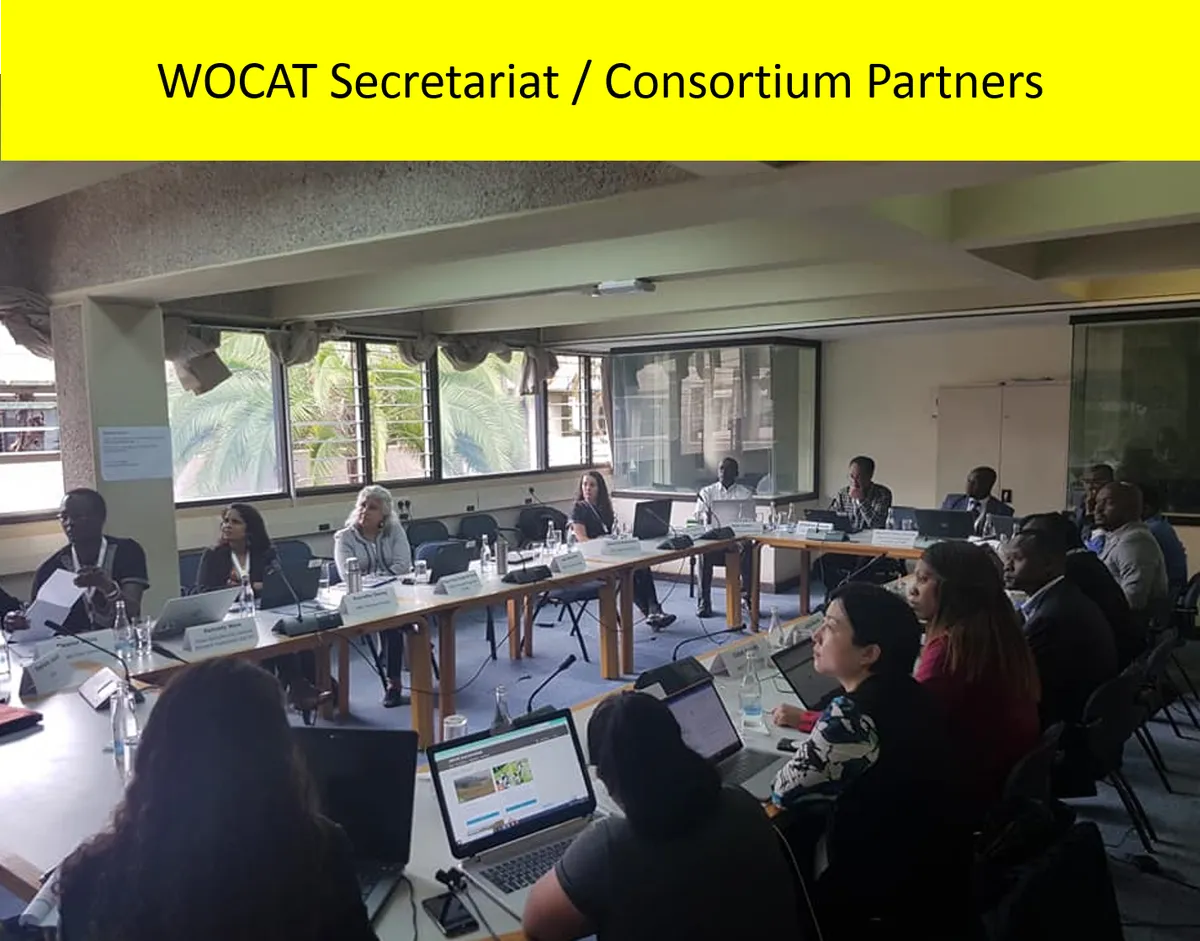
A training on the use of the CBP/WOCAT linked online toolset for calculating carbon stocks and GHG emission associated with land projects, establishing resulting socioeconomic benefits and exploring SLM options for implementation was provided to GEF project managers, UNEP and GEF program officers, and GEF focal points, by Colorado State University and WOCAT Consortium Partner CIAT at UN Environment in Nairobi, Kenya.
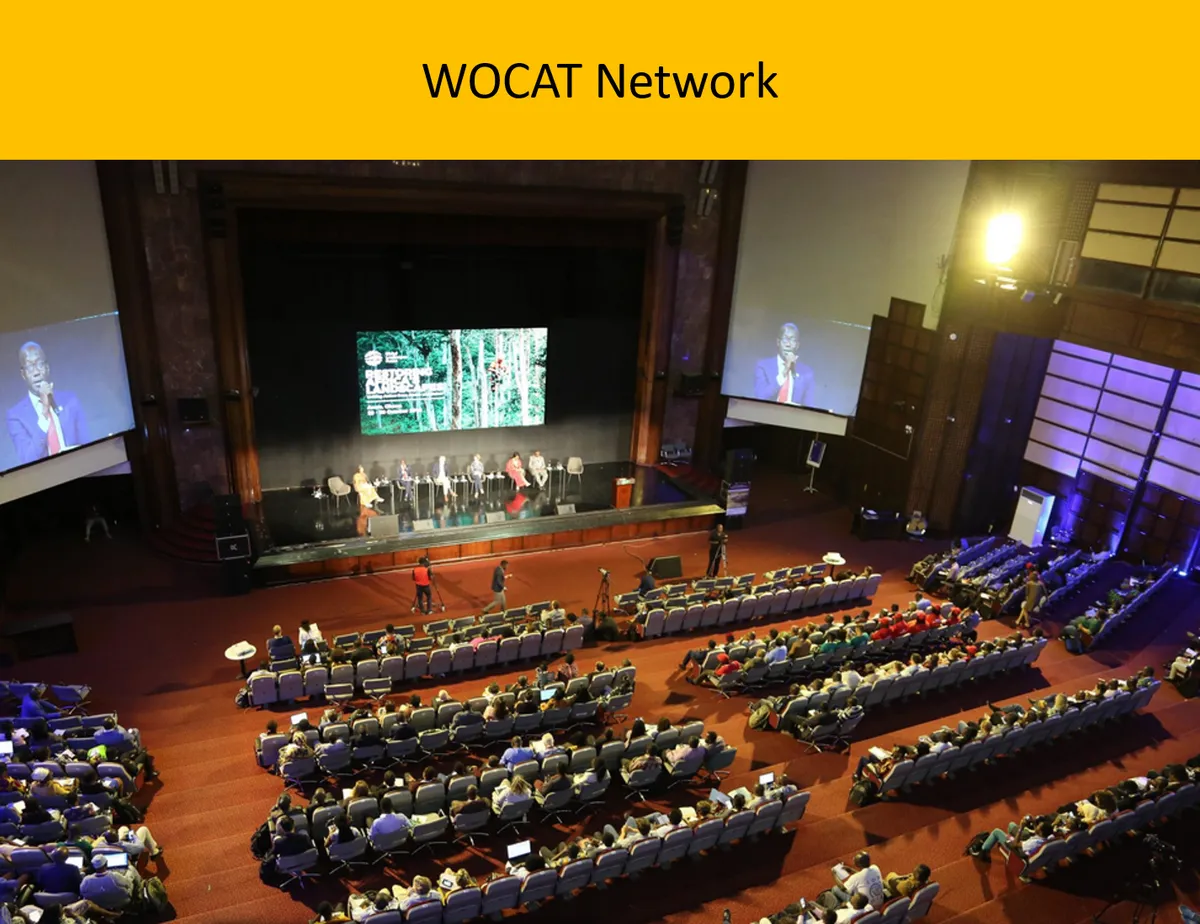
On 29-30 October 2019, the Global Landscapes Forum was convened in Accra, Ghana, with a focus on restoring the degraded ecosystems on the world’s largest continent. More than 500 participants joined. The session ‘Sustainable RangelandManagement in a Changing Environment: An Introduction to Good Practices’ and the AsaseFest Session ‘Pastoralism: participatory rangeland mapping’ put the often forgotten rangelands and pastoralism in the spot light of the GLF/Restoration map with great success.
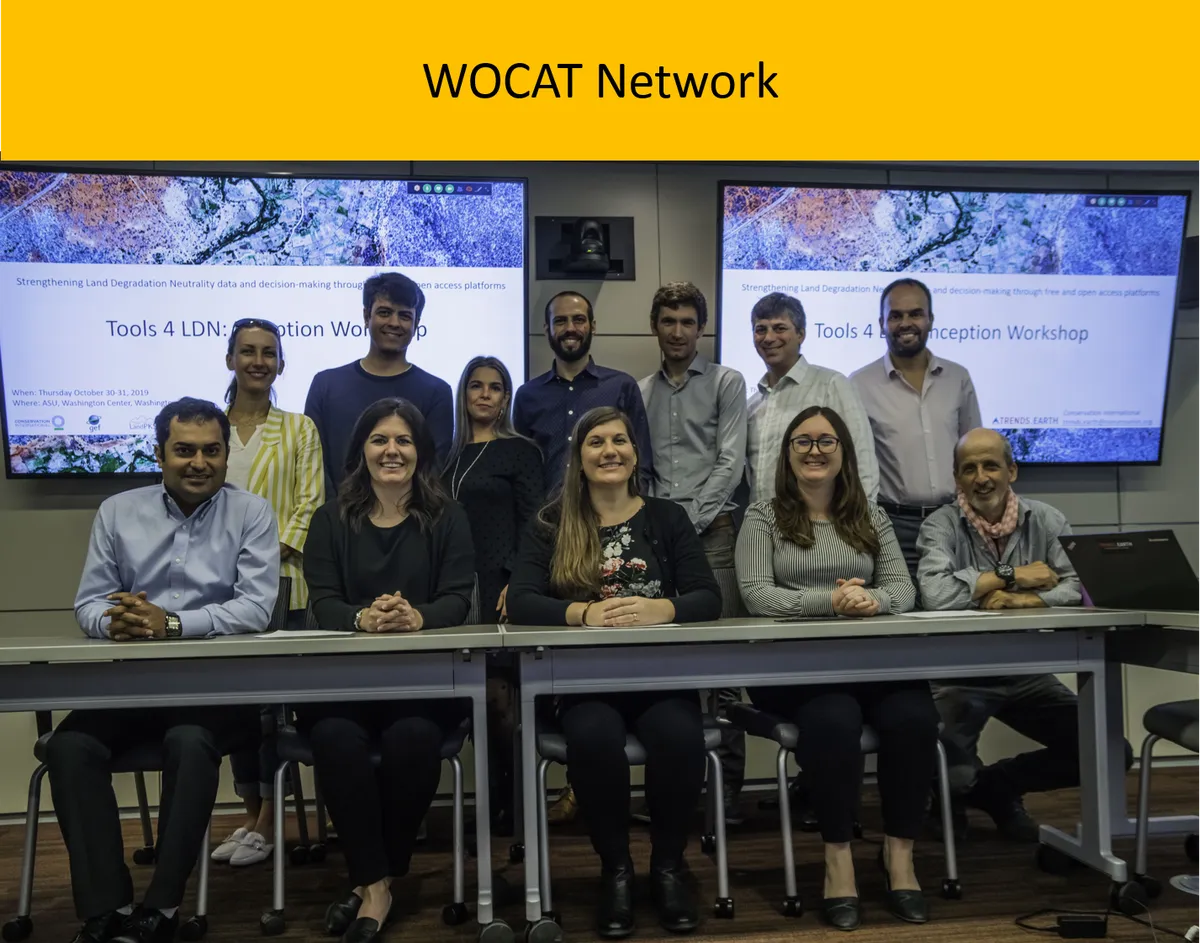
The inception workshop of the GEF-funded Project ‘Tools for Land Degradation Neutrality’ together with Conservation International - Global Environment Facility (CI-GEF), Conservation International - Moore Center for Science (CI-MSC), University of Bern/WOCAT, University of Colorado (Land PKS), and University of California - Santa Barbara, took place on 30-31 October 2019, at the Arizona State University Washington Center. The project will support countries in monitoring and reporting of the SDG15 on LDN.
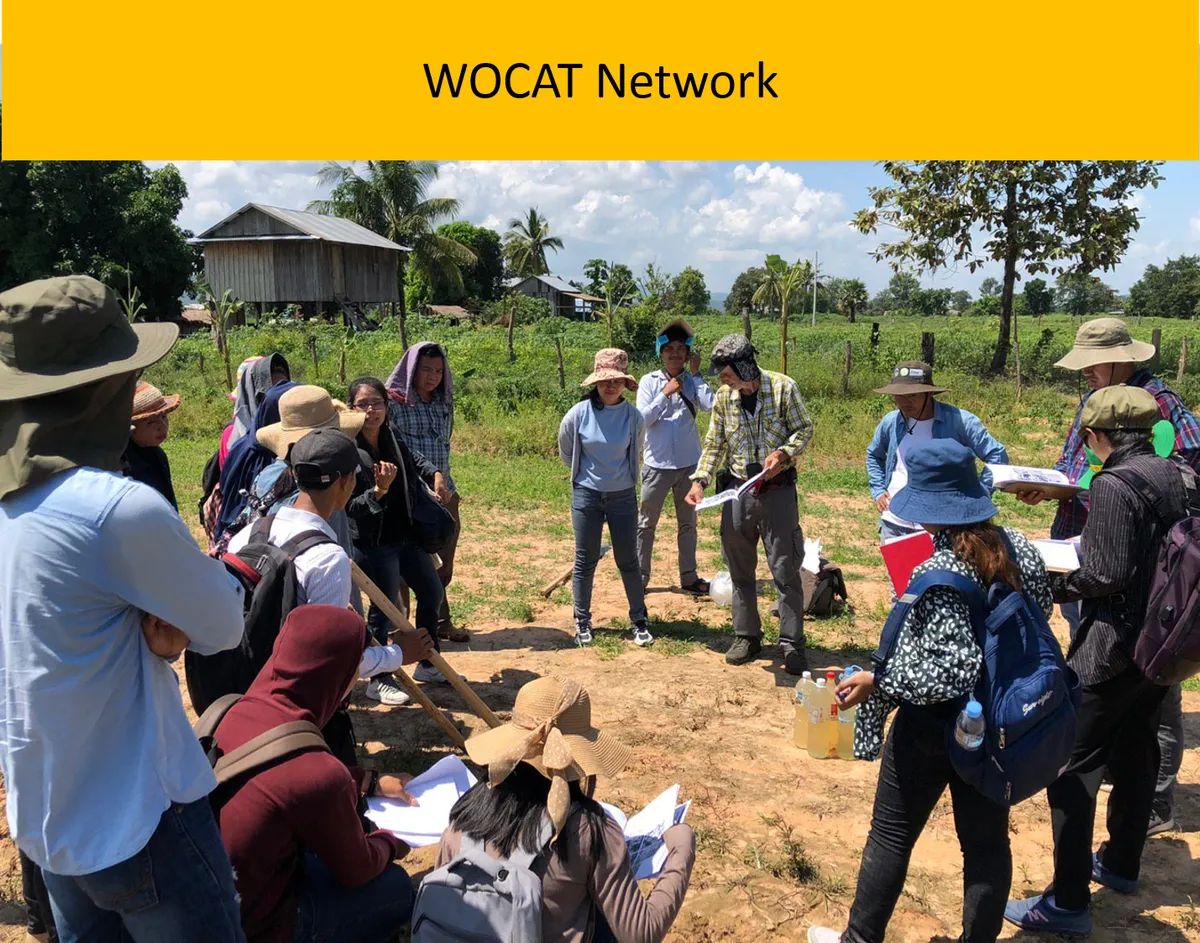
A training on 'monitoring and assessment of ecosystem services' with the WOCAT Director Hanspeter Liniger was held within the framework of the International Fund for Agricultural Development (IFAD) project 'Scaling up Climate Resilient Agriculture (SUCRA)' in Cambodia.
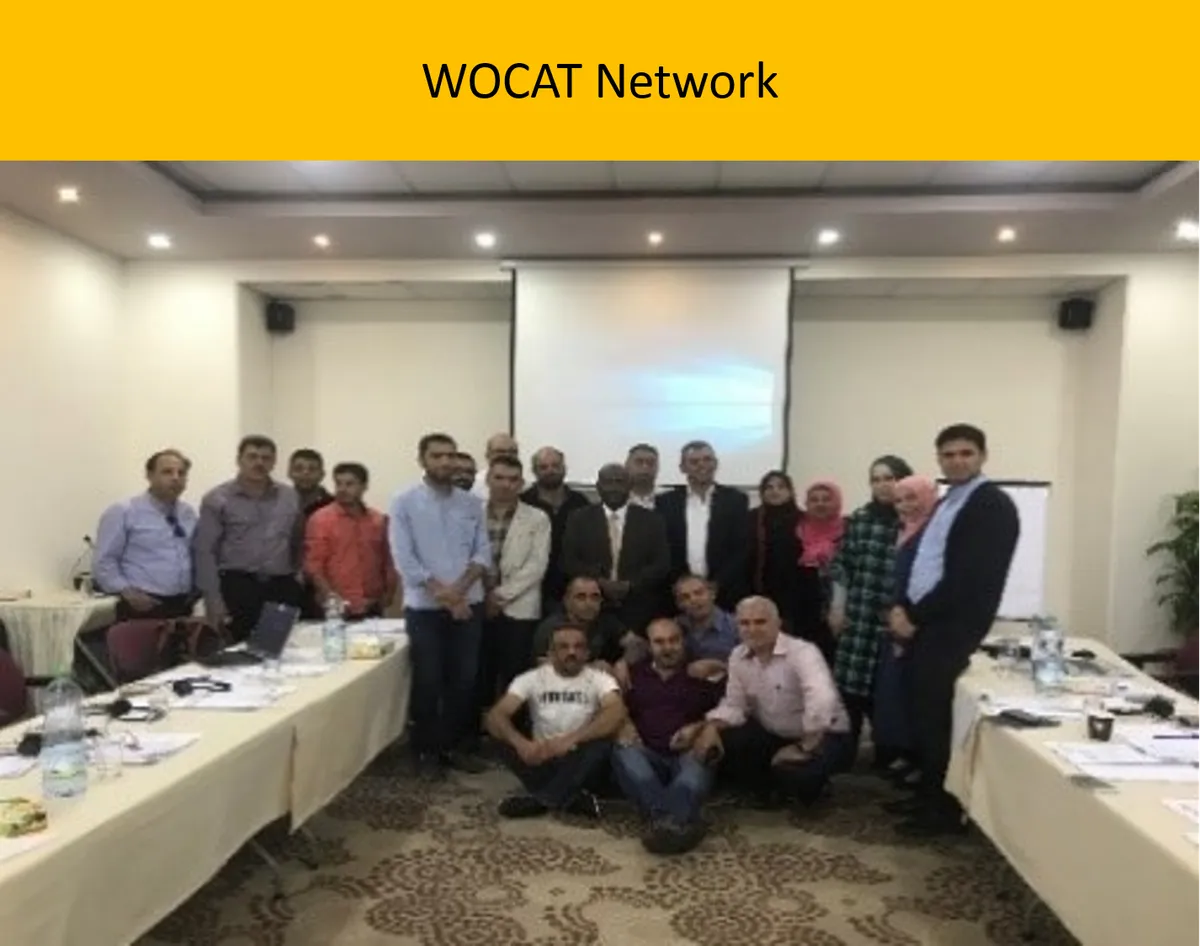
The training on the use of WOCAT tools on 7-10 October 2019 was attended by about 23 participants from various institutions, including experts in land, agriculture, forests, rangelands and soils. The purpose of the training was to equip participants with the knowledge of evaluation and documentation of land management practices, identifying good practices for wider scale implementation of SLM practices, making information and data available to planners and decision makers, and enhance the exchange of experiences and lessons among land users, researches and policy makers.
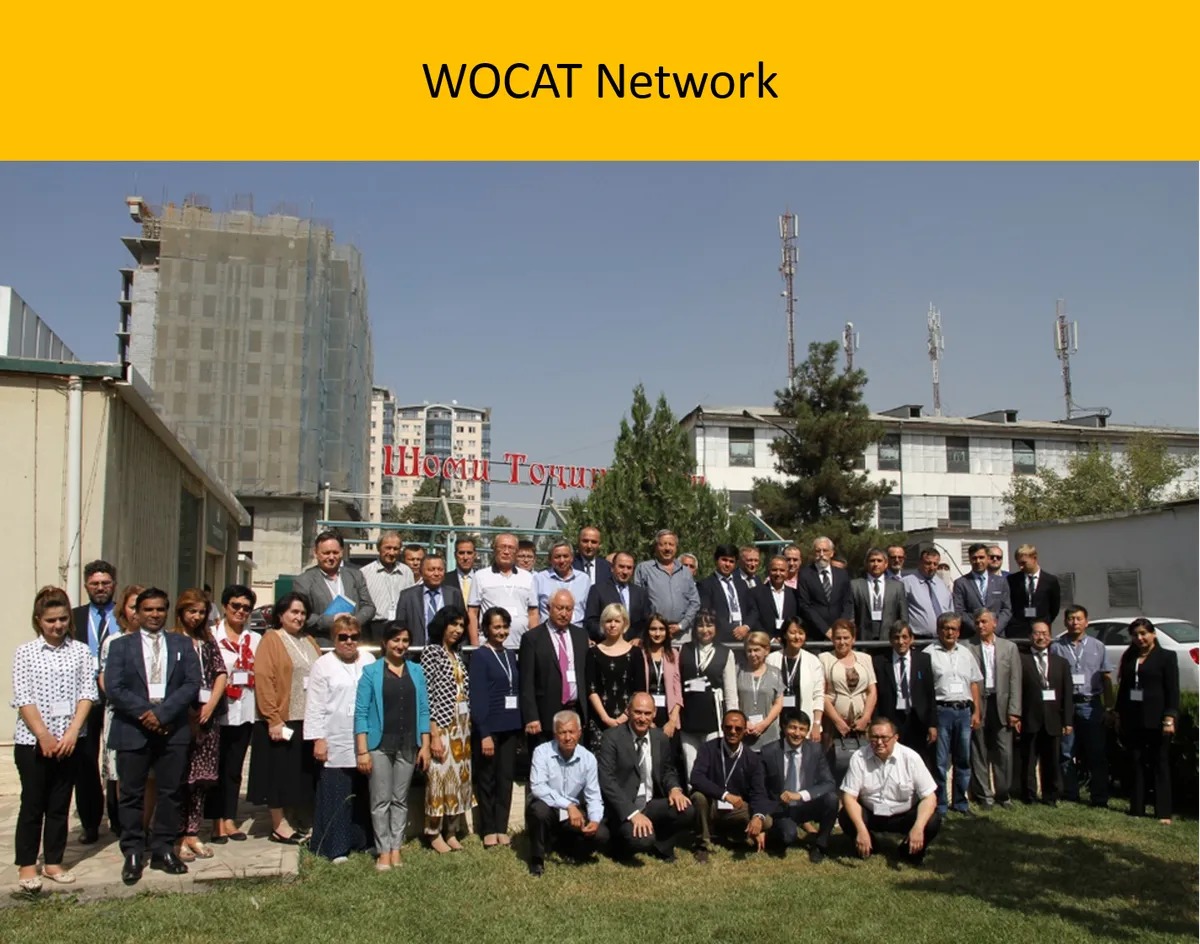
More than 60 delegates from five Central Asian countries gathered in Dushanbe, Tajikistan, on 27 September 2019 to discuss land degradation, climate change impacts and mitigation issues of the region. The event was a joint collaboration of the International Centre for Agricultural Research in the dry Areas (ICARDA) and the Climate Adaptation and Mitigation Program for Aral Sea Basin (CAMP4ASB), led by the Regional Environmental Centre for Central Asia (CAREC). WOCAT presented its engagement in evidence-based decision support for SLM and emphasized what it can offer to the ‘Central Asia Climate Information Platform’ (CACIP).
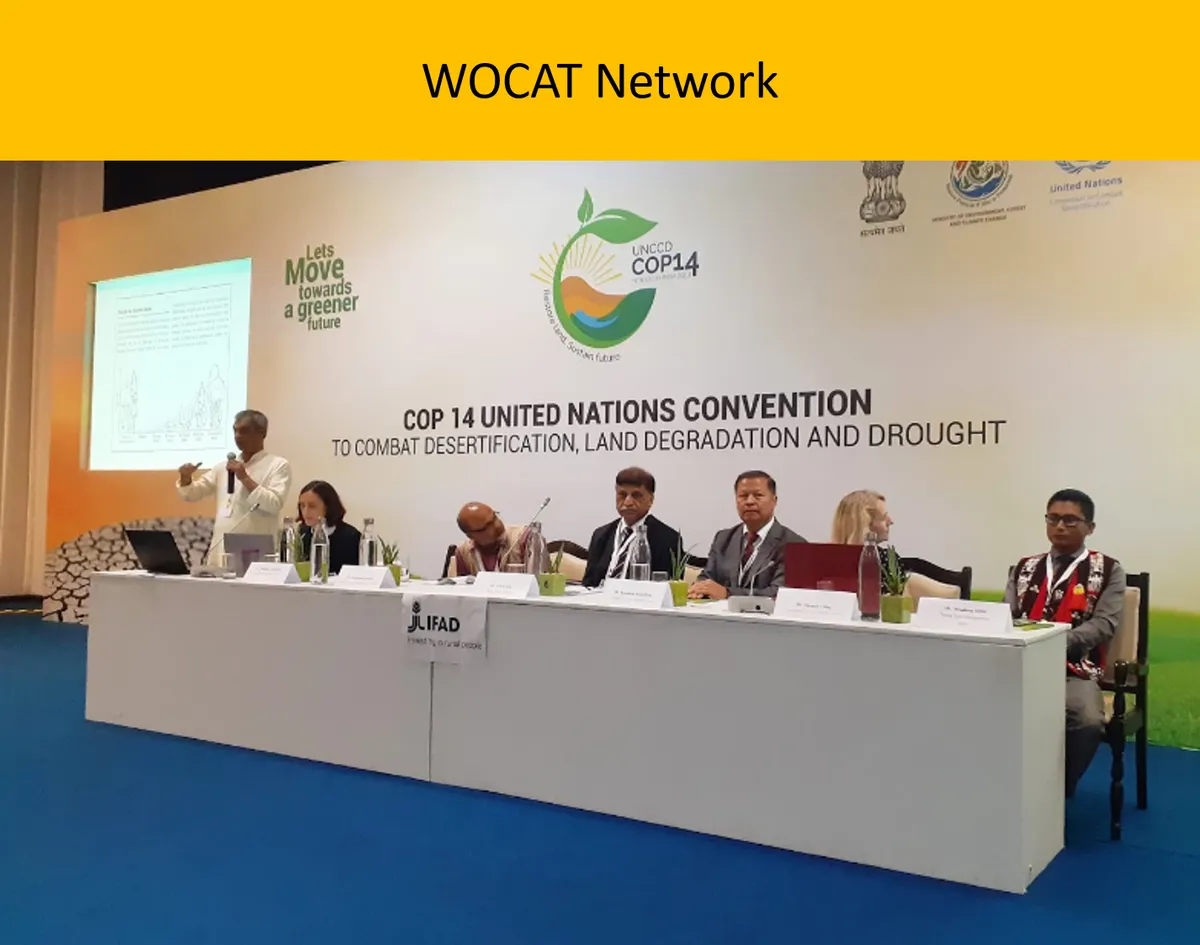
The side event focused on Transitions of shifting cultivation in South and South-East Asia - Challenges and opportunities to achieve land degradation neutrality (LDN). Policy-makers, development practitioners and farmers shared their views on how shifting cultivation can contribute to LDN and agreed on the need to establish a community of practise on the topic.
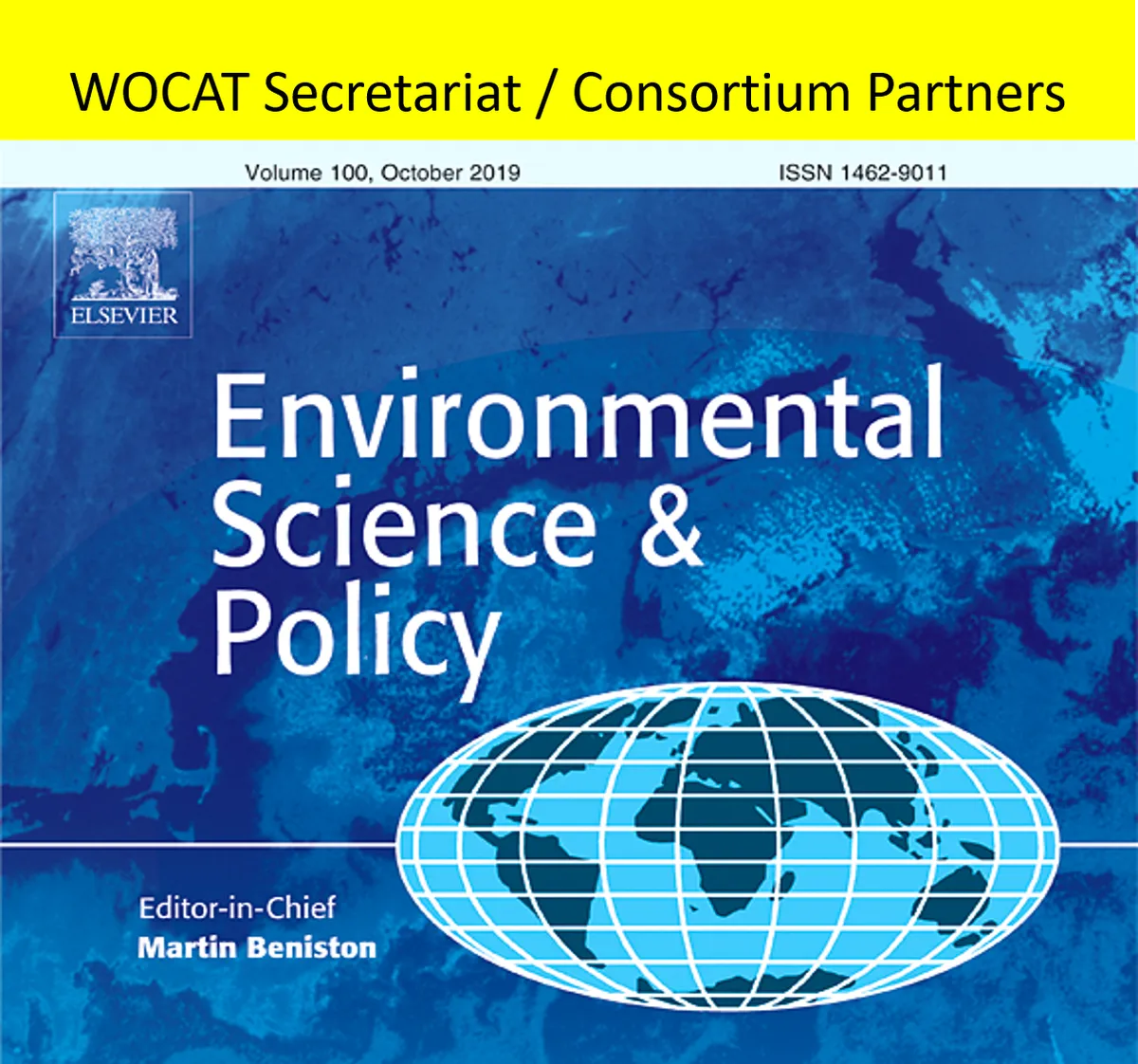
In joint collaboration with Conservation International, CONICET, Both ENDS, ISRIC, Sustainable Land Management Associates, CIAP and FAO, WOCAT has contributed to four different papers on Land Degradation Neutrality.The papers highlight the relevance of SLM for achieving LDN, the use of standardized global methods and tools and using their synergies for assessing and monitoring LDN, and the enabling conditions and environment to further the implementation of LDN.
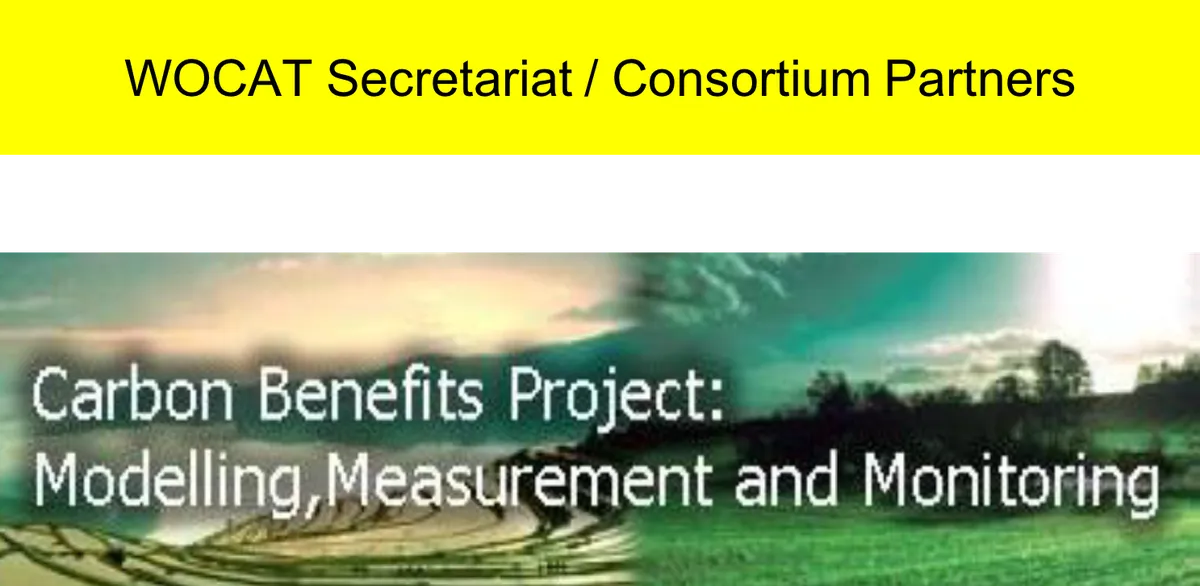
https://www.wocat.net/en/projects-and-countries/projects/sustainable-land-management-and-climate-change-mitigation-co-benefits-slm-ccmc
The Carbon Benefit Project will carry out a range of enhancements to the CBP tools including enhancing mapping tools, developing a database of country specific factors, and linking to carbon markets. It will also link the CBP tools to WOCAT and LandPKS, to develop a fully comprehensive set of tools for SLM managers.
https://www.wocat.net/en/projects-and-countries/projects/sustainable-land-management-and-climate-change-mitigation-co-benefits-slm-ccmc
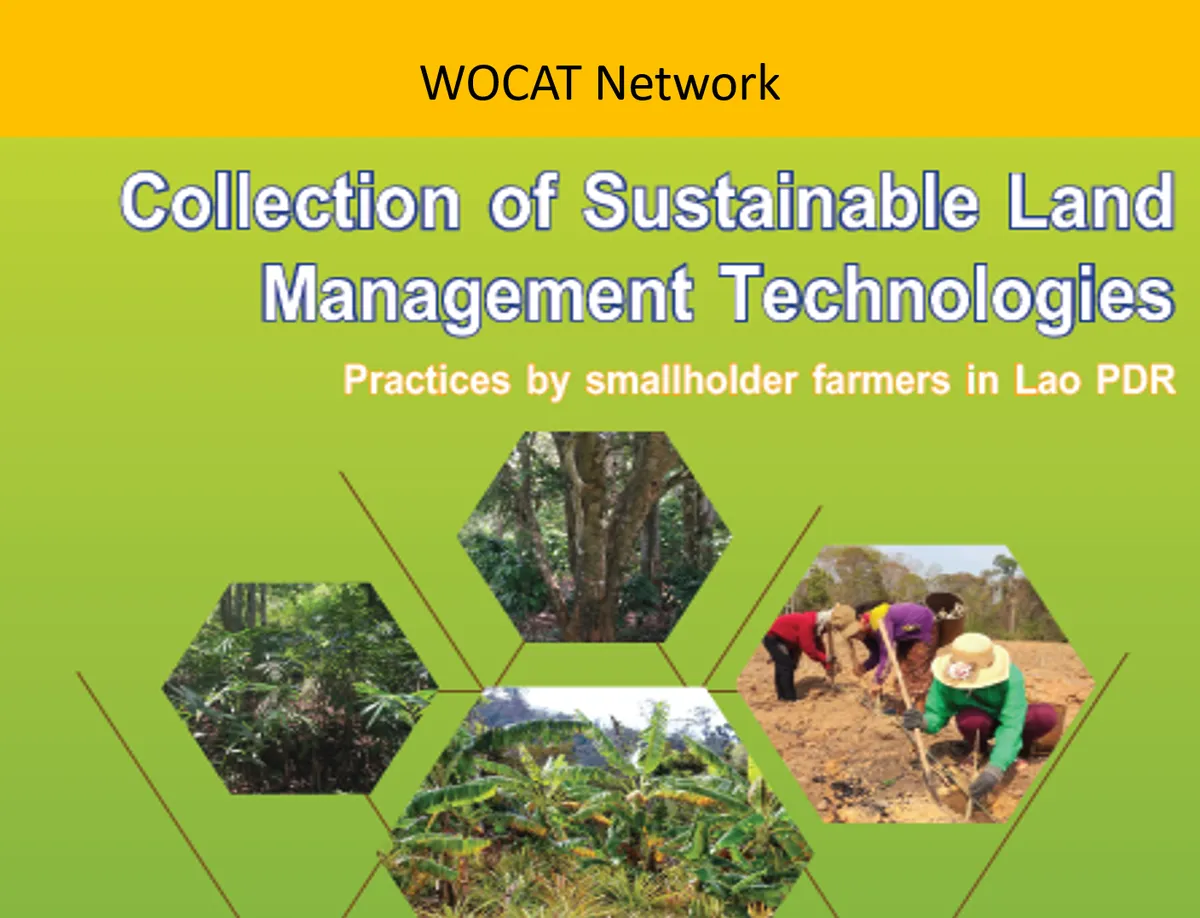
The new SLM collection created by NAFRI in Lao available both in Lao and English language serves as a tool for technical staff, extension workers, project implementers, SLM planners, famers and policy makers. It includes the mots relevant information on different SLM practices including details on their implementation, costs, ecological and socio-economic benefi ts and disadvantages. The collection of information and data on SLM Technologies serves evidence-based decision-making in SLM.
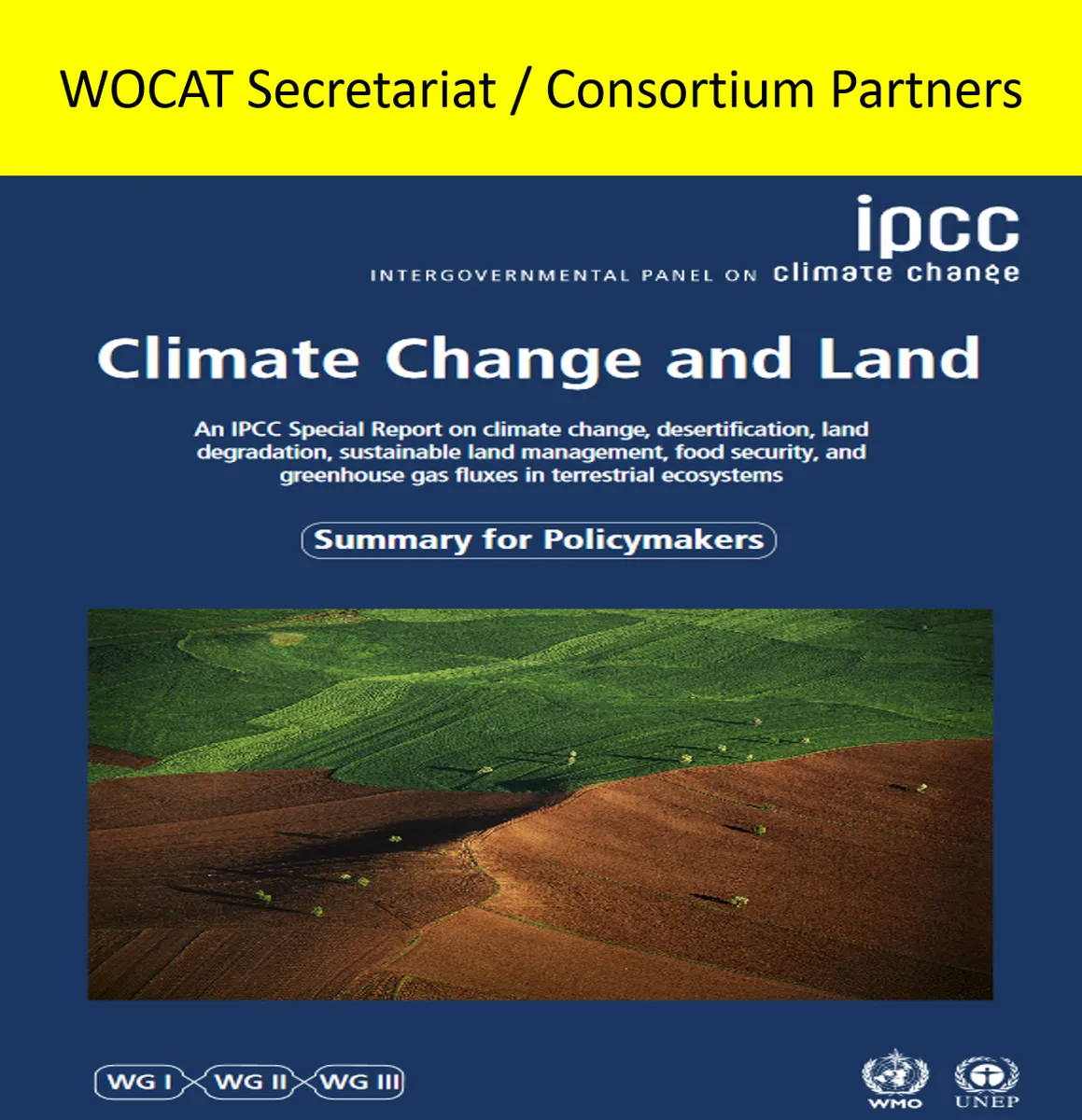
The new IPCC special report on Climate Change and Land https://www.ipcc.ch/report/srccl/ shows how managing land resources sustainably can help address climate change. The report also mentions WOCAT, for example in chapter 4 it refers to WOCAT's contribution to map land degradation and to the global SLM database https://qcat.wocat.net/en/wocat/
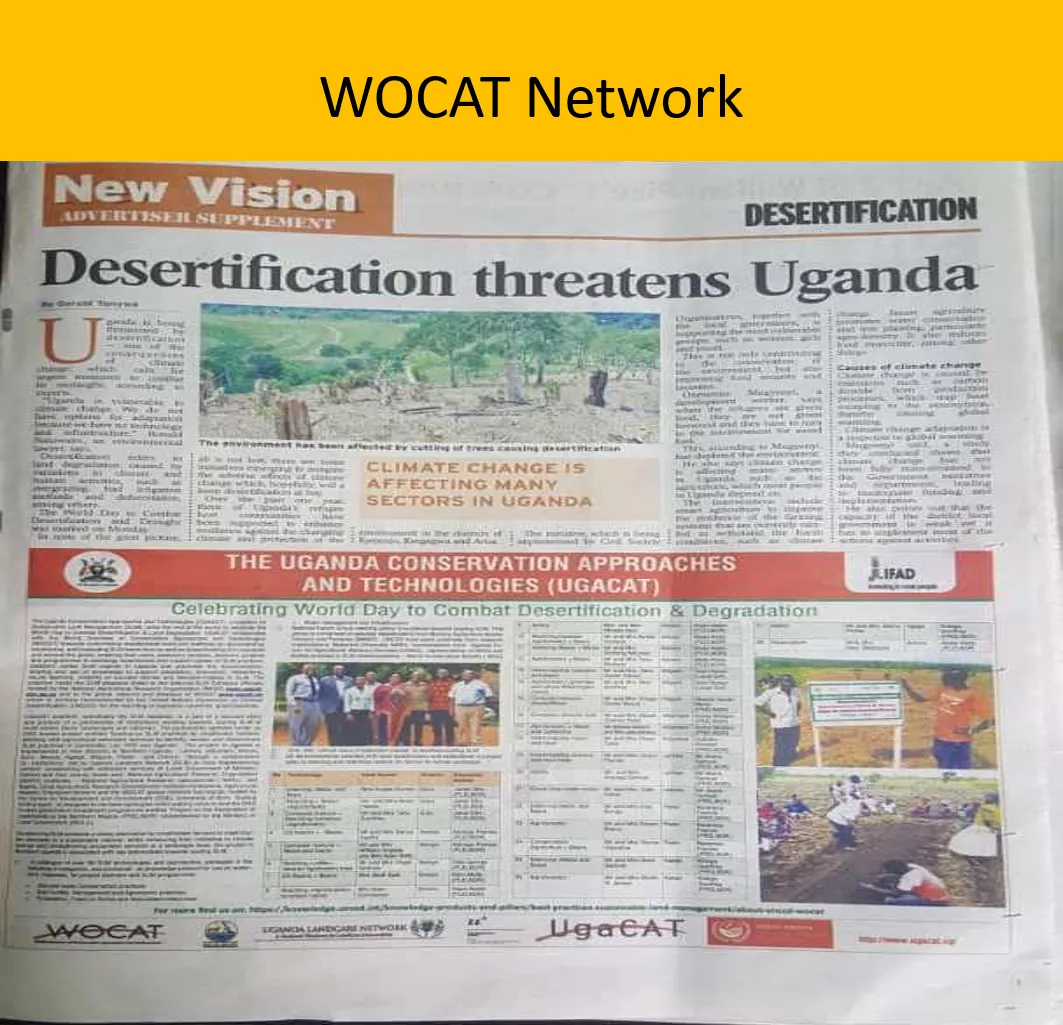
UGACAT is part of a success story and product of a partnership of institutions working towards scaling SLM at multi scales (farm, landscapes and national) under IFAD funding.
UGACAT as a coalition hosts the SLM database linked to the National SLM Database officially hosted by the National Agricultural Research Organization (NARO) www.ugacat.slm.go.ug and to the global network and database of WOCAT.
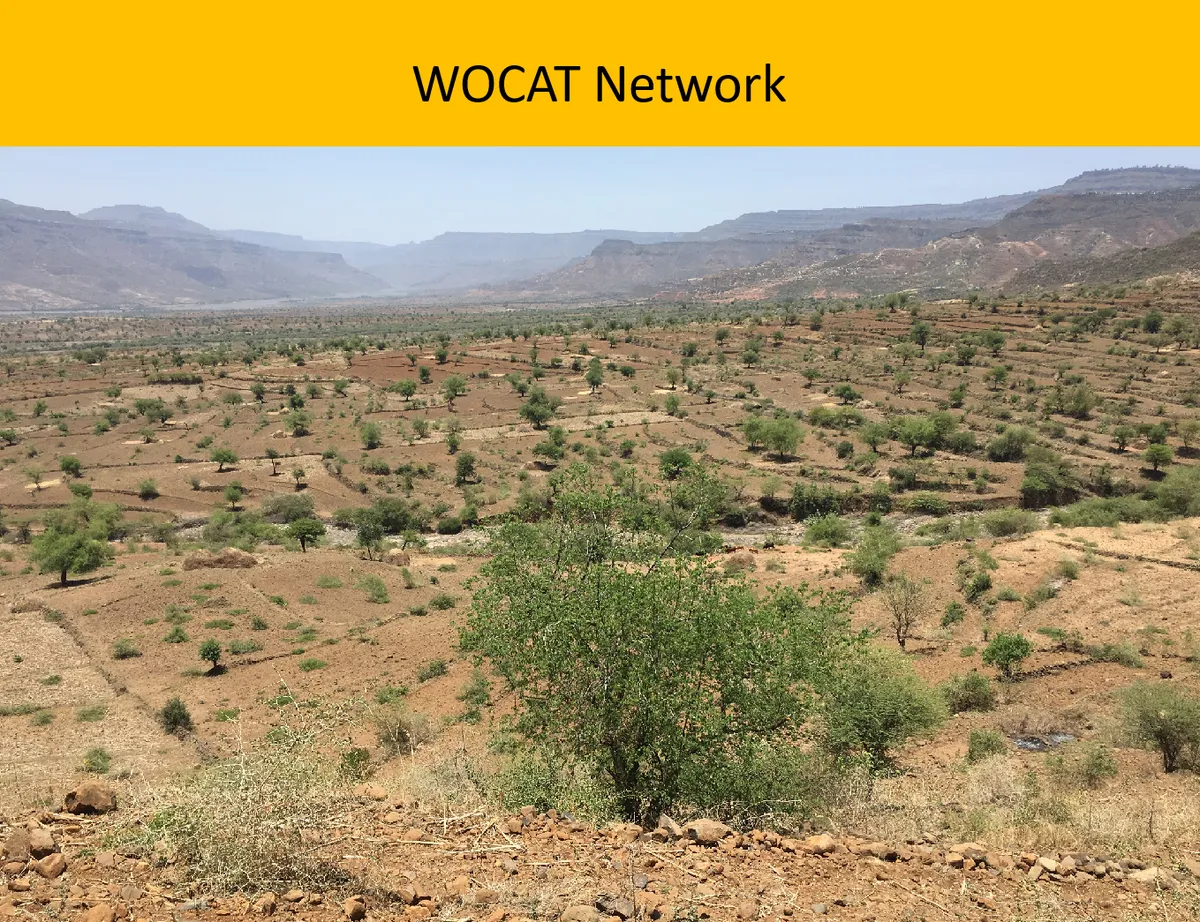
Striving for a land degradation neutral world requires the active participation of all relevant stakeholders and groups including youth and women as well as the private sector. WOCAT wishes you a happy World Day to Combat Desertification and Drought 2019! Take action and spread the word about SLM and its impacts to support relevant stakeholders to adopt and promote good land use practices around the world!
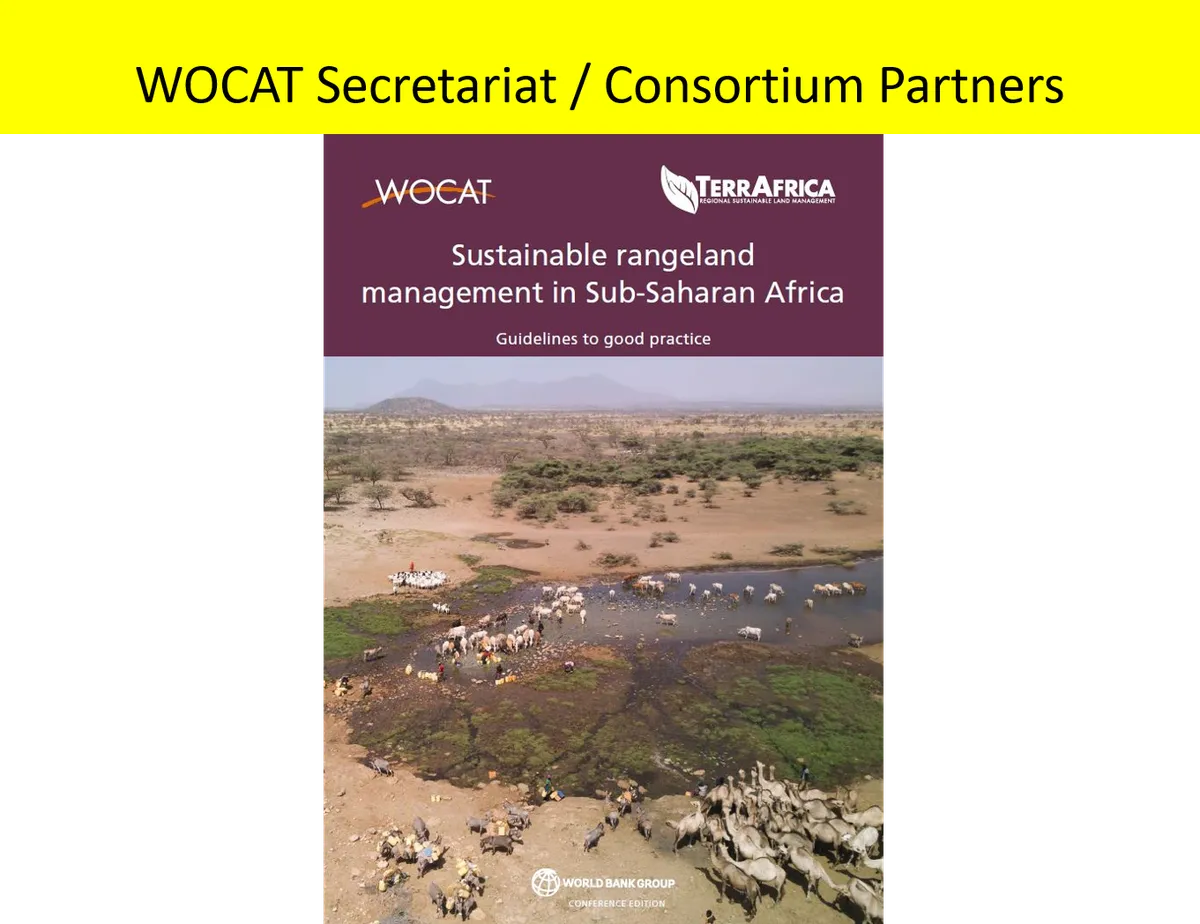
In Sub-Saharan Africa, the popular perception of rangelands and their management is that these vast areas have major problems without solutions: the common narrative focuses on overgrazing, herds of undernourished livestock, erosion and desertification, drought, famine, and conflict. However, evidence compiled and analysed in this book show that such a view of rangelands – as being unproductive and mismanaged systems – does not reflect reality. It needs reconsideration and revision. The overall goal of the guidelines is to demonstrate – through a unique set of convincing case studies and their analysis as well as the development of guiding principles – the value and potential of investment in rangelands.
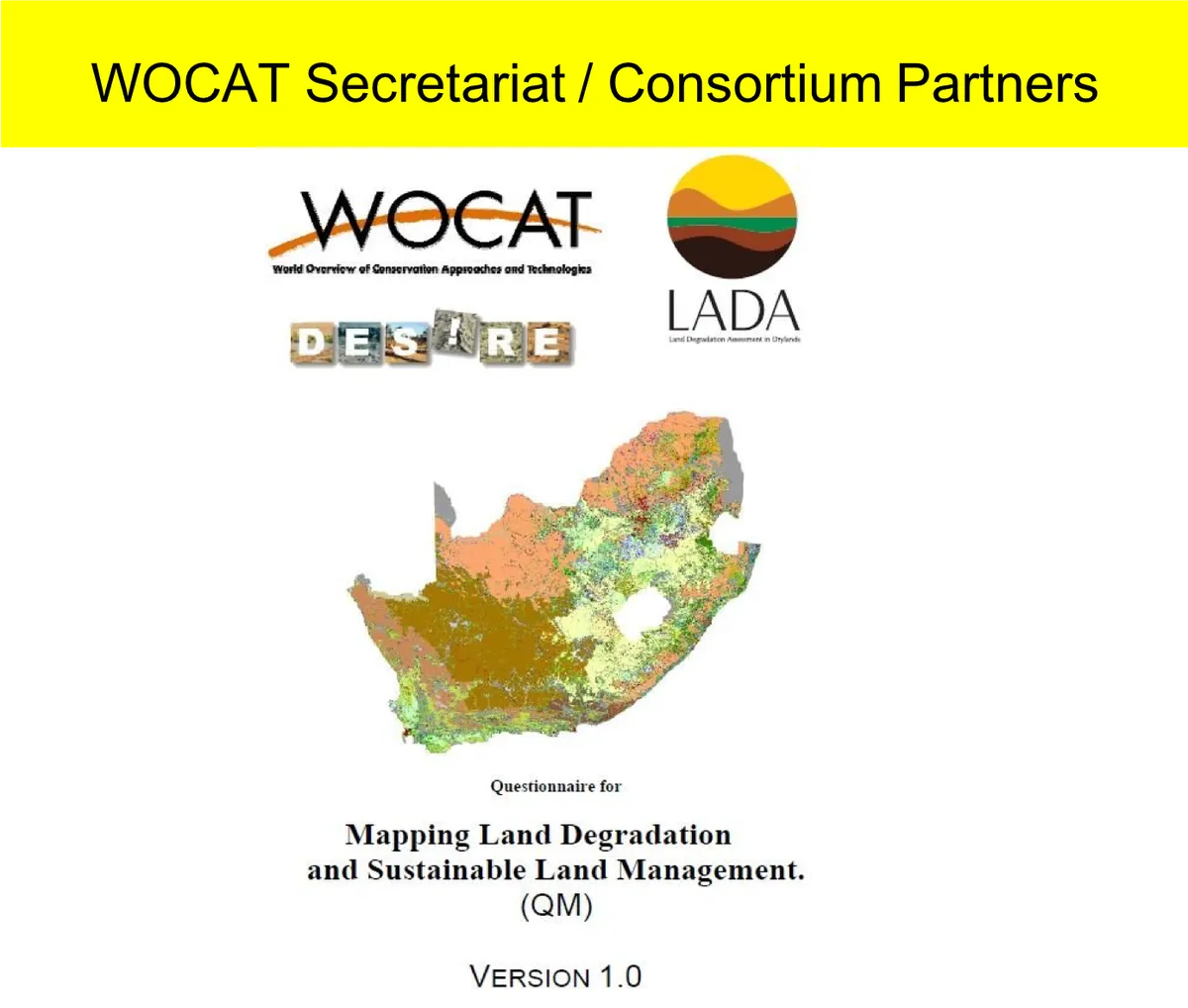
The mapping database by WOCAT is now offline. All datasets documented in the old WOCAT dabase, the instructions for mapping and a selecetion of maps can be found in the media library.
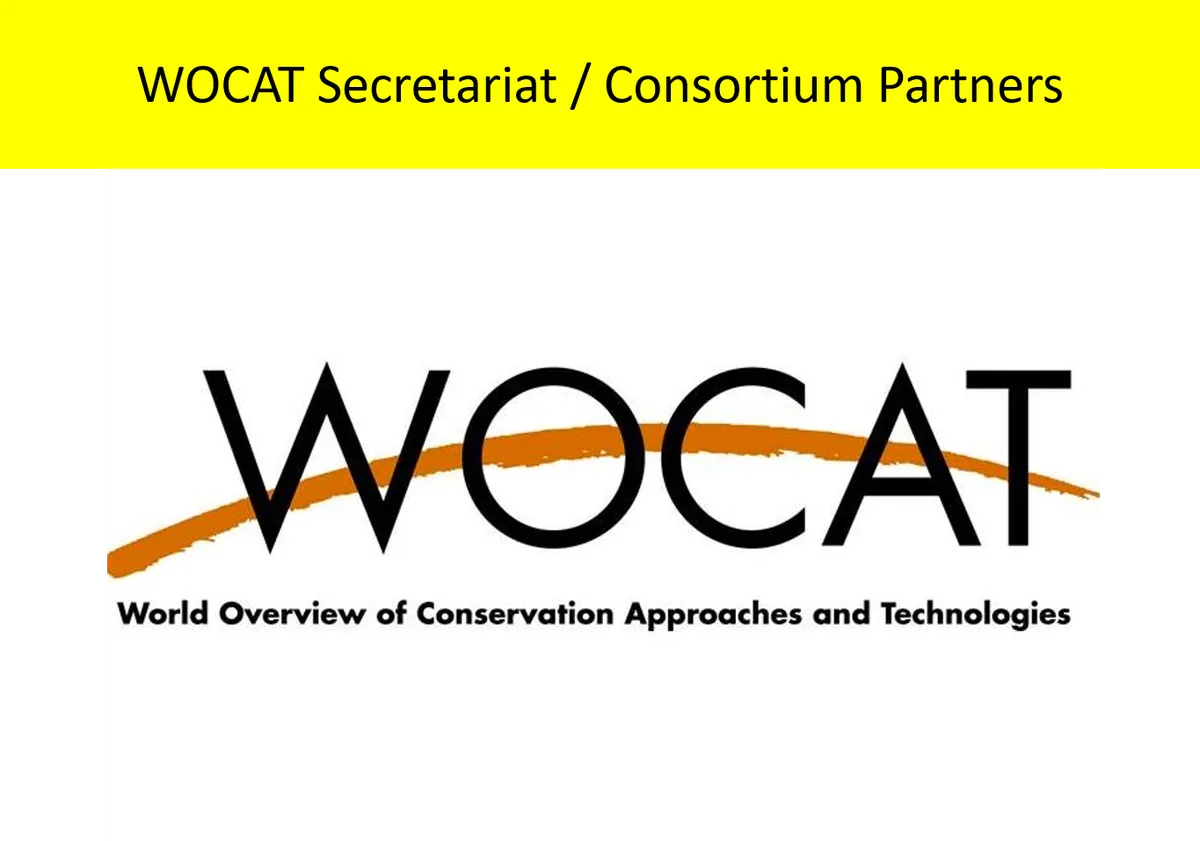
The WOCAT program is currently undergoing an external evaluation with the objective to assess the effectiveness and achieved impacts of WOCAT. For this, a survey is sent to various WOCAT partners and users. We hope that many of you can participate in the survey and provide their views and feedback on WOCAT.
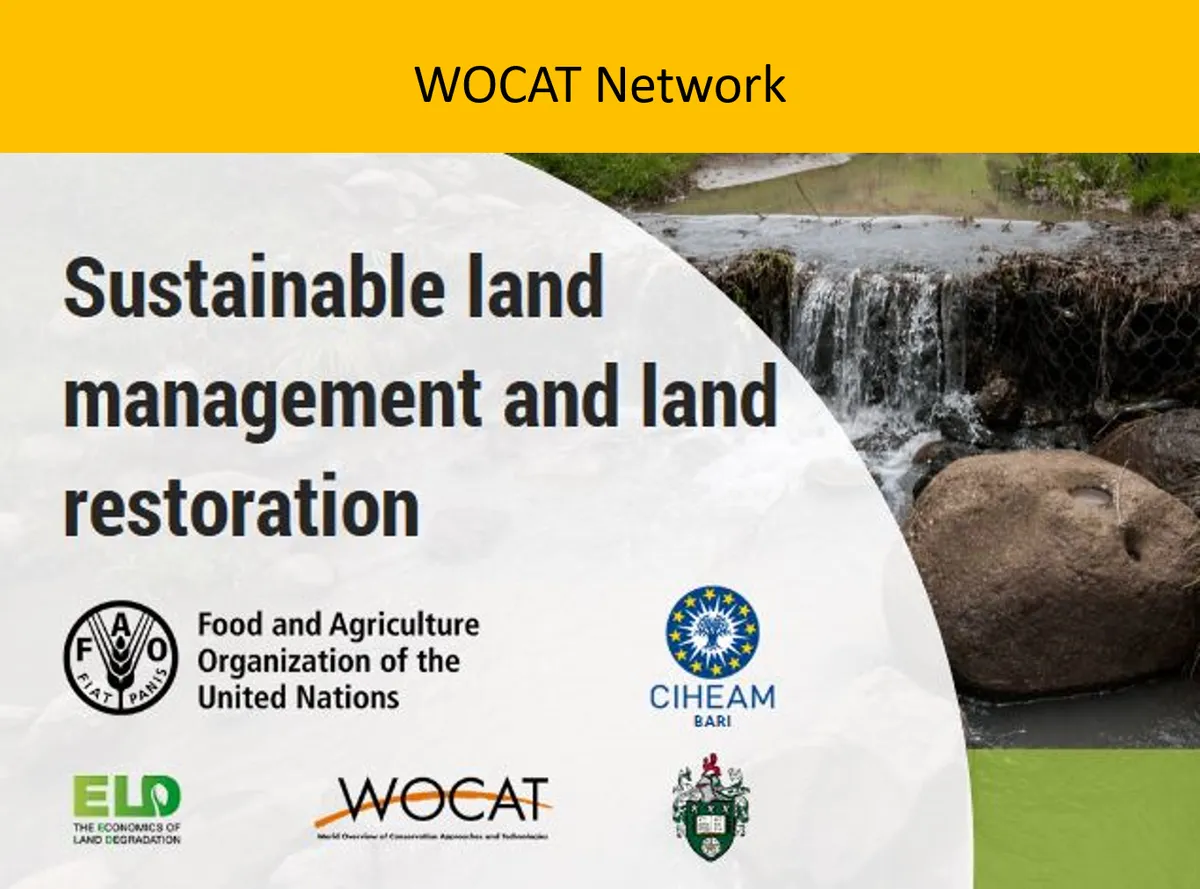
The E-learning course on “Sustainable Land Management and Land Restoration" developed by FAO in collaboration with CIHEAM, The Economics of Land Degradation (ELD) Initiative, University of Leeds and WOCAT, is now available online.
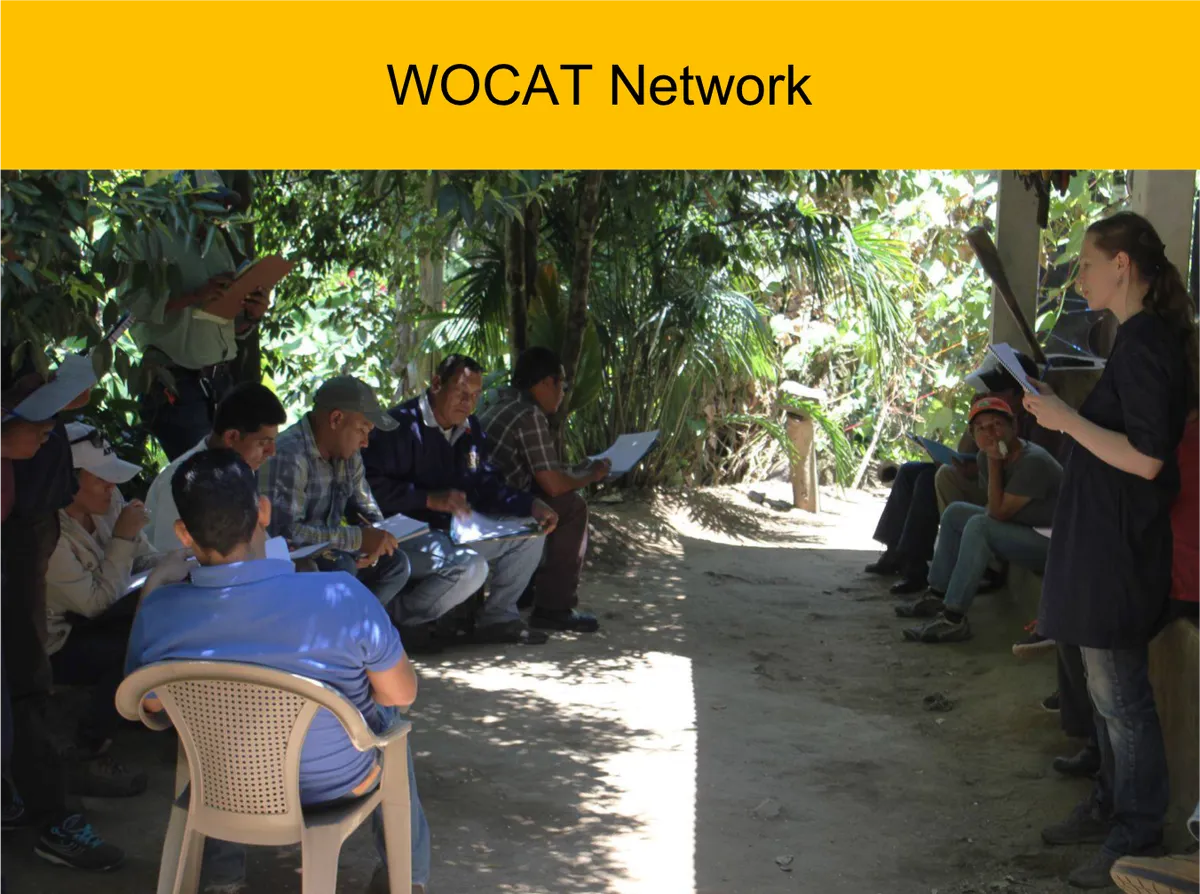
CDE researcher Johanna Jacobi has provided a WOCAT training to local stakeholders on good land management in Dipilto, Nicaragua, in cooperation with GOPA and SDC Nicaragua.
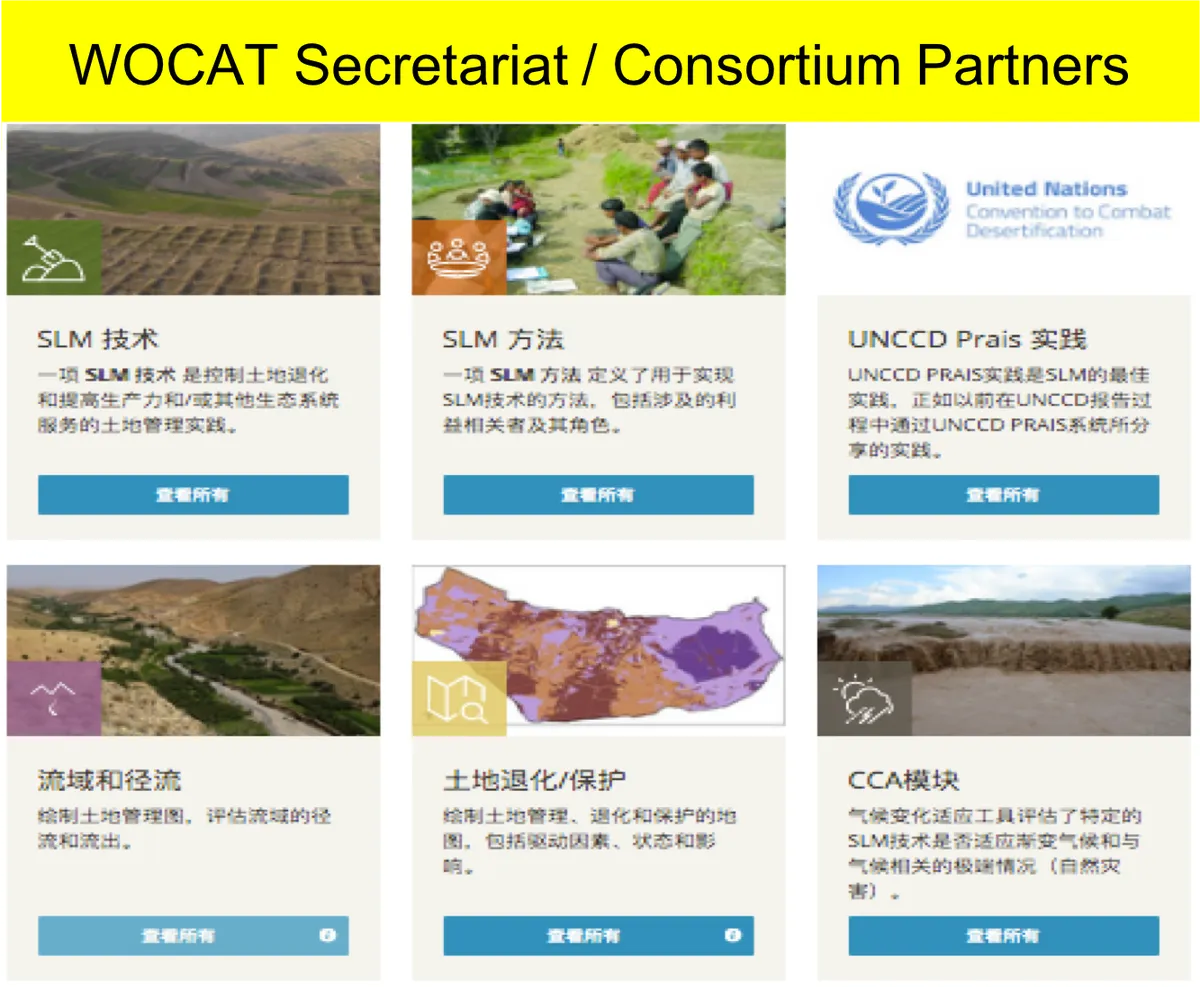
The Global SLM Database is now available in Chinese and Thai. Our thanks for the Chinese translation go to Mr. Sun Guoji, Director General of Department of Combating Desertification, National Forestry and Grassland Administration; and for the Thai translation to Dr. Bunjirtluk Jintaridth and Mr. Kamchai Kanjanatanaseth, Land Development Department (LDD), Ministry of Agriculture and Cooperatives, Thailand; Dr. Pitayakon Limtong, Soil and Fertilizer Society of Thailand.
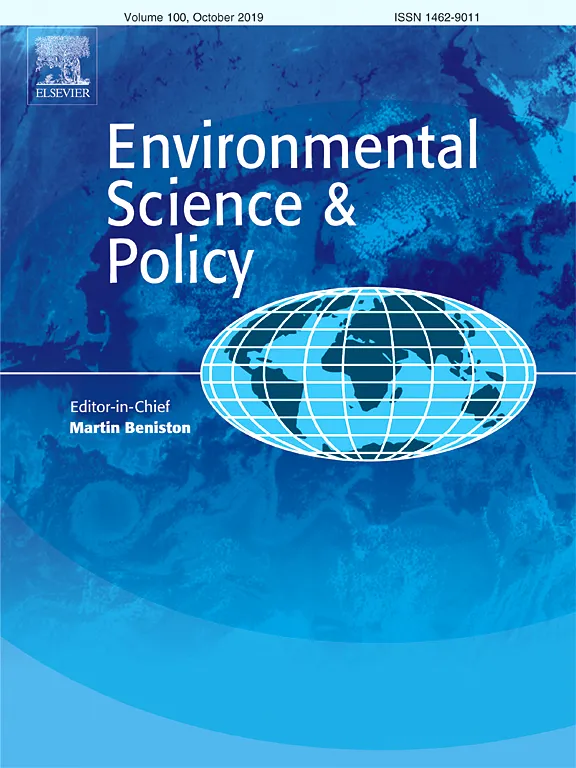
In joint collaboration with Conservation International, CONICET, Both ENDS, ISRIC, Sustainable Land Management Associates, CIAP and FAO, WOCAT has contributed to four different papers on Land Degradation Neutrality.The papers highlight the relevance of SLM for achieving LDN, the use of standardized global methods and tools and using their synergies for assessing and monitoring LDN, and the enabling conditions and environment to further the implementation of LDN.
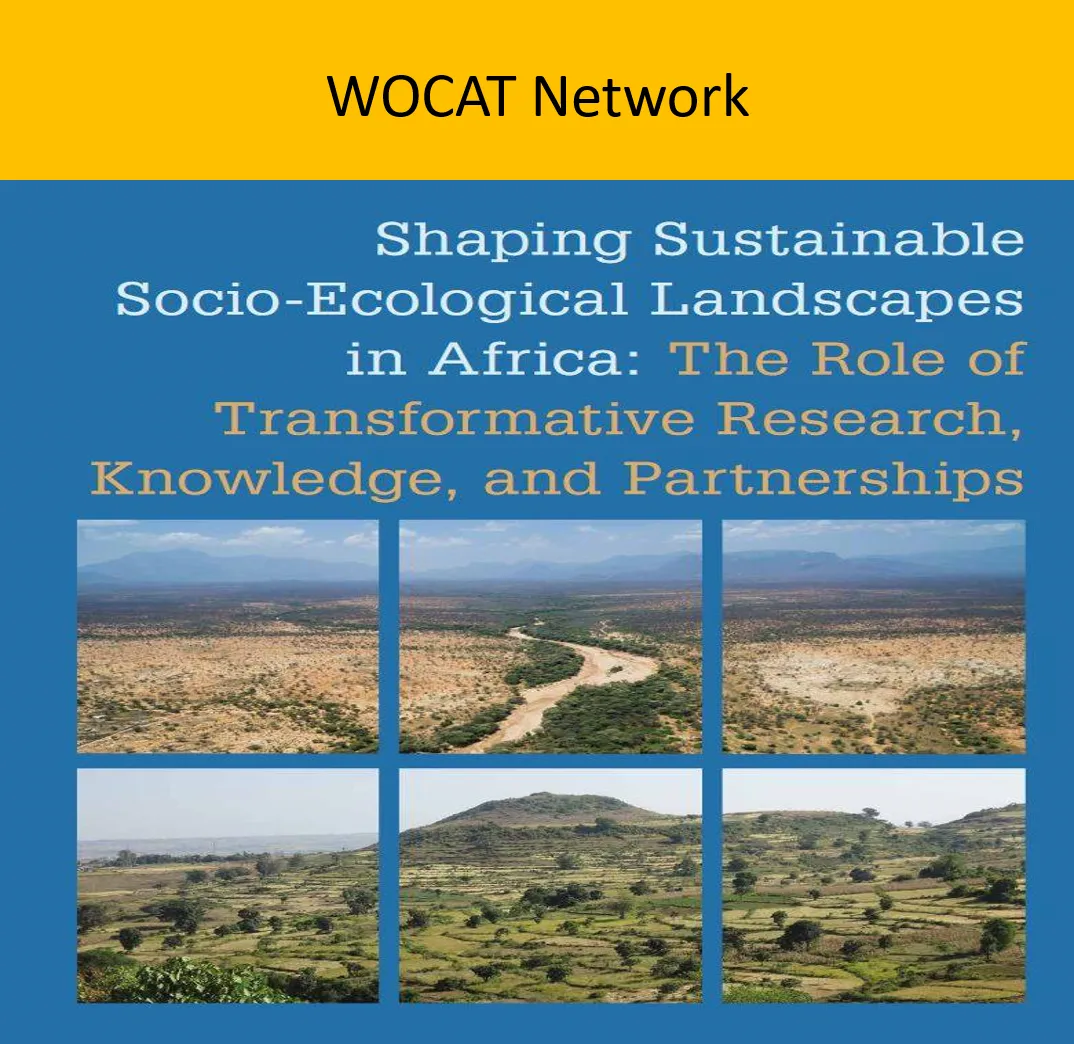
Traditional systems of land and water use in Africa are increasingly under pressure. In the “Water and Land Resource Centre” project, scientists from CDE, CETRAD Kenya, and WLRC Ethiopia worked with land users and decision-makers in Kenya and Ethiopia to develop locally adapted solutions for managing water and land sustainably and resolving conflicts. Now they have summarized experiences and highlights from 40 years of transformative research in the book “Shaping Sustainable Socio-Ecological Landscapes in Africa”.
http://ow.ly/YLqN30nX3SO
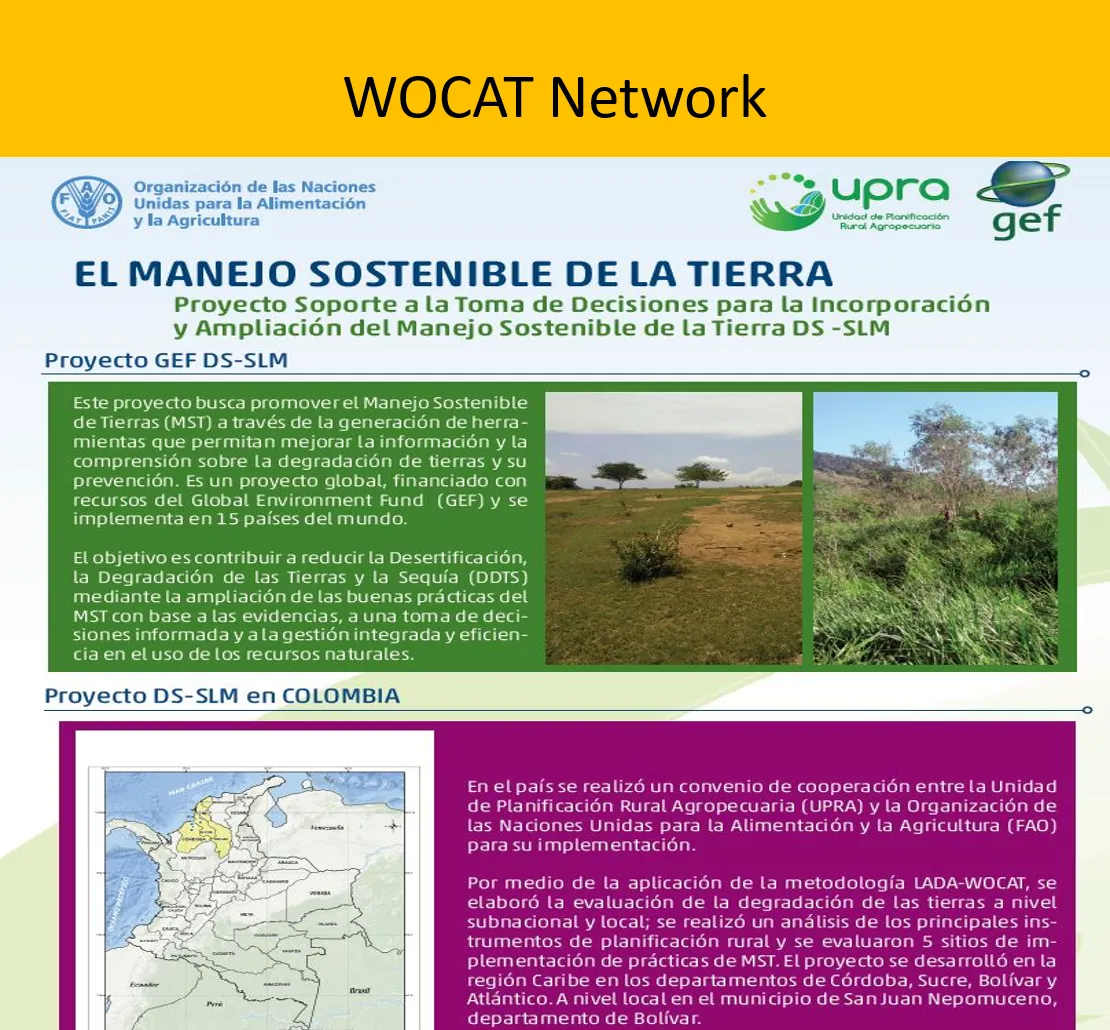
Short publication from FAO Colombia and UPRA with the key results of the DS-SLM project in Colombia.
Breve publicación de FAO Colombia y UPRA con los principales resultados del proyecto DS-SLM en Colombia
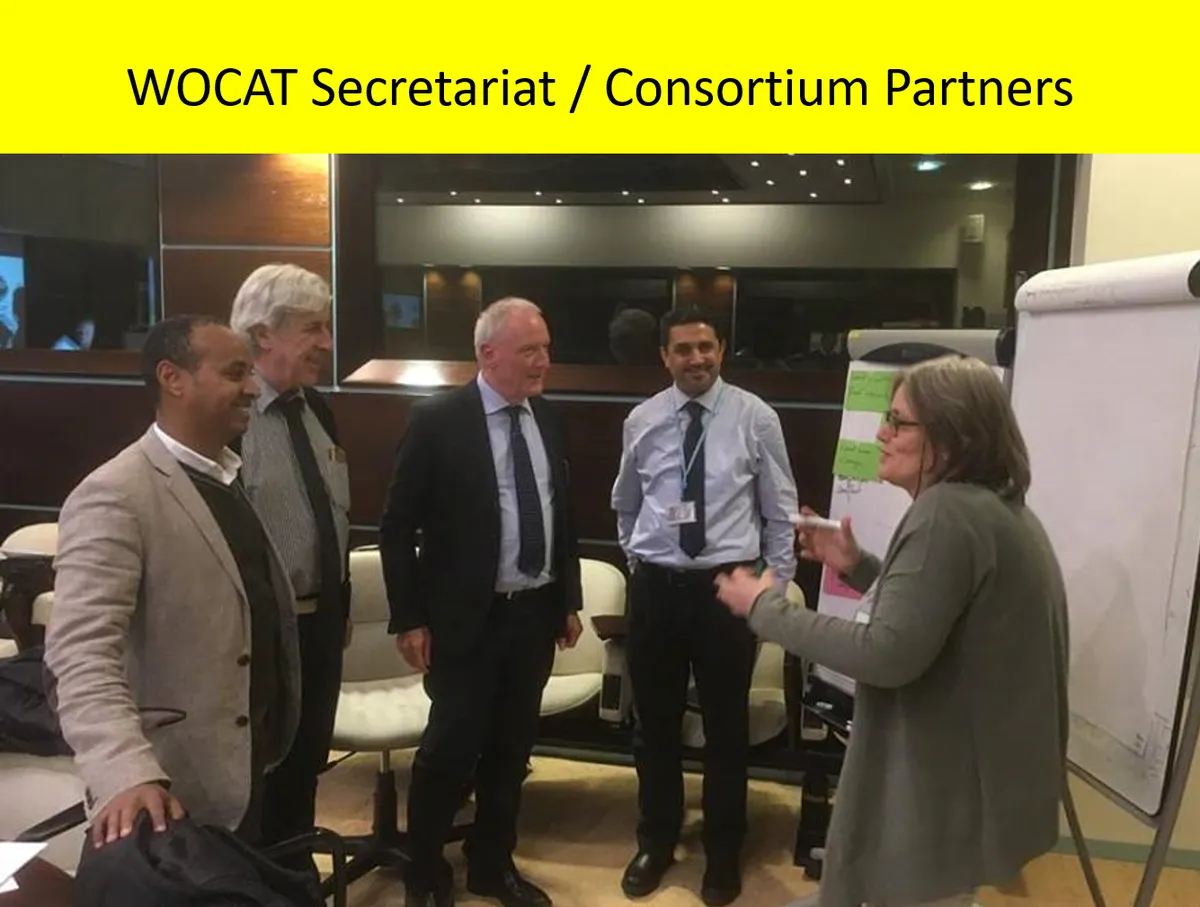
Meeting at FAO in Rome for the development of a mediterranean project on regional actions to combat land degradation with the participation of DS-SLM countries Turkey, BiH, Morocco, Tunisia, the Spanish MoA forestry department, Italian Cooperation, CIHEAM, Secretariat of Silva Mediterranea, Arab Land Initiative, and different FAO divisions: Land and Water, GEF Dryland Initiative, subregional office North Africa, Land Tenure experts, Investment center, Sustainable Agriculture Programme and WOCAT.
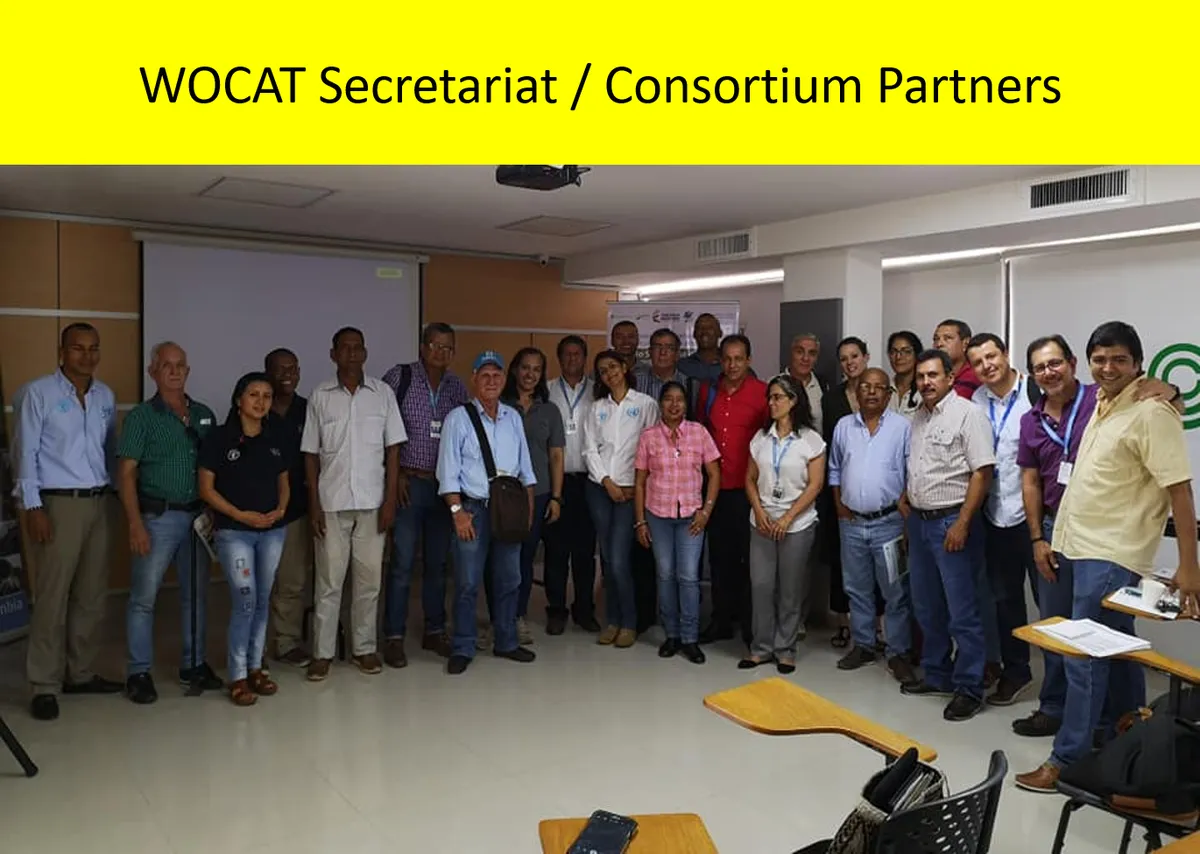
A national event in Bogota with participation of key stakeholders including Ministry of Agriculture, Ministry of Environment, GEF focal point, UNCCD CST and academia and a regional event with local authorities and organizations closed the DS-SLM project in Colombia.
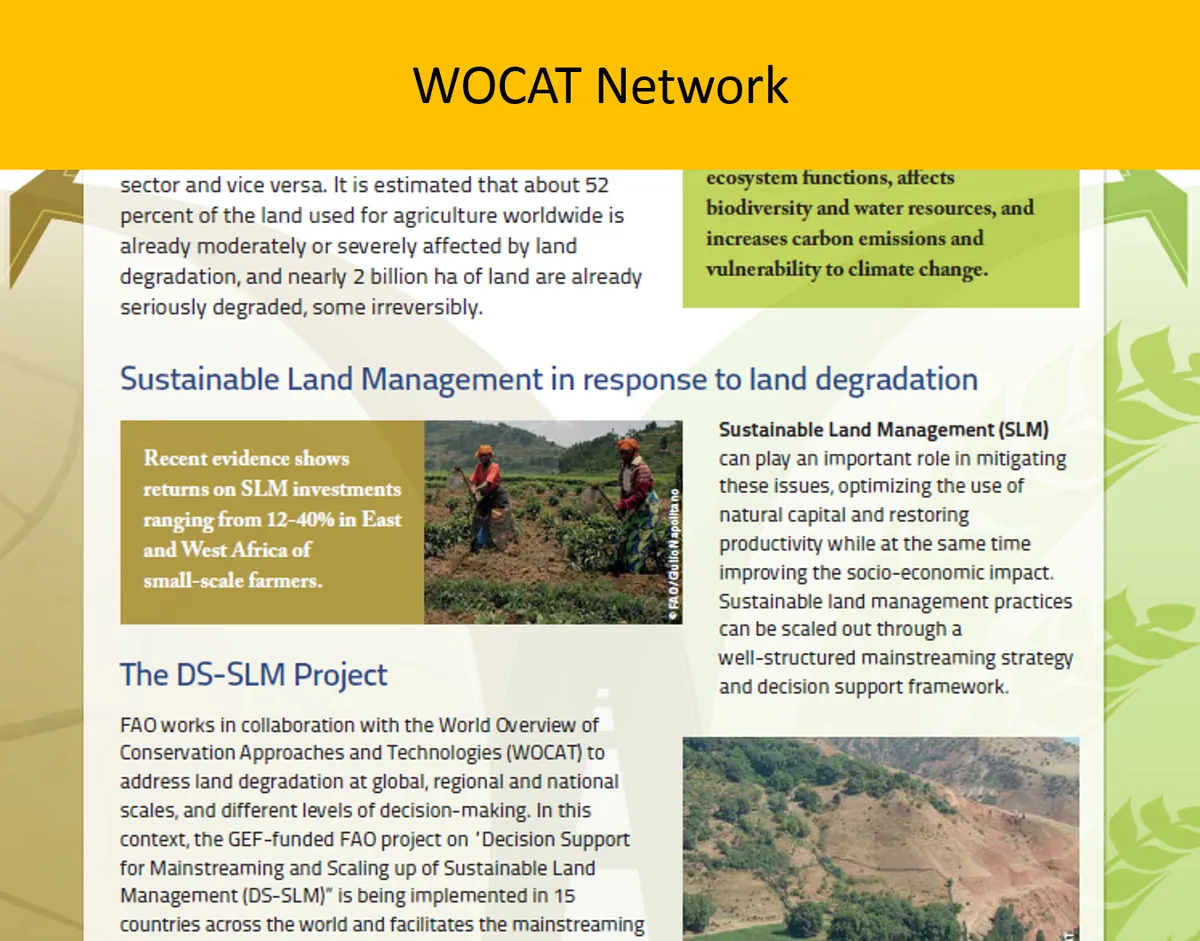
Get a quick overview of the 'Decision Support for Mainstreaming and Scaling up SLM' project, implemented by FAO in collaboration with WOCAT, by having a look at the newly developed factsheet https://www.wocat.net/library/media/158/
2018
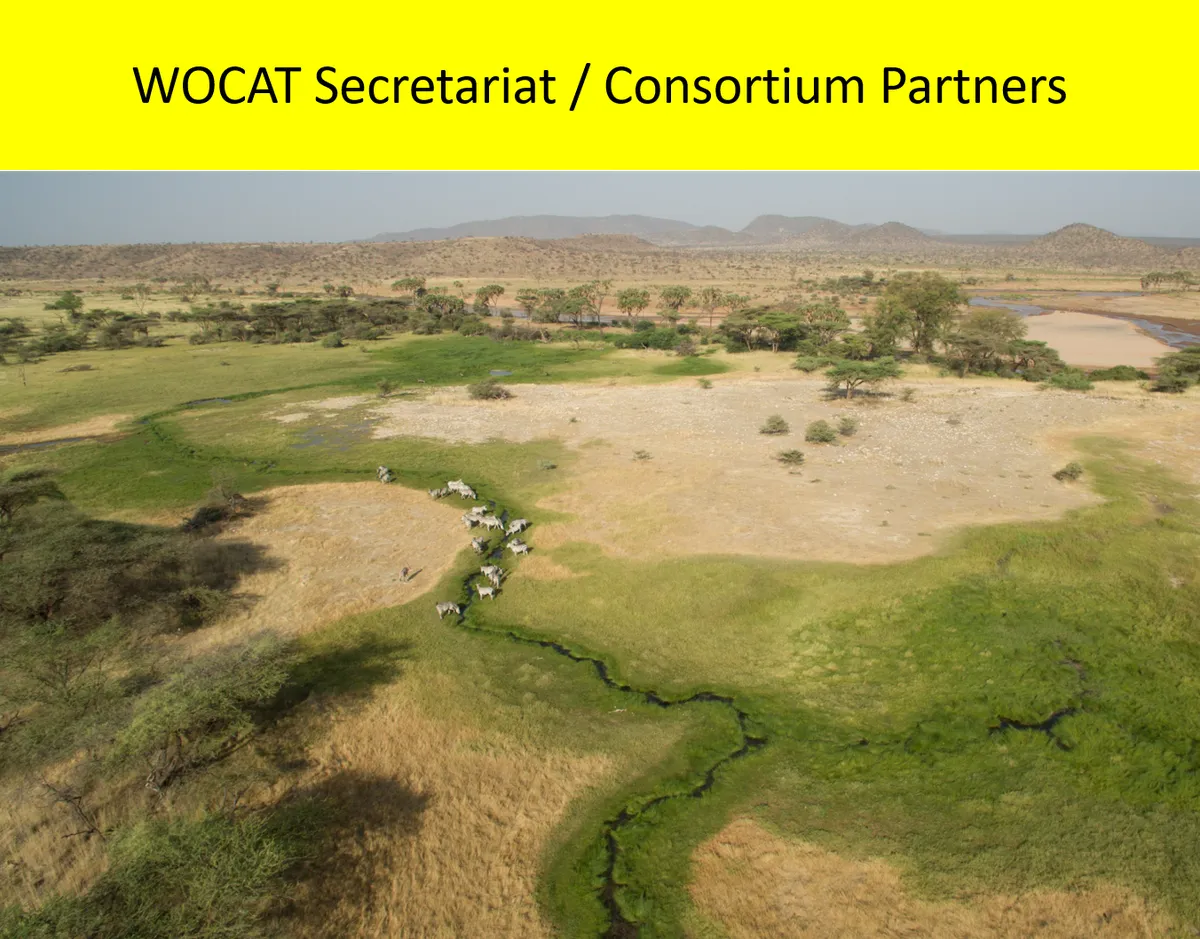
From the WOCAT team we wish you happy holidays and look forward to our continued collaboration in the new year!
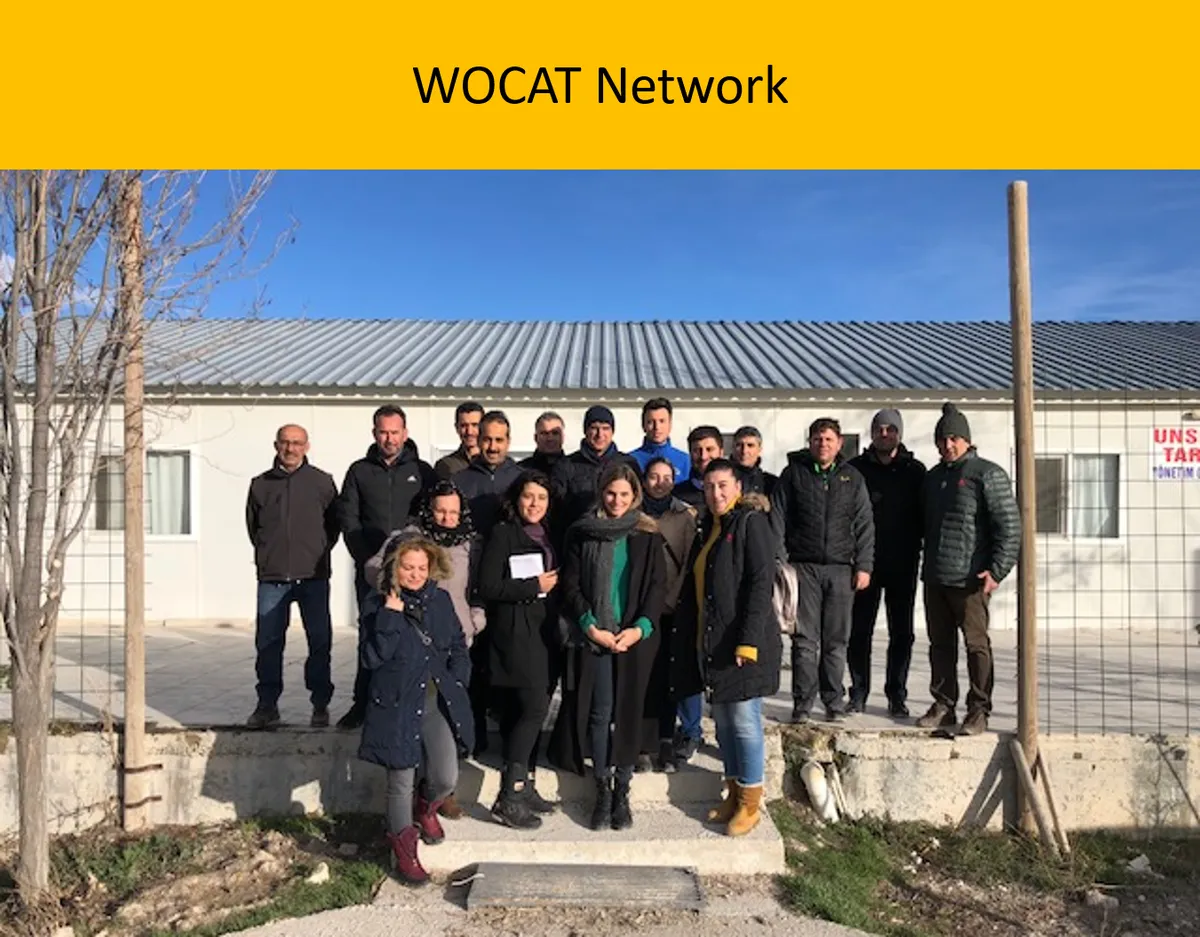
25 participants representing national institutions, local government and private sector, attended a national workshop in Turkey, in the context of the GEF funded FAO project “Decision Support for Scaling up and Mainstreaming of Sustainable Land Management (DS-SLM)”, organized in partnership with the General Directorate of Combating Desertification and Erosion of the Ministry of Forestry and Water Affairs (CEM), the implementing partner of the DS-SLM project in Turkey. Workshop participants were introduced to the WOCAT methodology for assessing and documenting SLM Practices and had the opportunity to improve their knowledge on the WOCAT tools (QT/QA) and on how to use these to address land degradation. The field visit took them to the Karaman area where the government supports private sector initiatives to restore degraded land facing problems with salinization and wind erosion.
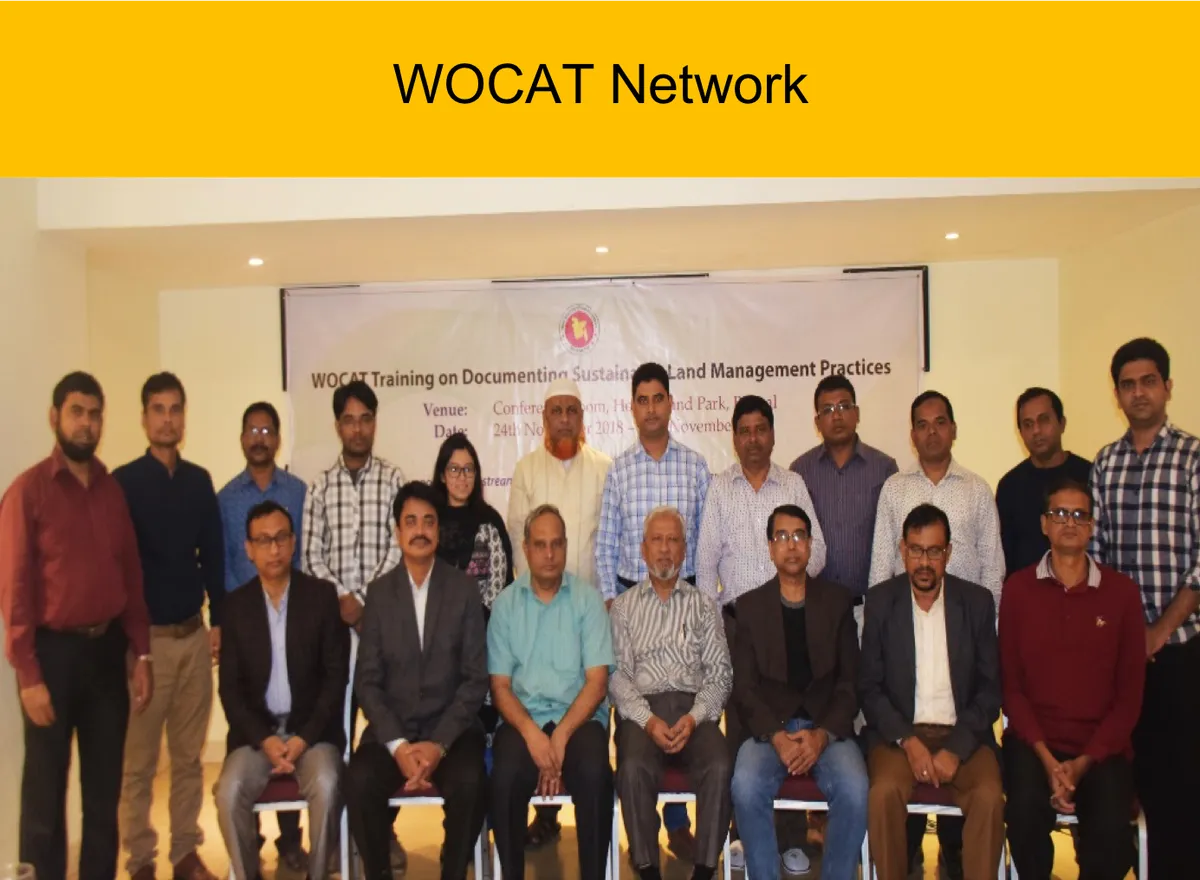
From November 24 to 26 2018, 18 participants from six organizations met in Barisal for a training on documentation of SLM technologies and approaches using WOCAT tools. Through this training the collaboration among different institutions was strengthened as well as the capacities to prepare technical specifications and document SLM. The training consisted in courses on land degradation, landscape restoration and sustainable land management as well as field exercises for documenting SLM.
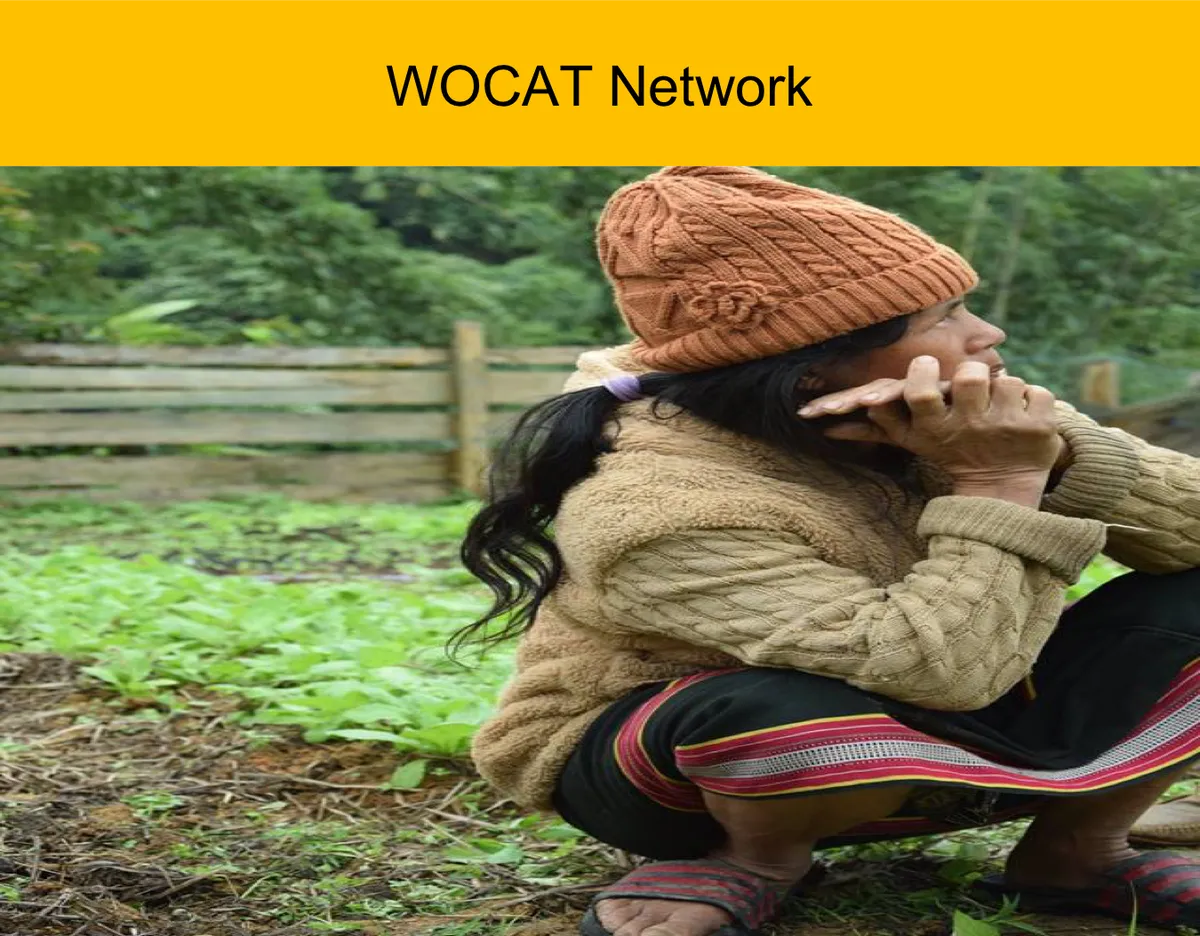
In Laos, the WOCAT team is preparing the selection of the demonstration sites after the completion of the Decision Support workshops within the scaling up SLM for smallholder farmers project funded by International Fund for Agricultural Development (IFAD). Field visits to Darkchueng and Ta oy districts are on-going to discuss the results and prepare the implementation.
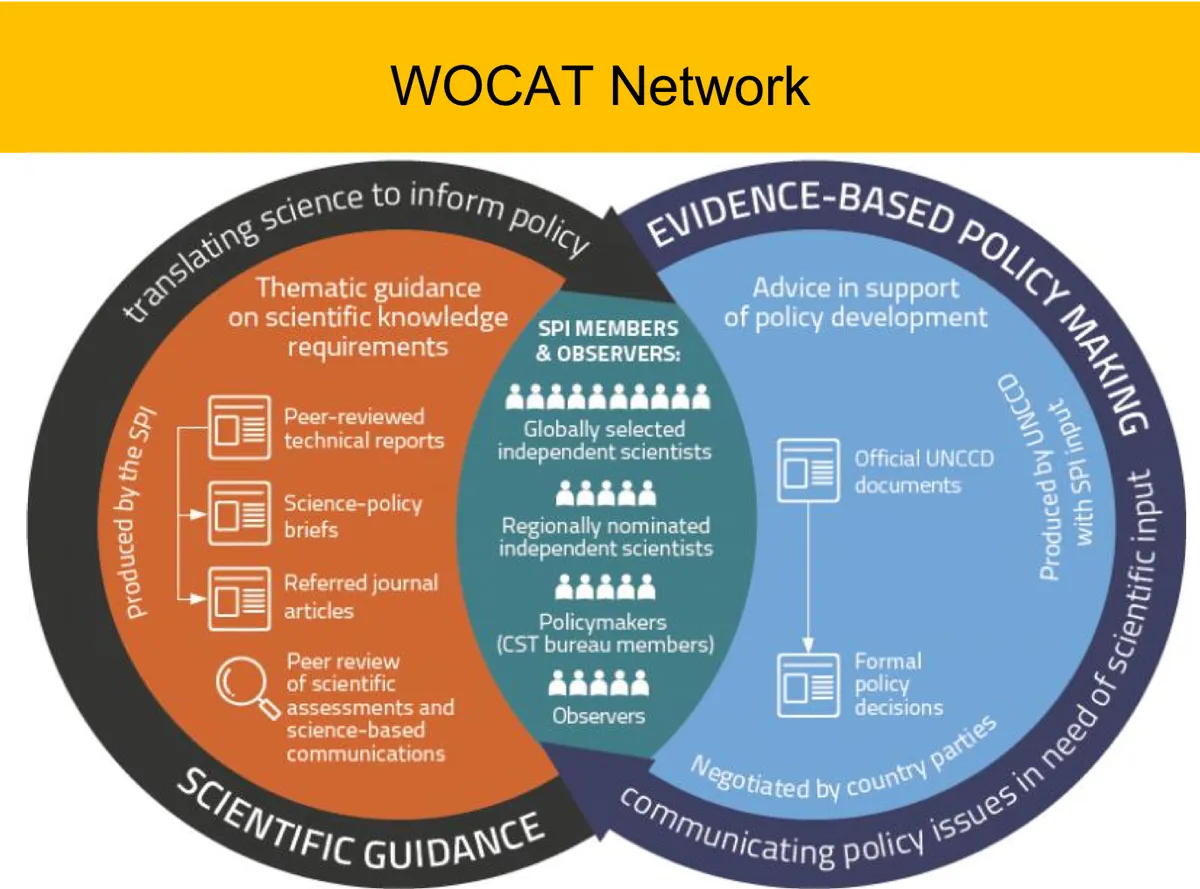
The Science-Policy Interface (SPI) of the United Nations Convention to Combat Desertification (UNCCD) invites interested person to participate in a survey on the potential contribution of Land Degradation Neutrality (LDN) to enhancing the well-being and livelihoods of people as well as the state of the environment.
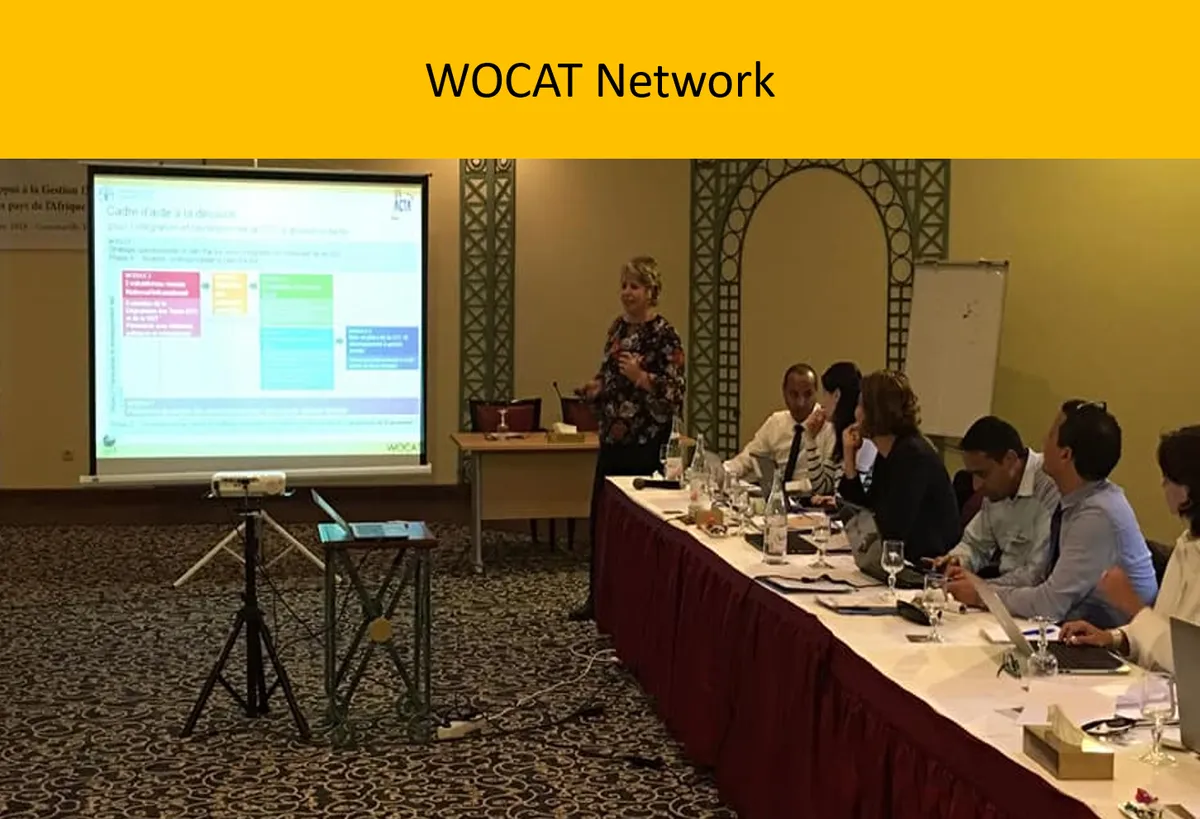
Presentation of the FAO-WOCAT decision support framework for SLM mainstreaming and scaling out and country experiences at the workshop "Support for Sustainable Land and Soil Management in North African Countries" in Tunisia from the 13-15 November, organized by Food and Agriculture Organization of the United Nations (FAO).
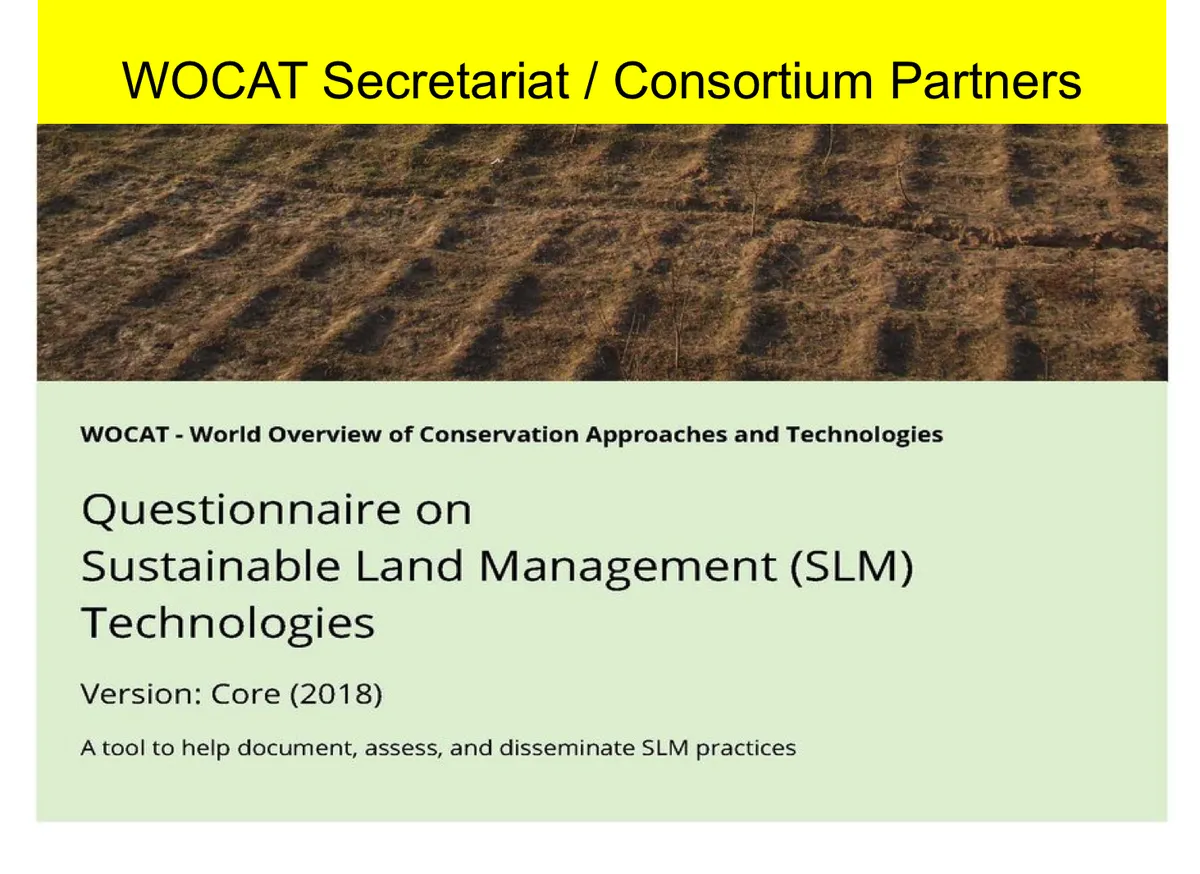
In the context of the harmonization of the Carbon Benefit tool and the Global SLM Database, a new edition of the questionnaire for Technologies has been launched and is now available in the WOCAT media library. Please only use this edition for your documentation of SLM Technologies.
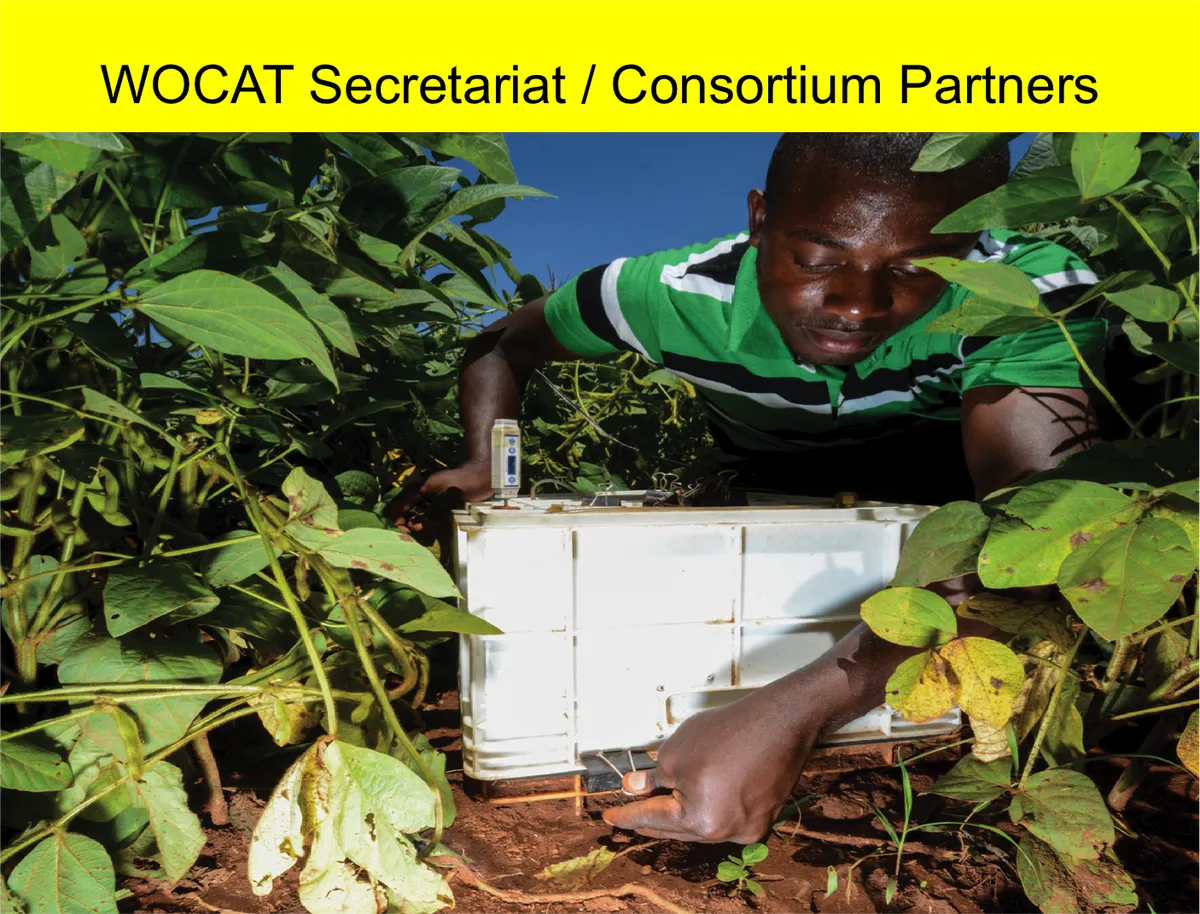
Discover the new publication by CIAT on "Socioeconomic factors that constrain or facilitate the adoption of technologies that promote sequestration of soil carbon in East Africa" analyzing the information gathered in a literature review and the analysis of SLM practices from Ethiopia and Kenya documented in the Global SLM Database.
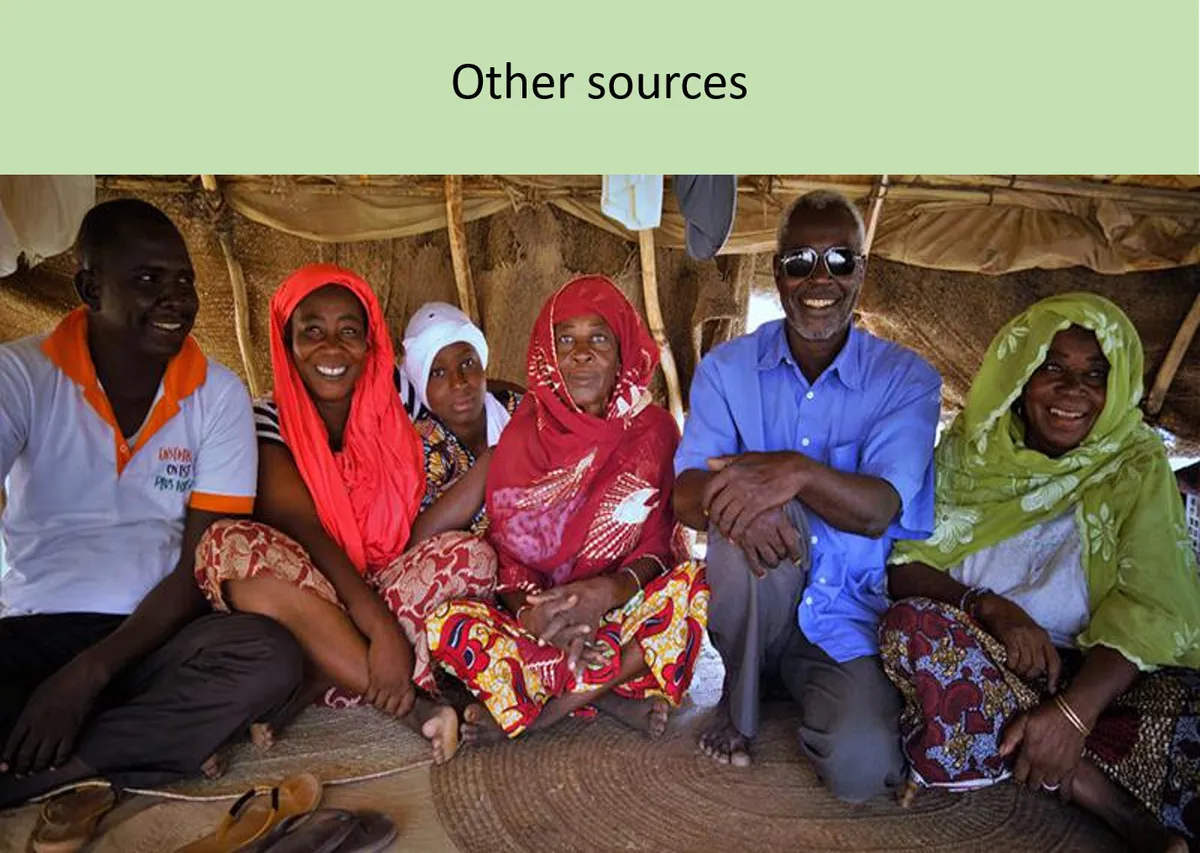
UNCCD commissions a study on “The role that measures taken to implement the Convention can play to address desertification, land degradation and drought as one of the drivers that cause migration.” The study will be presented at the UNCCD COP14 in 2019. They invite for contributions from Parties, UN Agencies and other international organizations, civil society organizations (CSOs) and researchers on documented good practice that contribute to addressing the adverse drivers of migration related to DLDD.
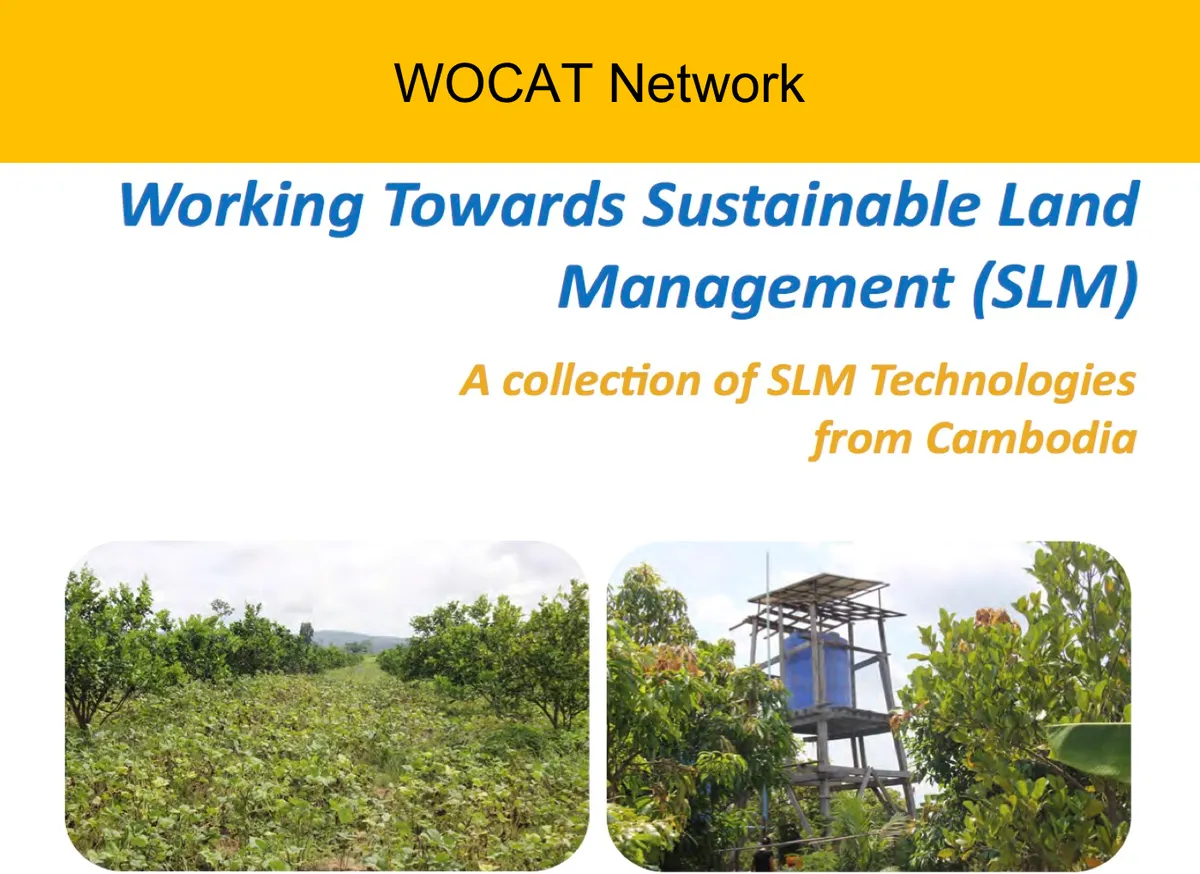
A new Compilation of SLM Technologies from Cambodia was created by the Royal University of Agriculture Cambodia within the project Scaling-up SLM by smallholder farmers - Cambodia, Lao PDR, and Uganda. The publication is available in English and Khmer.
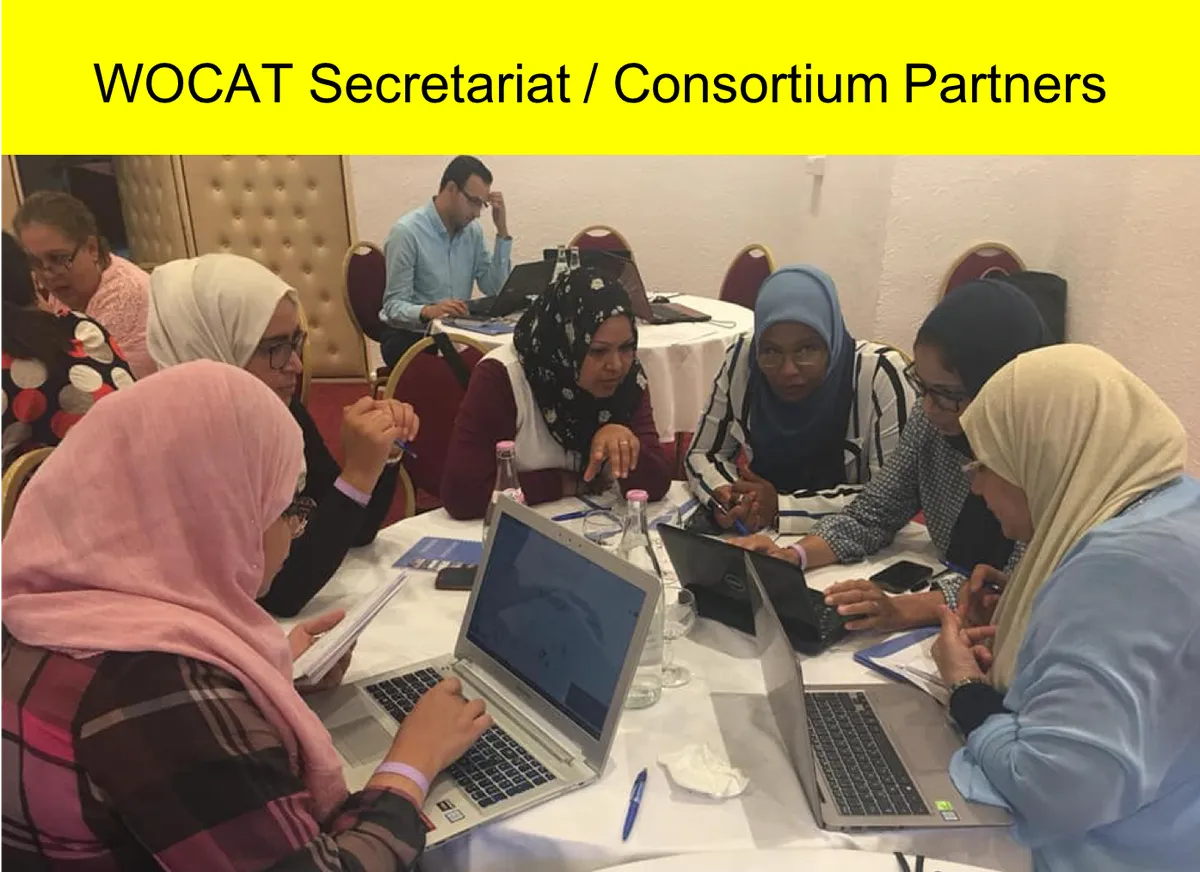
Within the framework of the GEF/ FAO project ‘Decision Support for Mainstreaming and Scaling out SLM (DS-SLM)’ the Ministry of Agriculture and Environment Tunisia together with FAO and WOCAT organized a workshop with SLM experts and decision-makers to formulate a concrete SLM mainstreaming and scaling out strategy for four selected target regions.
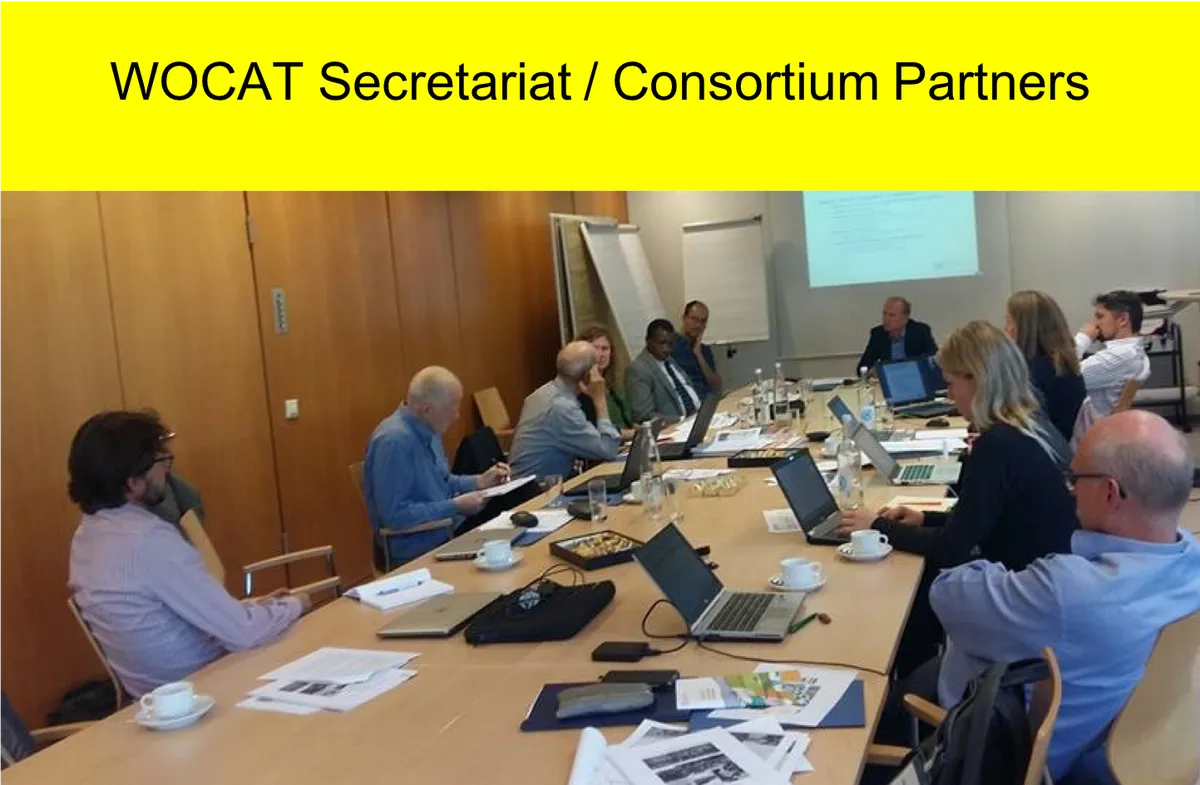
The WOCAT Consortium held their 8th Steering Committee Meeting at GIZ in Bonn. Next to the outputs of the LDN workshop, the Consortium partners also discussed the future of WOCAT, the ongoing collaboration with UNCCD, and exchanged new insights and experiences on projects for SLM.
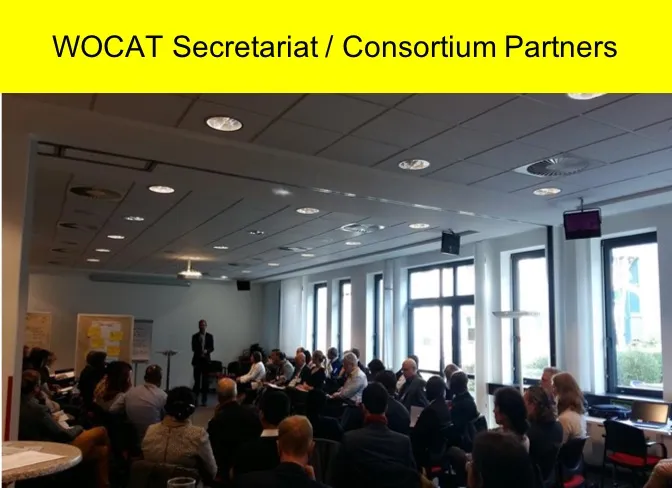
The WOCAT Consortium partners ISRIC and GIZ organized a workshop to discuss the planned project proposal for a Land Degradation Neutrality (LDN) mapping tool. Actors, among them various UNCCD focal points, from local, national and global level have participated in the workshop, sharing their experience and needs to report on SDG 15.3.
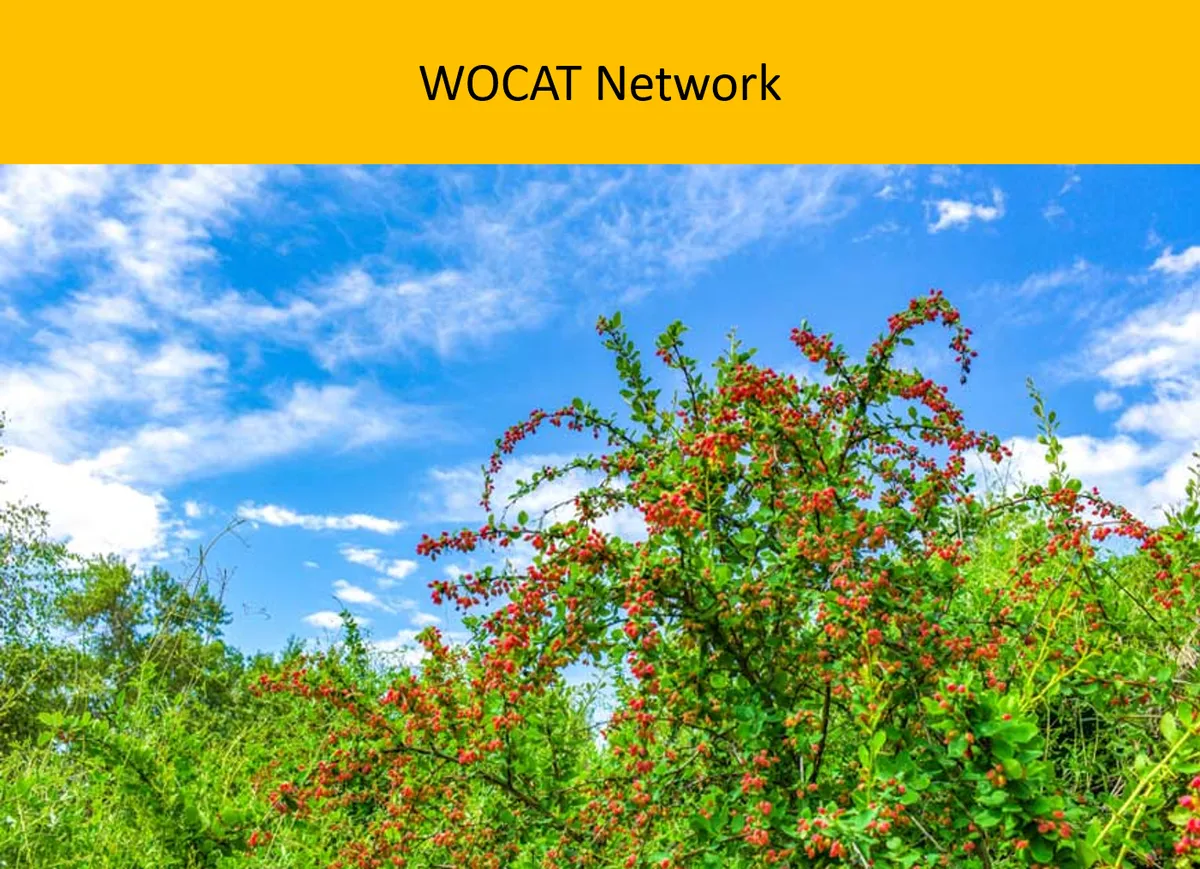
The Carbon Benefit Project, funded by the Global Environment Facility (GEF) and implemented by UN Environment, was designed to help land management projects to evaluate their “carbon benefits”. The GEF published a new article on the CBP tools on their website.
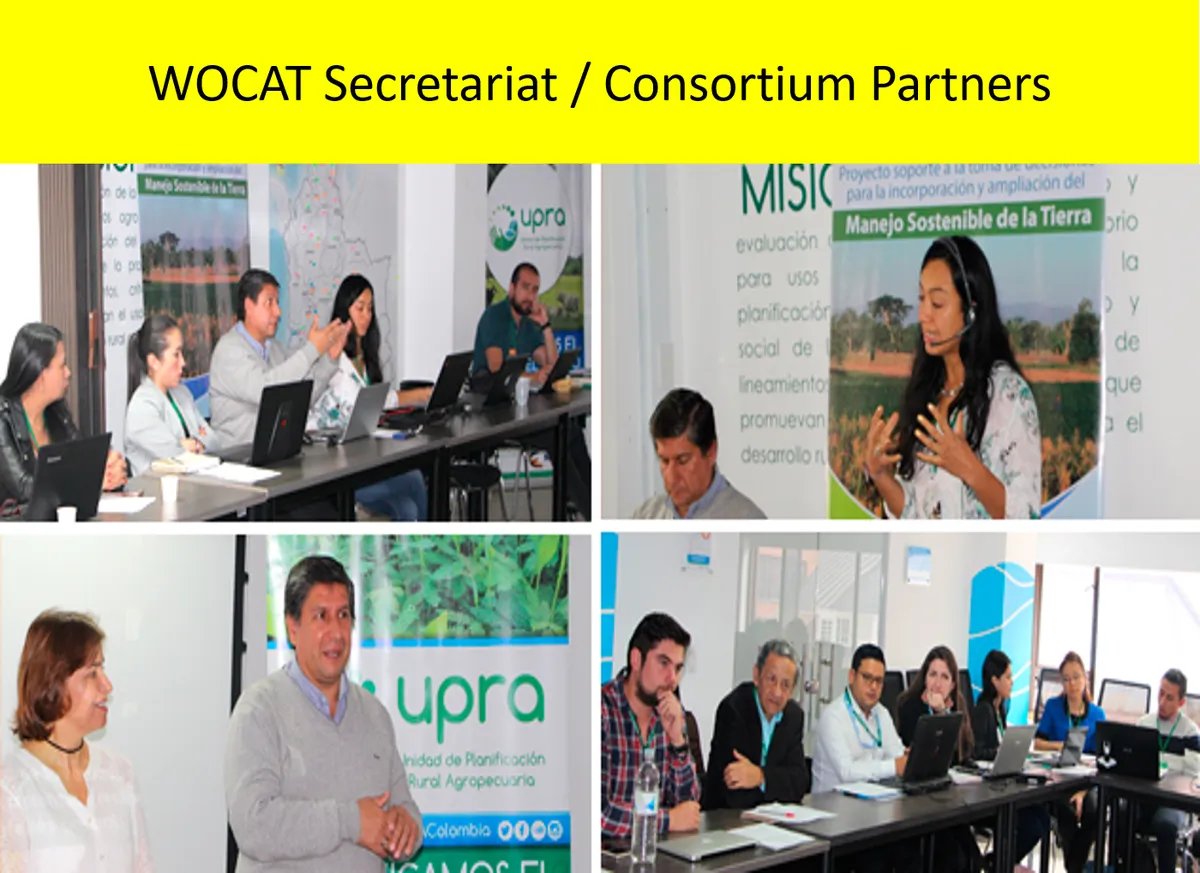
The Food and Agriculture Organisation (FAO), a WOCAT Consortium Partner, held a training on the WOCAT tools and methods in Colombia this August. Representatives of the Rural Agricultural Planning Unit (UPRA), the Rural Development Agency (ADR), the Institute of Geography Agustín Codazzi (IGAC), the Ministry of Environment and Sustainable Development (MADS) and the University of Applied Sciences and Environment (UDCA) participated in the training.
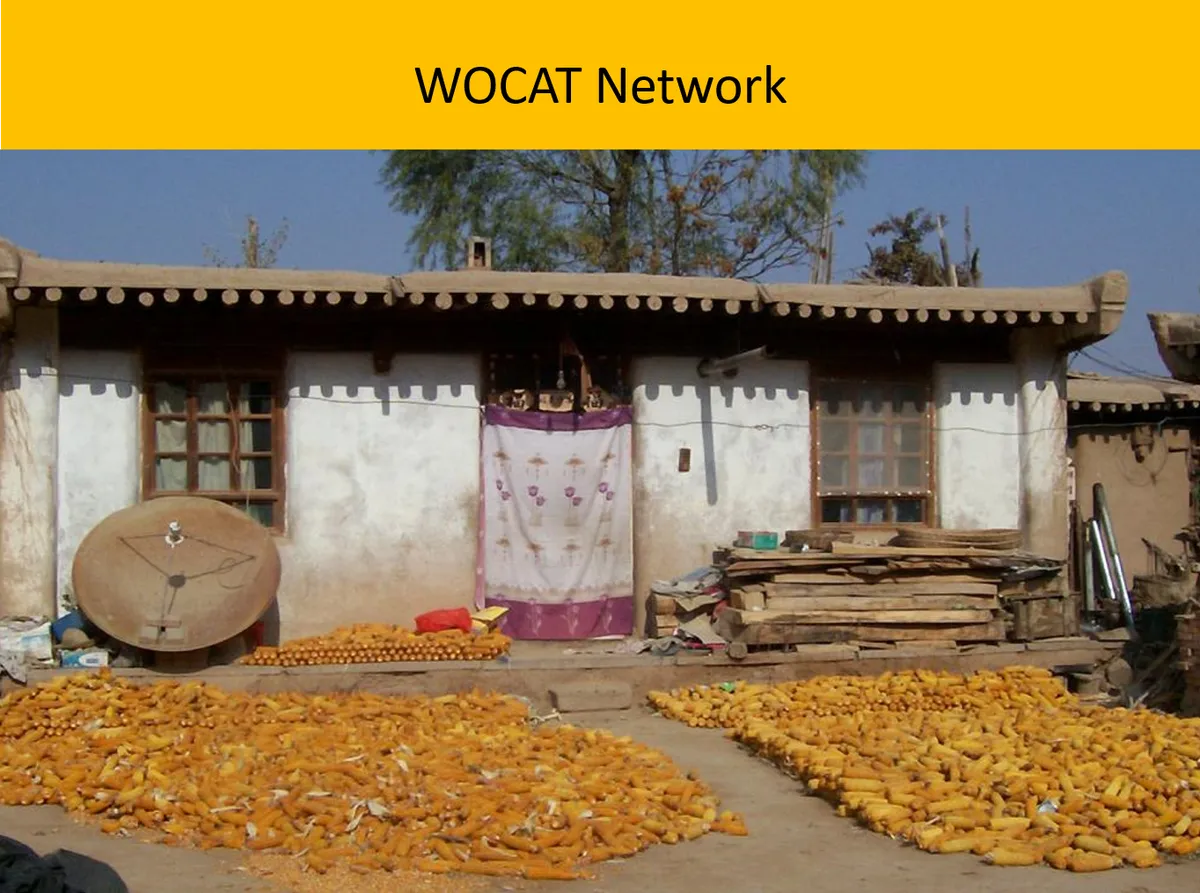
UNEP has published an article on the aim of the GEF funded Carbon Benefits Project (CBP). This project is working on combining knowledge on carbon sequestration with already existing WOCAT tools and methods.
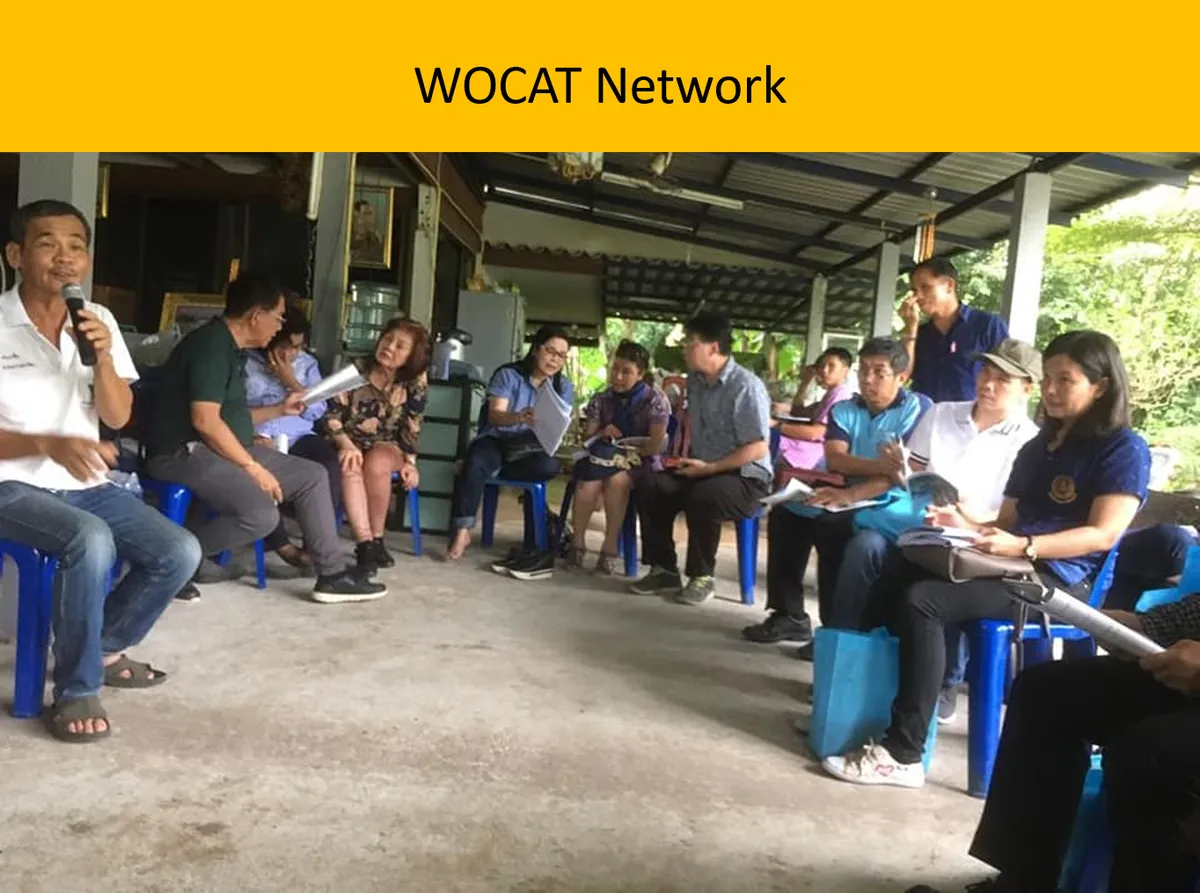
In Thailand, the Thai Land Development Department (LDD), FAO and WOCAT are working together in the framework of the DS-SLM project to scale up SLM practices in 4 land degradation affected regions’. Thirty five national and regional LDD officers participated in the WOCAT training workshop in Bangkok and around 30 participants joined the two day field work in Chachoengsao Province. The WOCAT standardized Questionnaires and Database were translated into Thai language.
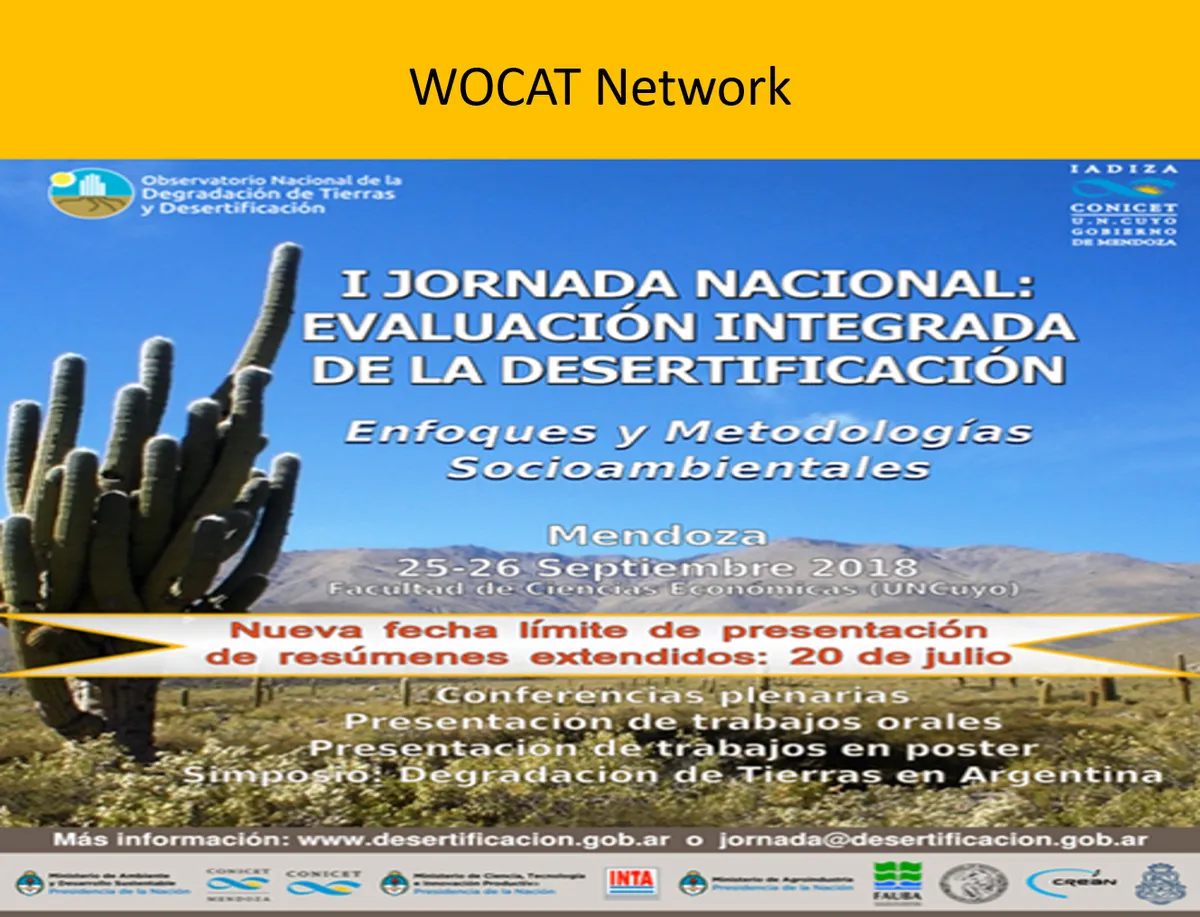
The Observatorio Nacional de la Degradación de Tierras y Desertificación (ONDTyD) and the Instituto Argentino de Investigaciones de las Zonas Áridas (IADIZA-CONICET) organize the first conference on integrated evaluation of desertification: approaches and socio-environmental methodologies, on 25-26 September 2018 in Mendoza, Argentina.
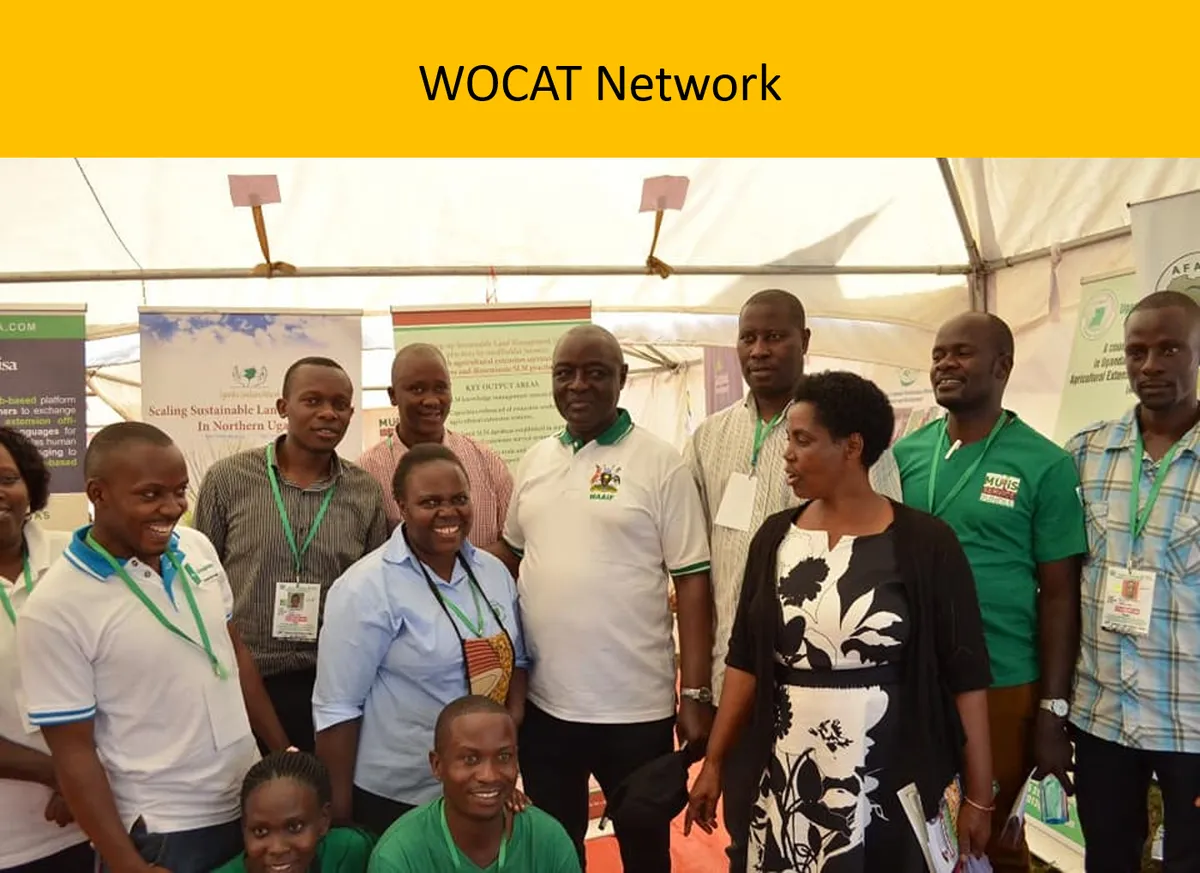
WOCAT partner Uganda Landcare Network exhibits at the National Agricultural Show 2018 of the Uganda National Farmers Federation and shows how to scale Sustainable Land Management practices. CDE - Centre for Development and Environment, University of Bern International Fund for Agricultural Development (IFAD)
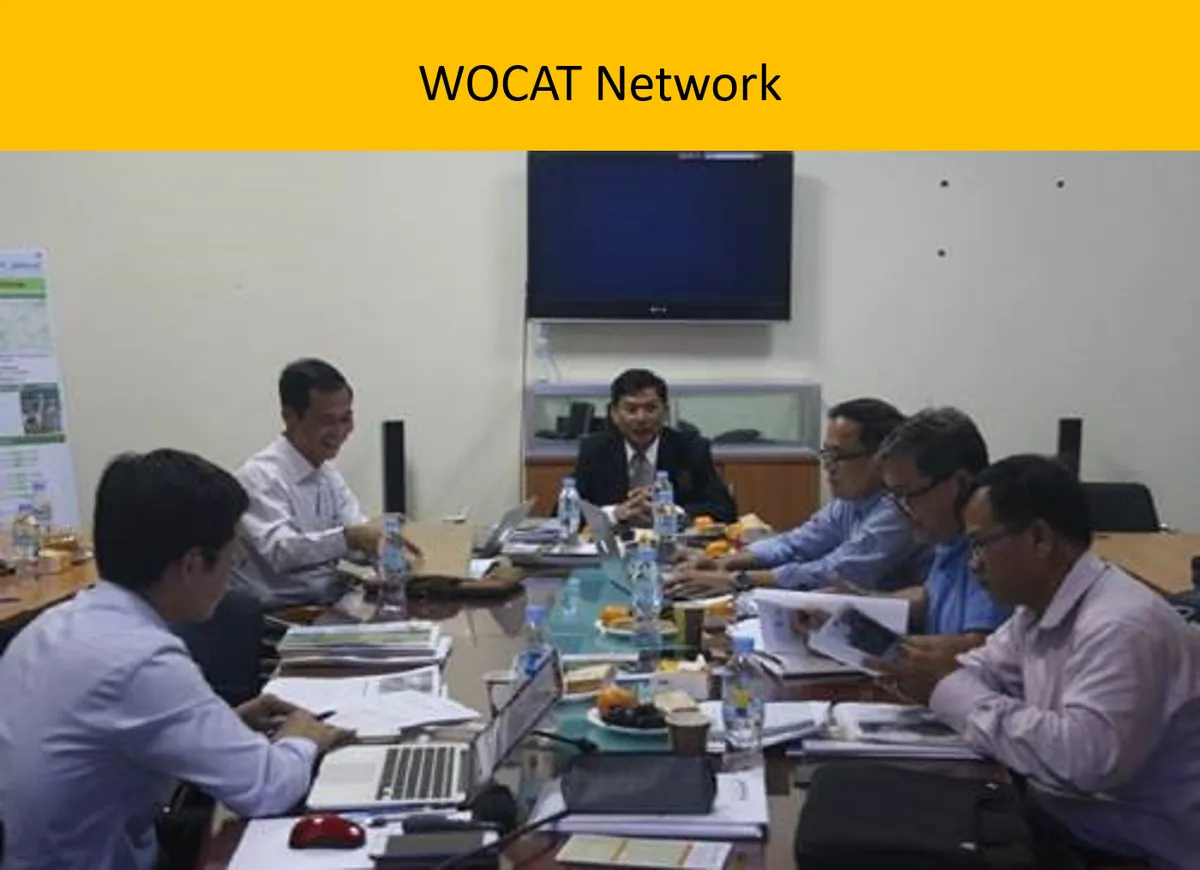
In Cambodia, the Royal University of Agriculture (RUA), partner of WOCAT in the IFAD-funded project ‘Scaling-up SLM with smallholder farmers’, held its yearly National Expert Group meeting attended by UNCCD focal point Dr. Meas Pyseth, RUA Vice Rector Dr. Sok Kunthy, Deputy Director of CARDI Dr. Seng Vang and the Director of the Department of Agricultural Extension Dr. Mao Minea. They discussed the project’s contribution to address land degradation issues and promote SLM practices among stakeholders and farmers in Cambodia thereby contributing to achieving land degradation neutrality.
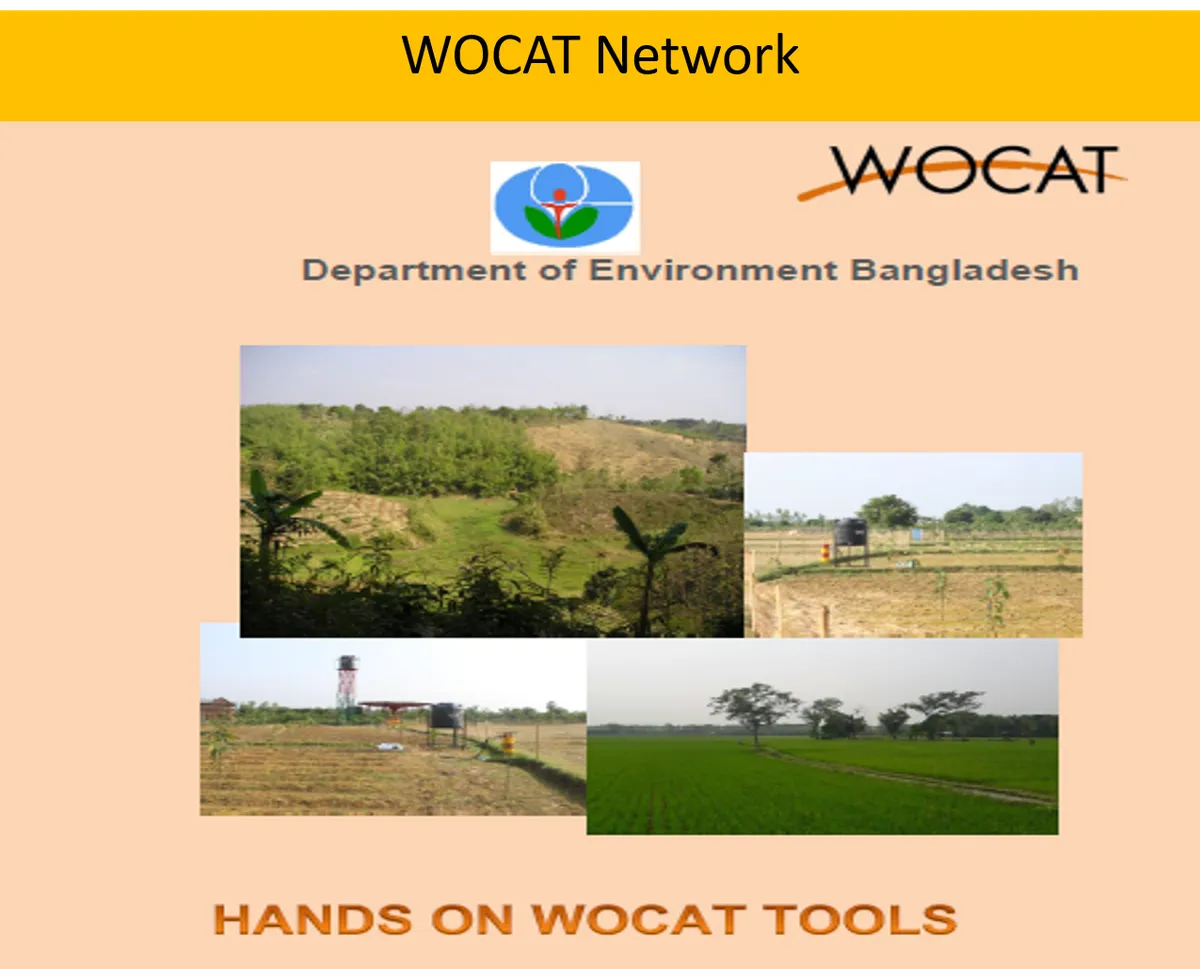
Mr. Jalal Uddin from the Bangladesh Conservation Approaches and Technologies (BANCAT) developed a new manual for the GEF project ‘Establishing National Land Use and Land Degradation Profile Towards Mainstreaming SLM practices in sectors Policies (ENALULDEP/SLM)’ to support project participants to document and implement SLM Technologies and Approaches in hot spots all over the country, contributing to achieving SDG 15 life on land.
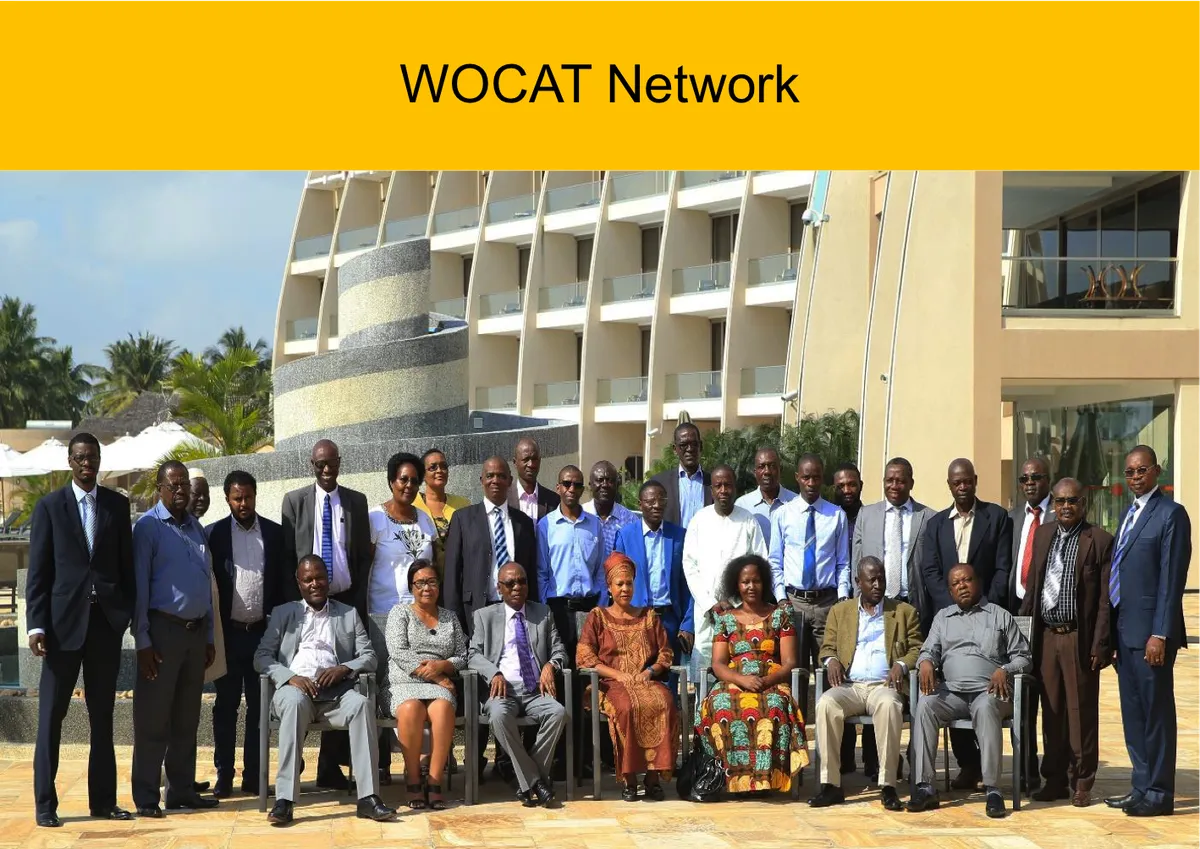
The NEPAD Planning and Coordinating Agency, hosting the TerrAfrica Partnership, organized a workshop on the operationalization of AfriOCAT in Dar Es Saalam, Tanzania. During this meeting new strategies where disucssed.
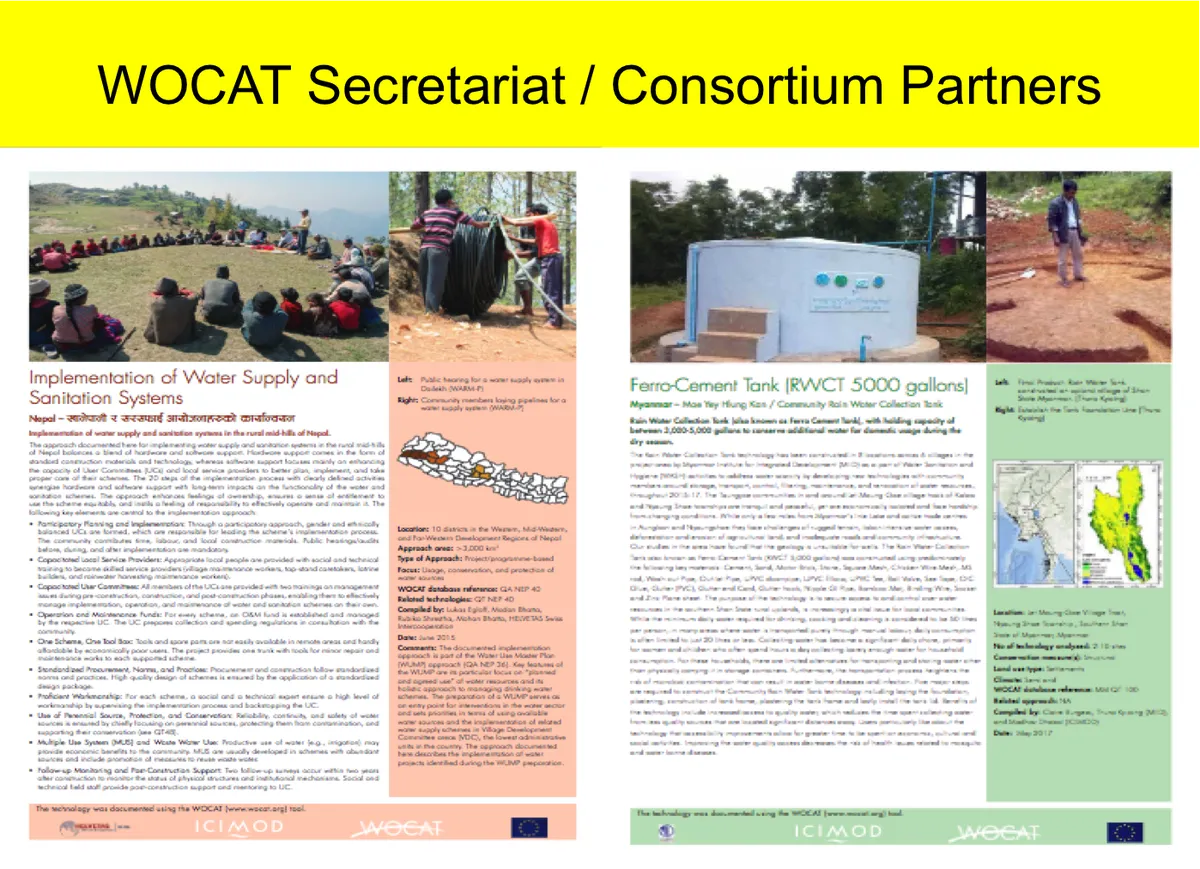
The new NEPCAT fact sheets (documented by HELVETAS Nepal) and a fact sheet from Myanmar are now available online. This factsheets have been created with the support of the WOCAT Consortium Partner ICIMOD.
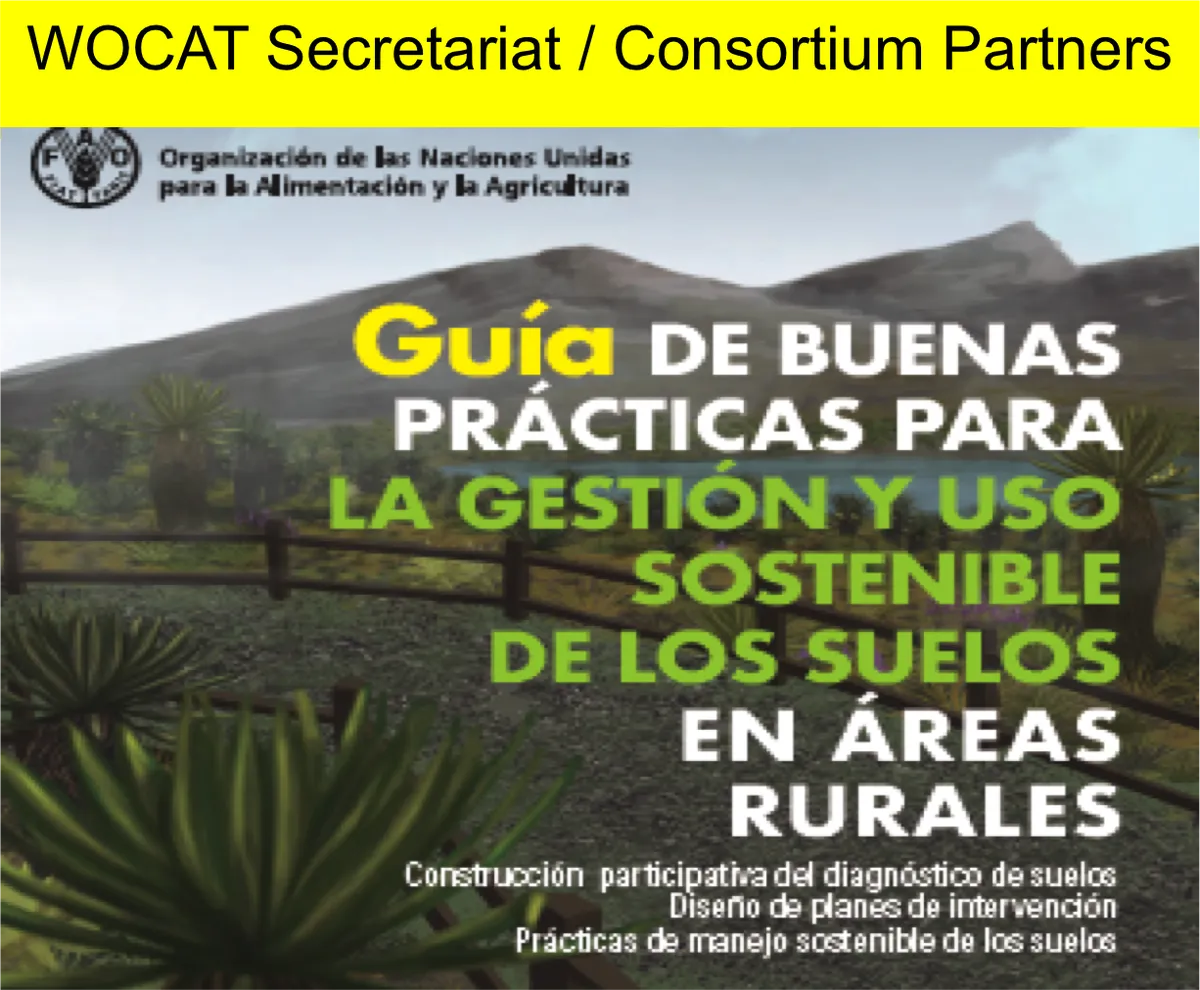
Esta guía fue realizada por solicitud del Ministerio de Ambiente y Desarrollo Sostenible de Colombia, en respuesta a los crecientes problemas de degradación del suelo. Su objetivo es proporcionar buenas prácticas para la conservación, el uso sostenible y la protección de los suelos en las zonas rurales del país.
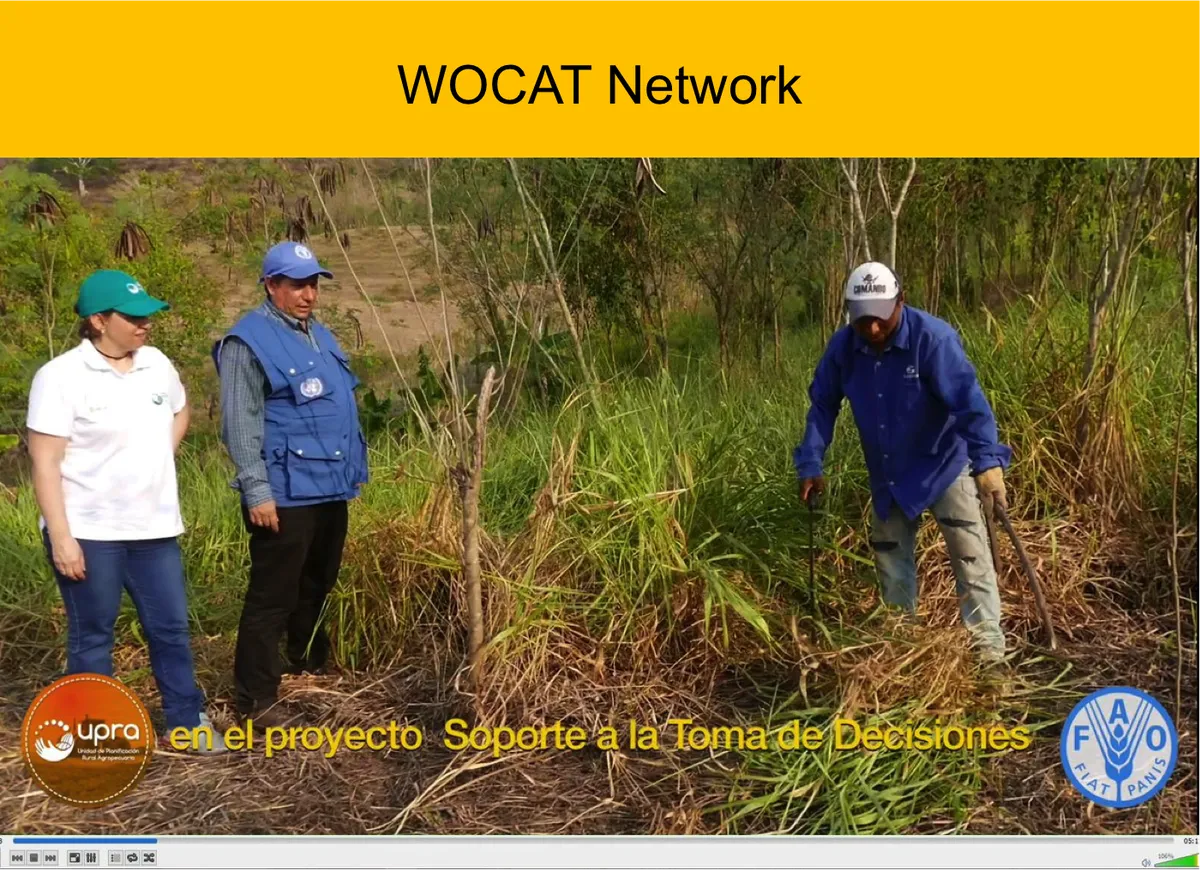
¡Miren qué hace la Unidad de Planificación Rural Agropecuaria (UPRA) en colaboración con la FAO y WOCAT para luchar contra la degradación de las tierras en Colombia en el proyecto DS-SLM!
Have a look what the Unidad de Planificación Rural Agropecuaria (UPRA) and FAO in collaboration with WOCAT are doing to combat land degradation in Colombia within the framework of the DS-SLM project!
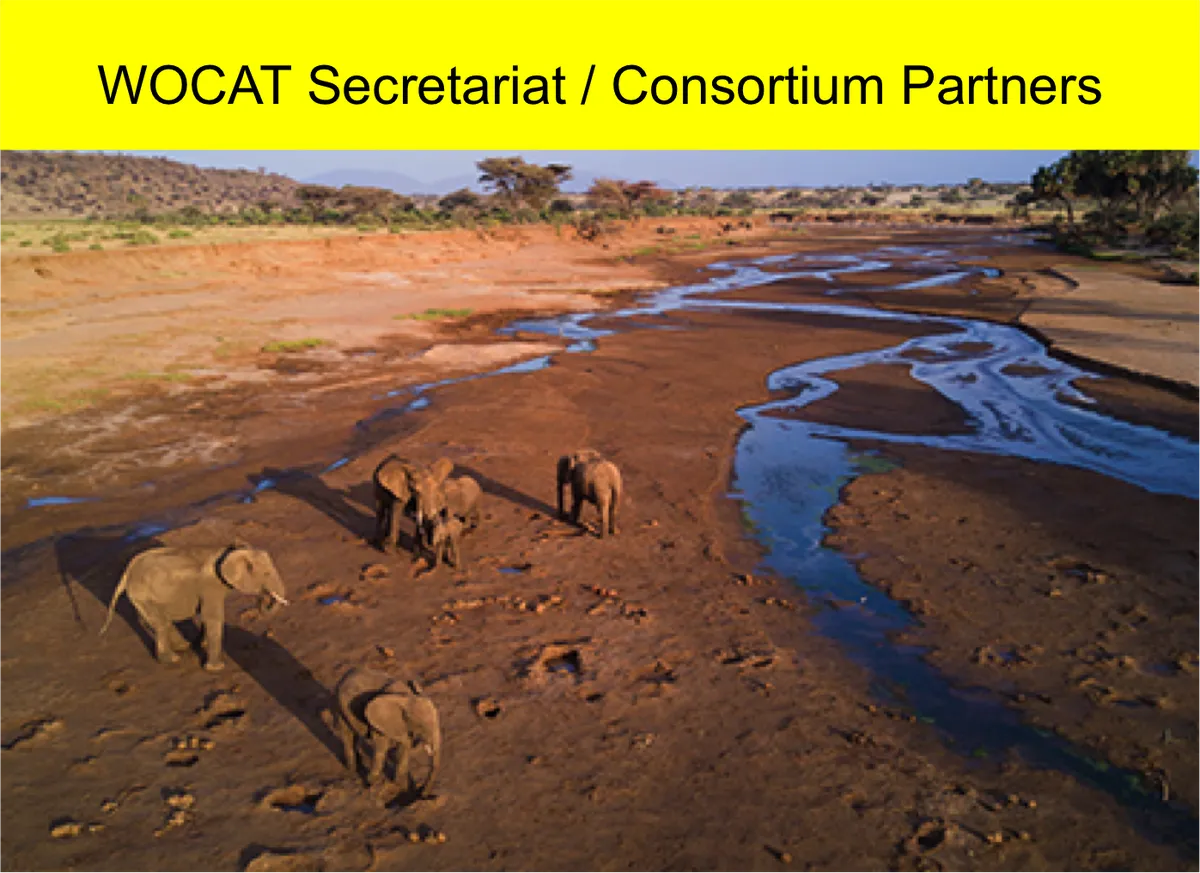
WAD has been launched. WOCAT has seven pages on solutions in this Atlas representing some insights from analysis on the Global SLM Database and a focus on Central Asia, and a number of nice photographs spread within the Atlas.
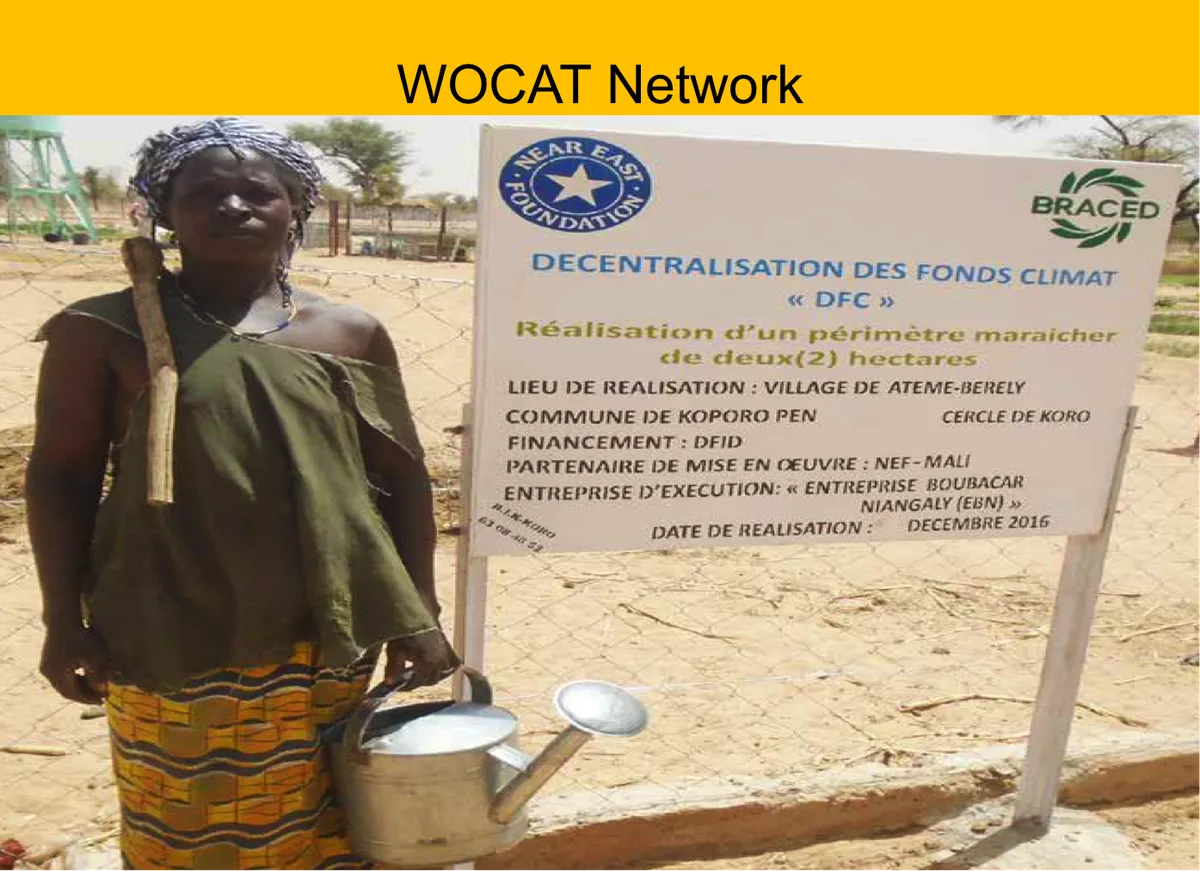
Innovations Environnement Développement afrique" (IED afrique) has recently pubished their new publication on SLM and resilience-building in the Sahel. This publication includes a discussion of scope for further use of participatory resource mapping tools and OpenStreetMap to map and measure the impacts of SLM practices in Sub-Saharan Africa over the coming years.
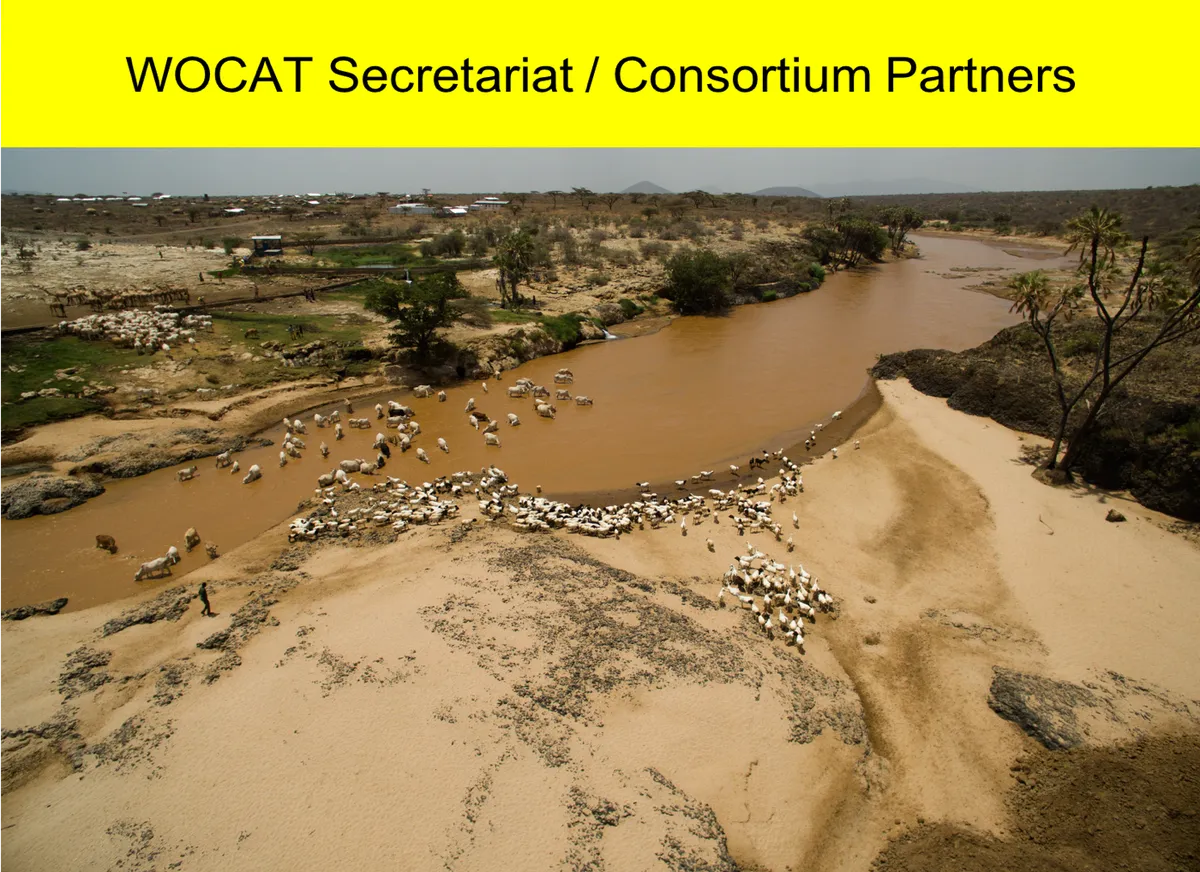
Land has a true value – invest in it! WOCAT wishes you a happy World Day to Combat Desertification 2018! Let us spread the word about SLM and support land users in the wide adoption of good practices worldwide! #2018WDCD
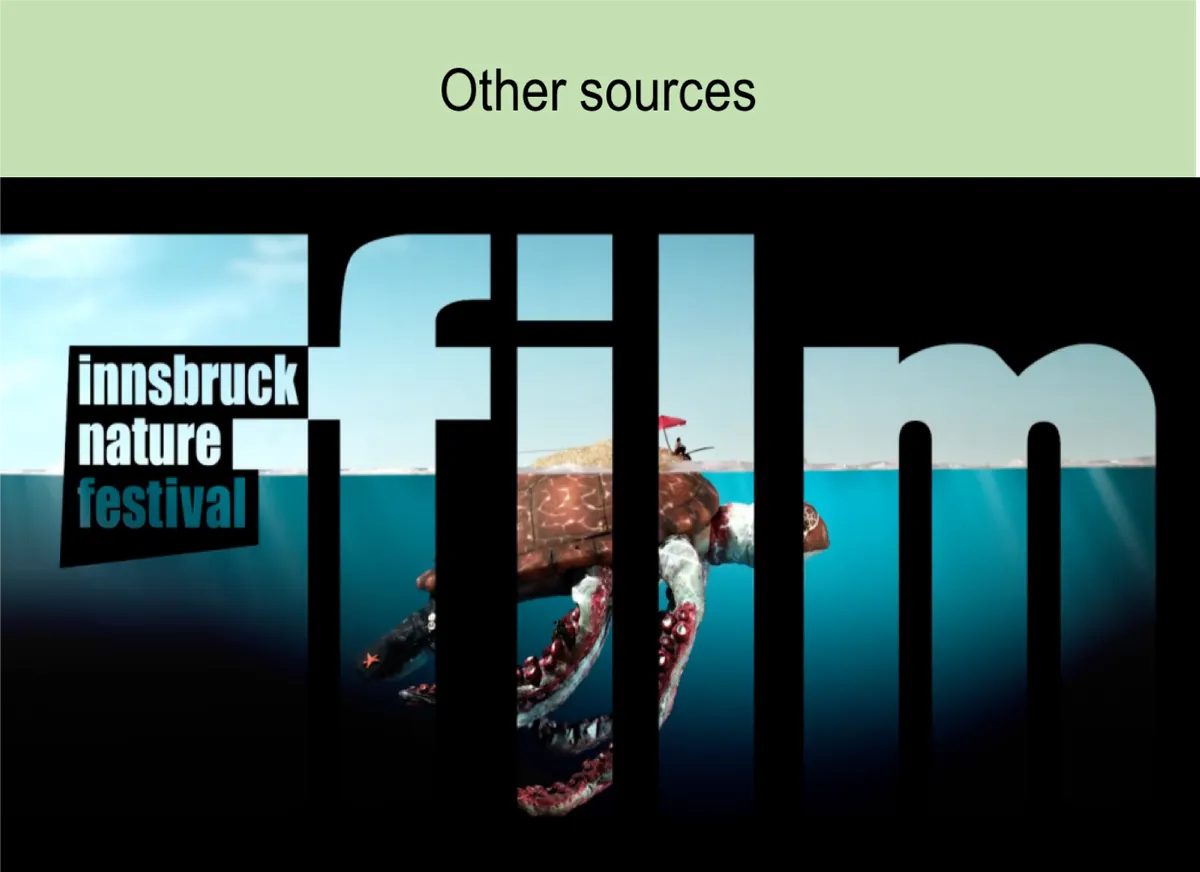
Soils are still poorly recognized by a large part of society. To raise the awareness for soils, the Innsbruck Nature Film Festival (Austria, Europe) will award a special prize for the best film on the topic of soil.
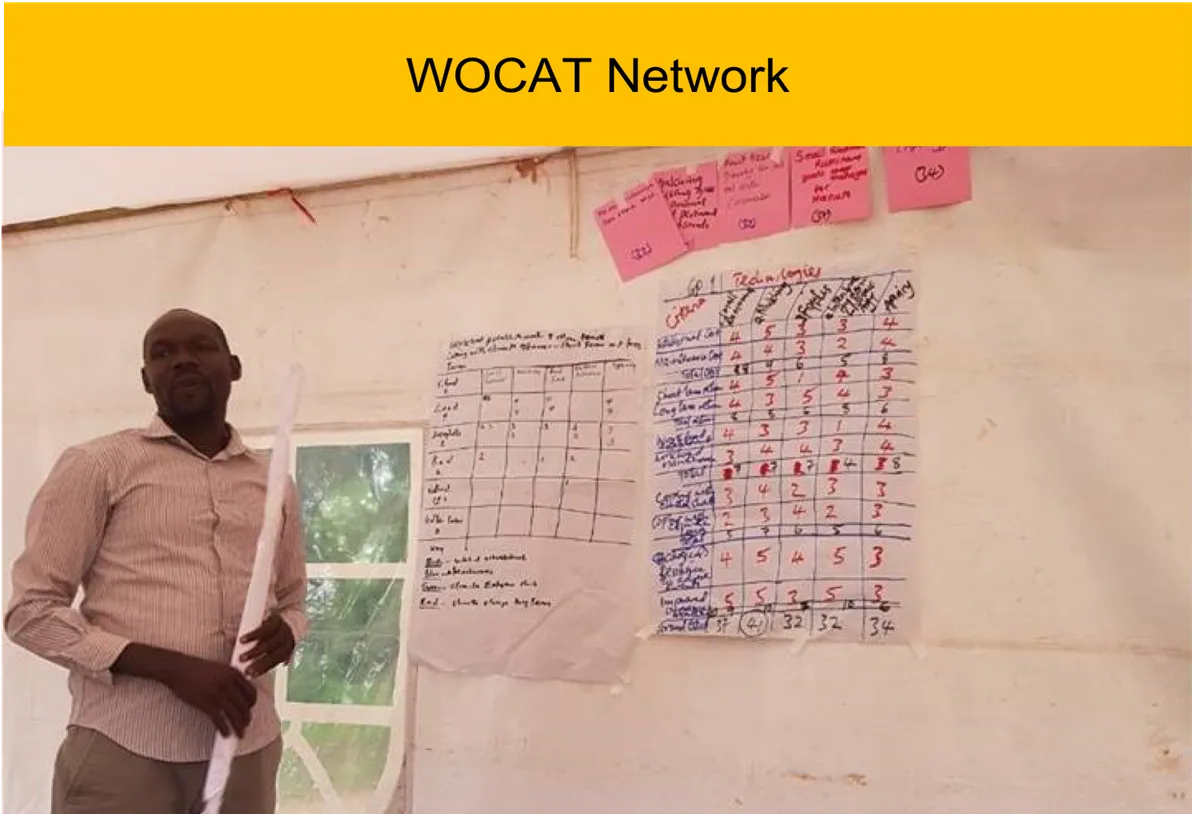
Which SLM Technology to choose? Impressions from the decision support workshop at Makerere University, Kampala with Uganda Landcare Network and CDE researcher Stephanie Jaquet within the framework of the International Fund for Agricultural Development (IFAD) grant to WOCAT 'Scaling up SLM with smallholder farmers'. CDE - Centre for Development and Environment, University of Bern
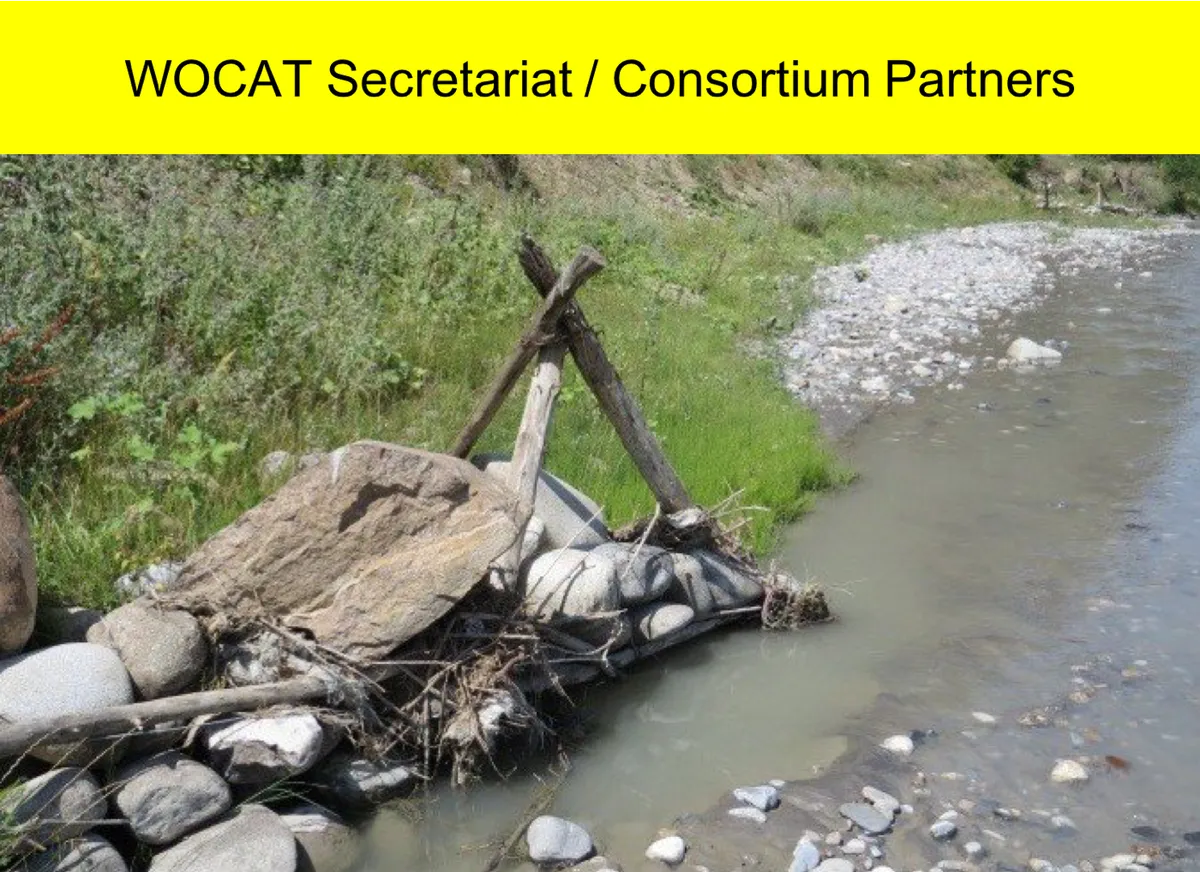
We congratulate the WOCATpedia contest winner Zebo Khudonazarova for her great article on "Best traditional Practices on Climate Changes in the Villages of Central Asia". We are happy to share this article with the WOCAT community.
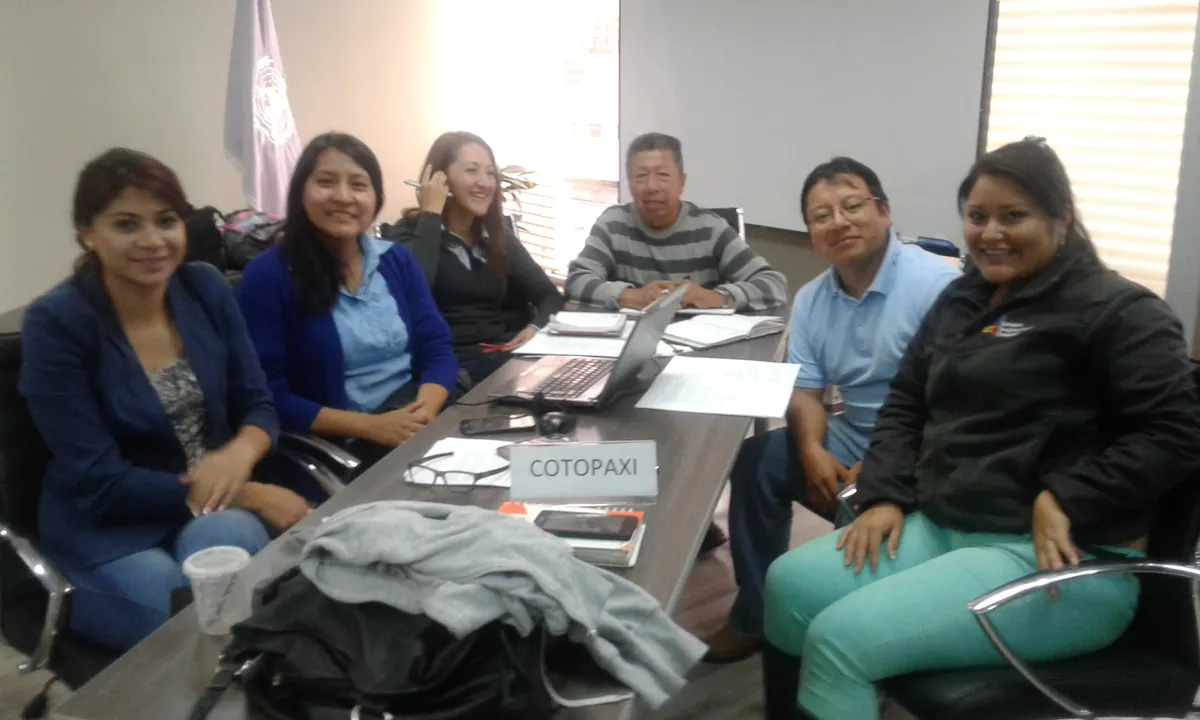
Representatives from the 15 countries of the GEF/ FAO-WOCAT project Decision Support for Mainstreaming and Scaling Out SLM (DS-SLM) will meet at FAO headquarters in Rome together with FAO and WOCAT to exchange experiences on assessing land degradation, scaling up SLM practices and mainstreaming SLM at different levels.
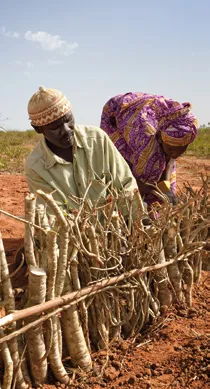
The new book on good practices in DRR will be presented at the World Water Forum in Brasilia in the Swiss Pavilion within the framework of the Swiss Water Partnership on March 20.
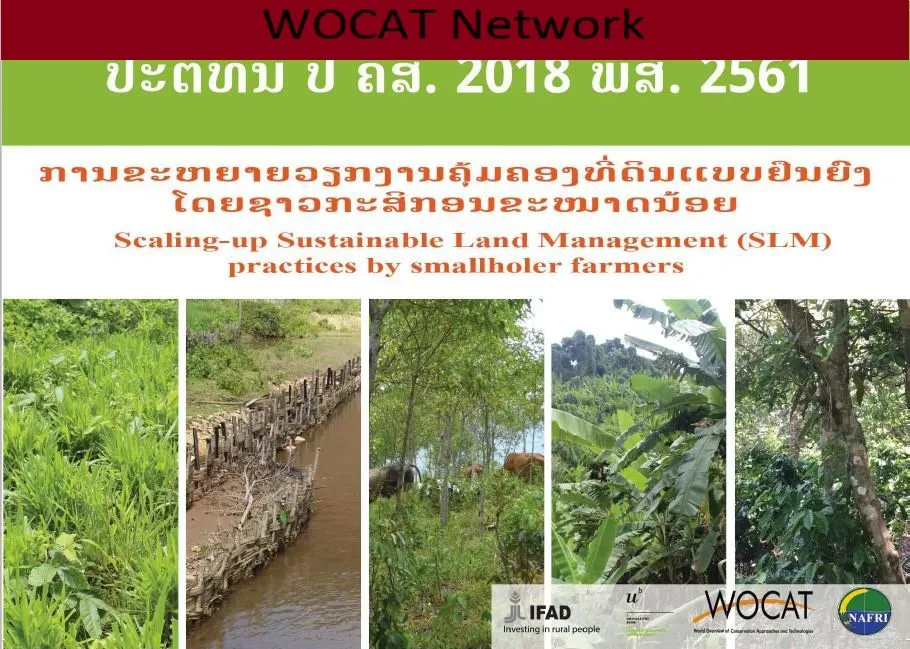
These calendars were produced as part of the IFAD-funded project 'Scaling-up SLM with smallholder farmers'. It contains information on different SLM practices in the project countries .
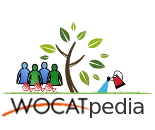
Share your experience and insights of a field-tested successful example of sustainable land management (SLM) in a landscape with protected areas as part of ecosystems, which has positive impacts on climate resilience (including flood and drought regulation) and on biodiversity, helping to sustain both ecosystems and human well-being.
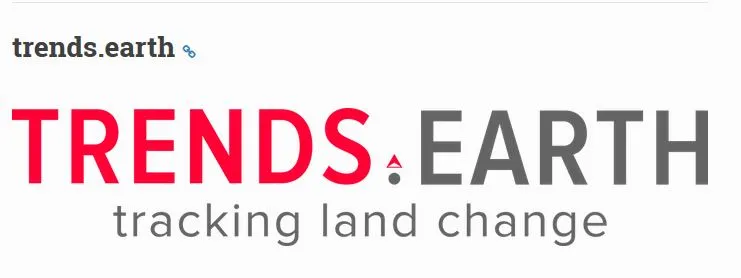
TRENDS.EARTH - a decision support system that uses earth observation systems to evaluate changes in land condition, using the power of cloud computing through a free and open source tool.
The TRENDS.EARTH tool was built as a multi-level decision support system which can be used for a range of analyses - from the effects of specific interventions on land condition to national level reporting to Sustainable Development Goal 15.3.
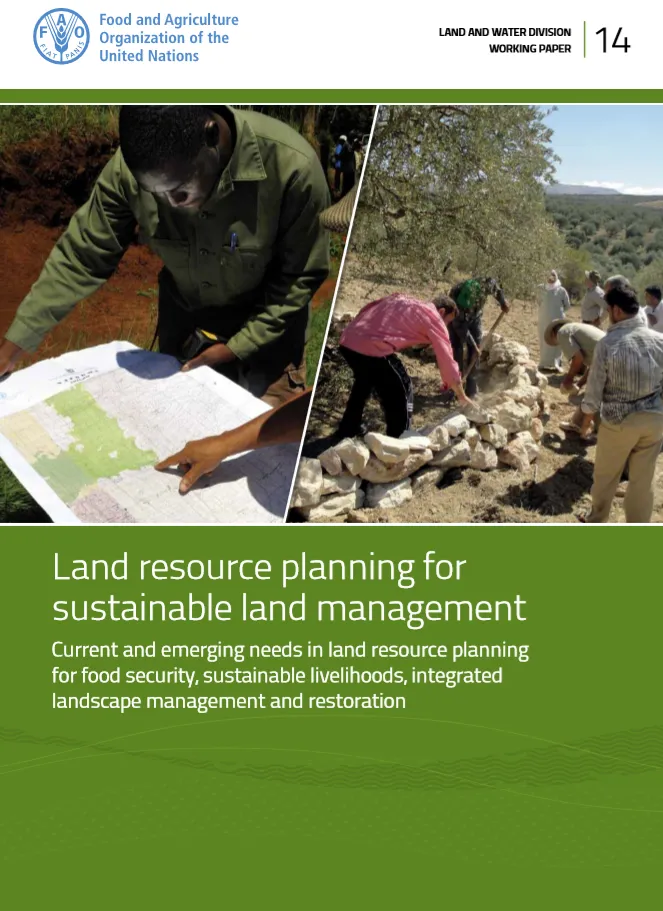
The LRP Secretariat of FAO has launched its land resources planning Toolbox and a complementing publication. You can find the land resourcees planning Toolbox here. It is a categorized inventory of existing tools and apporaches to support decision makers and land users in land management and restoration. It was developed by taking into account emerging needs and trends in existing LRP tools which were identified by around 750 land management practicioners. The responses and results from the practicioners are also summarized in the publication "Land Resources Planning for Sustainable Land Management".
2017
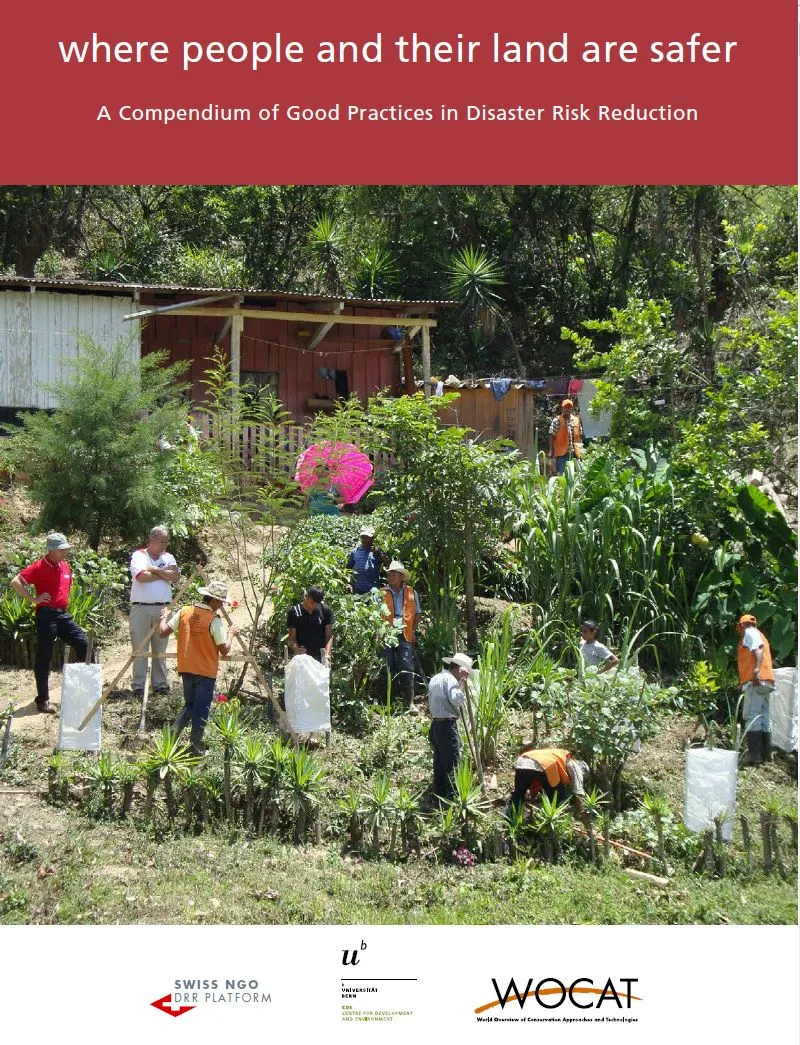
This publication is derived from a collaboration between the Swiss NGO DRR Platform, the Centre for Development and Environment of the University of Bern and WOCAT. This Compendium systematically describes and analyses over 30 well-established and successful land-related/ land-based practices for the prevention, reduction, and management of disaster risks, highlighting the potential of SLM for DRR.
Launch of the new WOCAT website
We are very happy to announce that the new WOCAT website will be launched next week from 8th to 9th of August!
Please be aware that during this time the website functions are not fully working and new WOCAT user applications will be treated after the launch.
Please make sure to re-activate your password on the new website when you log in to your WOCAT account after the launch. You may choose the same password as before.

For international Women's Day, find out the latest updates about the UNCCD-WOCAT collaboration on gender-responsive SLM. A new gender tool is currently being tested with WOCAT network partners in more than 10 countries to help assess how gender-responsiveness SLM technologies are and what needs to be done to enhance their adoption by female and male farmers. UNCCD and WOCAT will share information about the tool on our channels. Stay tuned for more information at the UNCCD COP event where the tool will be presented at an official session.